
$11.95 US l' 7 25274 79069 2

TriQuarterly

TriQuarterly is an international journal of writing, art and cultural inquiry published at Northwestern University

TriQuarterl�y
Editor
Susan Firestone Hahn Contributing Editors
Associate Editor
Ian Morris
Operations Coordinator
Kirstie Felland
Cover Design
Gini Kondziolka
Editorial Assistants
Samantha Levine
Mairead Case
Assistant Editor
Joanne Diaz
TriQuarterly Fellow
Brent Mix
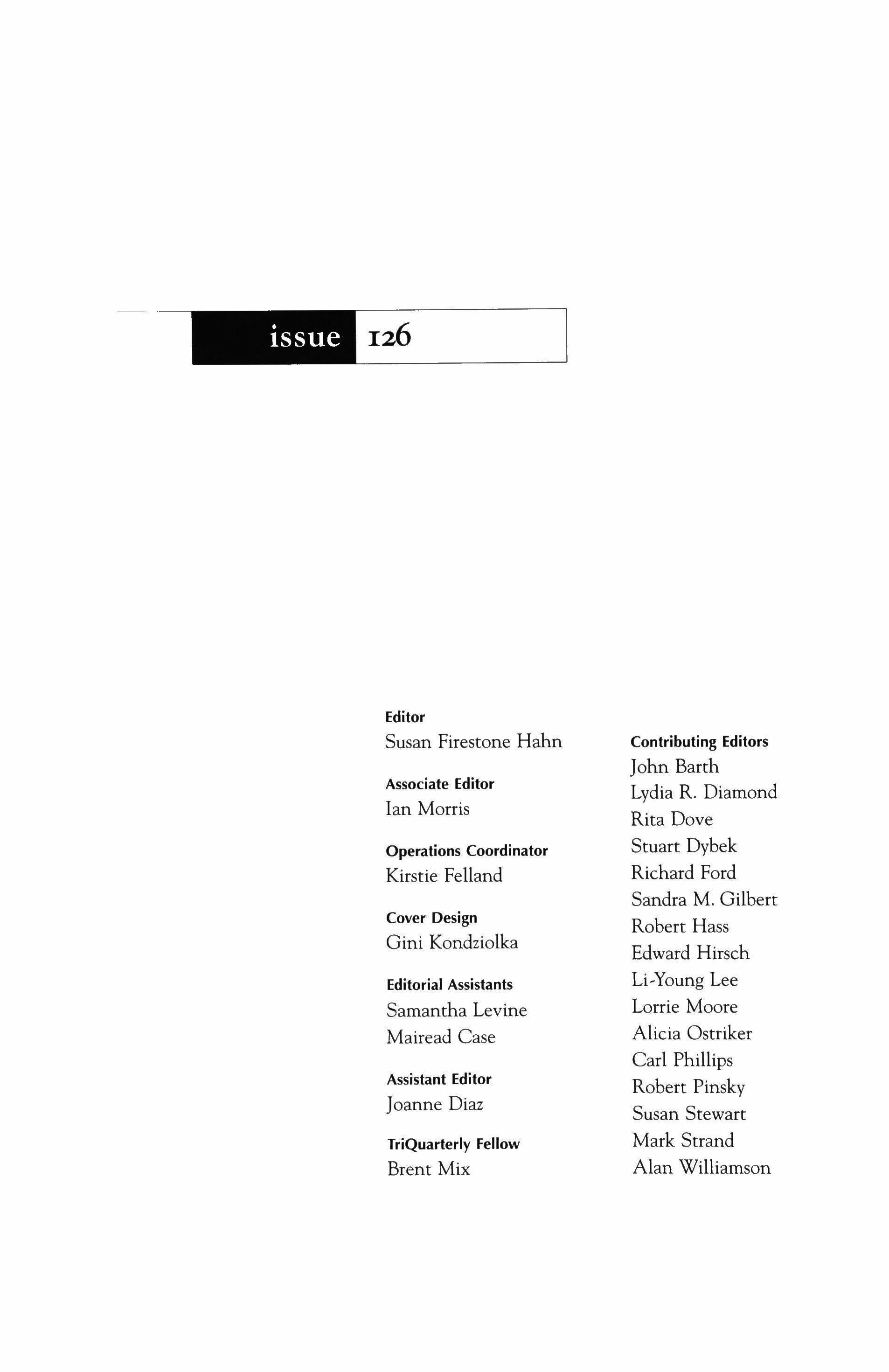
John Barth
Lydia R. Diamond
Rita Dove
Stuart Dybek
Richard Ford
Sandra M. Gilbert
Robert Hass
Edward Hirsch
Li-Young Lee
Lorrie Moore
Alicia Ostriker
Carl Phillips
Robert Pinsky
Susan Stewart
Mark Strand
Alan Williamson
126

poems

49 Non-canonical
Laurence Goldstein
55 Litany for the Legion of Unrelated People; Written in the Year of the Lake: A Murder; Worker Ants; Anonymous Self Portrait with Dead Animals; Mulberry Tree
Victoria Chang
62 The Missing; Autopoiesis; Briga D. Nurkse
66 Muses for Panic; Bereavement: 1919
Sandra McPherson
70 Fall of Rome; Alaric Intelligence Memo #36
Richard Kenney
I62 On Adoration and Envy; On the Problem of Distinction
Jessica Fisher
I64 Waiting for the Word; Nocturne; On a Drop of Rain
Robert Cording
167 Woman with Plum; Night, White and Gold for Louise Nevelson
Hadara Bar-Nadav
173 The Book of Sleep (IV); The Book of Sleep (XIII); The Book of Sleep (XV); "The World Was Created by Ten Utterances"
Eleanor Stanford
I77 Hospital; Spring, In Five Parts
Marianne Boruch
Contents
Michael
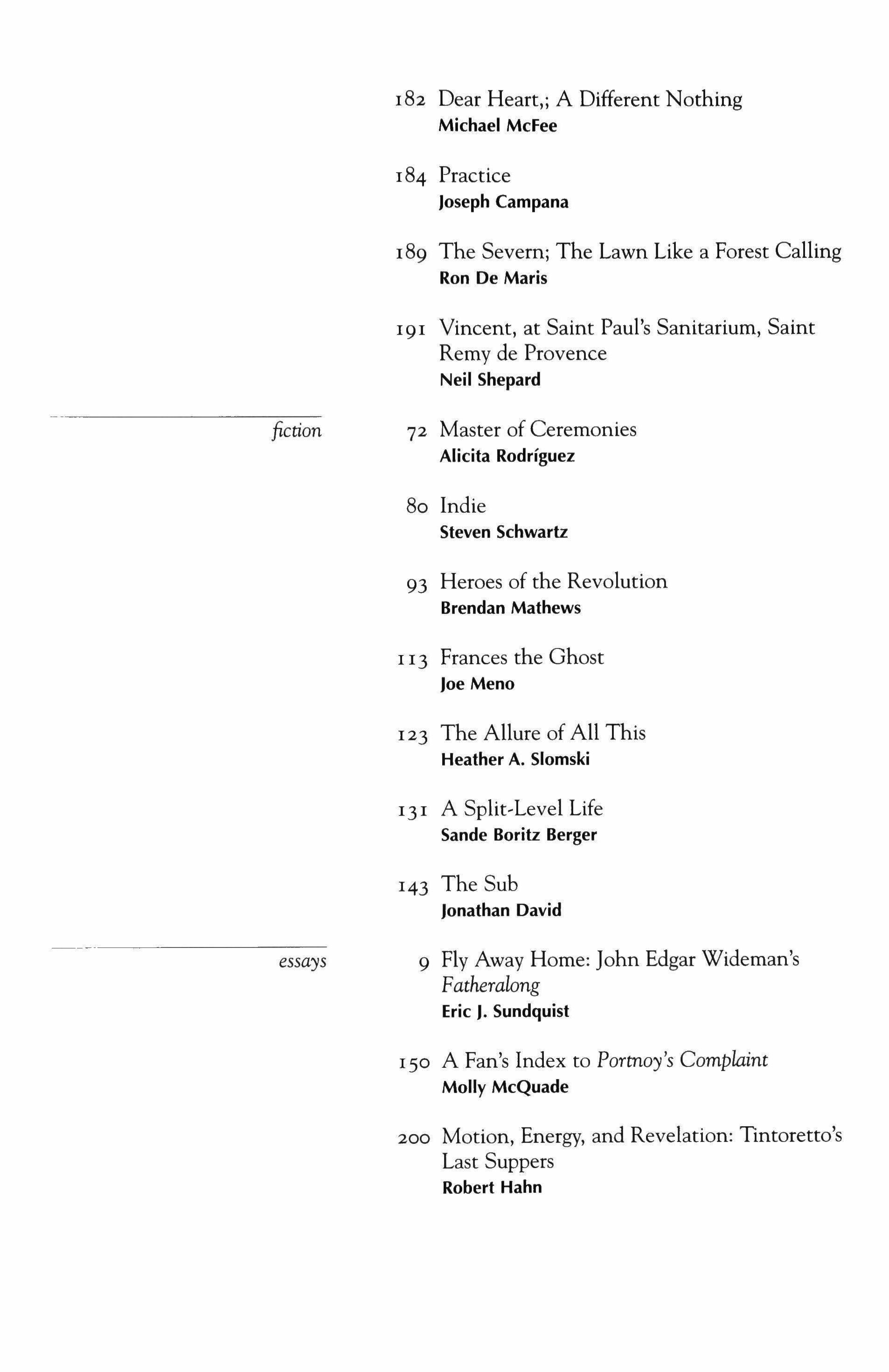
Sande
182
Nothing
Dear Heart,; A Different
McFee 184 Practice
Campana 189
191
fiction 72 Master of
Rodriguez 80 Indie Steven Schwartz 93 Heroes of the Revolution Brendan Mathews 113 Frances the Ghost
Meno 123 The
All This
A. Slomski 131 A Split-Level Life
Joseph
The Severn; The Lawn Like a Forest Calling Ron De Maris
Vincent, at Saint Paul's Sanitarium, Saint Remy de Provence Neil Shepard
Ceremonies Alicita
Joe
Allure of
Heather
Boritz Berger 143 The Sub
David essays 9 Fly Away Home: John Edgar Wideman's Fatheralong
J. Sundquist ISO
Index to
McQuade 200
Jonathan
Eric
A Fan's
Portnoy's Complaint Molly
Motion, Energy, and Revelation: Tintoretto's Last Suppers
Robert Hahn
translations 29 the professor's knife
Tadeusz Rozewicz
Translated from the Polish byJoanna Trzeciak
193 The Night Songs
Friedrich Hoideriin
Translated from the German by Maxine Chernoff and Paul Hoover

Cover: New Wave No.1, New Wave No.2, New Wave No.3, New Wave No.4, by Virginia Kondziolka: acrylic, chine colle and reflective glass beads that are mixed with the paint on Arches 300 lb. watercolor paper.

TriQuarterly is pleased to announce that Lee Roloff's oral essay, "Kurt Vonnegut on Stage at the Steppenwolf Theater, Chicago" (TriQuarterly 103), will be reprinted in Slaughterhouse� Five (Bloom Guides), edited by Harold Bloom (Chelsea House Publications, 2007).
and that Donna Seaman's essay, "Reflections from a Concrete Shore" (TriQuarterly 118), has been reprinted in Fresh Water: Women Writing on the Great Lakes, edited by Alison Swan (Michigan State University, 2006).
Eric]. SuruUJuist
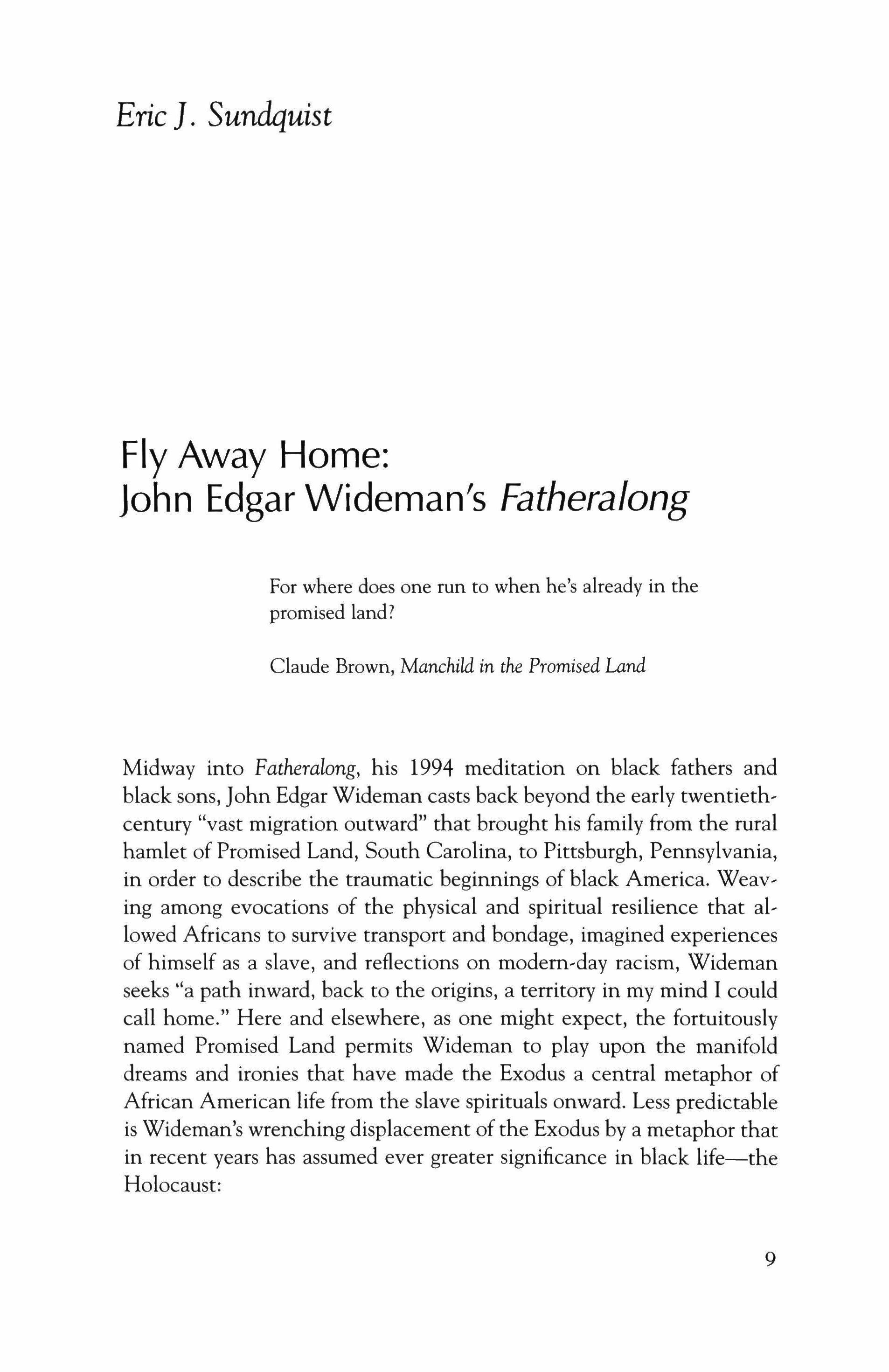
Fly Away Home:
John Edgar Wideman's Fatheralong
For where does one run to when he's already in the promised land?
Claude Brown, Manchild in the Promised Land
Midway into Fatheralong, his 1994 meditation on black fathers and black sons, John Edgar Wideman casts back beyond the early twentieth, century "vast migration outward" that brought his family from the rural hamlet of Promised Land, South Carolina, to Pittsburgh, Pennsylvania, in order to describe the traumatic beginnings of black America. Weav, ing among evocations of the physical and spiritual resilience that allowed Africans to survive transport and bondage, imagined experiences of himself as a slave, and reflections on modem,day racism, Wideman seeks "a path inward, back to the origins, a territory in my mind I could call home." Here and elsewhere, as one might expect, the fortuitously named Promised Land permits Wideman to play upon the manifold dreams and ironies that have made the Exodus a central metaphor of African American life from the slave spirituals onward. Less predictable is Wideman's wrenching displacement of the Exodus by a metaphor that in recent years has assumed ever greater significance in black life-the Holocaust:
9
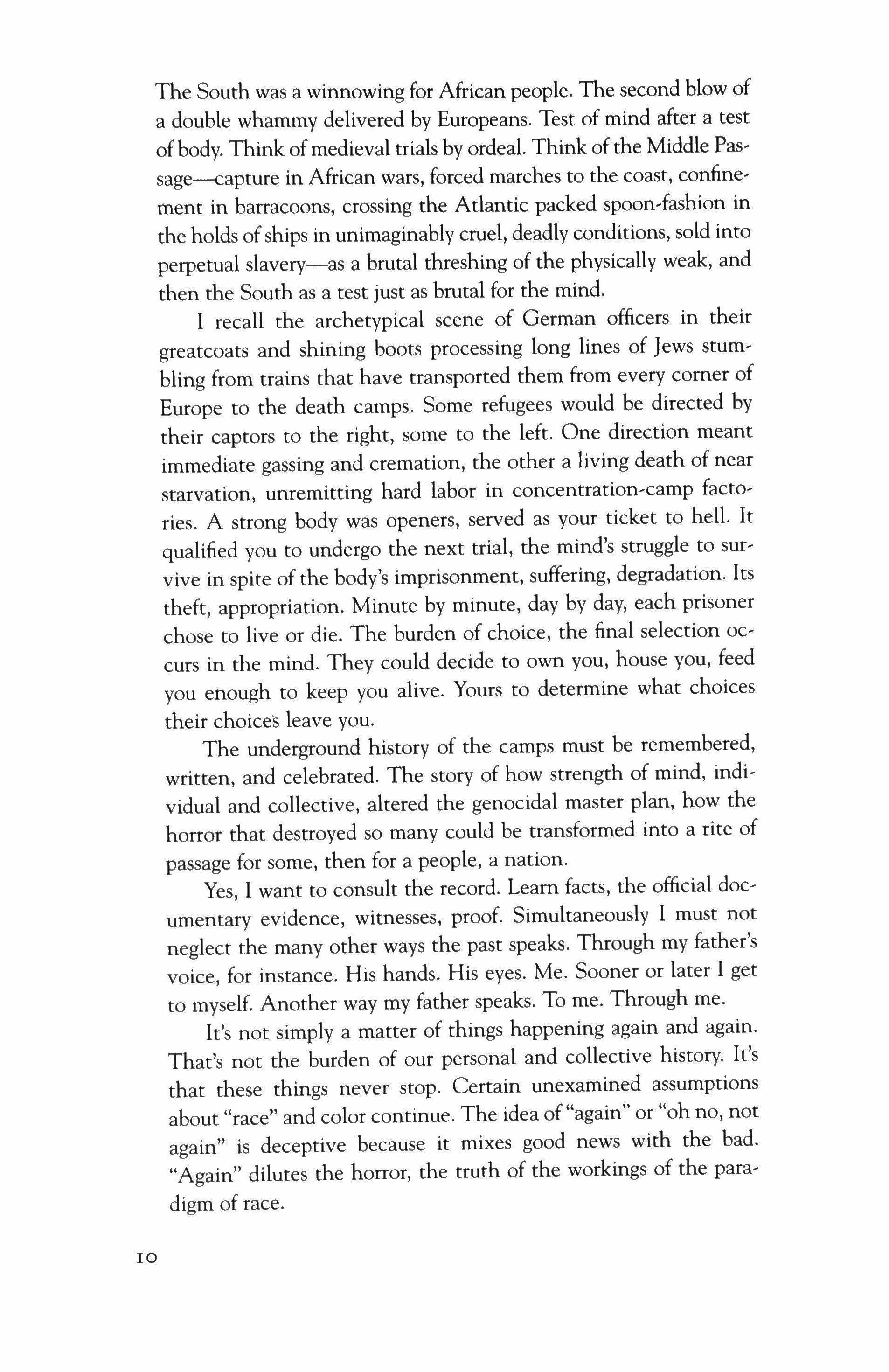
The South was a winnowing for African people. The second blow of a double whammy delivered by Europeans. Test of mind after a test ofbody. Think ofmedieval trials by ordeaL Think of the Middle Passage--capture in African wars, forced marches to the coast, confinement in barracoons, crossing the Atlantic packed spoon-fashion in the holds ofships in unimaginably cruel, deadly conditions, sold into perpetual slavery-as a brutal threshing of the physically weak, and then the South as a test just as brutal for the mind.
I recall the archetypical scene of German officers in their greatcoats and shining boots processing long lines of Jews stumbling from trains that have transported them from every comer of Europe to the death camps. Some refugees would be directed by their captors to the right, some to the left. One direction meant immediate gassing and cremation, the other a living death of near starvation, unremitting hard labor in concentration-camp factories. A strong body was openers, served as your ticket to helL It qualified you to undergo the next trial, the mind's struggle to survive in spite of the body's imprisonment, suffering, degradation. Its theft, appropriation. Minute by minute, day by day, each prisoner chose to live or die. The burden of choice, the final selection occurs in the mind. They could decide to own you, house you, feed you enough to keep you alive. Yours to determine what choices their choice'S leave you.
The underground history of the camps must be remembered, written, and celebrated. The story of how strength of mind, individual and collective, altered the genocidal master plan, how the horror that destroyed so many could be transformed into a rite of passage for some, then for a people, a nation.
Yes, I want to consult the record. Learn facts, the official documentary evidence, witnesses, proof. Simultaneously I must not neglect the many other ways the past speaks. Through my father's voice, for instance. His hands. His eyes. Me. Sooner or later I get to myself. Another way my father speaks. To me. Through me.
It's not simply a matter of things happening again and again. That's not the burden of our personal and collective history. It's that these things never stop. Certain unexamined assumptions about "race" and color continue. The idea of"again" or "oh no, not again" is deceptive because it mixes good news with the bad. "Again" dilutes the horror, the truth of the workings of the paradigm of race.
10
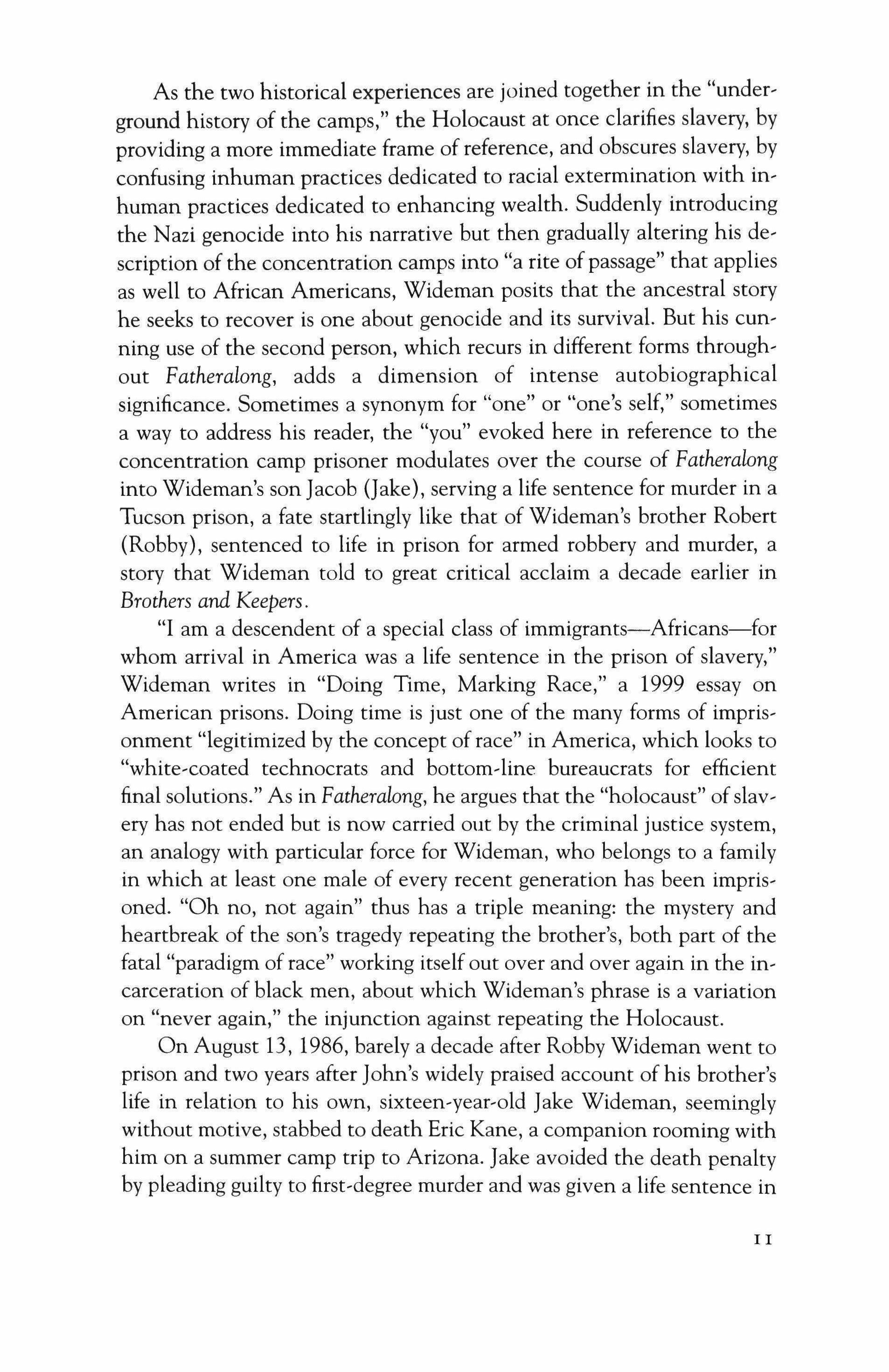
As the two historical experiences are joined together in the "underground history of the camps," the Holocaust at once clarifies slavery, by providing a more immediate frame of reference, and obscures slavery, by confusing inhuman practices dedicated to racial extermination with inhuman practices dedicated to enhancing wealth. Suddenly introducing the Nazi genocide into his narrative but then gradually altering his description of the concentration camps into "a rite ofpassage" that applies as well to African Americans, Wideman posits that the ancestral story he seeks to recover is one about genocide and its survival. But his cunning use of the second person, which recurs in different forms throughout Fatheralong, adds a dimension of intense autobiographical significance. Sometimes a synonym for "one" or "one's self," sometimes a way to address his reader, the "you" evoked here in reference to the concentration camp prisoner modulates over the course of Fatheralong into Wideman's son Jacob (Jake), serving a life sentence for murder in a Tucson prison, a fate startlingly like that of Wideman's brother Robert (Robby), sentenced to life in prison for armed robbery and murder, a story that Wideman told to great critical acclaim a decade earlier in Brothers and Keepers.
"I am a descendent of a special class of immigrants-Africans-for whom arrival in America was a life sentence in the prison of slavery," Wideman writes in "Doing Time, Marking Race," a 1999 essay on American prisons. Doing time is just one of the many forms of imprisonment "legitimized by the concept of race" in America, which looks to "white-coated technocrats and bottom-line bureaucrats for efficient final solutions." As in Fatheralong, he argues that the "holocaust" ofslavery has not ended but is now carried out by the criminal justice system, an analogy with particular force for Wideman, who belongs to a family in which at least one male of every recent generation has been imprisoned. "Oh no, not again" thus has a triple meaning: the mystery and heartbreak of the son's tragedy repeating the brother's, both part of the fatal "paradigm of race" working itself out over and over again in the incarceration of black men, about which Wideman's phrase is a variation on "never again," the injunction against repeating the Holocaust.
On August 13, 1986, barely a decade after Robby Wideman went to prison and two years after John's widely praised account of his brother's life in relation to his own, sixteen-year-old Jake Wideman, seemingly without motive, stabbed to death Eric Kane, a companion rooming with him on a summer camp trip to Arizona. Jake avoided the death penalty by pleading guilty to first-degree murder and was given a life sentence in
II

September 1988. {At the time Jake also confessed to an unsolved 1985 murder, but he later recanted.) In articles that appeared almost simultaneously the following year, Leslie Bennetts {writing in Vanity Fair} and Chip Brown {writing in Esquire} suggested that the favoritism shown by Wideman and his wife toward their older son, Daniel-who like his fa' ther before him was a top student and basketball star, though a less skilled player than his younger brother-and their decision to move back east because Daniel had been admitted to Brown University, was a precipitating factor in Jake's seemingly irrational crime. Both Bennetts and Brown portray the Widemans as self,absorbed and strangely cold in the relatively close community surrounding the University ofWyoming, where Wideman had taught since 1973. Their picture of the Widemans as preoccupied with their son's treatment and their own pain following the murder, but oblivious to the grief of the Kane family, is not countered by anything in Fatheralong or in Wideman's 1990 novel Philadel, phia Fire, likewise an investigation ofthe historically freighted, too often tragic relationships between black sons and black fathers in which Jake's crime and punishment also playa central role.
"You may believe I'm being presumptuous," Wideman wrote in a let, ter to the Kanes, who thought Jake should get the death penalty, "that I'm offending you by proffering my forgiveness," when instead "I should be begging for yours." Yet he asked for no forgiveness and offered no apology, choosing to express his communion in suffering through an elegant, esoteric prose in which questions of blame are attenuated {"per' haps in your view, Jake is the cause of Eric's death and, therefore, deserves to be punished"} and causality is mystified {"what possible pur, pose is served when people become victims or perpetrators of senseless violence?"}. Wideman's letter would remain the private message of shared anguish it was surely intended to be did it not adumbrate so clearly the peculiarly irresponsible autobiographical voice featured in Fatheralong, as in Philadelphia Fire before it. In both books, black life, from the Middle Passage through the contemporary penal system, is portrayed as never-ending subjection to a "final solution"; in both, questions of responsibility, guilt, and remorse form an ineluctable riddle centuries in the making.
"I am the father of my son," Wideman writes in Philadelphia Fire. "Son's father. Father's son. An interchangeability that is also depend, ence: the loss of one is the loss of both." The chiasmus of "Son's father. Father's son," a figure that reappears in Fatheralong, defines a pathological repetition in which Wideman the "good" seed is thrust harshly into
12

the role of father of the "bad" seed, the one chosen in this generation to fulfill the terrible anti-promise of family and nation. As in Philadelphia Fire, the search for a lost self in Fatheralong comprises a search for lost sons, brothers, and fathers at once personal and representative. From E. Franklin Frazier to Kenneth Clark to Daniel Patrick Moynihan to Orlando Patterson, critiques of the black family have portrayed it as wracked by inherited patterns of psychological damage and paternal irresponsibility relegating fathers to a fated, futile cycle-"fathers in exile, in hiding, on the run, anonymous, undetermined, dead"-and turning the nation into a "vast orphanage" in which the official policy is "to keep [the] inmates confused by concealing from them their biological origins." The archetype of the African America filial relationship today is "the child visiting prison, speaking to his incarcerated father through a baffle in a filthy Plexiglas screen." But surely the reverse-a father visiting his son in prison-is the more awful, soul-wrenching event.
Pearls That Were His Eyes
As a boy, Wideman resisted his grandfather's proposal to make a trip to Promised Land-"No thanks, Grandpa. I don't think I want to travel back to slavery days this summer"-but Wideman the adult has a different attitude toward the "roots thing." Having already spent a brief time researching his family's origins while on a lecture tour in the South, he persuades his estranged father, Edgar Wideman, to make a family pilgrimage, repeating the journey that Edgar had made as a child with his own father. The journey thus embeds an essential feature of Brothers and Keepers and Philadelphia Fire-the black community's precarious patrilineal order, from the Middle Passage to the modem black ghetto-in an equally precarious epistemological journey back to the region that Wideman now describes in Fatheralong as "a parent, an engenderer, part of the mind I think with, the mind thinking me."
His pilgrimage reverses the 1906 journey ofhis paternal grandfather, Harry, to Pittsburgh, part of the massive migration of African Americans from the agricultural South to what Frazier called the "cities of destruction" in the industrial North over the early decades of the twentieth century (the black population of Pittsburgh increased by nearly fifty thousand between 1910 and 1930). Fatheralong thus takes its place in the genre that Robert Stepto has designated the narrative of immersion, wherein a ritualized return to the South, actual or symbolic,
I3
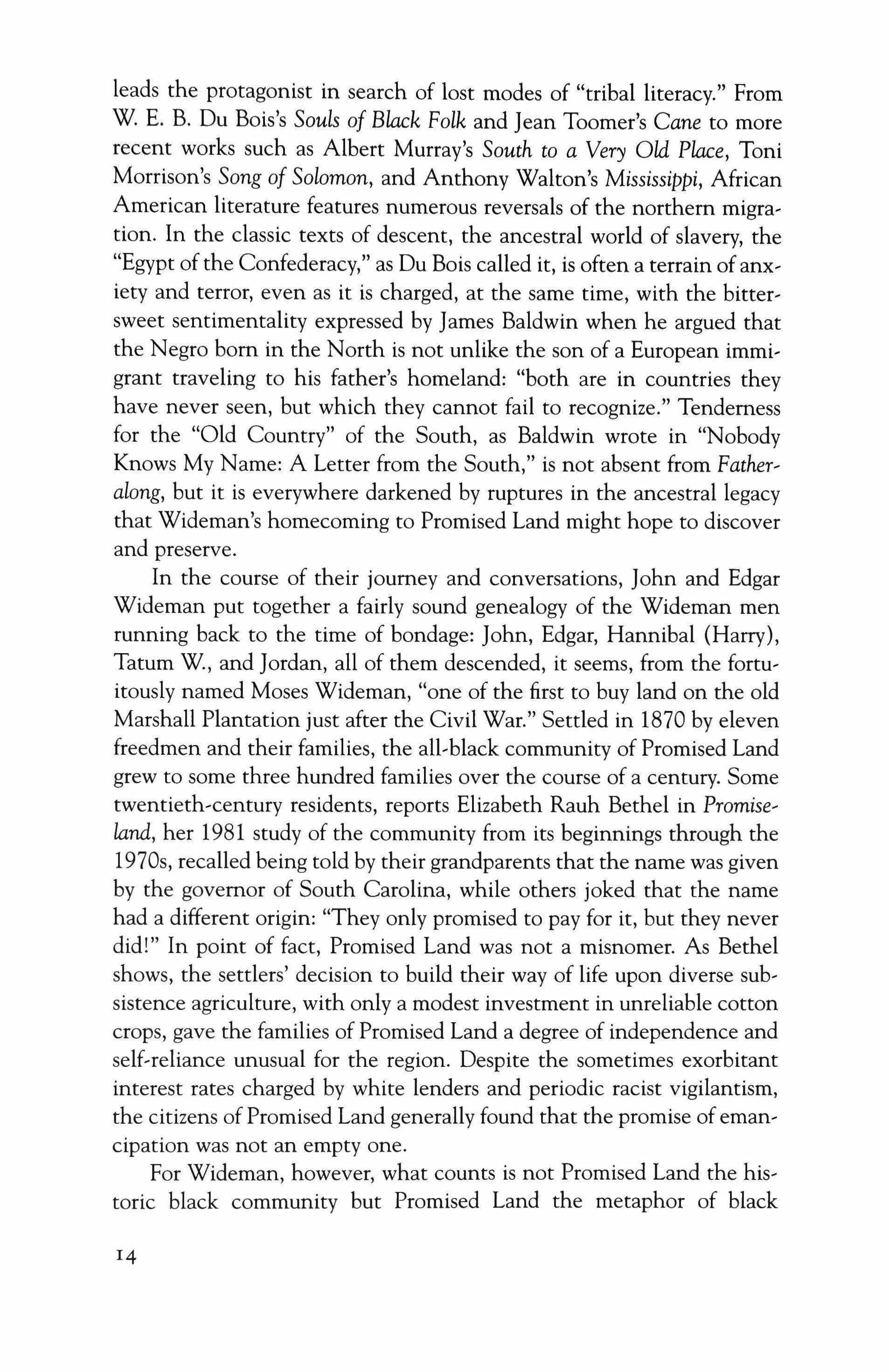
leads the protagonist in search of lost modes of "tribal literacy." From W. E. B. Du Bois's Souls of Black Folk and Jean Toomer's Cane to more recent works such as Albert Murray's South to a Very Old Place, Toni Morrison's Song of Solomon, and Anthony Walton's MississiPPi, African American literature features numerous reversals of the northern migration. In the classic texts of descent, the ancestral world of slavery, the "Egypt of the Confederacy," as Du Bois called it, is often a terrain of anxiety and terror, even as it is charged, at the same time, with the bittersweet sentimentality expressed by James Baldwin when he argued that the Negro born in the North is not unlike the son of a European immigrant traveling to his father's homeland: "both are in countries they have never seen, but which they cannot fail to recognize." Tenderness for the "Old Country" of the South, as Baldwin wrote in "Nobody Knows My Name: A Letter from the South," is not absent from Fatheralong, but it is everywhere darkened by ruptures in the ancestral legacy that Wideman's homecoming to Promised Land might hope to discover and preserve.
In the course of their journey and conversations, John and Edgar Wideman put together a fairly sound genealogy of the Wideman men running back to the time of bondage: John, Edgar, Hannibal (Harry), Tatum W., and Jordan, all of them descended, it seems, from the fortuitously named Moses Wideman, "one of the first to buy land on the old Marshall Plantation just after the Civil War." Settled in 1870 by eleven freedmen and their families, the all-black community of Promised Land grew to some three hundred families over the course of a century. Some twentieth-century residents, reports Elizabeth Rauh Bethel in Promiseland, her 1981 study of the community from its beginnings through the 1970s, recalled being told by their grandparents that the name was given by the governor of South Carolina, while others joked that the name had a different origin: "They only promised to pay for it, but they never did!" In point of fact, Promised Land was not a misnomer. As Bethel shows, the settlers' decision to build their way of life upon diverse subsistence agriculture, with only a modest investment in unreliable cotton crops, gave the families of Promised Land a degree of independence and self-reliance unusual for the region. Despite the sometimes exorbitant interest rates charged by white lenders and periodic racist vigilantism, the citizens of Promised Land generally found that the promise of emancipation was not an empty one.
For Wideman, however, what counts is not Promised Land the historic black community but Promised Land the metaphor of black
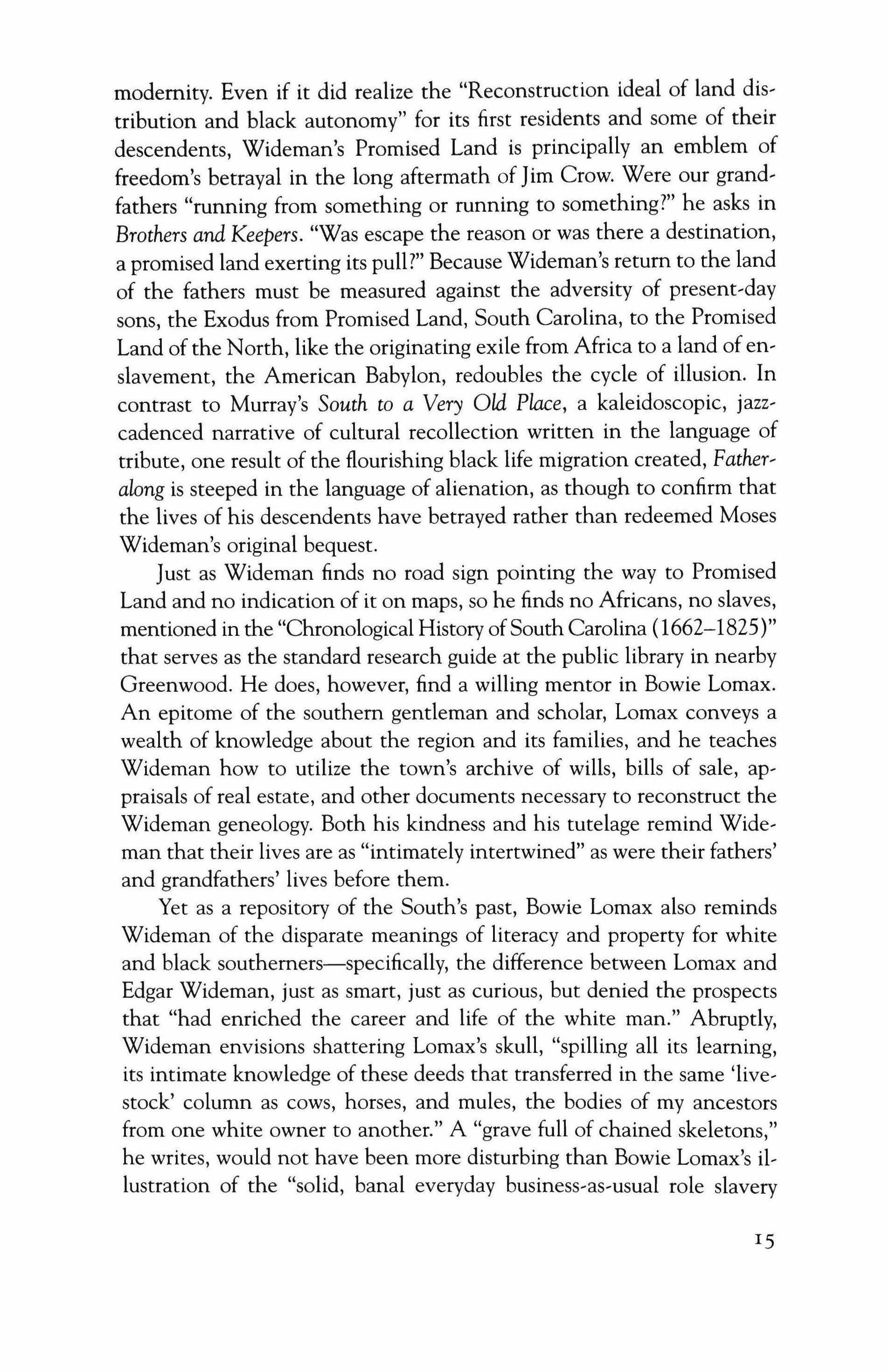
modernity. Even if it did realize the "Reconstruction ideal of land dis, tribution and black autonomy" for its first residents and some of their descendents, Wideman's Promised Land is principally an emblem of freedom's betrayal in the long aftermath of Jim Crow. Were our grand, fathers "running from something or running to something?" he asks in Brothers and Keepers. "Was escape the reason or was there a destination, a promised land exerting its pull?" Because Wideman's return to the land of the fathers must be measured against the adversity of present-day sons, the Exodus from Promised Land, South Carolina, to the Promised Land of the North, like the originating exile from Africa to a land of en, slavement, the American Babylon, redoubles the cycle of illusion. In contrast to Murray's South to a Very Old Place, a kaleidoscopic, jazz, cadenced narrative of cultural recollection written in the language of tribute, one result of the flourishing black life migration created, Father, along is steeped in the language of alienation, as though to confirm that the lives of his descendents have betrayed rather than redeemed Moses Wideman's original bequest.
Just as Wideman finds no road sign pointing the way to Promised Land and no indication of it on maps, so he finds no Africans, no slaves, mentioned in the "Chronological History ofSouth Carolina (1662-1825)" that serves as the standard research guide at the public library in nearby Greenwood. He does, however, find a willing mentor in Bowie Lomax. An epitome of the southern gentleman and scholar, Lomax conveys a wealth of knowledge about the region and its families, and he teaches Wideman how to utilize the town's archive of wills, bills of sale, appraisals of real estate, and other documents necessary to reconstruct the Wideman geneology. Both his kindness and his tutelage remind Wide, man that their lives are as "intimately intertwined" as were their fathers' and grandfathers' lives before them.
Yet as a repository of the South's past, Bowie Lomax also reminds Wideman of the disparate meanings of literacy and property for white and black southerners-specifically, the difference between Lomax and Edgar Wideman, just as smart, just as curious, but denied the prospects that "had enriched the career and life of the white man." Abruptly, Wideman envisions shattering Lomax's skull, "spilling all its learning, its intimate knowledge of these deeds that transferred in the same 'live, stock' column as cows, horses, and mules, the bodies of my ancestors from one white owner to another." A "grave full of chained skeletons," he writes, would not have been more disturbing than Bowie Lomax's illustration of the "solid, banal everyday business,as,usual role slavery
15

played in America's past. Meticulously, unashamedly, the perpetrators had preserved evidence of their crimes."
The reference here, of course, is to Hannah Arendt's notorious portrait of Adolf Eichmann as the personification of the "banality of evil," while the archival evidence of slavery's mundane transactions remind Wideman that the Nazis scrupulously archived the procedures of the Holocaust-to the point of collecting materials for a museum of[udaica so as to document their triumph over an people who, when annihilated, would be remembered only in a Nazi version of their historical significance. Standing for the white suppression of black history, Lomax pro, vides a way for Wideman to delineate the kinship of master and slave, at once symbiotic and subordinating, and with it the analogous relation to the master's language in which the black writer is inevitably caught. Insofar as it is dependent upon the slavery practiced by his ancestors, Lomax's career as professor and local historian, says Wideman, makes him no less the slave master: "Hadn't the historian's career been one more mode of appropriation and exploitation of my father's bones, the pearls that were his eyes. Didn't the power and privilege to tell my father's story follow from the original sin of slavery that stole, then silenced, my father's voice?"
In his allusion to T. S. Eliot's line from The Waste Land-"Those are pearls that were his eyes"-Wideman summons up, through Eliot's own allusion to The Tempest, one of his favorite texts. Like Philadelphia Fire before it, Fatheralong includes numerous references to Euro-American literature, the canonical tradition whose "collective psyche," as Wide, man remarked in a 1995 interview with Michael Silverblatt, he absorbed as a student and then reworked under the influence of black father figures such as Richard Wright, James Baldwin, and Ralph Ellison in order to find his own voice. Because their fathers' stories, like their songs and their bodies, can be "stolen, silenced, alienated from them, sold, corrupted," African Americans must recognize that white masters such as Shakespeare, Eliot, and Joyce, like the white masters of the plan, tation South, cannot be disregarded but only imaginatively, antagonisticallyengaged.
Recent interpretations of Shakespeare's fable have focused on its prefiguring of colonialism and slavery in the Americas, with particular attention to the rebellious energy, as well as the peculiar eloquence, of Caliban-a prototype of the slave, the colonial subject, and, at length, the postcolonial firebrand. In Philadelphia Fire, a guerilla children's the, ater thus performs the playas social critique, with fractured families and
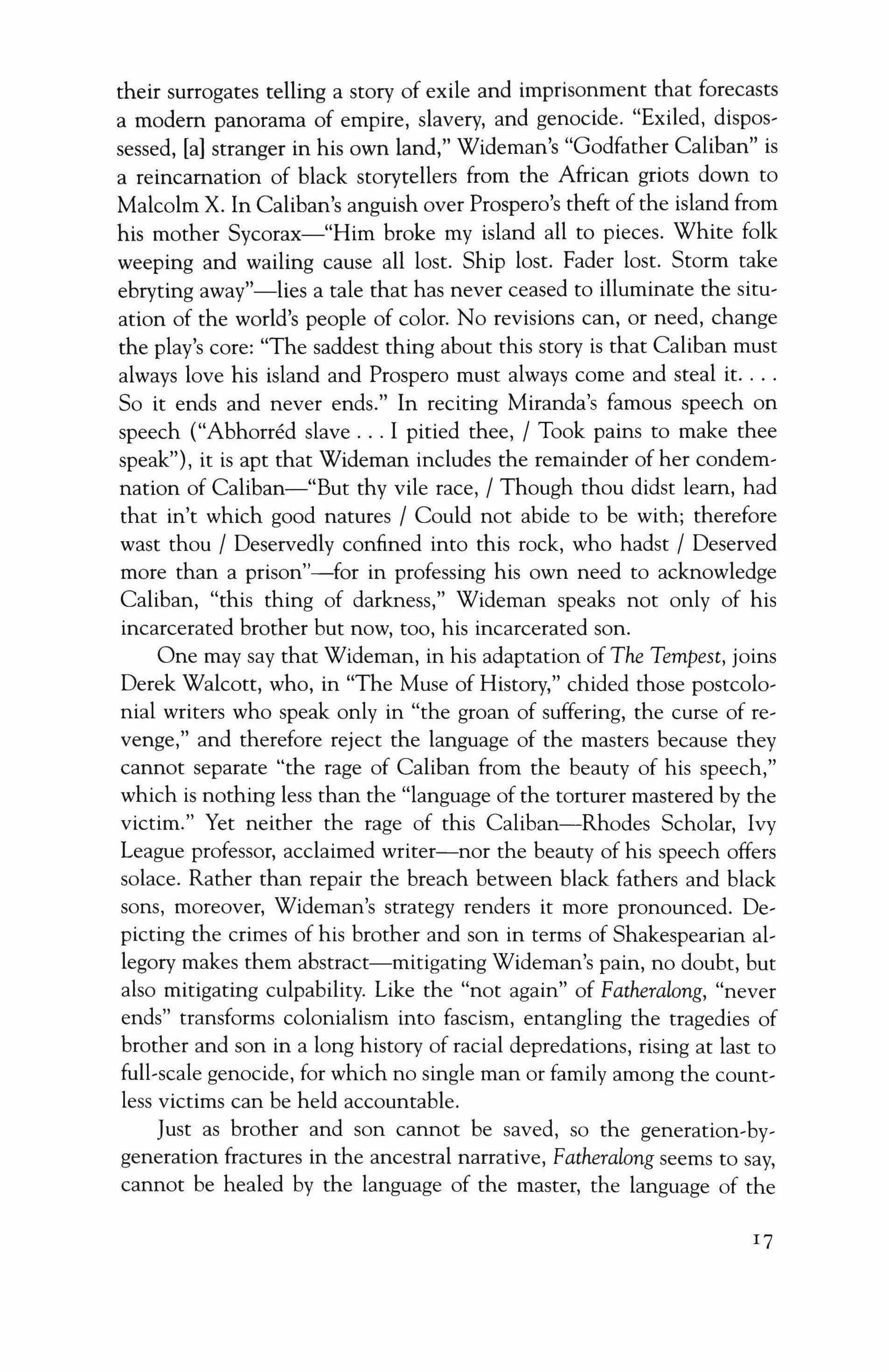
their surrogates telling a story of exile and imprisonment that forecasts a modem panorama of empire, slavery, and genocide. "Exiled, dispossessed, [a] stranger in his own land," Wideman's "Godfather Caliban" is a reincarnation of black storytellers from the African griots down to Malcolm X. In Caliban's anguish over Prospero's theft of the island from his mother Sycorax-"Him broke my island all to pieces. White folk weeping and wailing cause all lost. Ship lost. Fader lost. Storm take ebryting away"-lies a tale that has never ceased to illuminate the situ, ation of the world's people of color. No revisions can, or need, change the play's core: "The saddest thing about this story is that Caliban must always love his island and Prospero must always come and steal it So it ends and never ends." In reciting Miranda's famous speech on speech ("Abhorred slave I pitied thee, / Took pains to make thee speak"), it is apt that Wideman includes the remainder of her condemnation of Caliban-"But thy vile race, / Though thou didst learn, had that in't which good natures / Could not abide to be with; therefore wast thou / Deservedly confined into this rock, who hadst / Deserved more than a prison"-for in professing his own need to acknowledge Caliban, "this thing of darkness," Wideman speaks not only of his incarcerated brother but now, too, his incarcerated son.
One may say that Wideman, in his adaptation of The Tempest, joins Derek Walcott, who, in "The Muse of History," chided those postcolonial writers who speak only in "the groan of suffering, the curse of revenge," and therefore reject the language of the masters because they cannot separate "the rage of Caliban from the beauty of his speech," which is nothing less than the "language of the torturer mastered by the victim." Yet neither the rage of this Caliban-Rhodes Scholar, Ivy League professor, acclaimed writer-nor the beauty of his speech offers solace. Rather than repair the breach between black fathers and black sons, moreover, Wideman's strategy renders it more pronounced. De, picting the crimes of his brother and son in terms of Shakespearian allegory makes them abstract-mitigating Wideman's pain, no doubt, but also mitigating culpability. Like the "not again" of Fatheralong, "never ends" transforms colonialism into fascism, entangling the tragedies of brother and son in a long history of racial depredations, rising at last to full,scale genocide, for which no single man or family among the count, less victims can be held accountable.
Just as brother and son cannot be saved, so the generation-bygeneration fractures in the ancestral narrative, Fatheralong seems to say, cannot be healed by the language of the master, the language of the
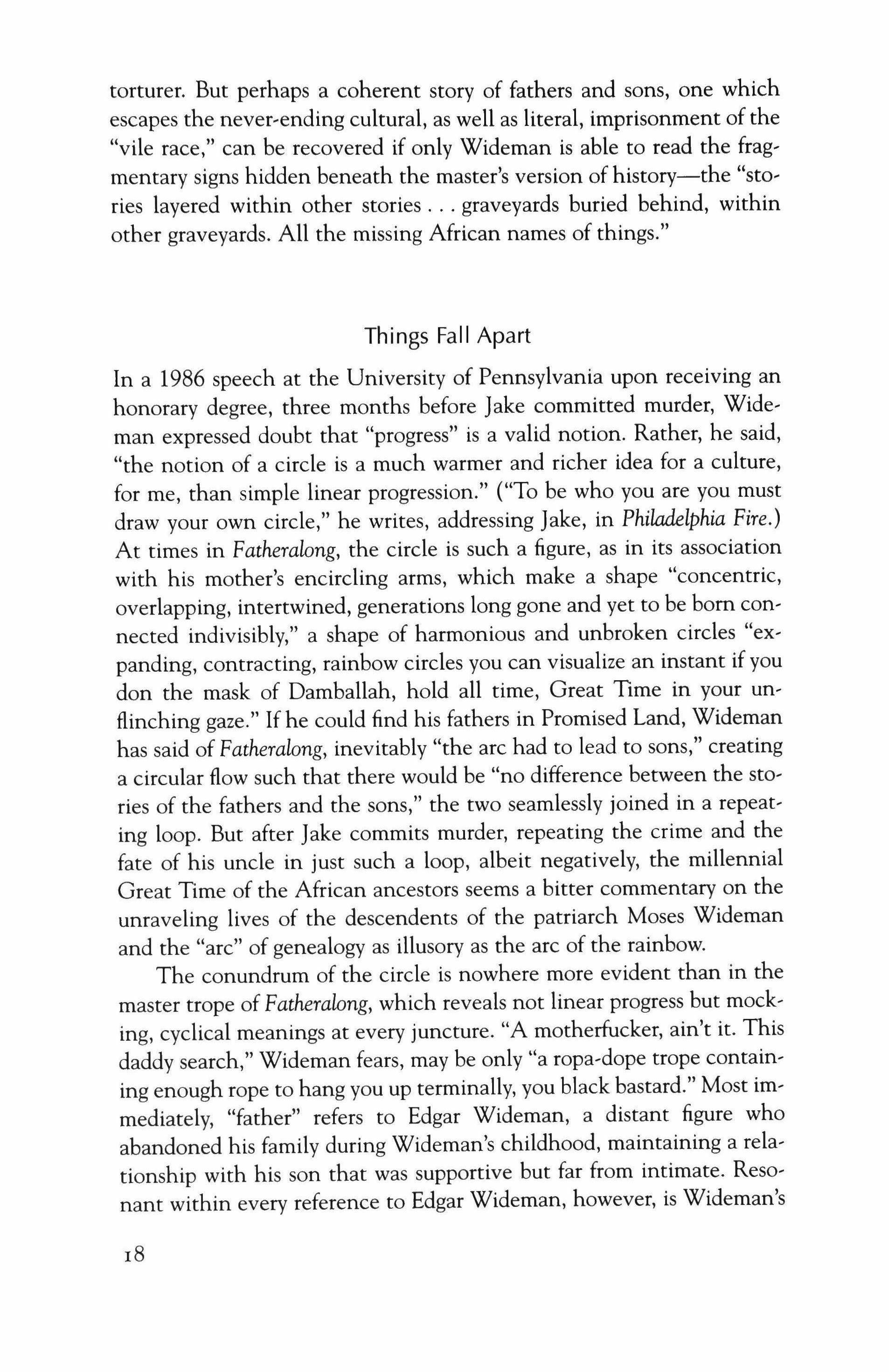
torturer. But perhaps a coherent story of fathers and sons, one which escapes the never-ending cultural, as well as literal, imprisonment of the "vile race," can be recovered if only Wideman is able to read the fragmentary signs hidden beneath the master's version of history-the "stories layered within other stories graveyards buried behind, within other graveyards. All the missing African names of things."
Things Fall Apart
In a 1986 speech at the University of Pennsylvania upon receiving an honorary degree, three months before Jake committed murder, Wideman expressed doubt that "progress" is a valid notion. Rather, he said, "the notion of a circle is a much warmer and richer idea for a culture, for me, than simple linear progression." ("To be who you are you must draw your own circle," he writes, addressing Jake, in Philadelphia Fire.) At times in Fatheralong, the circle is such a figure, as in its association with his mother's encircling arms, which make a shape "concentric, overlapping, intertwined, generations long gone and yet to be born connected indivisibly," a shape of harmonious and unbroken circles "expanding, contracting, rainbow circles you can visualize an instant if you don the mask of Damballah, hold all time, Great Time in your unflinching gaze." Ifhe could find his fathers in Promised Land, Wideman has said of Fatheralong, inevitably "the arc had to lead to sons," creating a circular flow such that there would be "no difference between the stories of the fathers and the sons," the two seamlessly joined in a repeating loop. But after Jake commits murder, repeating the crime and the fate of his uncle in just such a loop, albeit negatively, the millennial Great Time of the African ancestors seems a bitter commentary on the unraveling lives of the descendents of the patriarch Moses Wideman and the "arc" of genealogy as illusory as the arc of the rainbow. The conundrum of the circle is nowhere more evident than in the master trope of Fatheralong, which reveals not linear progress but mocking, cyclical meanings at every juncture. "A motherfucker, ain't it. This daddy search," Wideman fears, may be only "a ropa-dope trope containing enough rope to hang you up terminally, you black bastard." Most immediately, "father" refers to Edgar Wideman, a distant figure who abandoned his family during Wideman's childhood, maintaining a relationship with his son that was supportive but far from intimate. Resonant within every reference to Edgar Wideman, however, is Wideman's

portrayal of himself as a father, the two of them inscribed in a historic lineage in which connections can be made, the crude genealogy filled in, but in which it is not possible to discern sequential or causal mean' ing, and from which no sustaining spiritual typology can be derived. "The Daddy I blessed, the Father in the Lord's Prayer," Wideman recalls, referring both to the heavenly Father and the real father, "were words said aloud, about someone absent."
An early childhood episode, in which Wideman innocently calls his father a "spoor," only to be smacked in the face for his unknowing insolence, is illustrative. Although Wideman the boy meant to convey only something "vaporous" by the word he picked up from Tarzan books, Wideman the writer means something else in the words he puts in his young mouth: "It's the trail they follow when they hunt some elephant or something." His father's anger, as he remembers, revealed to him not only the tricky instability of words but also their power to reveal signifying truths. The opposite of its homonym "spore," which might stand for the vitality of insemination-even the enlivening, transcendent nationhood of the black "diaspora," its etymological cognate-"spoor" is, instead, redolent with connotations linking animal feces to degraded origins in Africa, mercilessly deriding the actual father even as Wide, man holds forth the abstraction of "father" as the key to his own and his people's elusive identity.
Wideman's reestablishment of a bond with his northern father through the journey south, back through his familial diaspora and in quest of his beginnings in the African diaspora, is partial at best. The stories told in Fatheralong are less a proof of that bond than a substitute for it, standing weakly in place of the filial relation he has not hadand that he has now lost with his younger son. The book's evocative but perplexing title is the central instance of this ambivalence. Drawn from Wideman's childhood misunderstanding of the gospel song titled "Farther Along" as "Fatheralong," the mistake fuses the distant, mysterious God who dwelled in the Homewood African Methodist Episcopal Zion Church with the distant, unfamiliar father, Edgar Wideman. By the time he comes to deploy it in his memoir, however, the gospel song has taken on a more complex and darker meaning. In its message that earthly suffering will be understood only in the afterlife, "Farther Along" speaks of the mystery of affliction when "death has come and taken all our loved ones," while at the same time the Lord permits the prosperity of those "living wicked year after year." The song's chorus counsels patience and redemptive hope: "Farther along, we'll know
19

more about it. / Farther along, we'll understand why. / Cheer up, don't worry, live in the sunshine. / We'll understand it all, by and by." But in the 1956 version by Sam Cooke and the Soul Stirrers cited by Wide, man, the variation of "Cheer up, my brother, live in the sunshine," had to seem all the more painfully hollow in view of the incarceration ofhis brother and his son.
In his journey south and his journey within, the duplicity of "Fa, theralong" makes Wideman's narrative of immersion simultaneously personal and eschatological. The ever,receding horizon of the march to Canaan-the "dream deferred" generation after generation, as Langston Hughes styled it-is bound up in the ever-receding promise of nurturing fatherhood, which points forward and backward at the same time. Sam Cooke's recording of "Farther Along" reminds Wideman of an arcing rainbow, and this figure of the covenant, which had already appeared with special destructive potency in Philadelphia Fire, at length evaporates into the dreamtime of an African past. "By and by" is when deliverance will arrive, says Wideman, "the unbound Great Time of our African an, cestors," or what he heard in Bob Marley's adaptation of "I'll Fly Away" (in "Rasta Man Chant"): "One bright morning when my work is over / I will flyaway home."
In its traditional lyrics, "I'll Fly Away" points first of all to the after, life: "Some glad morning when this life is over, / I'll flyaway / To a home on God's celestial shore." In Wideman's use, however, the parallel "home" of Africa, more or less implicit in any number of spirituals and gospel songs, comes quickly to the fore. Even more powerfully than the South, it may be hoped, Africa will prove to be the redemptive home, land, the unsullied, unencumbered place of black origins. In Paule Mar, shall's Praisesong for the Widow and Morrison's Song of Solomon, to cite two contemporary examples, the mythic flight to Africa is an ernboldening legend of recovery-lost ancestral arts reborn in modem story' telling with a spiritual force that reconciles the biblical Exodus with African exile. In Fatheralong, however, the Great Time of African an' cestry, what English captures in the elusive and mysterious phrase "the fullness of time," is projected in so deracinated a form that its value comes to seem purely conceptual.
Wideman refers to Chinua Achebe's anti-colonial novel Things Fall Apart in order to suggest that "father stories" such as the one he is writing are about establishing origins and thus "legitimizing claims of ownership, occupancy and identity." At the outset of Achebe's novel, the wrestling match between the hero, Okonkwo, and Amalinze the
20

Cat is likened to the ancient match between the clan's founder and the spirit of the wild that established the right to settle the land. Okonkwo's victory, in Wideman's characterization, reiterates that of the founder-it is "an intersection like the one drawn with chalk on an earthen floor to summon Loa, like the crossroads sacred to Damballah where the living and the dead pass one another, like the X Malcolm chose to signify being lost and found." Identified in Haiti, according to Zora Neale Hurston, as "Moses, the serpent god," Damballah, god of rainbows, lightning, and fertility, is a benevolent deity who holds past and present in harmony. His preserving power was clearly in evidence when Wideman chose Damballah as the title of a 1981 short story collection dedicated to Robby. In a preface that takes the form of a letter to his imprisoned brother, Wideman quotes from Divine Horseman, Maya Deren's study of Haitian voodoo: "Damballah Wedo is the ancient, the venerable father; so ancient, so venerable, as of a world before the troubles began; and his children would keep him so; image of the benevolent, paternal innocence, the great father of whom one asks nothing save his blessing To invoke [Damballah and his pantheon] today is to stretch one's hand back to that time and to gather up all history into a solid, contemporary ground beneath one's feet."
"Who are the truly dead?" Wideman asks in Fatheralong. He would be the American voice of the dead as Achebe is the African voice; he would stretch his hand back in time, gather up all history, and become the "conduit of traditional wisdom that teaches the dead are those who don't speak and are not spoken of, those not connected by vital words, those whom the stories have forgotten, who have forgotten the stories." His stories, that is to say, would remember his own dead-those who do not speak and are not spoken of, like the lost brother, the lost son. Through his stories "ancestral spirits" alive in the rhythms of African music and oratory would reassert themselves, as they do in black American jazz dance or the "choreography of a fast-break slam dunk on a playground basketball court"-what "happened once in a certain righteous fashion striving to happen righteously again. Father son. Son father." Even as it suggests again that the loss of one is the loss of the other, the chiasmus of "Father son. Son father" here holds forth the possibility that at the crossroads with an African past-Malcolm's transitional X between the discarded history of slavery and the future invented by righteous black folk-will be found the secret of black salvation.
2I
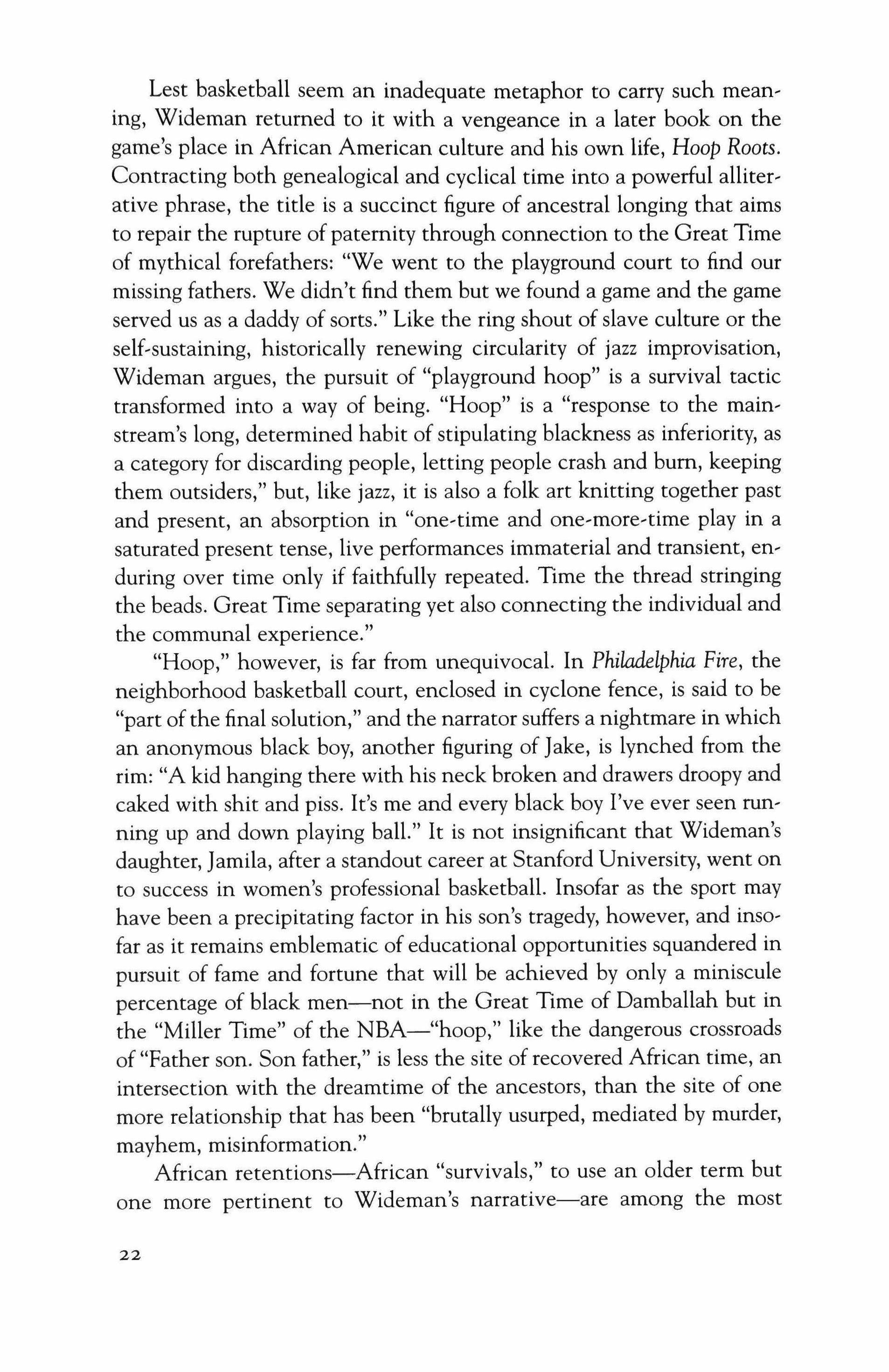
Lest basketball seem an inadequate metaphor to carry such meaning, Wideman returned to it with a vengeance in a later book on the game's place in African American culture and his own life, Hoop Roots. Contracting both genealogical and cyclical time into a powerful alliterative phrase, the title is a succinct figure of ancestral longing that aims to repair the rupture of paternity through connection to the Great Time of mythical forefathers: "We went to the playground court to find our missing fathers. We didn't find them but we found a game and the game served us as a daddy of sorts." Like the ring shout of slave culture or the self-sustaining, historically renewing circularity of jazz improvisation, Wideman argues, the pursuit of "playground hoop" is a survival tactic transformed into a way of being. "Hoop" is a "response to the mainstream's long, determined habit of stipulating blackness as inferiority, as a category for discarding people, letting people crash and burn, keeping them outsiders," but, like jazz, it is also a folk art knitting together past and present, an absorption in "one-time and one-more-time play in a saturated present tense, live performances immaterial and transient, enduring over time only if faithfully repeated. Time the thread stringing the beads. Great Time separating yet also connecting the individual and the communal experience."
"Hoop," however, is far from unequivocal. In Philadelphia Fire, the neighborhood basketball court, enclosed in cyclone fence, is said to be "part of the final solution," and the narrator suffers a nightmare in which an anonymous black boy, another figuring of Jake, is lynched from the rim: "A kid hanging there with his neck broken and drawers droopy and caked with shit and piss. It's me and every black boy I've ever seen running up and down playing ball." It is not insignificant that Wideman's daughter, Jamila, after a standout career at Stanford University, went on to success in women's professional basketball. Insofar as the sport may have been a precipitating factor in his son's tragedy, however, and insofar as it remains emblematic of educational opportunities squandered in pursuit of fame and fortune that will be achieved by only a miniscule percentage of black men-not in the Great Time of Damballah but in the "Miller Time" of the NBA-"hoop," like the dangerous crossroads of "Father son. Son father," is less the site of recovered African time, an intersection with the dreamtime of the ancestors, than the site of one more relationship that has been "brutally usurped, mediated by murder, mayhem, misinformation."
African retentions-African "survivals," to use an older term but one more pertinent to Wideman's narrative-are among the most
22
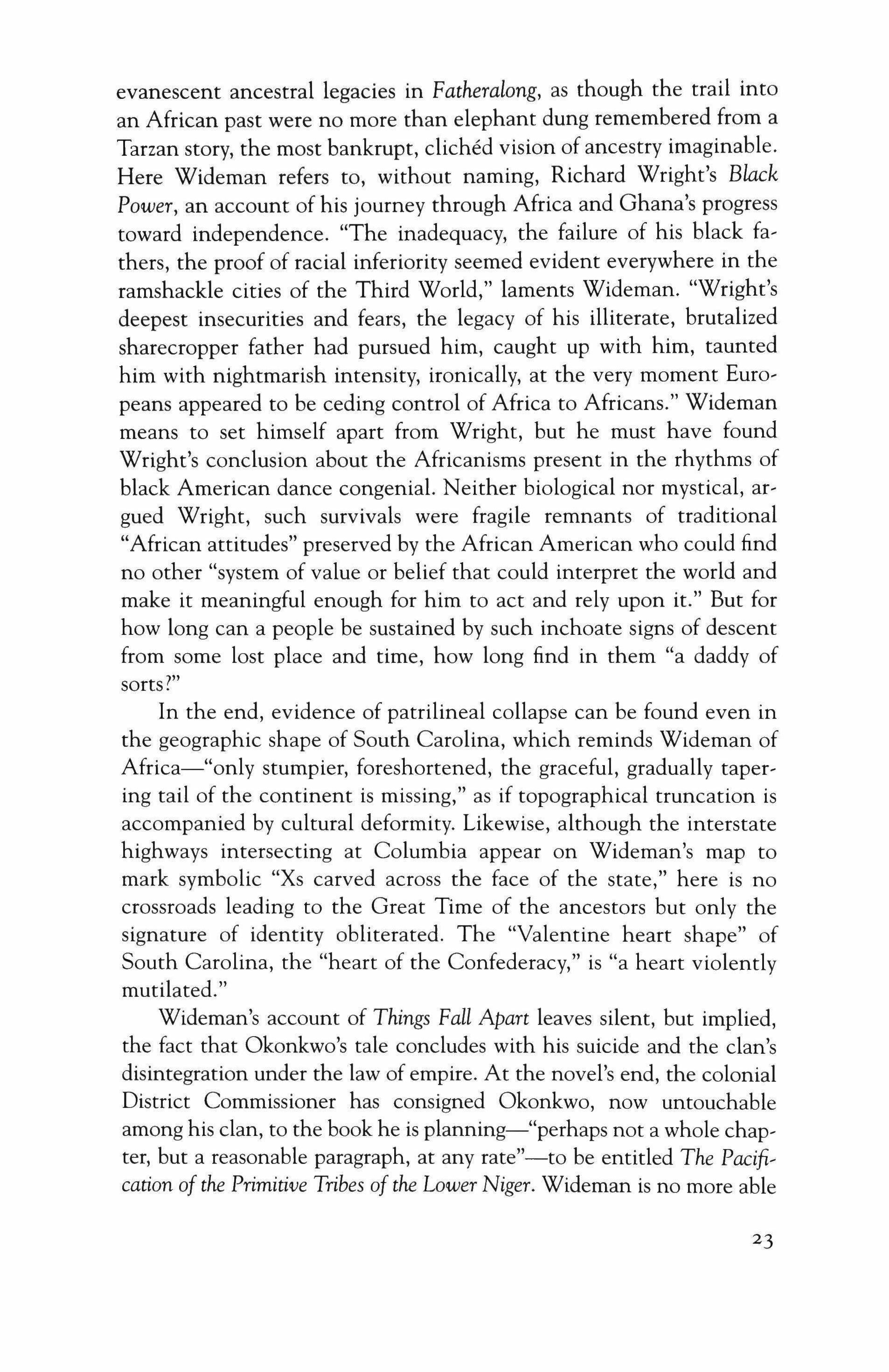
evanescent ancestral legacies in Fatheralong, as though the trail into an African past were no more than elephant dung remembered from a Tarzan story, the most bankrupt, cliched vision of ancestry imaginable. Here Wideman refers to, without naming, Richard Wright's Black Power, an account of his journey through Africa and Ghana's progress toward independence. "The inadequacy, the failure of his black fathers, the proof of racial inferiority seemed evident everywhere in the ramshackle cities of the Third World," laments Wideman. "Wright's deepest insecurities and fears, the legacy of his illiterate, brutalized sharecropper father had pursued him, caught up with him, taunted him with nightmarish intensity, ironically, at the very moment Europeans appeared to be ceding control of Africa to Africans." Wideman means to set himself apart from Wright, but he must have found Wright's conclusion about the Africanisms present in the rhythms of black American dance congenial. Neither biological nor mystical, argued Wright, such survivals were fragile remnants of traditional "African attitudes" preserved by the African American who could find no other "system of value or belief that could interpret the world and make it meaningful enough for him to act and rely upon it." But for how long can a people be sustained by such inchoate signs of descent from some lost place and time, how long find in them "a daddy of sorts ?"
In the end, evidence of patrilineal collapse can be found even in the geographic shape of South Carolina, which reminds Wideman of Africa-"only stumpier, foreshortened, the graceful, gradually tapering tail of the continent is missing," as if topographical truncation is accompanied by cultural deformity. Likewise, although the interstate highways intersecting at Columbia appear on Wideman's map to mark symbolic "Xs carved across the face of the state," here is no crossroads leading to the Great Time of the ancestors but only the signature of identity obliterated. The "Valentine heart shape" of South Carolina, the "heart of the Confederacy," is "a heart violently mutilated."
Wideman's account of Things Fall Apart leaves silent, but implied, the fact that Okonkwo's tale concludes with his suicide and the clan's disintegration under the law of empire. At the novel's end, the colonial District Commissioner has consigned Okonkwo, now untouchable among his clan, to the book he is planning-"perhaps not a whole chapter, but a reasonable paragraph, at any rate"-to be entitled The Pacifi� cation of the Primitive Tribes of the Lower Niger. Wideman is no more able
23
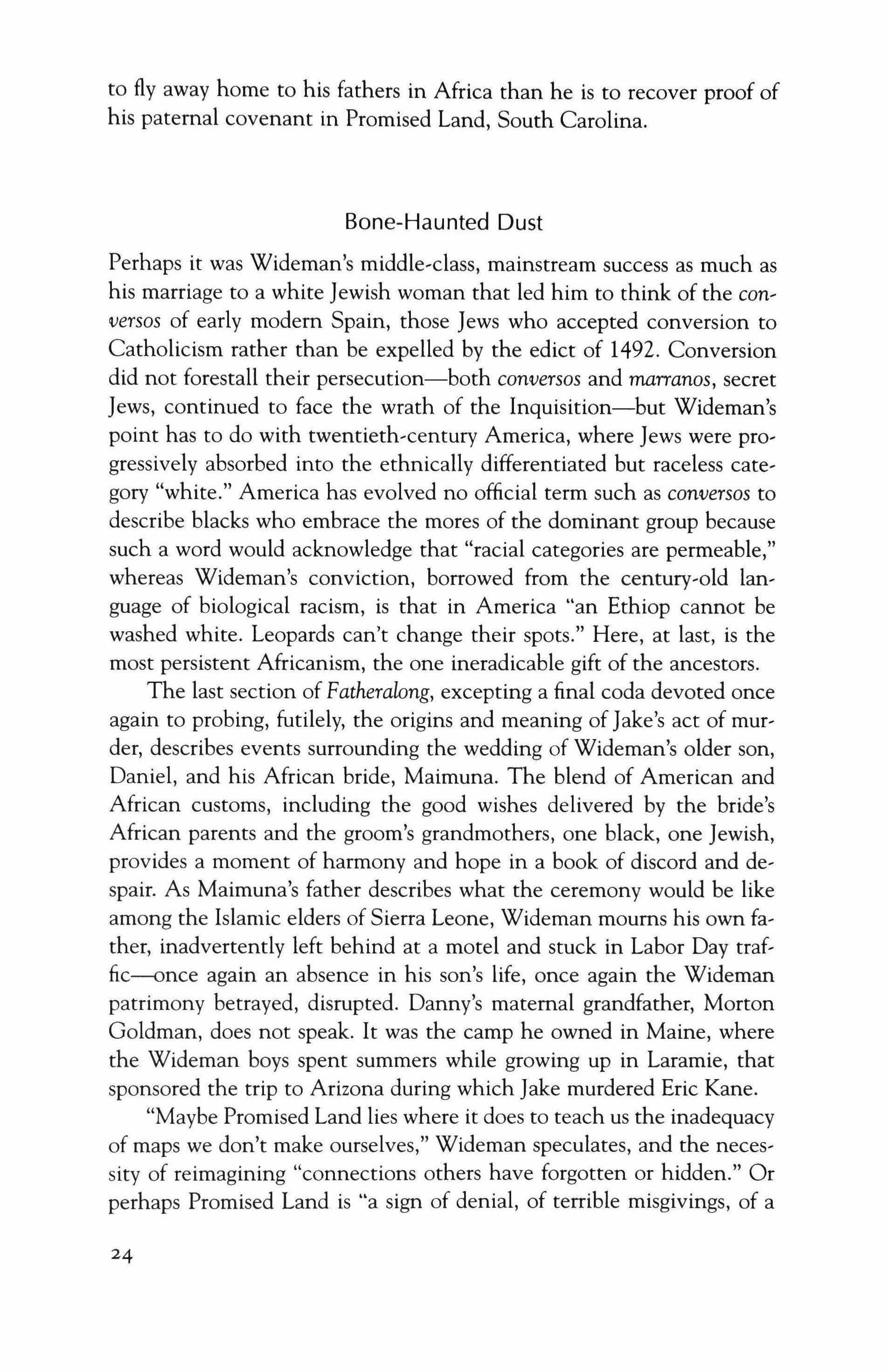
to flyaway home to his fathers in Africa than he is to recover proof of his paternal covenant in Promised Land, South Carolina.
Bone-Haunted Dust
Perhaps it was Wideman's middle-class, mainstream success as much as his marriage to a white Jewish woman that led him to think of the con' versos of early modern Spain, those Jews who accepted conversion to Catholicism rather than be expelled by the edict of 1492. Conversion did not forestall their persecution-both conversos and marranos, secret Jews, continued to face the wrath of the Inquisition-but Wideman's point has to do with twentieth,century America, where Jews were pro' gressively absorbed into the ethnically differentiated but raceless category "white." America has evolved no official term such as conversos to describe blacks who embrace the mores of the dominant group because such a word would acknowledge that "racial categories are permeable," whereas Wideman's conviction, borrowed from the century-old Ianguage of biological racism, is that in America "an Ethiop cannot be washed white. Leopards can't change their spots." Here, at last, is the most persistent Africanism, the one ineradicable gift of the ancestors.
The last section of Fatheralong, excepting a final coda devoted once again to probing, futilely, the origins and meaning of Jake's act of rnurder, describes events surrounding the wedding of Wideman's older son, Daniel, and his African bride, Maimuna. The blend of American and African customs, including the good wishes delivered by the bride's African parents and the groom's grandmothers, one black, one Jewish, provides a moment of harmony and hope in a book of discord and de, spair. As Maimuna's father describes what the ceremony would be like among the Islamic elders of Sierra Leone, Wideman mourns his own fa, ther, inadvertently left behind at a motel and stuck in Labor Day traffic--once again an absence in his son's life, once again the Wideman patrimony betrayed, disrupted. Danny's maternal grandfather, Morton Goldman, does not speak. It was the camp he owned in Maine, where the Wideman boys spent summers while growing up in Laramie, that sponsored the trip to Arizona during which Jake murdered Eric Kane.
"Maybe Promised Land lies where it does to teach us the inadequacy of maps we don't make ourselves," Wideman speculates, and the necessity of reimagining "connections others have forgotten or hidden." Or perhaps Promised Land is "a sign of denial, of terrible misgivings, of a

past and present unhinged." This uncertainty in characterization haunts Fatheralong, where past and present jut into one another without resolution. No teleology governs Wideman's inquiry. The dissolution of the progressive family narrative is signaled in the dissolution of narrative order in the text: "I'm remembering things in no order, with no plan. These father stories. Because that's all they are."
This heartbreaking comment appears late in the book, in the midst of Wideman's recollections of Jake as boy, as he is searching for clues that might explain so archetypal a black male story of crime and incarceration. But the comment, by its self-referential nature, could appear anywhere in the book, and it could apply throughout to the simultaneous breakdown of genealogical and narrative form. Like the episodes assembled into the story called Fatheralong, memories flare up with the brilliance of explanatory value only to give way quickly to another thought, another analogy, another attempt to discern a logic in black life. Within the annihilating cataclysm detailed in Fatheralong, the erasure of inherited, redemptive lineage carries with it the erasure of paternal responsibility and narrative authority alike. Wideman's search for origins succumbs, at every tum, to the judgment of the masters: People are easier to kill if they are "nobodies who began nowhere, go nowhere, except back where they belong. Nowhere."
In the final chapter of Fatheralong, Wideman returns to an archeological rendering of Promised Land, South Carolina. But the obscured road to the old Wideman place, where Wideman and his father fail to discover any signs of the family dwelling, now merges with the dusty rural road outside the Arizona State Prison Complex in Tucson, where Jake Wideman serves his life sentence. Finding himself on "the same road always, going nowhere," drifting "like [his] African ancestors, through a strange land," Wideman broods on another of his father's gospel songs, "Way in the Middle of the Air," not because he believes in his mother's and father's God but because of the music's marginal sustenance. This exilic memory leads into two other linked meditations.
The first concerns a photographic exhibition staged by the South Carolina Humanities Council based on a discovered cache of undeveloped nineteenth-century photographic plates of African Americans, whose public showing had the disturbing effect of creating a largely fruitless search for vanished ancestors, as though the guests were "wandering through a gallery of ghosts." The second meditation concerns Wideman's reading of Winthrop Jordan's Tumult and Silence at Second Creek, which reconstructs an abortive 1861 slave uprising near Natchez,
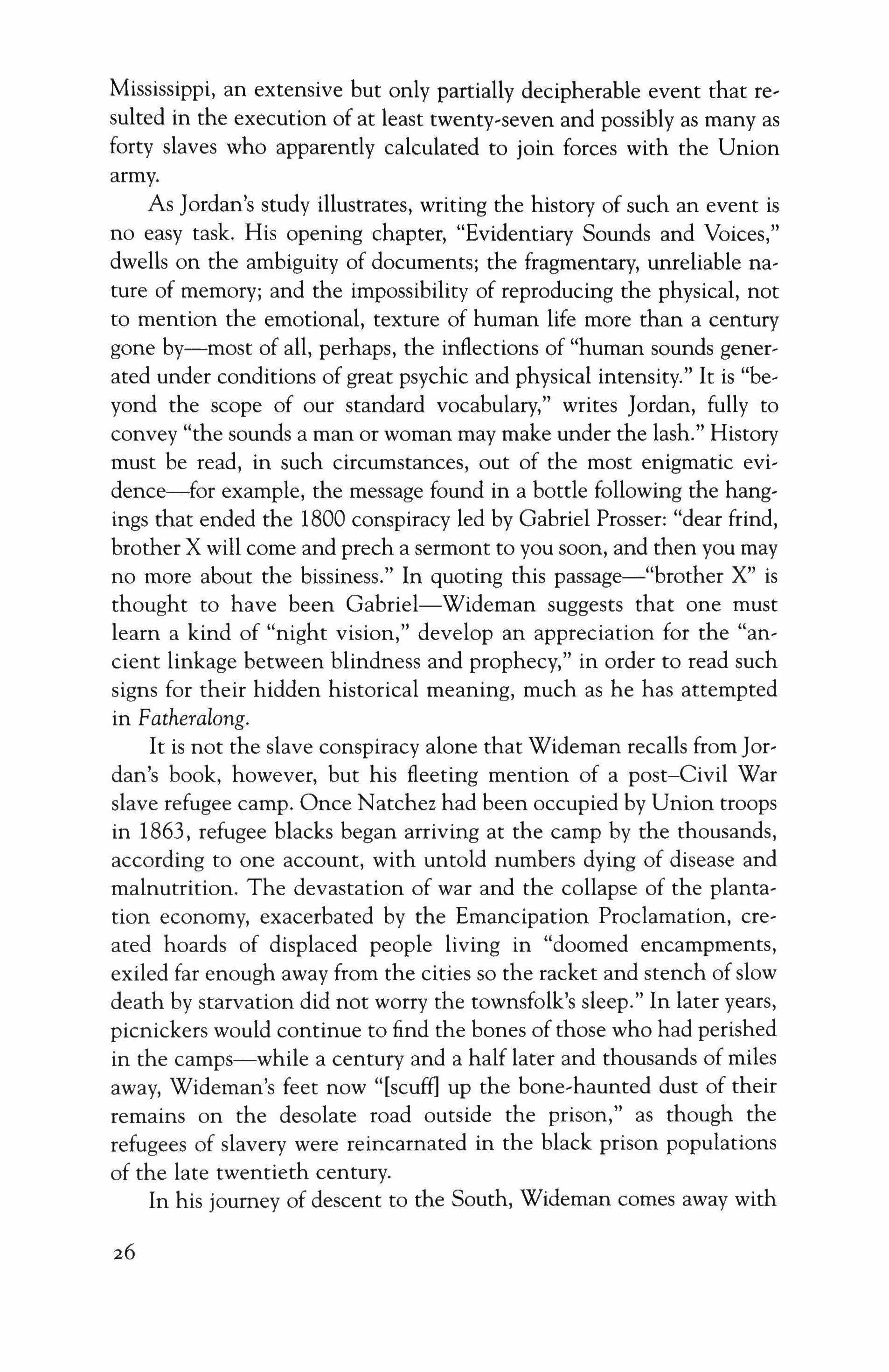
Mississippi, an extensive but only partially decipherable event that resulted in the execution of at least twenty,seven and possibly as many as forty slaves who apparently calculated to join forces with the Union army.
As Jordan's study illustrates, writing the history of such an event is no easy task. His opening chapter, "Evidentiary Sounds and Voices," dwells on the ambiguity of documents; the fragmentary, unreliable nature of memory; and the impossibility of reproducing the physical, not to mention the emotional, texture of human life more than a century gone by-most of all, perhaps, the inflections of "human sounds generated under conditions of great psychic and physical intensity." It is "be' yond the scope of our standard vocabulary," writes Jordan, fully to convey "the sounds a man or woman may make under the lash." History must be read, in such circumstances, out of the most enigmatic evidence-for example, the message found in a bottle following the hang, ings that ended the 1800 conspiracy led by Gabriel Prosser: "dear frind, brother X will come and prech a sermont to you soon, and then you may no more about the bissiness." In quoting this passage-"brother X" is thought to have been Gabriel-Wideman suggests that one must learn a kind of "night vision," develop an appreciation for the "an, cient linkage between blindness and prophecy," in order to read such signs for their hidden historical meaning, much as he has attempted in Fatheralong.
It is not the slave conspiracy alone that Wideman recalls from [ordan's book, however, but his fleeting mention of a post-Civil War slave refugee camp. Once Natchez had been occupied by Union troops in 1863, refugee blacks began arriving at the camp by the thousands, according to one account, with untold numbers dying of disease and malnutrition. The devastation of war and the collapse of the plantation economy, exacerbated by the Emancipation Proclamation, ereated hoards of displaced people living in "doomed encampments, exiled far enough away from the cities so the racket and stench of slow death by starvation did not worry the townsfolk's sleep." In later years, picnickers would continue to find the bones of those who had perished in the camps-while a century and a half later and thousands of miles away, Wideman's feet now "[scuff] up the bone'haunted dust of their remains on the desolate road outside the prison," as though the refugees of slavery were reincarnated in the black prison populations of the late twentieth century.
In his journey of descent to the South, Wideman comes away with
26
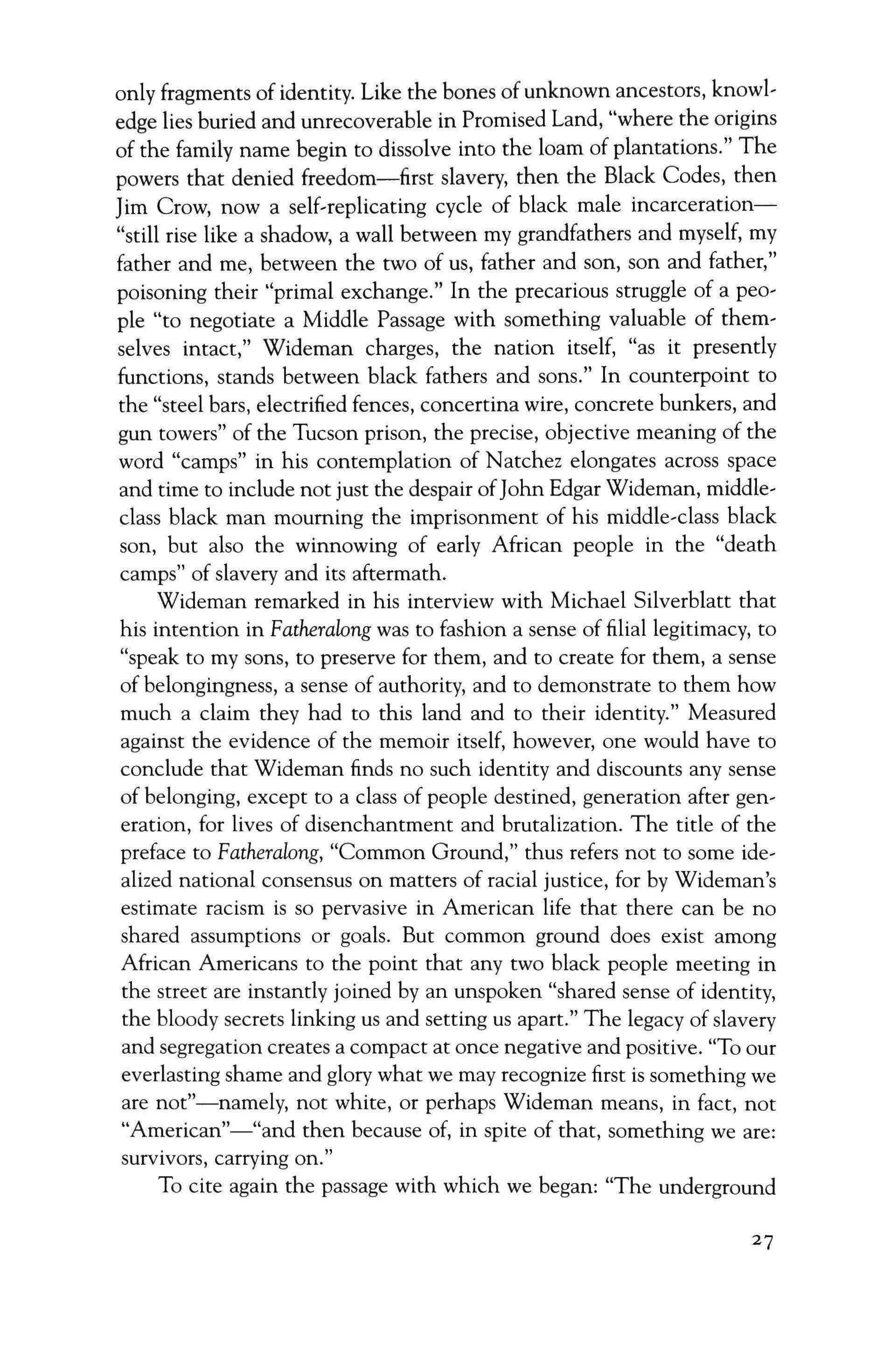
only fragments of identity. Like the bones of unknown ancestors, knowledge lies buried and unrecoverable in Promised Land, "where the origins of the family name begin to dissolve into the loam of plantations." The powers that denied freedom-first slavery, then the Black Codes, then Jim Crow, now a self-replicating cycle of black male incarceration"still rise like a shadow, a wall between my grandfathers and myself, my father and me, between the two of us, father and son, son and father," poisoning their "primal exchange." In the precarious struggle of a people "to negotiate a Middle Passage with something valuable of them, selves intact," Wideman charges, the nation itself, "as it presently functions, stands between black fathers and sons." In counterpoint to the "steel bars, electrified fences, concertina wire, concrete bunkers, and gun towers" of the Tucson prison, the precise, objective meaning of the word "camps" in his contemplation of Natchez elongates across space and time to include not just the despair ofJohn Edgar Wideman, middle, class black man mourning the imprisonment of his middle-class black son, but also the winnowing of early African people in the "death camps" of slavery and its aftermath.
Wideman remarked in his interview with Michael Silverblatt that his intention in Fatheralong was to fashion a sense of filial legitimacy, to "speak to my sons, to preserve for them, and to create for them, a sense of belongingness, a sense of authority, and to demonstrate to them how much a claim they had to this land and to their identity." Measured against the evidence of the memoir itself, however, one would have to conclude that Wideman finds no such identity and discounts any sense of belonging, except to a class of people destined, generation after generation, for lives of disenchantment and brutalization. The title of the preface to Fatheralong, "Common Ground," thus refers not to some ide, alized national consensus on matters of racial justice, for by Wideman's estimate racism is so pervasive in American life that there can be no shared assumptions or goals. But common ground does exist among African Americans to the point that any two black people meeting in the street are instantly joined by an unspoken "shared sense of identity, the bloody secrets linking us and setting us apart." The legacy of slavery and segregation creates a compact at once negative and positive. "To our everlasting shame and glory what we may recognize first is something we are not"-namely, not white, or perhaps Wideman means, in fact, not "American"-"and then because of, in spite of that, something we are: ." survivors, carrymg on.
To cite again the passage with which we began: "The underground

history of the camps must be remembered, written, and celebrated. The story of how strength of mind, individual and collective, altered the genocidal master plan, how the horror that destroyed so many could be transformed into a rite of passage for some, then for a people, a nation."
If Fatheralong may be trusted, it is not clear that Wideman believes in such a transformation or, if he does, that he has the psychic fortitude or artistic intention to record anything but its failure. Rather than a rite of passage that ennobles and liberates, his own return to Promised Land shows the endpoint to be an illusion, the journey a circle. Fatheralong concludes by revealing itself to be an extended letter to his imprisoned son, with the closing word, "Love," hanging alone, followed by no signature, in the emptiness of the page.
Tadeuz R6zewicz
Translated from the Polish by Joanna
Trzeciak
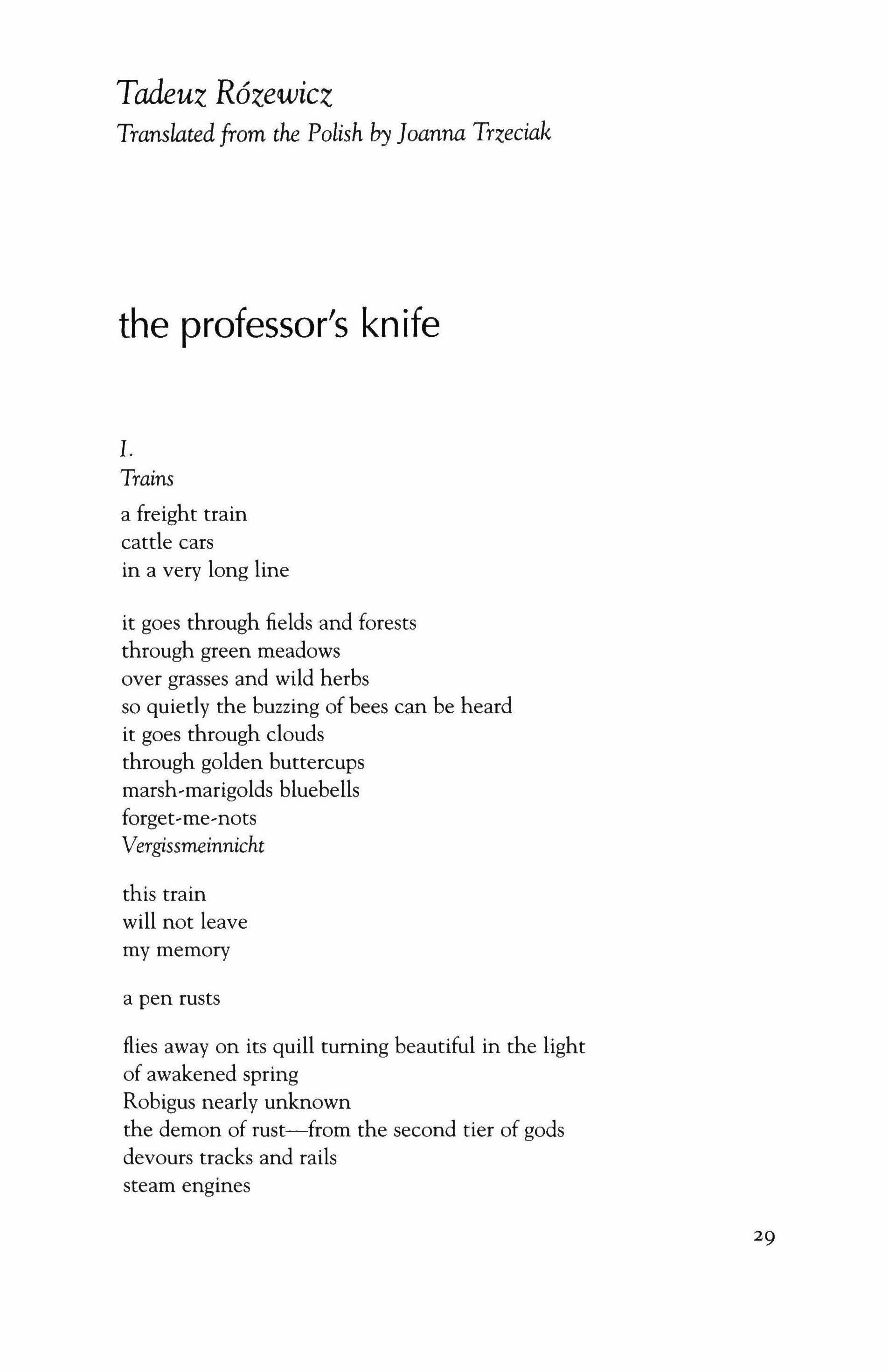
the professor's knife
1. Trains
a freight train cattle cars in a very long line it goes through fields and forests through green meadows over grasses and wild herbs so quietly the buzzing of bees can be heard it goes through clouds through golden buttercups marsh-marigolds bluebells forget-me-nets
Vergissmeinnicht this train will not leave my memory
a pen rusts
flies away on its quill turning beautiful in the light of awakened spring Robigus nearly unknown the demon of rust-from the second tier of gods devours tracks and rails steam engines
29
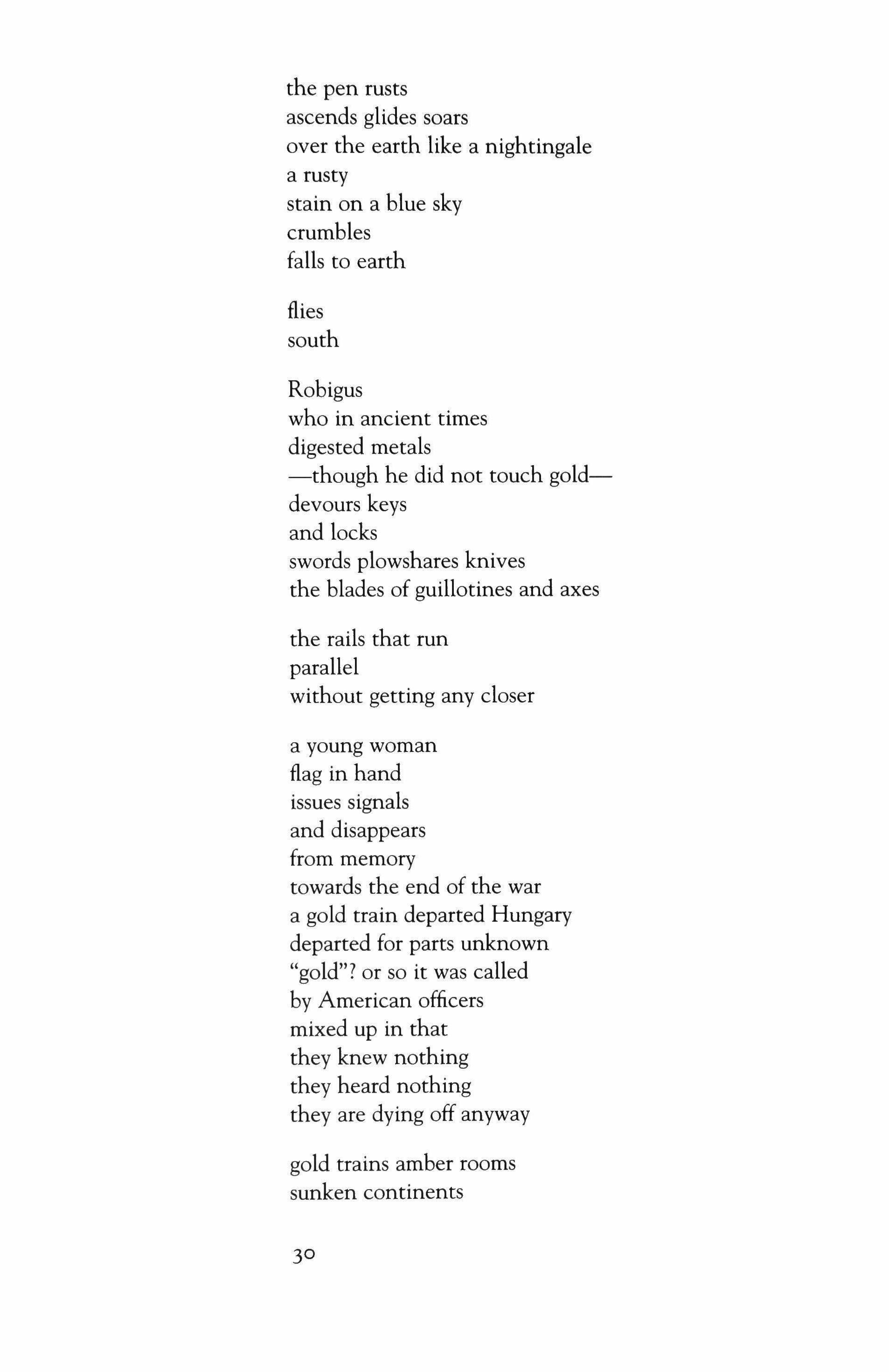
the pen rusts ascends glides soars over the earth like a nightingale a rusty stain on a blue sky crumbles falls to earth flies south
Robigus who in ancient times digested metals -though he did not touch golddevours keys and locks swords plowshares knives the blades of guillotines and axes the rails that run parallel without getting any closer
a young woman flag in hand issues signals and disappears from memory towards the end of the war a gold train departed Hungary departed for parts unknown "gold"? or so it was called by American officers mixed up in that they knew nothing they heard nothing they are dying off anyway
gold trains amber rooms sunken continents
30
Noah's ark
maybe my Hungarian friends heard something about this train maybe the Kursbuch survived the last train schedule
from besieged Budapest
I'm standing in the last car Inter Regnum-of the train to Berlin and I hear a child beside me cry "the oak tree is running away! into the forest " a cart carries children away I pull the bookmark out of the book a Norwid poem 1 I build a bridge between past and future
The past is only today, lagging behind The wheels-a village and not A something somewhere, a spot
No one has ever seen, can ever find. 2
freight trains cattle cars the color of liver and blood in a long line loaded with banal Evil banal fear despair

1. This scene mirrors one depicted in "The Past" by Polish poet Cyprian Norwid (1821-1883).
2. Here R6zewicz quotes in full the last stanza of "The Past." The translation of these lines is taken from Cyprian Norwid, Poems, Letters, Drawings, edited and translated from the Polish by Jerzy Peterkiewicz, poems in collaboration with Christine Brooke-Rose and Bums Singer. (Manchester, UK: Carcanet, 2000), p. 48.
31
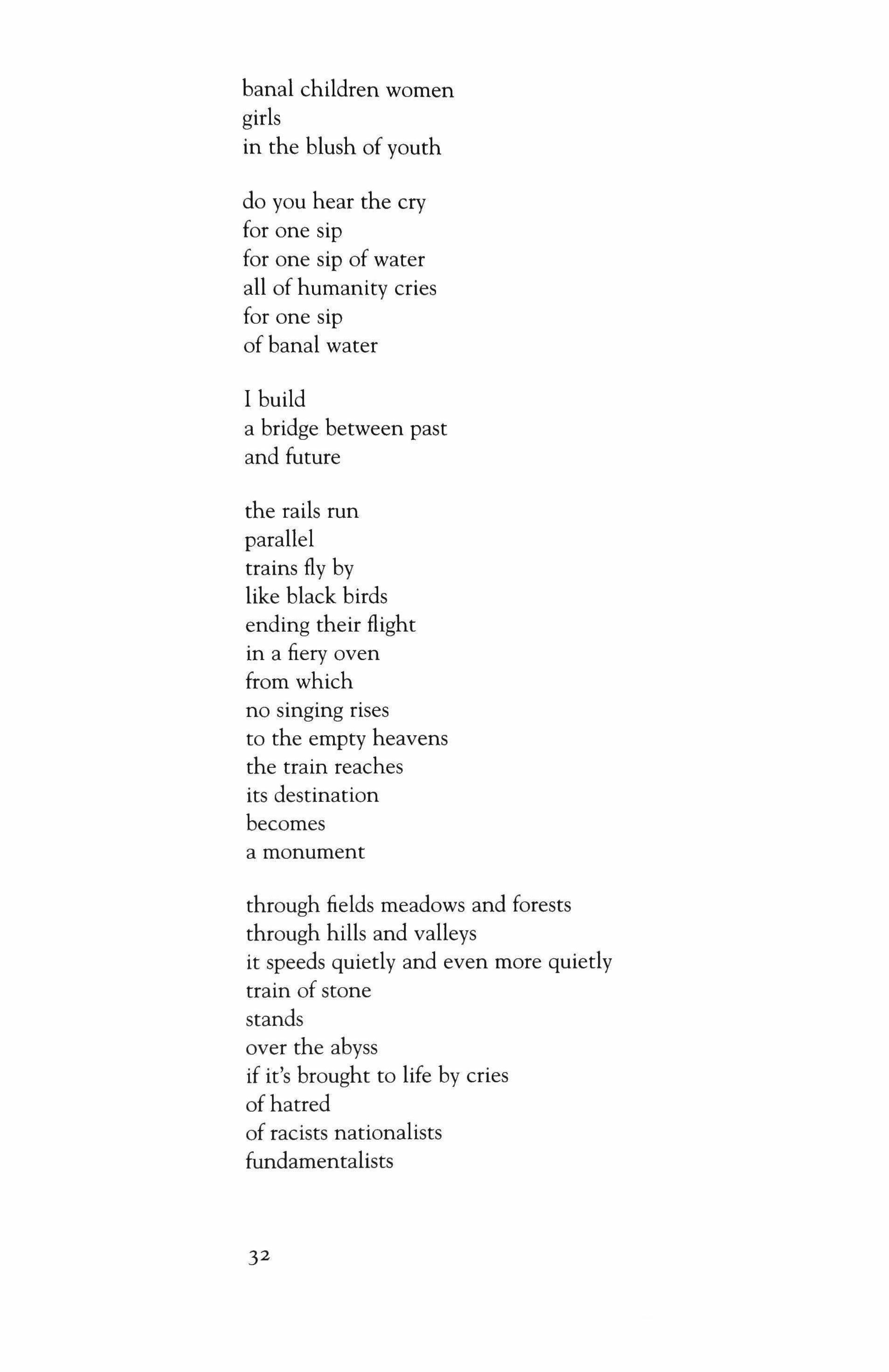
banal children women girls in the blush of youth
do you hear the cry for one sip for one sip of water all of humanity cries for one sip of banal water
I build a bridge between past and future the rails run parallel trains fly by like black birds ending their flight in a fiery oven from which no singing rises to the empty heavens the train reaches its destination becomes a monument through fields meadows and forests through hills and valleys it speeds quietly and even more quietly train of stone stands over the abyss if it's brought to life by cries of hatred of racists nationalists fundamentalists
32
it will fall like an avalanche on humanity not on "humanity"!
on a human being
II
The Egg of Columbus after all these years I'm sitting with Mieczvslaw! having breakfast the twentieth century is ending
I slice the bread on a cutting board spread butter on it add a pinch of salt
"Tadeusz, you eat too much bread
I smile I like bread
"you know"-I say"a loaf of fresh bread a loaf, a heel buttered or with bacon bits in lard with a dash of ground pepper"
Mieczyslaw rolls his eyes
I take a bite of crust I know! salt isn't healthy bread isn't healthy (white bread!) and sugar! that's death

3. Mieczylaw Porebski (b. 1921), Professor Emeritus of Art History at Jagiellonian University in Krakow; major theoretician of avant-garde art.
33
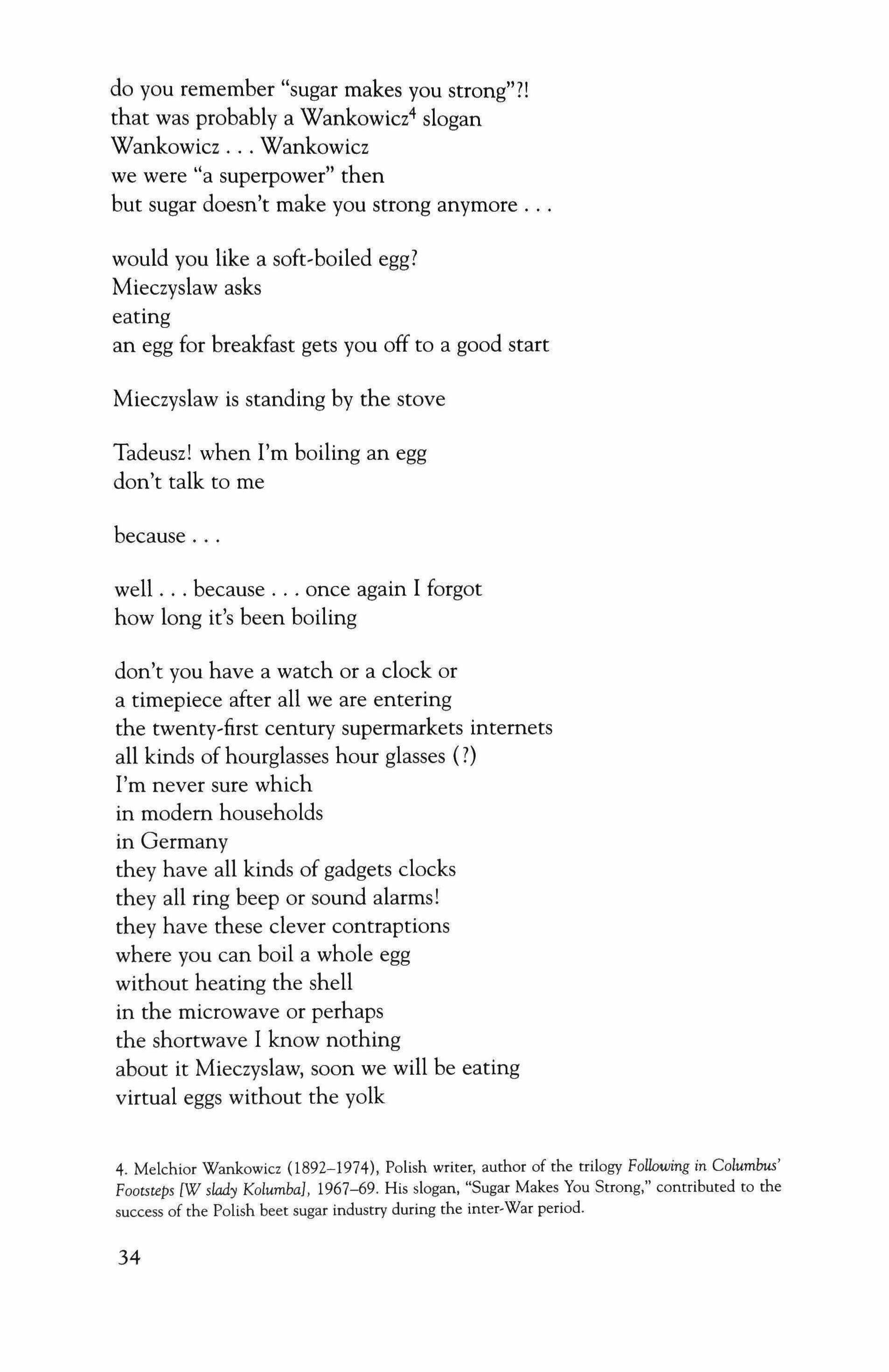
do you remember "sugar makes you strong"?! that was probably a Wankowicz4 slogan Wankowicz Wankowicz we were "a superpower" then but sugar doesn't make you strong anymore
would you like a soft-boiled egg?
Mieczyslaw asks eating an egg for breakfast gets you off to a good start
Mieczyslaw is standing by the stove
Tadeusz! when I'm boiling an egg don't talk to me because well because once again I forgot how long it's been boiling
don't you have a watch or a clock or a timepiece after all we are entering the twenty-first century supermarkets intemets all kinds of hourglasses hour glasses (?) I'm never sure which in modem households in Germany they have all kinds of gadgets clocks they all ring beep or sound alarms! they have these clever contraptions where you can boil a whole egg without heating the shell in the microwave or perhaps the shortwave I know nothing about it Mieczyslaw, soon we will be eating virtual eggs without the yolk
4. Melchior Wankowicz (1892-1974), Polish writer, author of the trilogy Following in Columbus' Footsteps [W slady Kolumba}, 1967-69. His slogan, "Sugar Makes You Strong," contributed to the success of the Polish beet sugar industry during the inter-War period.
34

because the yolk isn't healthy maybe not us but our grandchildren
Tadeusz! try to understand that boiling an egg requires attention concentration even it'll probably come out hardboiled
Germans Germans they're so technological high tech eggs techno and metal music are not for us and so?! so? how's the egg we'll see in a minute You taught me how to crack a hard,boiled egg I tap the shell but you in one decisive move cut off the top of course the egg is in its holder you don't muck up the spoon or your nails
how's yours?
mine's good not too hard not too soft but what were you doing I saw that you poked a hole in the egg before you plopped it in the water what did you poke it with a needle? I never saw that trick before today it figures mine is hardboiled aren't you using too much salt
well you know a soft boiled egg without salt and pepper
35
there are certain principles and when it comes to the boiling time my aunt had a solution: say three hail marys for a soft-boiled egg
but that is no solution for atheists and this is an atheist speaking?
what kind of atheist am I have you ever seen a real atheist or nihilist in Poland?
there have been freethinkers atheists materialists communists activists marxists and even trotskyites and so?!
and so they were in such a hurry to join the pilgrimage of the cultural and artistic elite from Warsaw to Czestochowa'' it's always been that way every family had a Jew or priest inside everyone there is a heroic monk Robak'' [ankiel or Konrad Wallenrod7
how does Konrad Wallenrod fit in?
I'm not trying to scare you but you were a bit too liberal with the salt you know there are gaps in memory I know listen if you were to cut off my head I would not be able to recall

5. Czestochowa, Poland is the destination of an annual Catholic pilgrimage paying homage to the Black Madonna.
6. Robak and Jankiel are protagonists of the Polish epic novel in verse, Pan Tadeusz, by Adam Mickiewicz. Robak, a mysterious monk, serves the patriotic cause as he repents for the misdeeds of his youth. [ankiel, a musically gifted Jew, is an exemplary Polish patriot.
7. Konrad Wallenrod, title hero of Adam Mickiewicz's historical novel in verse, is a classic example of a subversive patriot: Lithuanian by birth, Wallenrod rises through the order of the Teutonic knights and becomes their Grand Master only to lead them on a disastrous expedition.
what happened with Columbus' egg Columbus balanced an egg? how was he able to balance it on a table on its end I need to consult the encyclopedia
you have your way and I have mine
scrambled eggs with sausage or bacon is out of the question at this point
I recall what Norwid said about the Matejko'' exhibit in Paris in 1876 (I think) you know I've been heavy into Norwid for two years now and I want to write a little book a lesson about Norwid or a lesson learned from Norwid about the Matejko painting Norwid said - this had escaped me even though I know practically everything about MatejkoNorwid called it "national scrambled eggs" he was talking about "Sigismundus' Bell" I don't know where the painting is now in Palais de l'lndustrie (in 1873)
National scrambled eggs! between you and me neither Europe nor America knows what true scrambled eggs are like that's right how is the Norwid coming along not too well to tell you the truth it's moving at a snail's pace Art is like a banner on the tower of human work?
he's unbelievable
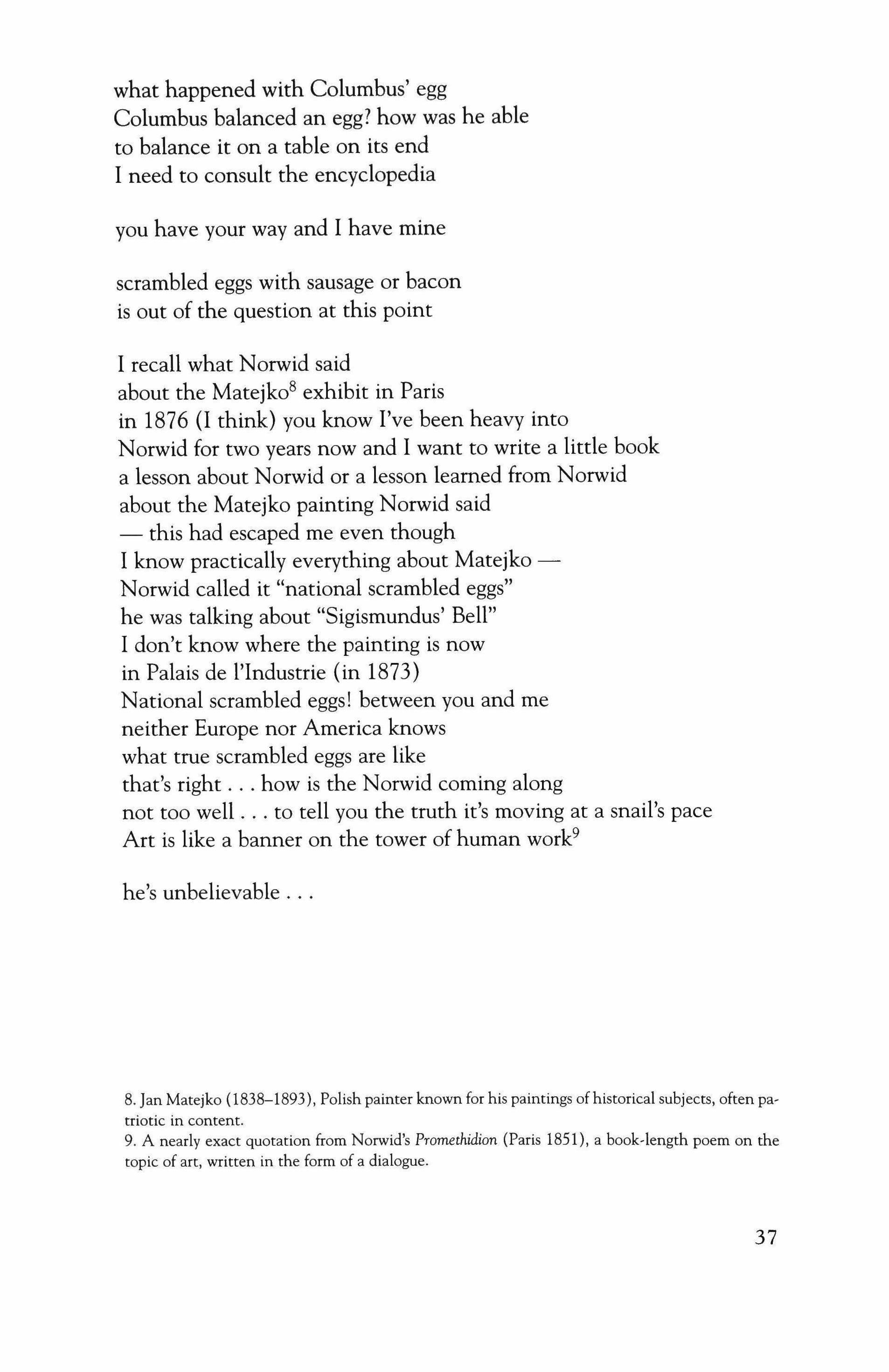
8. Jan Matejko (1838-1893), Polish painter known for his paintings ofhistorical subjects, often patriotic in content.
9. A nearly exact quotation from Norwid's Promethidion (Paris 1851), a book-length poem on the topic of art, written in the form of a dialogue.
37

Shadows in the afternoon we visited Hania in the cemetery Hania passed away five years ago Mieczyslaw was left alone
Robigus the demon of rust coats the past in rust covers the words eyes and smiles of the dead covers the pen we continue on to the tombstone of Przybos's'" wife Bronia daughters grandchildren came to the funeral from Paris New York
Julian wanted the elder one to become a gardener an orchardist perhaps he dreamt that in his old age he would have his very own apple tree that he would write avant-garde poems in the shade of the apple tree in the shade of a tree that he would continue to do his thingKochanowski's thing!' but the metropolis the masses the machine brought a painful surprise to the avant-garde poets became a trap
10. Julian Przybos (1901-1970), Polish avant-garde poet.
11. Jan Kochanowski (1530-1584), a giant of Polish Renaissance poetry, credited with transforming the Polish language. He often wrote beneath a linden tree, the subject of one of his best-known poems.
III
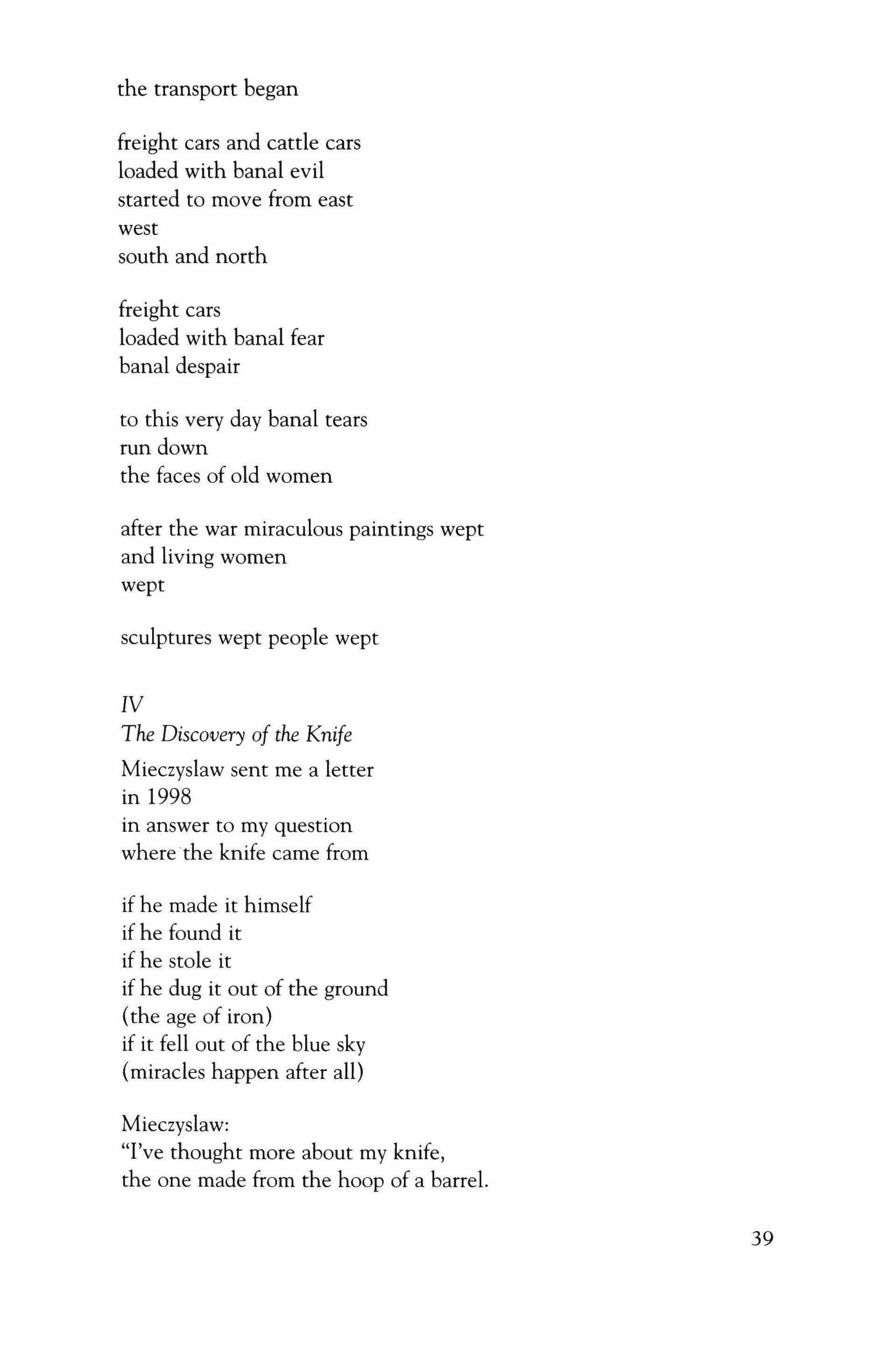
the transport began
freight cars and cattle cars loaded with banal evil started to move from east west south and north
freight cars loaded with banal fear banal despair
to this very day banal tears run down the faces of old women
after the war miraculous paintings wept and living women wept sculptures wept people wept
IV
The Discovery of the Knife
Mieczyslaw sent me a letter in 1998 in answer to my question where the knife came from if he made it himself if he found it if he stole it if he dug it out of the ground (the age of iron) if it fell out of the blue sky (miracles happen after all)
Mieczyslaw:
"I've thought more about my knife, the one made from the hoop of a barrel.
39
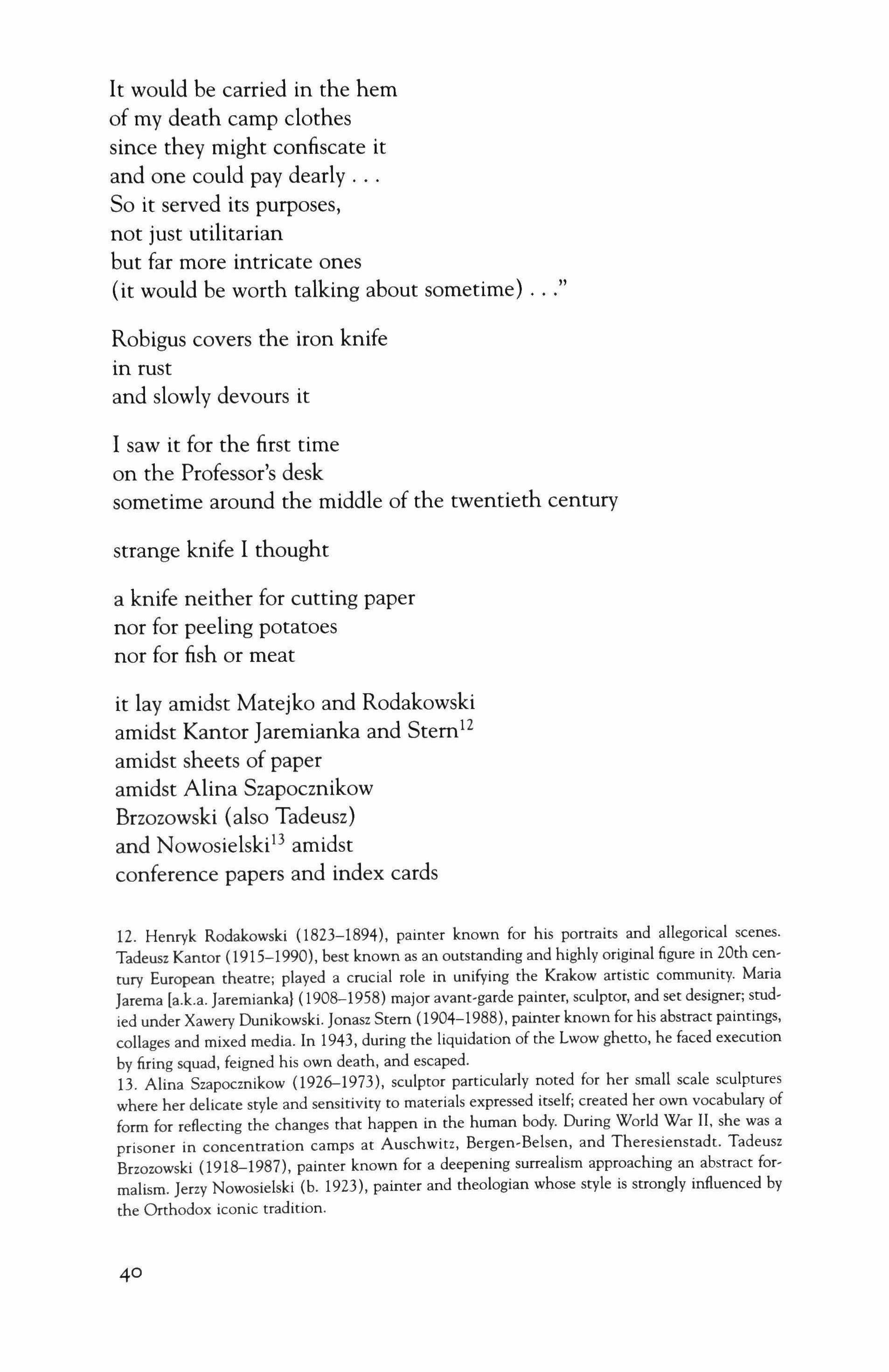
It would be carried in the hem of my death camp clothes since they might confiscate it and one could pay dearly So it served its purposes, not just utilitarian but far more intricate ones {it would be worth talking about sometime} Robigus covers the iron knife in rust and slowly devours it
I saw it for the first time on the Professor's desk sometime around the middle of the twentieth century strange knife I thought a knife neither for cutting paper nor for peeling potatoes nor for fish or meat
it lay amidst Matejko and Rodakowski amidst Kantor Jaremianka and Stern'? amidst sheets of paper amidst Alina Szapocznikow Brzozowski (also Tadeusz) and Nowosielski 13 amidst conference papers and index cards
12. Henryk Rodakowski (1823-1894), painter known for his portraits and allegorical scenes. Tadeusz Kantor (1915-1990), best known as an outstanding and highly original figure in 20th century European theatre; played a crucial role in unifying the Krakow artistic communiry. Maria Jarema [a.k.a. [aremianka] (1908-1958) major avant-garde painter, sculptor, and set designer; studied under Xawery Dunikowski. Jonasz Stem (1904-1988), painter known for his abstract paintings, collages and mixed media. In 1943, during the liquidation of the Lwow ghetto, he faced execution by firing squad, feigned his own death, and escaped.
13. Alina Szapocznikow (1926-1973), sculptor particularly noted for her small scale sculptures where her delicate style and sensitivity to materials expressed itself; created her own vocabulary of form for reflecting the changes that happen in the human body. During World War II. she was a prisoner in concentration camps at Auschwitz, Bergen-Belsen, and Theresienstadt. Tadeusz Brzozowski (1918-1987), painter known for a deepening surrealism approaching an abstract formalism. Jerzy Nowosielski (b. 1923), painter and theologian whose style is strongly influenced by the Orthodox iconic tradition.
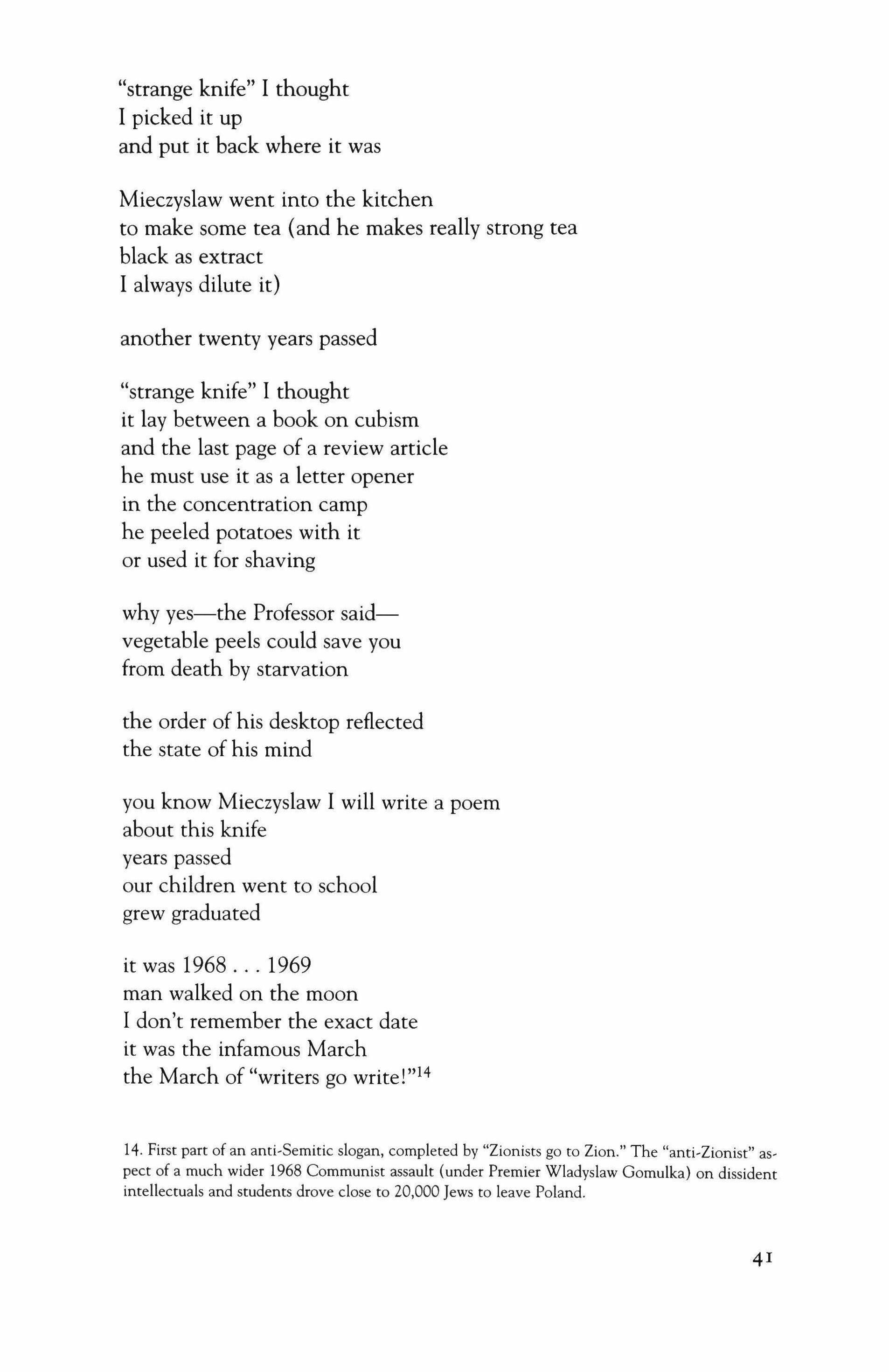
"strange knife" I thought I picked it up and put it back where it was
Mieczyslaw went into the kitchen to make some tea (and he makes really strong tea black as extract I always dilute it)
another twenty years passed
"strange knife" I thought it lay between a book on cubism and the last page of a review article he must use it as a letter opener in the concentration camp he peeled potatoes with it or used it for shaving
why yes-the Professor saidvegetable peels could save you from death by starvation
the order of his desktop reflected the state of his mind
you know Mieczyslaw I will write a poem about this knife years passed our children went to school grew graduated
it was 1968 1969 man walked on the moon I don't remember the exact date it was the infamous March the March of "writers go writel'I'"
14. First part of an anti-Semitic slogan, completed by "Zionists go to Zion." The "anti-Zionist" aspect of a much wider 1968 Communist assault {under Premier Wladyslaw Gomulka} on dissident intellectuals and students drove close to 20,000 Jews to leave Poland.
41

but someone broke my pen
I spent the night at Mieczyslaw's he lived in the building of the academy of fine arts
on Warsaw's Fauburg de Cracovie
rainy evening police and special units unmarked cars police cars nightsticks long nightsticks in the fog helmets riot shields
the next day I ran into Przybos in Zacheta Gallery'" what do these students want he asked he acted a bit shocked surprised then he started to explain to me
Strzeminski's theory of the after-image "stud " stu ents he said as if to himself
I returned home Mieczyslaw's daughter
Joanna asked me over dinner "what do we do now? but I got the impression she knew better than her father or Przybos better than I what to do I answered "keep calm"
Joanna smiled and left the room
Mieczyslaw was in the hospital on Szaserow St. he awoke from the anaesthetic
I sat alone in his study familiar paintings on the wall
Strumillo'f Nowosielski Brzozowski
Mieczyslaw's self portrait from the time of the German occupation the knife lay on the newspaper
15. Zacheta: a society set up in 1860 in Warsaw to promote Polish art after Poland lost its independence. Since 1900 it has had its own building, still used for prominent exhibits and other cultural events.
16. Andrzej Strumillo (b. 1928), painter, graphic artist, photographer, and curator for the Ethnographic Museum in Krakow.

in the airport I read the signs writers go write Zionists go home {or was it the other way around?} after returning to my home soil these signs had a certain feel to them {a feel? of what?}
Aleksander Malachowski asked me to grant a TV interview I said that one small step a human footprint on the moon will change the world and mankind How naive.
VTrains Still Depart only now from memory
for Oswiecim Auschwitz
Theresienstadt Gross-Rosen Dachau for Majdanek Treblinka Sobibor for history
Blind tracks trains depart from small stops from giant railway stations turned into art museums Hamburg Paris Berlin here the artists assemble their installations trains steam engines rust on decommissioned rail lines Robigus covers in rust signal boxes switches soccer fans and army conscripts demolish train cars celebrating the happiest day of their livesleaving the army'?
17. Army service is mandatory in Poland.
43
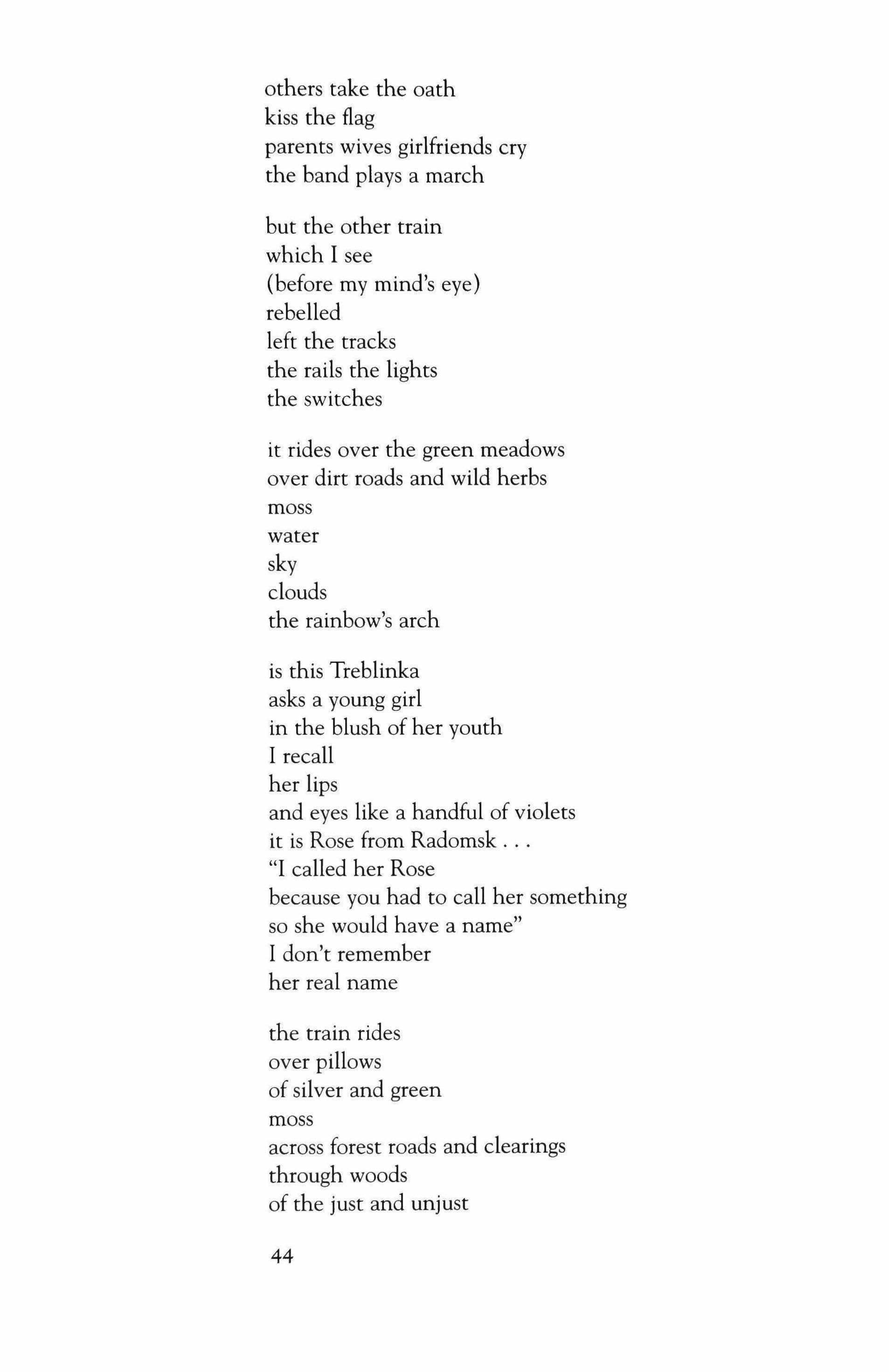
others take the oath kiss the flag parents wives girlfriends cry the band plays a march but the other train which I see (before my mind's eye) rebelled left the tracks the rails the lights the switches it rides over the green meadows over dirt roads and wild herbs moss water sky clouds the rainbow's arch is this Treblinka asks a young girl in the blush of her youth I recall her lips and eyes like a handful of violets it is Rose from Radomsk "I called her Rose because you had to call her something so she would have a name" I don't remember her real name the train rides over pillows of silver and green
moss
across forest roads and clearings through woods of the just and unjust
44
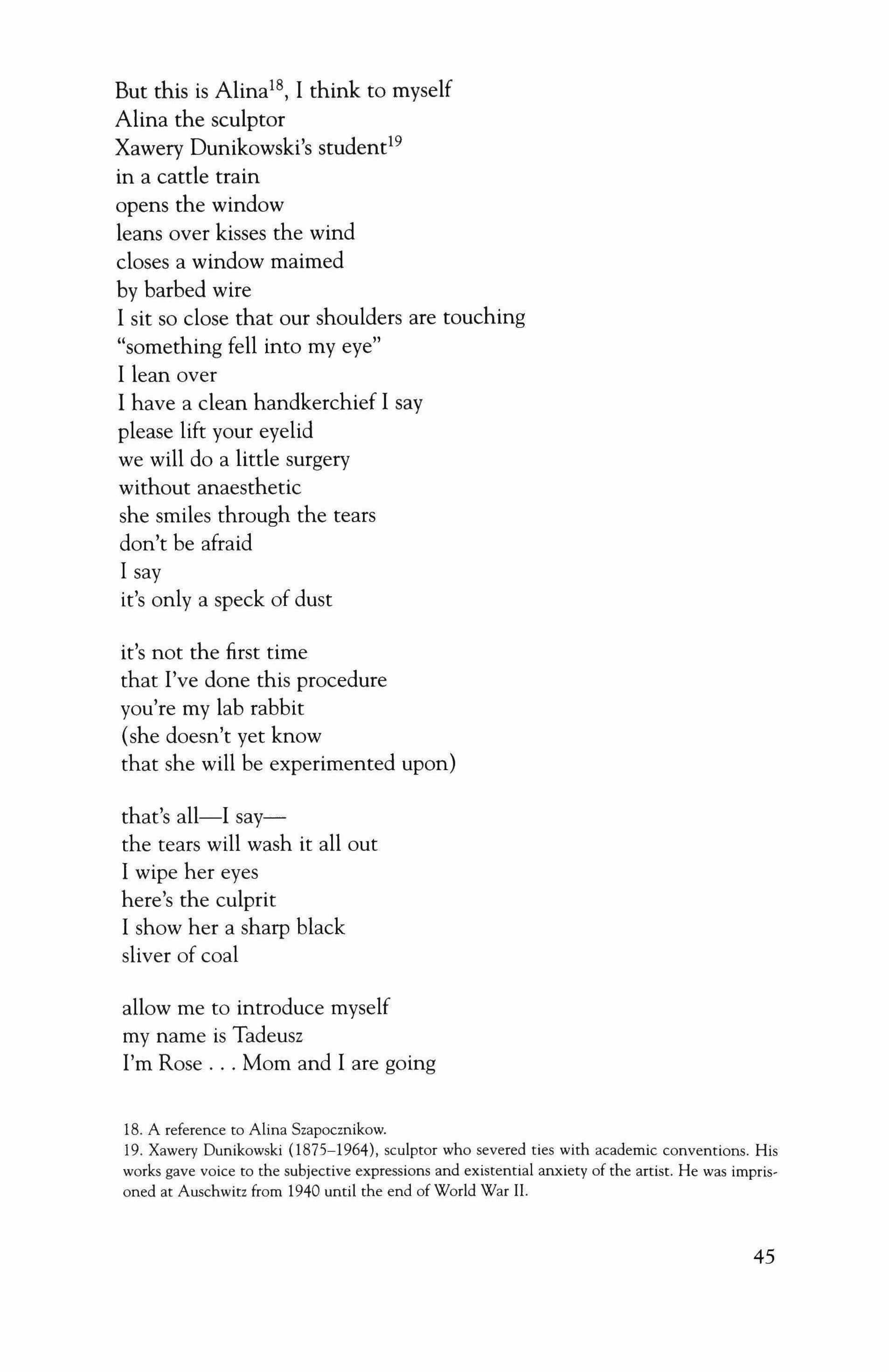
But this is Alina18, I think to myself
Alina the sculptor Xawery Dunikowski's student'? in a cattle train opens the window leans over kisses the wind closes a window maimed by barbed wire
I sit so close that our shoulders are touching "something fell into my eye" I lean over
I have a clean handkerchief I say please lift your eyelid we will do a little surgery without anaesthetic she smiles through the tears don't be afraid
I say it's only a speck of dust
it's not the first time that I've done this procedure you're my lab rabbit (she doesn't yet know that she will be experimented upon)
that's all-I saythe tears will wash it all out
I wipe her eyes here's the culprit
I show her a sharp black sliver of coal
allow me to introduce myself my name is Tadeusz
I'm Rose Mom and I are going
18. A reference to Alina Szapocznikow.
19. Xawery Dunikowski (1875-1964), sculptor who severed ties with academic conventions. His works gave voice to the subjective expressions and existential anxiety of the artist. He was imprisoned at Auschwitz from 1940 until the end of World War II.
45
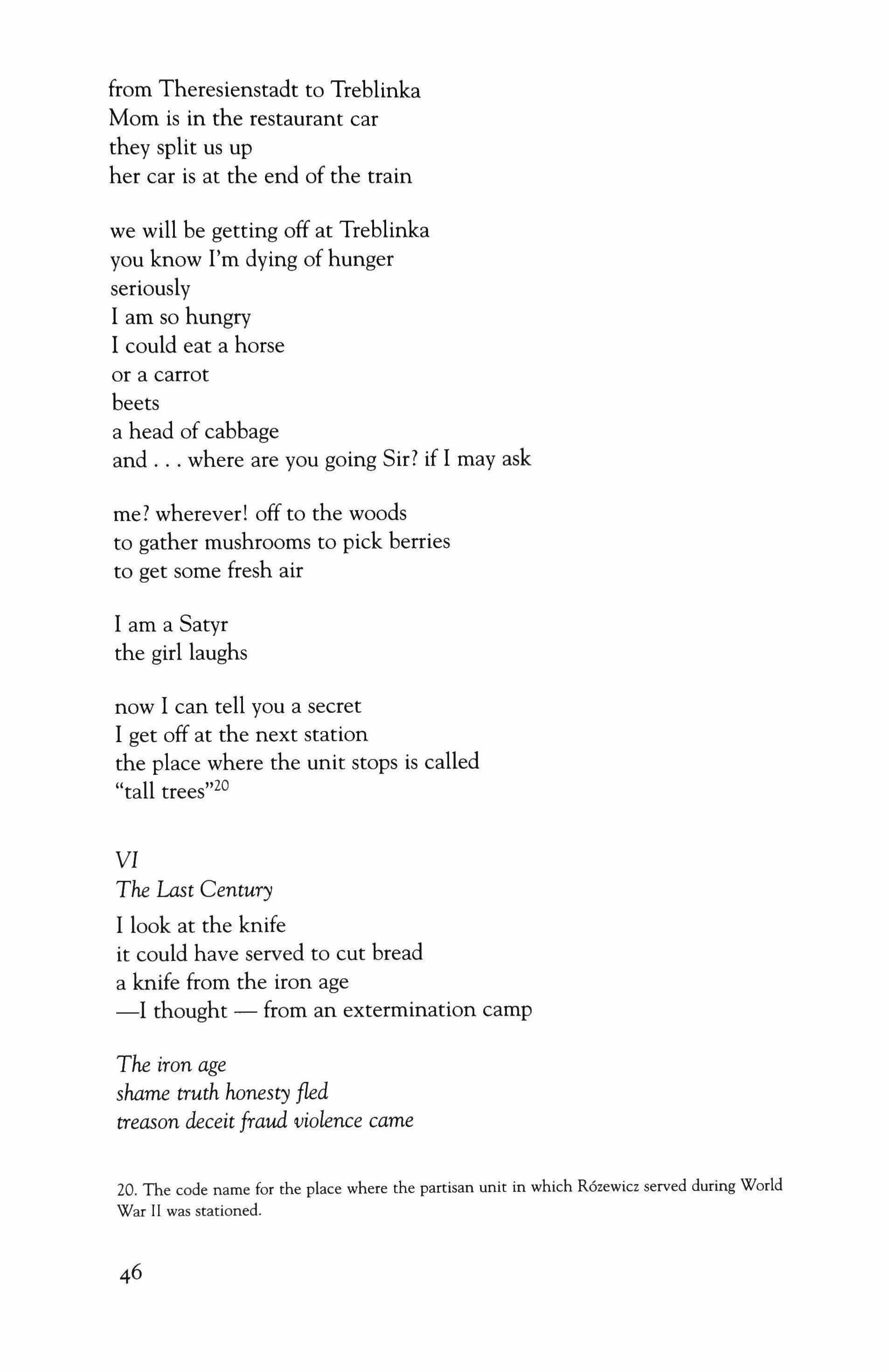
from Theresienstadt to Treblinka
Mom is in the restaurant car they split us up her car is at the end of the train
we will be getting off at Treblinka you know I'm dying of hunger seriously
1 am so hungry
1 could eat a horse or a carrot beets a head of cabbage and where are you going Sir? if 1 may ask me? wherever! off to the woods to gather mushrooms to pick berries to get some fresh air
1 am a Satyr the girl laughs
now 1 can tell you a secret I get off at the next station the place where the unit stops is called "tall trees"Zo
VI
The Last Century
1 look at the knife it could have served to cut bread a knife from the iron age -I thought - from an extermination camp
The iron age shame truth honesty fled treason deceit fraud violence came
20. The code name for the place where the partisan unit in which R6zewicz served during World War II was stationed.
in their place and the criminal desire to own things cunning man carved up the earth with borders the earth which was until then common to all just like the light the sun the air cruel iron came into the world and something even more cruel than iron- gold 21 Knife made from the hoop of a barrel a barrel of beer or some other barrel with a handle so ingeniously bent
Hania the Professor's wife passed on
when the Professor sits with his eyes closed in silence thinks writes prepares a lecture departs from his scholarship towards math and philosophy or maybe logic and mysticism recalls what he did with that knife in the camp sliced and apportioned the bread protected every crumb didn't peel potatoes (nor throw out peels because they could save someone from death by starvation)
years passedwe count between the two of us we are 160 years old

21. This is a translation of an excerpt from Anna Kaminska's liberal translation of Ovid's Metamorphoses, Book 1.
47

the twentieth century has come to an end
the Professor lives alone works doesn't sleep listens to music
I came to Ustron-' from Radomsk from memory from out of the past
I came to Ustron in July of 2000 from Wroclaw Krakow by way of Wadowice
I wanted to see the hometown of the poet [awierr-' I was moved I saw his mountains his clouds the house he grew up in the school the simple church
22. Mieczyslaw Porebski splits his residence between Warsaw and Ustron on the Baltic Sea. 23. Jawien was one of the pen names of Karol Wojtyla, who became John Paul II.
Laurence Goldstein
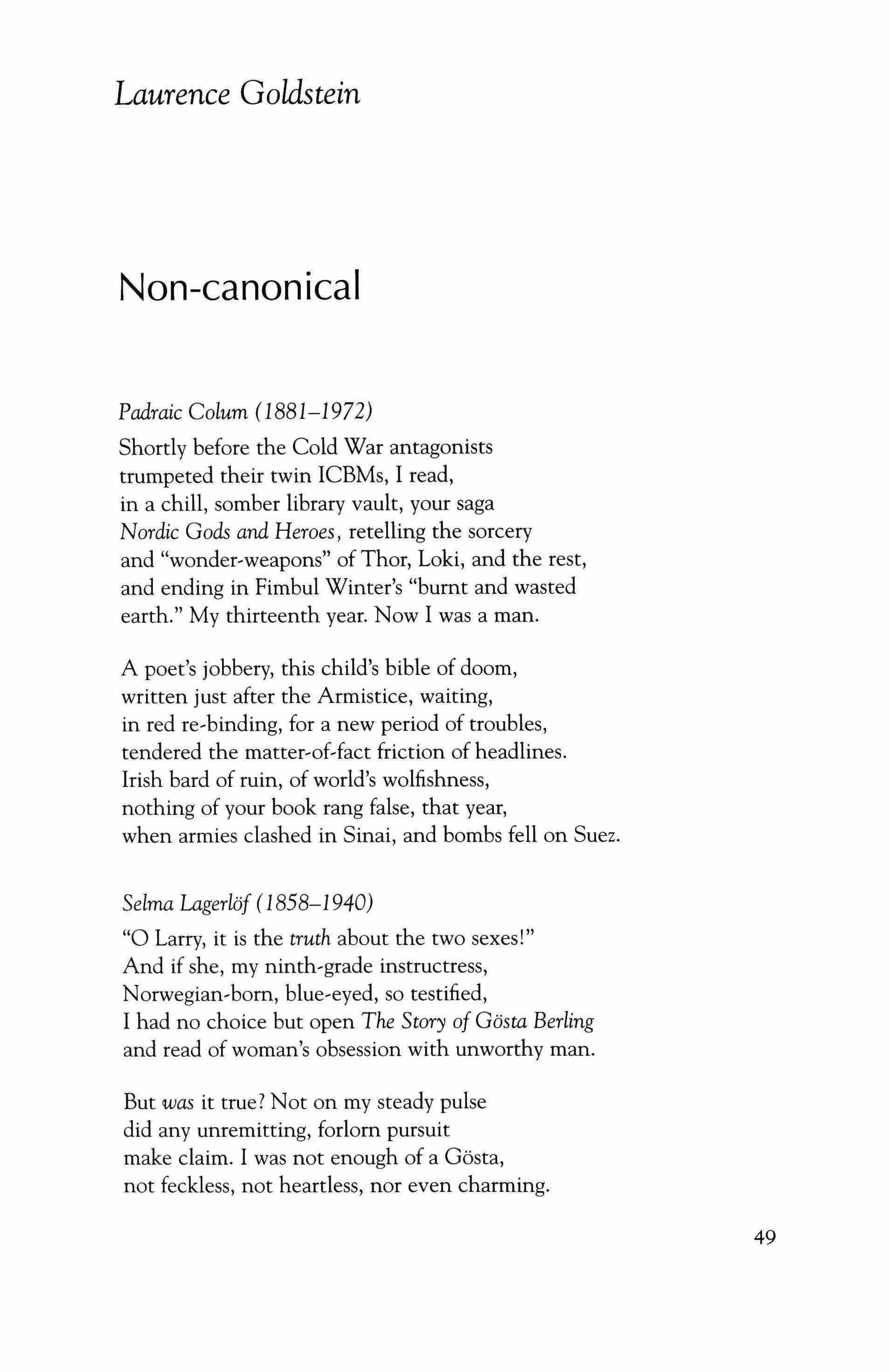
Non-canonical
Padraic Colum (1881-1972)
Shortly before the Cold War antagonists trumpeted their twin ICBMs, I read, in a chill, somber library vault, your saga Nordic Gods and Heroes, retelling the sorcery and "wonder-weapons" of Thor, Loki, and the rest, and ending in Fimbul Winter's "burnt and wasted earth." My thirteenth year. Now I was a man.
A poet's jobbery, this child's bible of doom, written just after the Armistice, waiting, in red re-binding, for a new period of troubles, tendered the matter-of-fact friction of headlines. Irish bard of ruin, of world's wolfishness, nothing of your book rang false, that year, when armies clashed in Sinai, and bombs fell on Suez.
Selma Lagerlof (1858-1940)
"0 Larry, it is the truth about the two sexes!"
And if she, my ninth-grade instructress, Norwegian-born, blue-eyed, so testified, I had no choice but open The Story of Gosta Berling and read of woman's obsession with unworthy man.
But was it true? Not on my steady pulse did any unremitting, forlorn pursuit make claim. I was not enough of a Gosta, not feckless, not heartless, nor even charming.
49

Yet females of this kind wept, and still do, in the self-destroying ecstasy of love. I yearned to be unworthy of their pure clinging devotion. I failed. Was that what you intended, Miss Osterfjord, when you steered virtuous, Jewish me toward this dangerous book?
Fran{:oise Sagan (1935-2004)
That sex could be an embarrassment of the body, a kin to sunburn, bugbites, stomach distress, at the same time one craved it unremittingly, seemed in 1957 the message, or revelation, of Bonjour Tristesse, supreme piece of Chick Lit I devoured, one long Sunday afternoon, to feel, viscerally, how the other half felt, whose hangups made me more neurotic than them.
It was all about the father, I learned. That old Mediterranean cult, that Freudian bilge that put teen suitors in competition with the alpha male. So now I could strategize, now I deployed the physical tricks and tropes that made jeunes filles less sad, less filial.
Jan Valtin (1905-1951)
"Communism" was so much the verbal sign for subversion, transgression, world-shaking resistance to the blithe, bourgeois life I led, of course I read Out of the Night at fifteen as a primer and guide for my rebellious twenties. Semi-fictional, semi-factual, this memoir of double-agency by the masked assassin Richard Julius Herman Krebs taught me that Nazi thuggery mirrored the Soviet model, that free love (with the enchanting Firelei) broke the heart in seven places.
The Kremlin's bulldog, his reprinted confessions now grace the Forbes Book Club, along with First, Break All the Rules and Flat Tax Revolution.
50
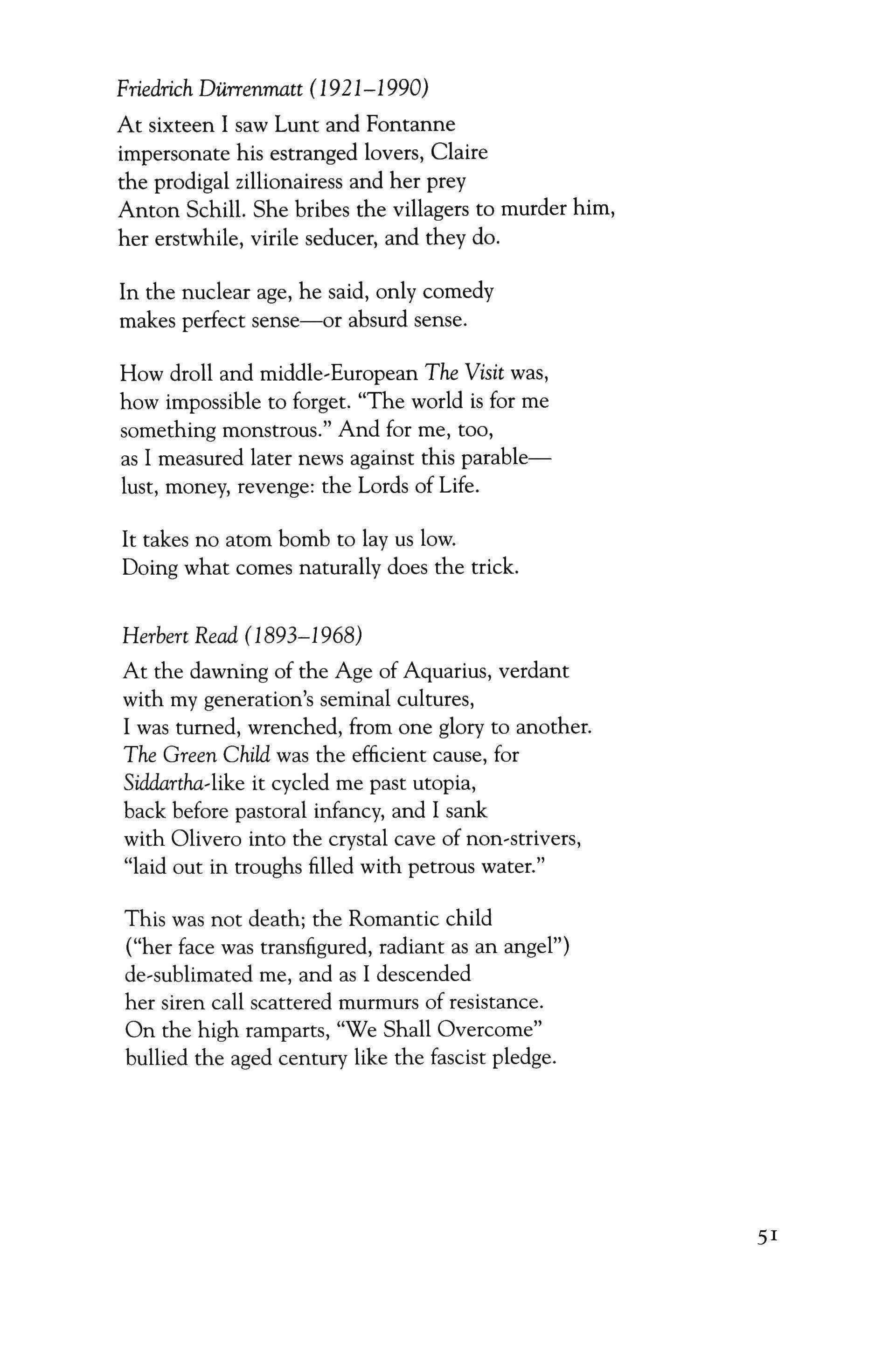 Friedrich Durrenmatt
Friedrich Durrenmatt
(1921-1990)
At sixteen I saw Lunt and Fontanne impersonate his estranged lovers, Claire the prodigal zillionairess and her prey Anton Schill. She bribes the villagers to murder him, her erstwhile, virile seducer, and they do.
In the nuclear age, he said, only comedy makes perfect sense-or absurd sense.
How droll and middle-European The Visit was, how impossible to forget. "The world is for me something monstrous." And for me, too, as I measured later news against this parablelust, money, revenge: the Lords of Life.
It takes no atom bomb to lay us low. Doing what comes naturally does the trick.
Herbert Read (1893-1968)
At the dawning of the Age of Aquarius, verdant with my generation's seminal cultures, I was turned, wrenched, from one glory to another. The Green Child was the efficient cause, for Siddartha-like it cycled me past utopia, back before pastoral infancy, and I sank with Olivero into the crystal cave of non-strivers, "laid out in troughs filled with petrous water."
This was not death; the Romantic child ("her face was transfigured, radiant as an angel") de-sublimated me, and as I descended her siren call scattered murmurs of resistance. On the high ramparts, "We Shall Overcome" bullied the aged century like the fascist pledge.
51

Michael Gold (1893-1967)
"You are fated to live in the workers' world," he wrote, as if admonishing me, not the new masses, who consumed his columns collected in Change the World! After high school I took a summer job handling titanium. I wanted / didn't want to be of the masses, my bitter co-toilers on the factory floor.
"If the Nazis won the war, I'd still be hauling these boxes of metal around," one spat at me, "So what was the war about?" Only the working class could be an instrument for social progress, Gold claimed. "Save yourself," they urged me.
I enrolled at UCLA, "Jew U," where the classics turned out not to be proletarian.
Mary McCarthy (1912-1989)
How ivory was my tower! Burnished atop the hills of Westwood, elite enough to keep all high school renegades la,bas. Were there higher-ed serpents to beware? The Groves of Academe advised: Look around. Henry Mulcahy, who poses as a Red to keep his tenure on a liberal campus is the poster turncoat of your milieu. Get used to it.
To be a Joyce scholar, like Mulcahy, made "cunning" a job description. This field guide disclosed how to spot the Proustian, the Tolstoyan imitatees among faculty, postgrads, and fellow undergrads. Pray for self-knowledge, was Mary's message. I tried to sharpen my conscience with my prose.
William Saroyan (1908-1981)
Of all the old gods falling, one seems almost tragic, my fellow Californian who published The Human Comedy during our species' epic bloodletting, in 1944.
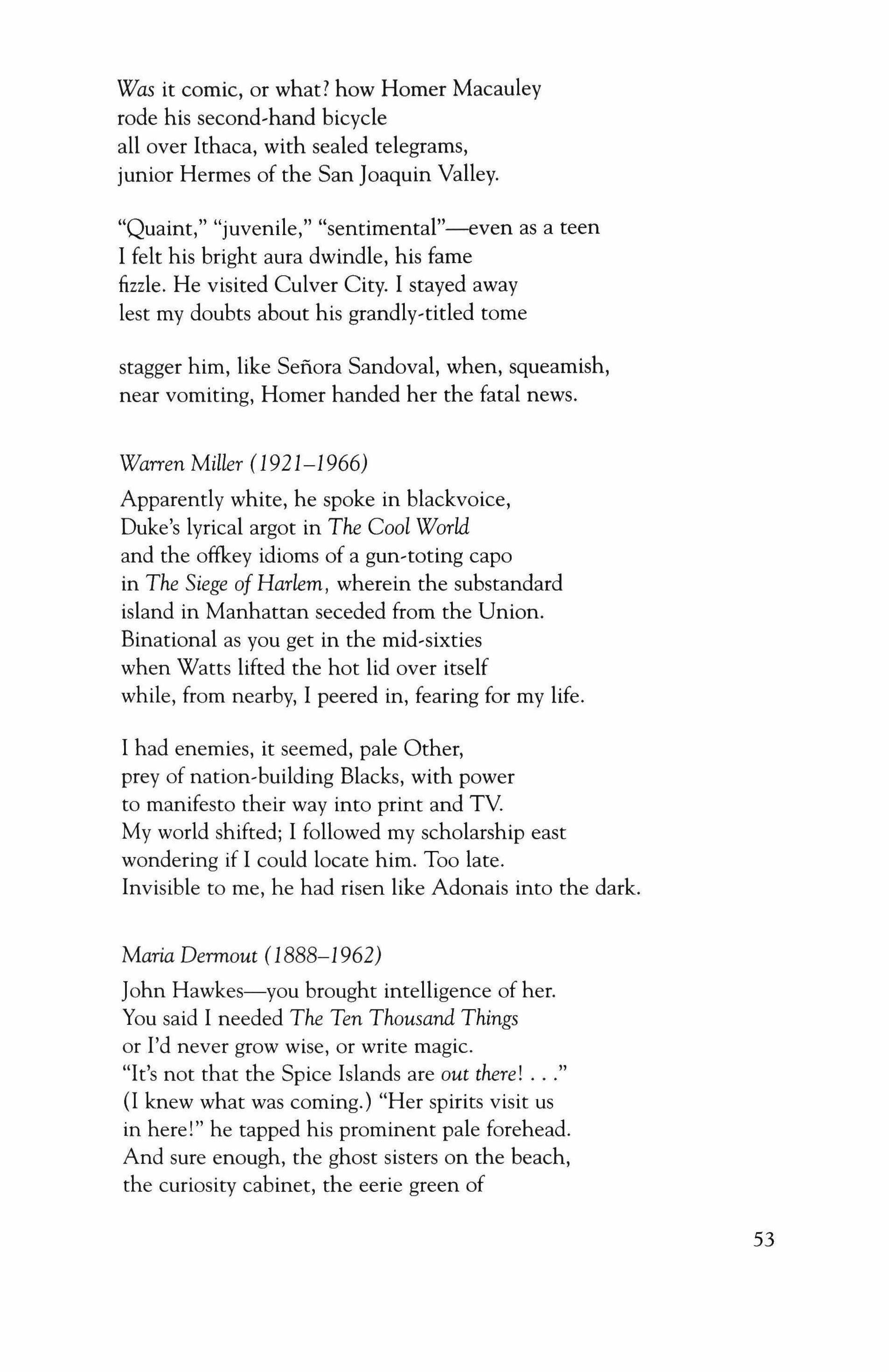
Was it comic, or what? how Homer Macauley rode his second-hand bicycle all over Ithaca, with sealed telegrams, junior Hermes of the San Joaquin Valley.
"Quaint," "juvenile," "sentimental"-even as a teen I felt his bright aura dwindle, his fame fizzle. He visited Culver City. I stayed away lest my doubts about his grandly-titled tome
stagger him, like Senora Sandoval, when, squeamish, near vomiting, Homer handed her the fatal news.
Warren Miller (1921-1966)
Apparently white, he spoke in blackvoice, Duke's lyrical argot in The Cool World and the offkey idioms of a gun-toting capo in The Siege of Harlem, wherein the substandard island in Manhattan seceded from the Union. Binational as you get in the mid-sixties when Watts lifted the hot lid over itself while, from nearby, I peered in, fearing for my life.
I had enemies, it seemed, pale Other, prey of nation-building Blacks, with power to manifesto their way into print and TV. My world shifted; I followed my scholarship east wondering if I could locate him. Too late. Invisible to me, he had risen like Adonais into the dark.
Maria Dermout (1888-1962)
John Hawkes-you brought intelligence of her. You said I needed The Ten Thousand Things or I'd never grow wise, or write magic. "It's not that the Spice Islands are out there! (I knew what was coming.) "Her spirits visit us in here!" he tapped his prominent pale forehead. And sure enough, the ghost sisters on the beach, the curiosity cabinet, the eerie green of
53

Indonesian jungles, sparkled up in Providence, as I daydreamed my graduate years away.
Jack, her cannibals eclipse your own. I can't remember the plot of Second Skin but Felicia still stirs me, like the ginger tea Sophie served us on Everett Avenue.
Genevieve Taggard (1894-1948)
o back,scratching fraternal order of poets, from love or charity spot'lighting rare birds amid the murky cul-de-sacs of the City of Words! In Calling Western Union, one smitten reader did just that: "It's a long way from Keats's comer to Sandburg Ave.," she wrote, then, joyfully, "I'm living now on Fearing Sq." a dogleg from "the comer of Auslander and Wurdeman."
Wurdeman! Could a poet vanish as totally as Audrey Wurdeman? Writing my juvenilia I worried that the canon could not hold, not even if honored by urban designation, the poets this proto-feminist publicly embraced. I vowed to preserve whom I could, including her.
54
Victoria Chang
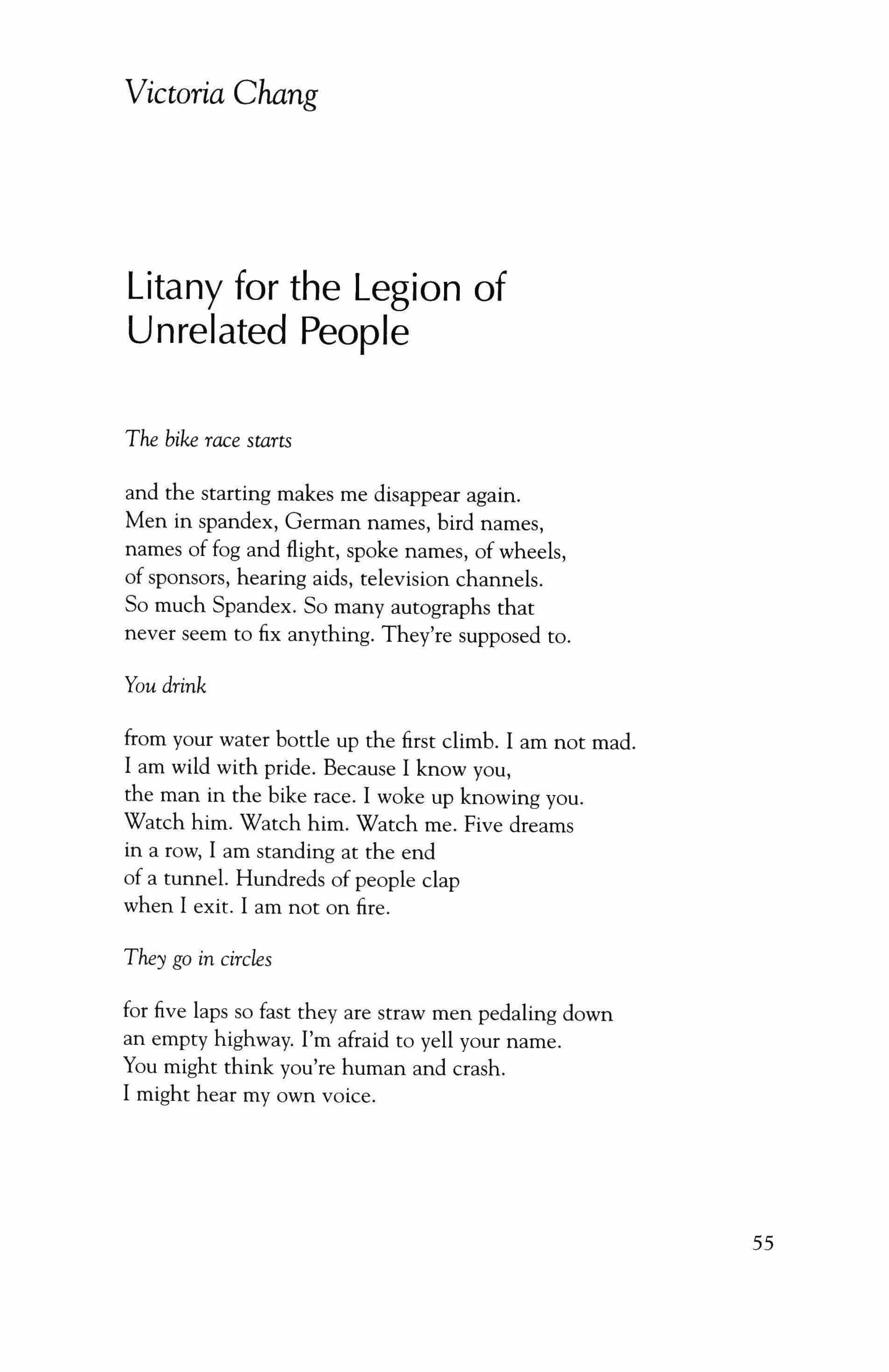
Litany for the Legion of Unrelated People
The bike race starts and the starting makes me disappear again. Men in spandex, German names, bird names, names of fog and flight, spoke names, of wheels, of sponsors, hearing aids, television channels. So much Spandex. So many autographs that never seem to fix anything. They're supposed to.
You drink from your water bottle up the first climb. I am not mad. I am wild with pride. Because I know you, the man in the bike race. I woke up knowing you. Watch him. Watch him. Watch me. Five dreams in a row, I am standing at the end of a tunnel. Hundreds of people clap when I exit. I am not on fire.
They go in circles for five laps so fast they are straw men pedaling down an empty highway. I'm afraid to yell your name. You might think you're human and crash. I might hear my own voice.
55

I enter the hotel lobby, thousands of people circling booths. Plastic nametags around necks. A record of being alive. They look great! All of them. Little bags stuffed with white papers on the environment. What about me.
I am a hotel chair, row 67, 73 in. Counting from the left. The Flamingo Room. Do they know about the others across the road? Splitting the air on their carbon,fiber machines.
I am outside again. Their legs show signs of work. Some have pulled out. Some need stitches that will leak things. Tired and sore, they finish. It's simple. Shower. Sleep, wake up, clip in, ride for six hours. It's green. It's brown. It's cold. Then green again.
The people in the hotel have long since returned to their rooms. In another city. Train. Casket. I know what to do: try to catch things in my hand; hear the newspaper banging on the door each morning; puncture my skin with a tack, spread myself until I crash into something.
Written in the Year of the Lake: A Murder
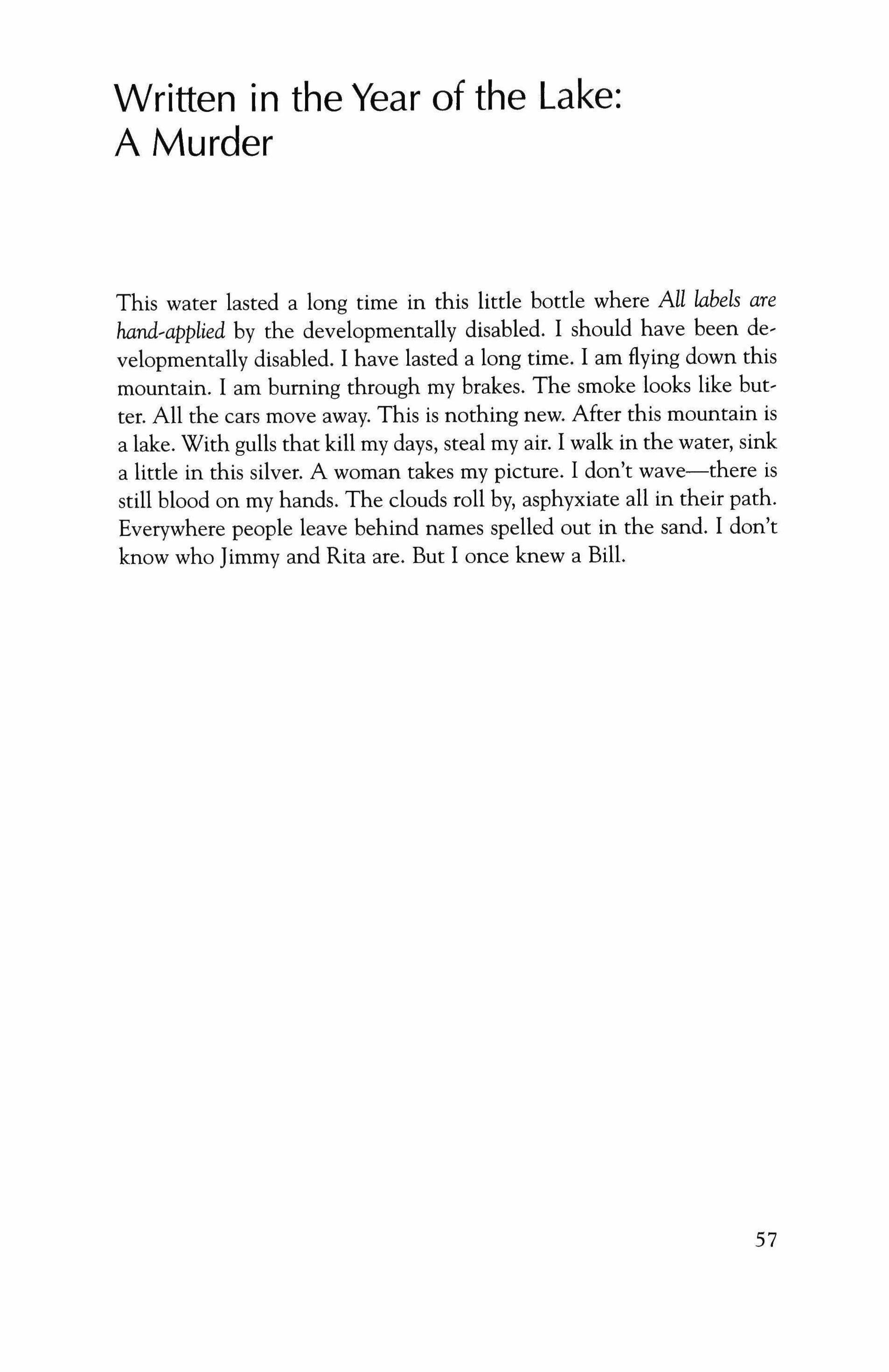
This water lasted a long time in this little bottle where All labels are hand,applied by the developmentally disabled. I should have been de' velopmentally disabled. I have lasted a long time. I am flying down this mountain. I am burning through my brakes. The smoke looks like but, ter. All the cars move away. This is nothing new. After this mountain is a lake. With gulls that kill my days, steal my air. I walk in the water, sink a little in this silver. A woman takes my picture. I don't wave-there is still blood on my hands. The clouds roll by, asphyxiate all in their path. Everywhere people leave behind names spelled out in the sand. I don't know who Jimmy and Rita are. But I once knew a Bill.
57
Worker Ants
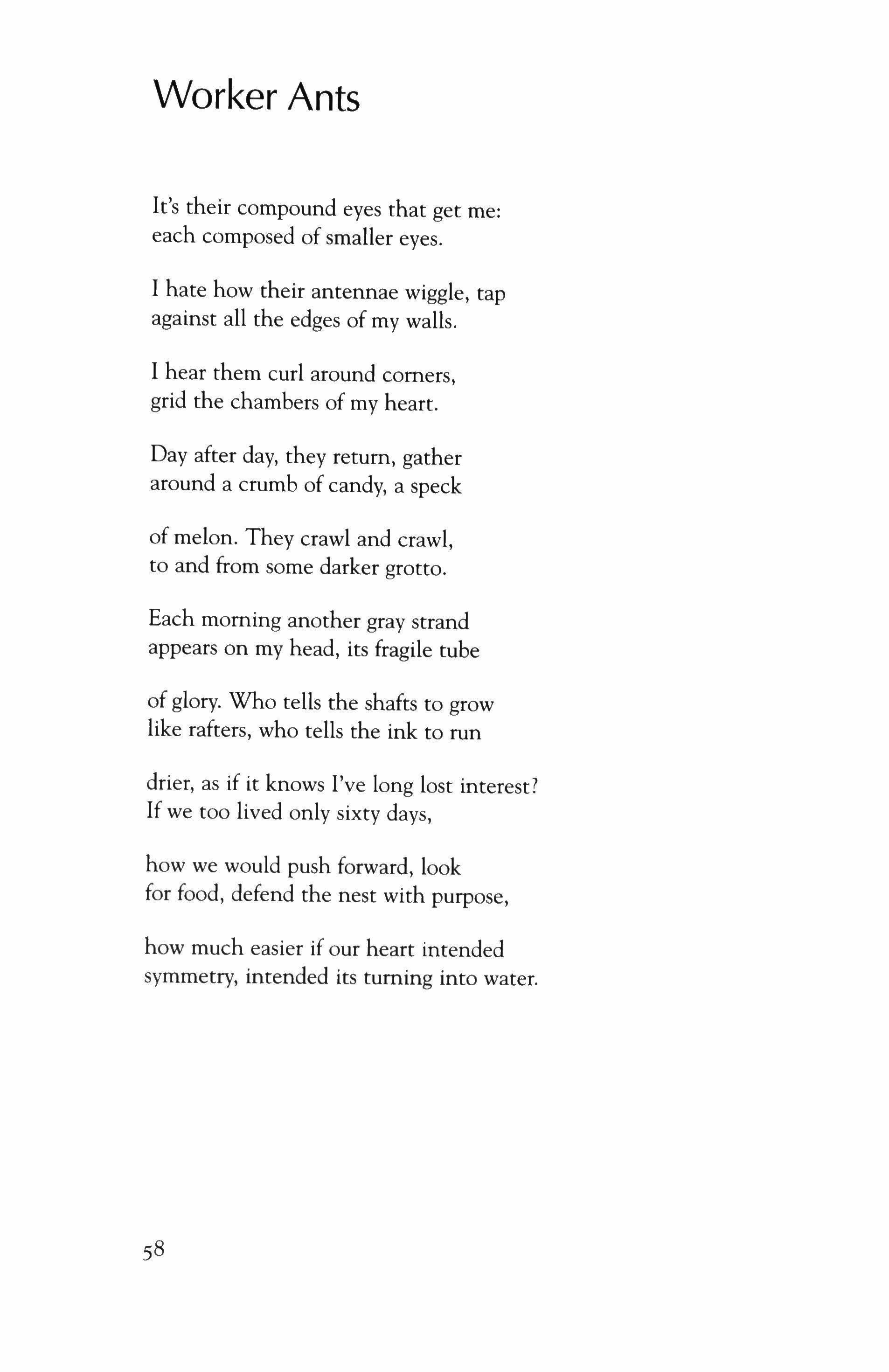
It's their compound eyes that get me: each composed of smaller eyes.
I hate how their antennae wiggle, tap against all the edges of my walls.
I hear them curl around corners, grid the chambers of my heart.
Day after day, they return, gather around a crumb of candy, a speck of melon. They crawl and crawl, to and from some darker grotto.
Each morning another gray strand appears on my head, its fragile tube of glory. Who tells the shafts to grow like rafters, who tells the ink to run
drier, as if it knows I've long lost interest? If we too lived only sixty days, how we would push forward, look for food, defend the nest with purpose, how much easier if our heart intended symmetry, intended its turning into water.
58
Anonymous Self Portrait with Dead Animals

I have no idea what time it is but there is an arm hung over my shoulder. Each night it's a different arm but the man is the same. He has a blond eye and a casino chip gleam. Sometimes he has a maddening bark; other times he has a severed foot. I know this man but am afraid to look at him. Tonight he speaks and tells me he loves me. I tell him I have a husband. He backs off. His sigh feels good on my neck. Once I went to Florida, pulled shrimp from their shells until I became sick. I walked on the beach, fed gulls with my fists. The cabana songs barely in the background, clinking glasses. And I loved every man on the sand. Now I am in oil, in the throat of an open mouth. The man with the blond eye does the math imagine plus disaster equals infinity. If he had come earlier, in the light, the coyote on the road would still be alive.
59
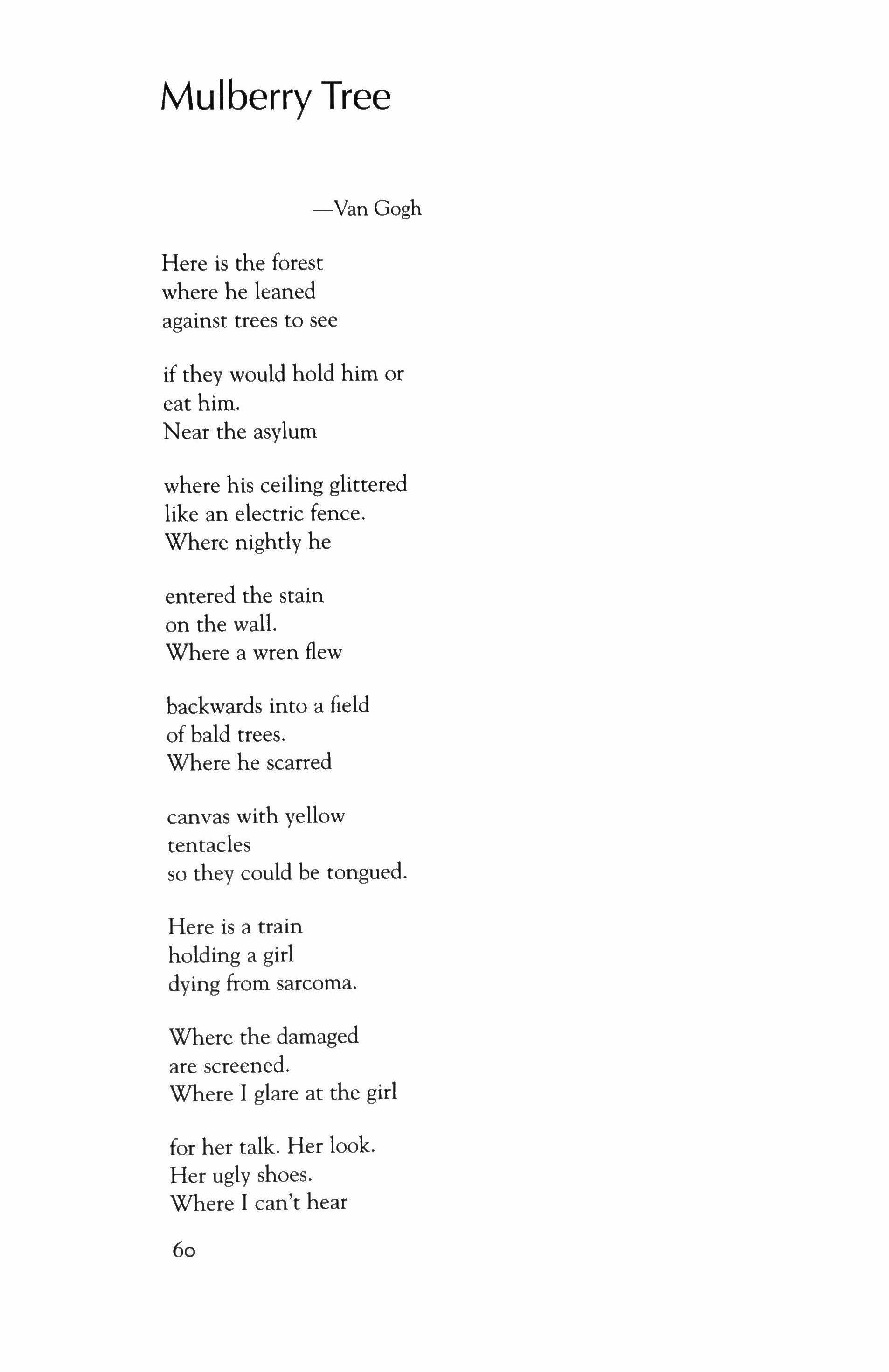
Mulberry Tree -Van Gogh
Here is the forest where he leaned against trees to see if they would hold him or eat him.
Near the asylum where his ceiling glittered like an electric fence. Where nightly he entered the stain on the wall. Where a wren flew backwards into a field of bald trees. Where he scarred canvas with yellow tentacles so they could be tongued.
Here is a train holding a girl dying from sarcoma. Where the damaged are screened.
Where I glare at the girl for her talk. Her look. Her ugly shoes. Where I can't hear
60

the final drop of her neck. Where I can't see the tree that bums and bums, but never catches on fire.
61
D. Nurkse

The Missing
We filled the streets, squinting upward, shading our eyes, searching for the towers, or more planes, or rescue choppers, and a great silence built until a girl whispered, blood. She asked her lover to stand still, used his back for a drawing board and wrote on a paper bag Give Blood-instantly a line formed, then many lines, twelve blocks east to Bellevue, eighteen north to Saint Vincent. We chose one and waited, gossiping with our neighbors.
We had a place, a function, something invisible inside us was needed desperately; we watched with envy and deep longing as the rare blood,types strode toward the head of the line calmly, swinging their arms, commandos to the rescue. Then the word came back, no wounded.
Autopoiesis
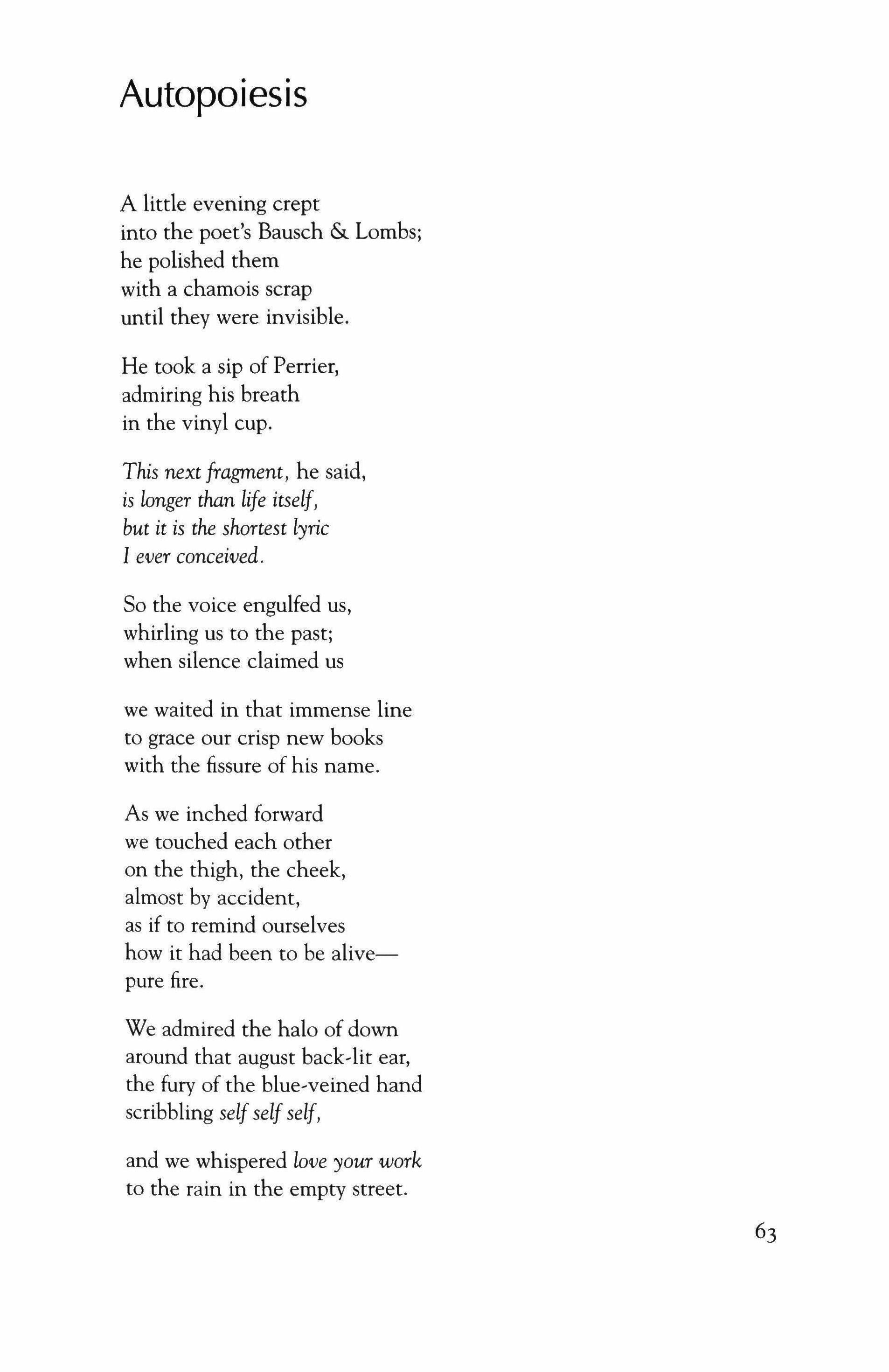
A little evening crept into the poet's Bausch & Lombs; he polished them with a chamois scrap until they were invisible.
He took a sip of Perrier, admiring his breath in the vinyl cup.
This next fragment, he said, is longer than life itself, but it is the shortest lyric I ever conceived.
So the voice engulfed us, whirling us to the past; when silence claimed us
we waited in that immense line to grace our crisp new books with the fissure of his name.
As we inched forward we touched each other on the thigh, the cheek, almost by accident, as if to remind ourselves how it had been to be alivepure fire.
We admired the halo of down around that august back-lit ear, the fury of the blue-veined hand scribbling selfselfself, and we whispered love your work to the rain in the empty street.
Briga
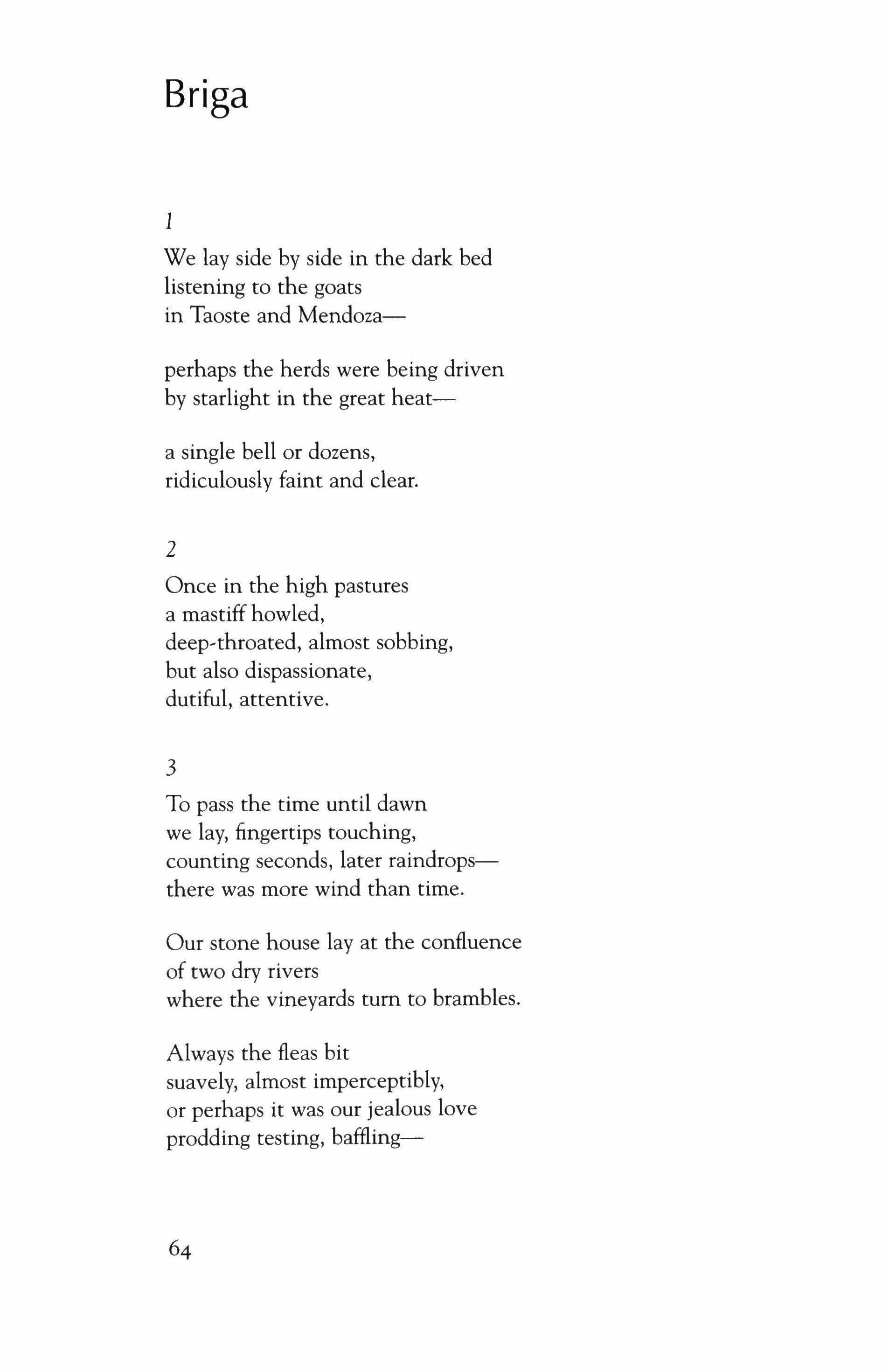
1
We lay side by side in the dark bed listening to the goats in Taoste and Mendozaperhaps the herds were being driven by starlight in the great heata single bell or dozens, ridiculously faint and clear.
2
Once in the high pastures a mastiff howled, deep-throated, almost sobbing, but also dispassionate, dutiful, attentive.
3
To pass the time until dawn we lay, fingertips touching, counting seconds, later raindropsthere was more wind than time.
Our stone house lay at the confluence of two dry rivers where the vineyards tum to brambles.
Always the fleas bit suavely, almost imperceptibly, or perhaps it was our jealous love prodding testing, baffling-
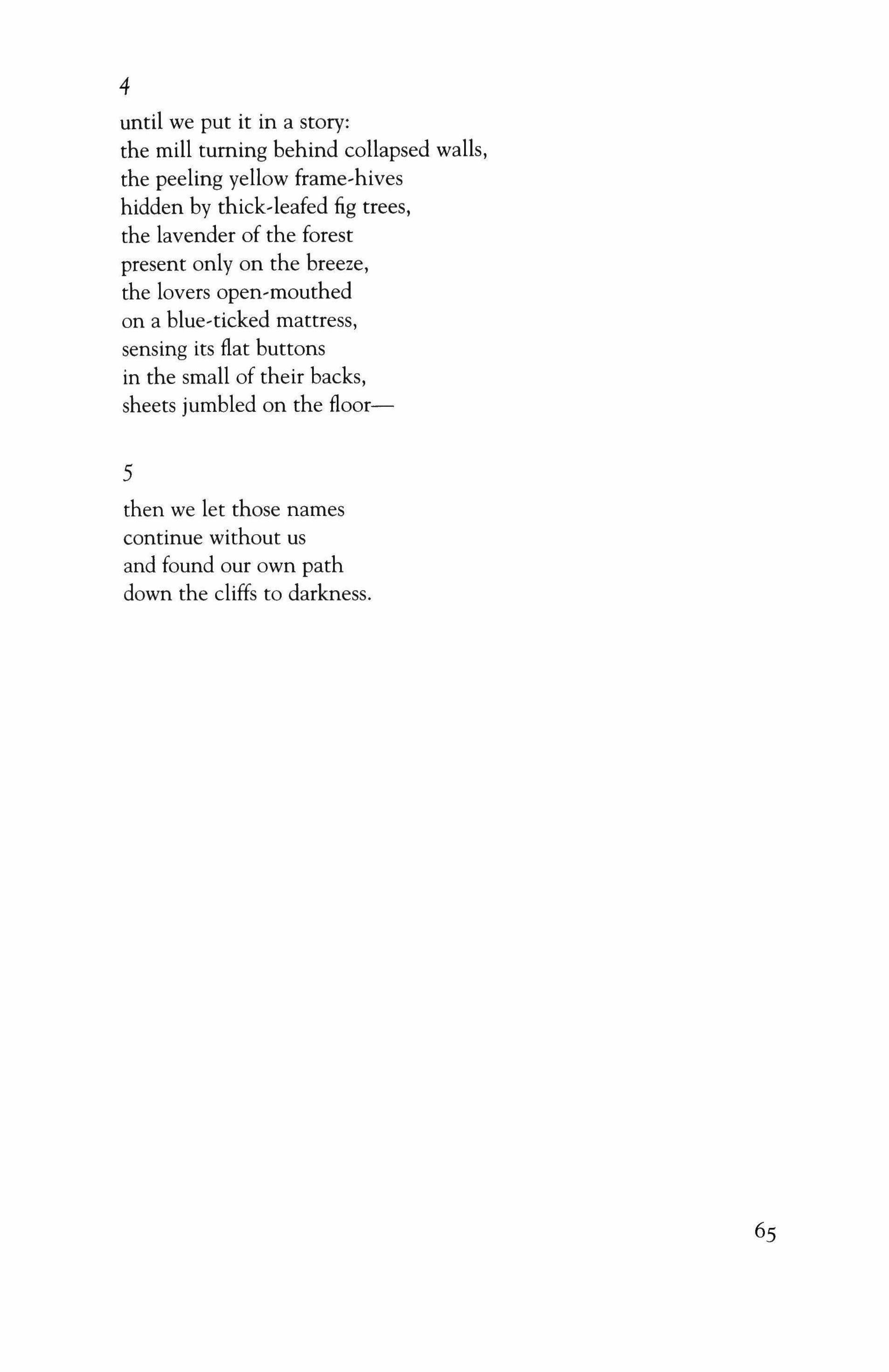
until we put it in a story: the mill turning behind collapsed walls, the peeling yellow frame-hives hidden by thick-leafed fig trees, the lavender of the forest present only on the breeze, the lovers open-mouthed on a blue-ticked mattress, sensing its flat buttons in the small of their backs, sheets jumbled on the floor-
5 then we let those names continue without us and found our own path down the cliffs to darkness.
4
65
Sandra McPherson

Muses for Panic
1
On the recommendation of my body a black sun appears in the clouds, solar breathing stops, our carriage tosses without hearth or bowl or bed.
The expanse is all blind gray, my heart a greasy knob. Monochromatic, the airspace bars all stars. The others and I are pent.
I have my seat-mate's pulse in my wrist. Stellar's jay clamor comes hoarse from my ears, my panting's say-so.
My feet snap, hands flood, my eyes move like the worm split by the spade.
We will come low, fracture bells and teapots, pool with the ichor of chickens and dogs,
66
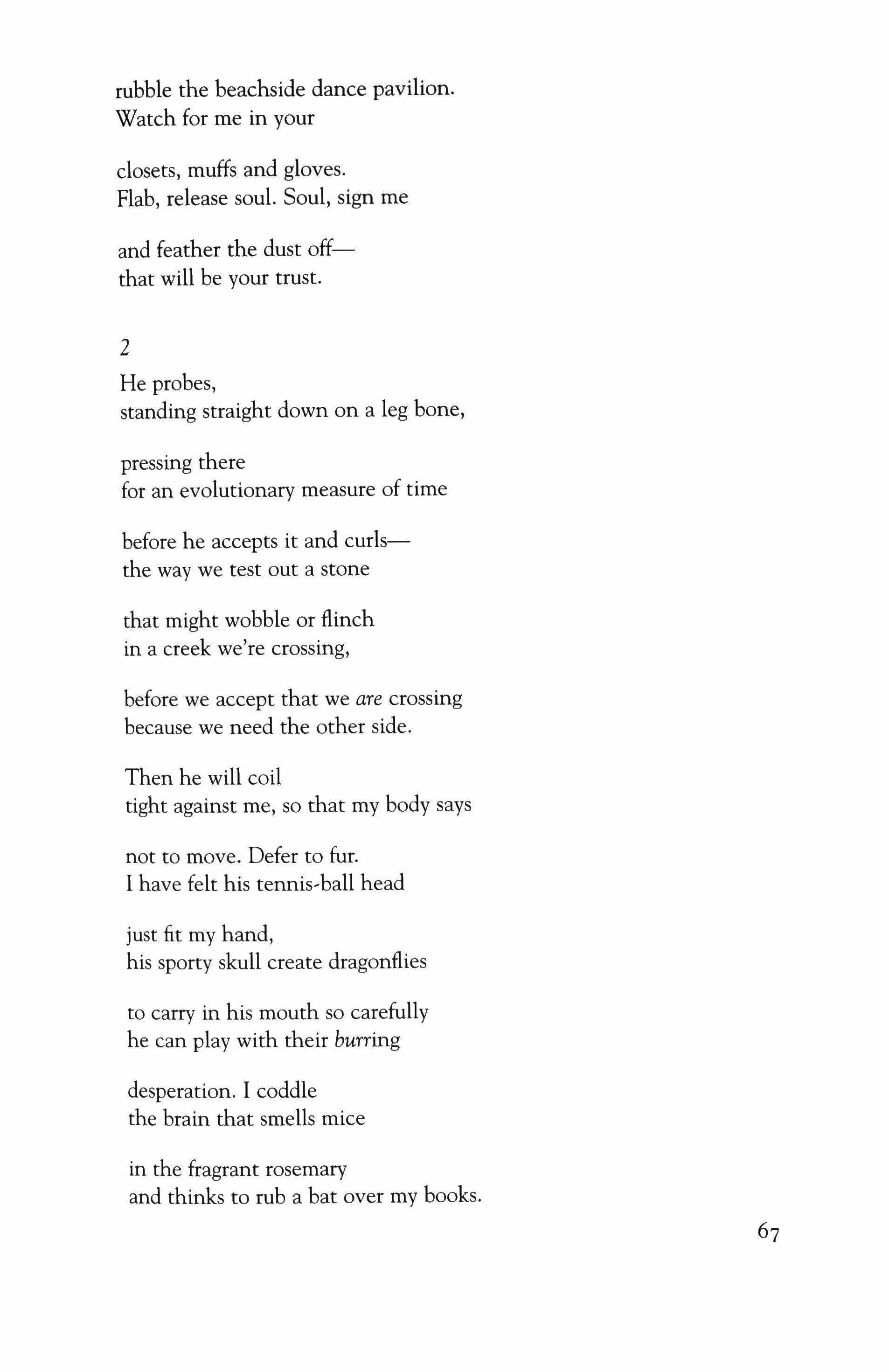
rubble the beachside dance pavilion. Watch for me in your closets, muffs and gloves. Flab, release soul. Soul, sign me and feather the dust offthat will be your trust.
2
He probes, standing straight down on a leg bone, pressing there for an evolutionary measure of time before he accepts it and curlsthe way we test out a stone that might wobble or flinch in a creek we're crossing, before we accept that we are crossing because we need the other side. Then he will coil tight against me, so that my body says not to move. Defer to fur. I have felt his tennis-ball head just fit my hand, his sporty skull create dragonflies to carry in his mouth so carefully he can play with their burring desperation. I coddle the brain that smells mice in the fragrant rosemary and thinks to rub a bat over my books.

Timidity sometimes backs him into a mound of quilts till nothing's showing but his eyes like pennies in the lint trap. He'll leave me lonely in a thunderstorm.
How could his father forsake us for the other side?
3
The physician is late: This ploy is to discompose the mind a body usually leans on. To my thrown fit he fits his beacon hose. I try to recognize my own turns and twists. I learn new ones and I speak as if I'm the guide. I want to lead. There is a She in there, just as much esteem as the Who in the mirror.
Further the tardy oppressor asks. That is my goal too. Push ahead with the lamp.
Till it hurts so much I'm histrionic: eyes cry out when stage-light unmasks, unveils what should unman him, the heroine's shy unknown.
68
Bereavement: 1919

Believing I am going to live, I begin the war of nerves. When I need just a little calmative I drink top milk at the creamery. But toward evening let me recommend This, should you ever need itI hang a locket of asafetida around my neck. Works wonders.
Richard Kenney

Fall of Rome
In the ought-to-be speechless hollow of the greatest church of its age Edging sideways under the skycool pitiless oculus of the deity And in consideration of heaven and hell, I overhear a woman whisper Harold, what's your HDL, While an American kid with a toothpick and pees Kisses his strappy girl's tattoo, a (what else?) Snake, while the Sony-eyed guy checks his pixels And lumens and pans-
Pantheon; August, 2000. ElsewhereWell, lots. The oracle's closed at Delphi. I? I think of Mir Scraping down the cobalt dome; also war hammers At the altar font, the last acqueduct cut, recallingWhat?-reproductive vigor? Some miraculous News-bad health-earthquake, maybe) weakened revetments, priests Pointing mortar at Constantinople, Attila's horse veering East.
Alaric Intelligence Memo #36
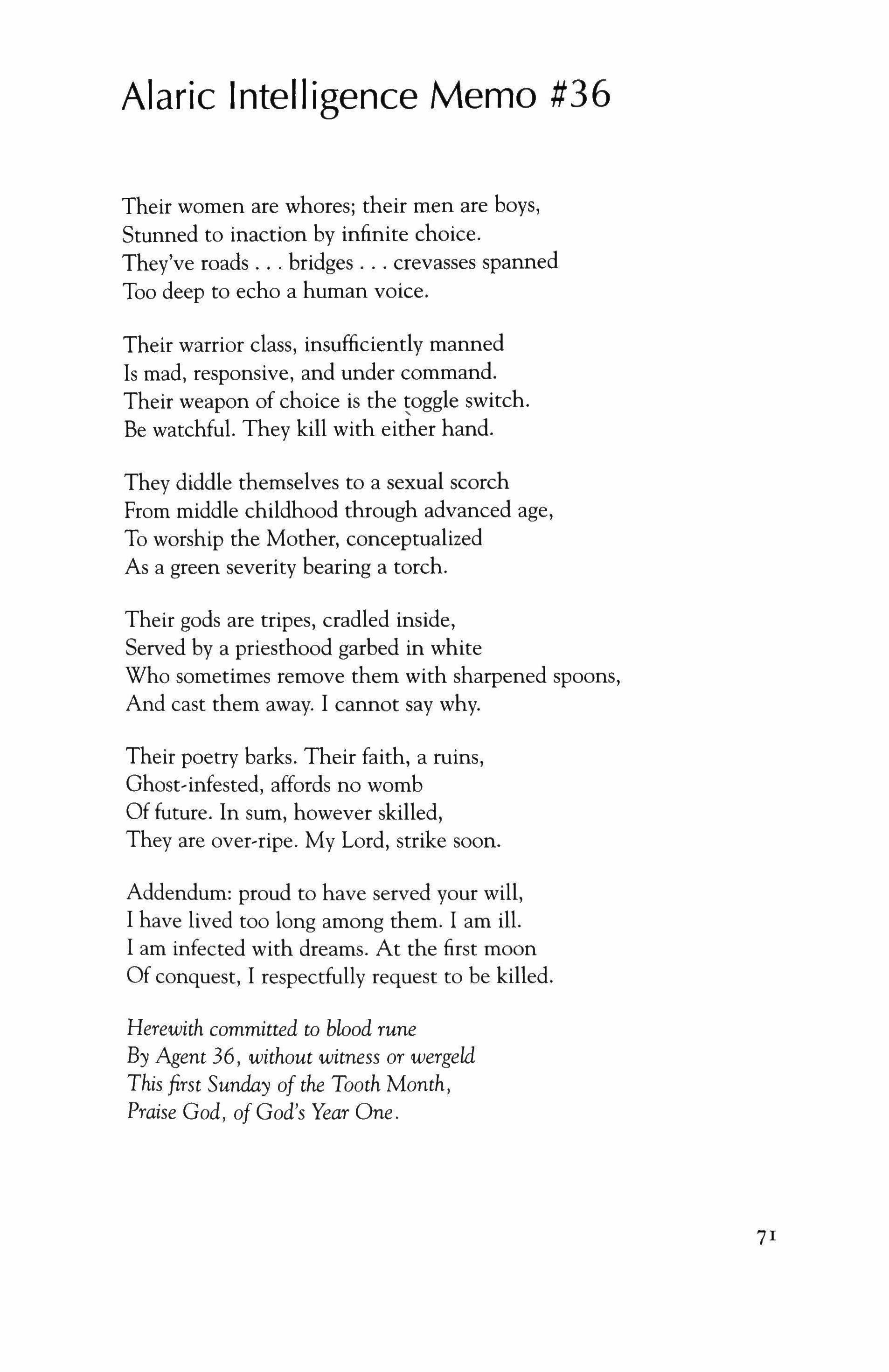
Their women are whores; their men are boys, Stunned to inaction by infinite choice.
They've roads bridges crevasses spanned Too deep to echo a human voice.
Their warrior class, insufficiently manned Is mad, responsive, and under command. Their weapon of choice is the toggle switch. Be watchful. They kill with either hand.
They diddle themselves to a sexual scorch
From middle childhood through advanced age, To worship the Mother, conceptualized As a green severity bearing a torch.
Their gods are tripes, cradled inside, Served by a priesthood garbed in white Who sometimes remove them with sharpened spoons, And cast them away. I cannot say why.
Their poetry barks. Their faith, a ruins, Ghost-infested, affords no womb
Of future. In sum, however skilled, They are over-ripe. My Lord, strike soon.
Addendum: proud to have served your will, I have lived too long among them. I am ill. I am infected with dreams. At the first moon Of conquest, I respectfully request to be killed.
Herewith committed to blood rune
By Agent 36) without witness or wergeld
This first Sunday of the Tooth Month, Praise God, of God's Year One.
71
Alicita Rodriguez
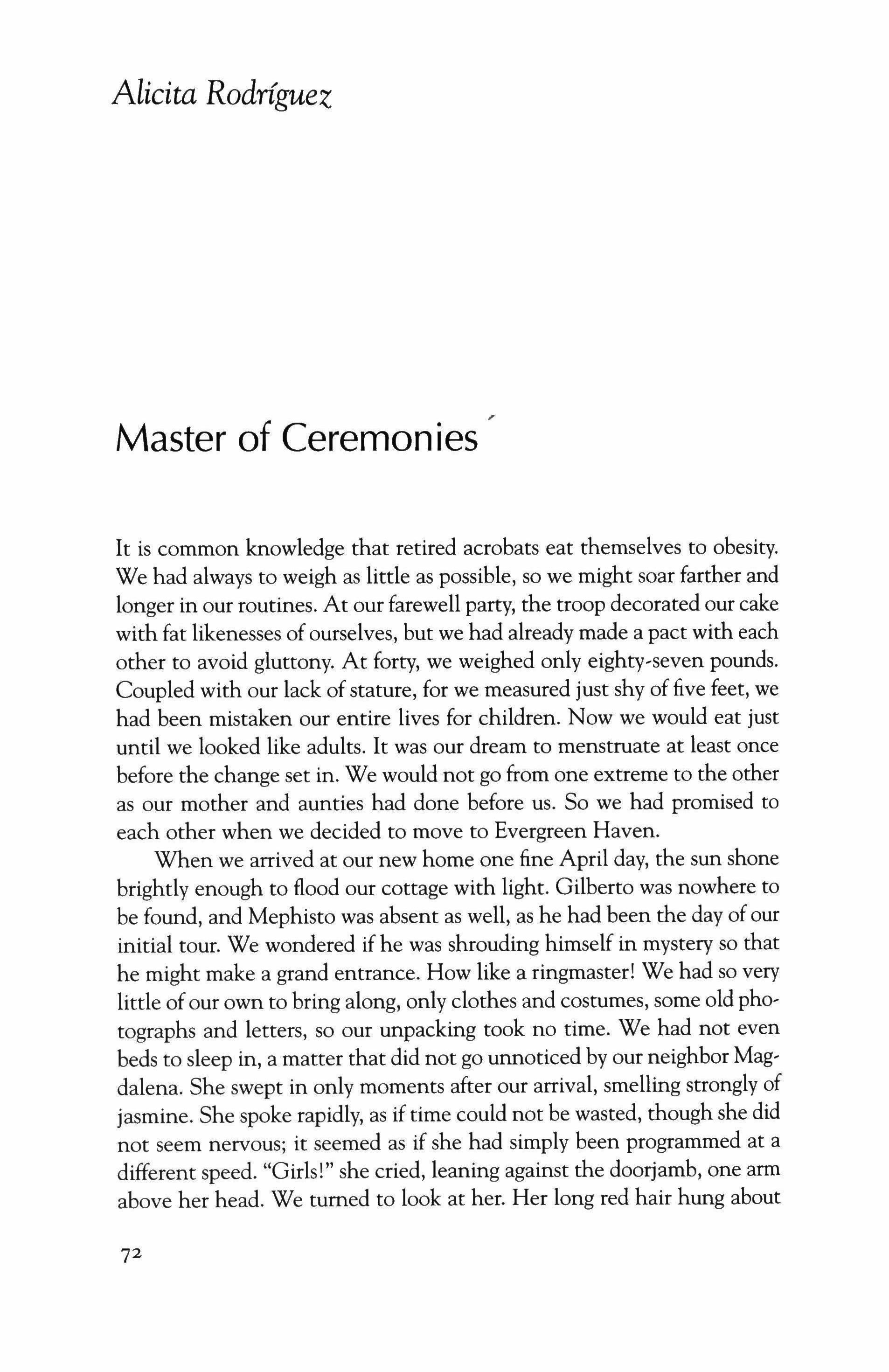
Master of Ceremonies'
It is common knowledge that retired acrobats eat themselves to obesity. We had always to weigh as little as possible, so we might soar farther and longer in our routines. At our farewell party, the troop decorated our cake with fat likenesses ofourselves, but we had already made a pact with each other to avoid gluttony. At forty, we weighed only eighty-seven pounds. Coupled with our lack of stature, for we measured just shy offive feet, we had been mistaken our entire lives for children. Now we would eat just until we looked like adults. It was our dream to menstruate at least once before the change set in. We would not go from one extreme to the other as our mother and aunties had done before us. So we had promised to each other when we decided to move to Evergreen Haven.
When we arrived at our new home one fine April day, the sun shone brightly enough to flood our cottage with light. Gilberto was nowhere to be found, and Mephisto was absent as well, as he had been the day of our initial tour. We wondered if he was shrouding himself in mystery so that he might make a grand entrance. How like a ringmaster! We had so very little of our own to bring along, only clothes and costumes, some old photographs and letters, so our unpacking took no time. We had not even beds to sleep in, a matter that did not go unnoticed by our neighbor Magdalena. She swept in only moments after our arrival, smelling strongly of jasmine. She spoke rapidly, as if time could not be wasted, though she did not seem nervous; it seemed as if she had simply been programmed at a different speed. "Girls!" she cried, leaning against the doorjamb, one arm above her head. We turned to look at her. Her long red hair hung about

her shoulders in crazy waves, so frizzy that she appeared to be traveling in a cloud of saffron. Her eyes were yellow, a point we noticed as the color contrasted sharply with the black kohl outlining them. Her voice was deep and raspy, her breasts voluminous, and her body on the ripe edge of fleshy. We looked at each other, recognizing our envy.
Magdalena kept talking. "Look at you two! So adorable! I could eat you for dinner." At this, she pinched our thighs. "Only an appetizer for Magdalena." She burst out laughing in such a shrieking manner that the crows outside our window squawked in reply. "Magdalena is big, no? If only you could take some of this off my hands." She grabbed her breasts and jostled them up and down. "You girls are lucky. How my back aches at night." She sighed. "It can't be possible!" she cried. We stood still and raised our brows at each other, yet we did not have to wait long for her meaning to become clear. "Who can live like this?" She tsked at us and ran away, tucking into her own apartment and returning with a large handbag, talking to us the entire time. "You must tum over a new leaf, girls. Get some things! You're not at the circus anymore." She reappeared in our doorway applying makeup.
The car was as small as Magdalena was big. She maneuvered into the driver's seat bottom first, then swung her legs inside, using her hands to lean on the wheel while she shifted her weight from one cheek to the other in order to snap her underwear into its proper place and smooth her skirt beneath her. She checked her makeup in the mirror before starting the engine, using her index finger to wipe away a spot of lipstick and her ring fingers to smooth her eye kohl, which was starting to run in the heat of midday. She shook out her hair and flung it behind her. The car lurched backwards before her toilette was finished and we were on our way. Besides a bed to sleep on, we couldn't begin to imagine what we should buy for our new home, never having lived outside the circus. Magdalena seemed to realize this and took charge of the entire shopping excursion. She spoke to us as she drove, shooting us meaningful glances every now and again when she thought one of her points particularly important. "Two beds," she corrected us after we announced sheepishly that we thought we'd need a bed to sleep on. "Two beds for two people." She held up two fingers and scolded us. "Two women," she winked, making us smile.
Magdalena spent the rest of the week carting us around town to buy things we needed. Of course, what we needed was largely ofher own construction. We needed plants and vases, books and paintings, pillows and curtains. We needed embroidered towels and monogrammed sheets, feather comforters and satin dressing gowns. We needed a walnut vanity
73
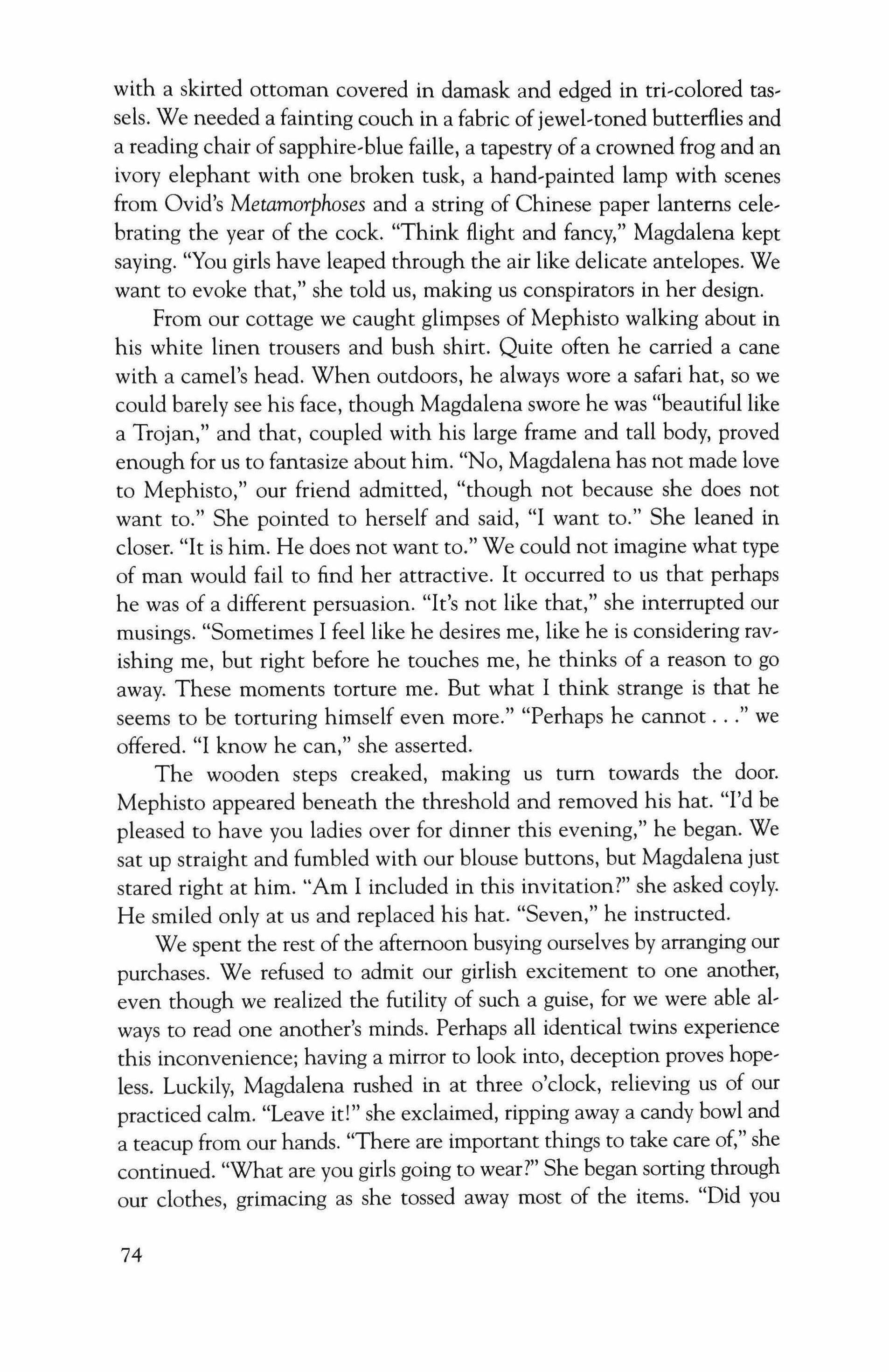
with a skirted ottoman covered in damask and edged in tri-colored tassels. We needed a fainting couch in a fabric ofjewel-toned butterflies and a reading chair of sapphire-blue faille, a tapestry of a crowned frog and an ivory elephant with one broken tusk, a hand-painted lamp with scenes from Ovid's Metamorphoses and a string of Chinese paper lanterns celebrating the year of the cock. "Think flight and fancy," Magdalena kept saying. "You girls have leaped through the air like delicate antelopes. We want to evoke that," she told us, making us conspirators in her design.
From our cottage we caught glimpses of Mephisto walking about in his white linen trousers and bush shirt. Quite often he carried a cane with a camel's head. When outdoors, he always wore a safari hat, so we could barely see his face, though Magdalena swore he was "beautiful like a Trojan," and that, coupled with his large frame and tall body, proved enough for us to fantasize about him. "No, Magdalena has not made love to Mephisto," our friend admitted, "though not because she does not want to." She pointed to herself and said, "I want to." She leaned in closer. "It is him. He does not want to." We could not imagine what type of man would fail to find her attractive. It occurred to us that perhaps he was of a different persuasion. "It's not like that," she interrupted our musings. "Sometimes I feel like he desires me, like he is considering ravishing me, but right before he touches me, he thinks of a reason to go away. These moments torture me. But what I think strange is that he b hi If ""P h h seems to e tortunng imse even more. er aps e cannot. we offered. "I know he can," she asserted.
The wooden steps creaked, making us tum towards the door. Mephisto appeared beneath the threshold and removed his hat. "I'd be pleased to have you ladies over for dinner this evening," he began. We sat up straight and fumbled with our blouse buttons, but Magdalena just stared right at him. "Am I included in this invitation?" she asked coyly. He smiled only at us and replaced his hat. "Seven," he instructed.
We spent the rest of the afternoon busying ourselves by arranging our purchases. We refused to admit our girlish excitement to one another, even though we realized the futility of such a guise, for we were able always to read one another's minds. Perhaps all identical twins experience this inconvenience; having a mirror to look into, deception proves hopeless. Luckily, Magdalena rushed in at three o'clock, relieving us of our practiced calm. "Leave it!" she exclaimed, ripping away a candy bowl and a teacup from our hands. "There are important things to take care of," she continued. "What are you girls going to wear?" She began sorting through our clothes, grimacing as she tossed away most of the items. "Did you
74

think you'd be coming to a convent?" She looked at us with her brow fur' rowed, an action that made her nostrils open dramatically, giving her a dragon,like countenance. It is true that we had bought our clothes in order to appear grown up: high-necked blouses, lace collars, belted dresses. She held up a linen sheath: "Potato sack!" she cried. After throwing our clothes about the room, she dashed to her apartment to grab her enormous purse, and ushered us into her little automobile once again.
In the end we reached a compromise, for Magdalena kept putting us in snug pedal pushers and outlandish prints. And we, of course, kept gravitating towards coarse slacks and jackets with great shoulder pads. We finally chose a thin,strapped dress in navy pique with a knee,length circle skirt; and a black mohair sweater with a pair of taffeta pants in black and white gingham. Magdalena said we looked like little movie stars. When we walked in to find Mephisto wearing a muumuu, we felt awkward and foolish. We stood in our heels holding our evening bags, embarrassed at trying too hard. "Drop those purses and have a seat," he said, walking away from us towards the kitchen. We sat down on the butter-colored couch, sinking pleasantly into the chenille cushions. The great room looked almost tent-like. The windows were covered by pearly draperies of an emerald and marigold brocade; looking closely, we discerned a leaf motif, which we had first taken as paisley. It felt to us like we were inside an elaborately wrapped gift.
Suddenly the lights went out, and everything went black. As soon as our nervousness had reached a pitch high enough that we were con, sidering getting up to leave, Mephisto came in carrying a pale green pillar candle that smelled of mint. "Right this way, ladies." He ushered us into the dining room, where the walls were covered in botanical prints. One wall had only herbs, the other roses, and the third bulbs-the fourth being dominated by a large mullioned window, identical to those in the salon. "This evening I have prepared a Hawaiian-themed repast for your dining pleasure." He pointed towards his muumuu as way of ex, planation, then picked up the paper menu that graced his place setting, gesturing for us to do likewise. At the top of the rectangular card, there was a pressed leaf. Underneath, carefully centered and written in char, treuse, were the courses: Alexander in chilled flute, Canape of seared mahi mahi, Mulligatawny soup, Stewed pork with banana and coconut served on a bed of poi, Pineapple sponge cake garnished with blanched macadamia nuts swimming in chocolate soup. Taking one of the three glasses that stood sweating on a gold charger, he lifted it above his most glorious face and toasted, "May the Evergreen Haven give you peace in
75
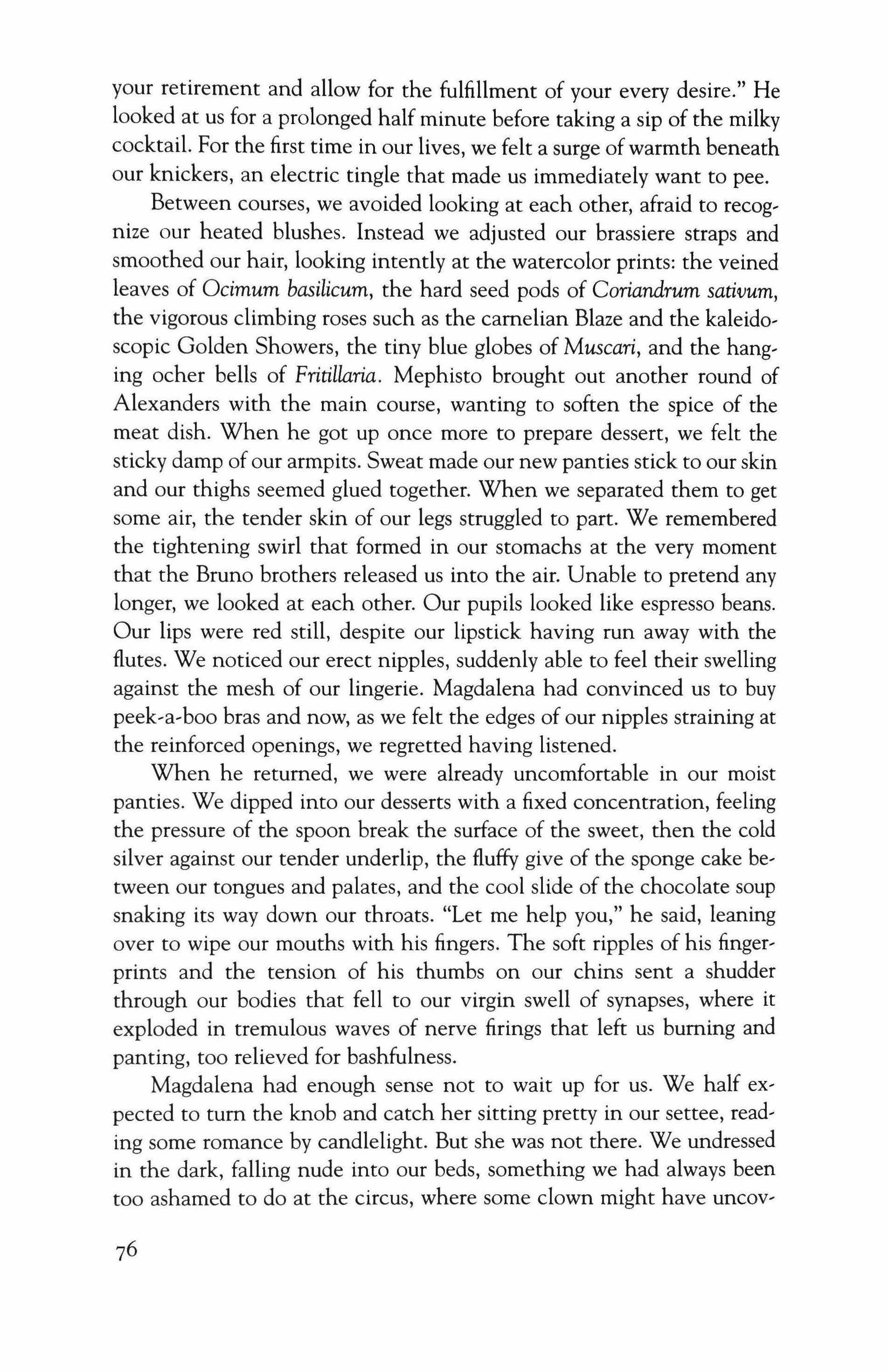
your retirement and allow for the fulfillment of your every desire." He looked at us for a prolonged half minute before taking a sip of the milky cocktail. For the first time in our lives, we felt a surge ofwarmth beneath our knickers, an electric tingle that made us immediately want to pee. Between courses, we avoided looking at each other, afraid to recognize our heated blushes. Instead we adjusted our brassiere straps and smoothed our hair, looking intently at the watercolor prints: the veined leaves of Ocimum basilicum, the hard seed pods of Coriandrum sativum, the vigorous climbing roses such as the carnelian Blaze and the kaleidoscopic Golden Showers, the tiny blue globes of Muscari, and the hang, ing ocher bells of Fritillaria. Mephisto brought out another round of Alexanders with the main course, wanting to soften the spice of the meat dish. When he got up once more to prepare dessert, we felt the sticky damp of our armpits. Sweat made our new panties stick to our skin and our thighs seemed glued together. When we separated them to get some air, the tender skin of our legs struggled to part. We remembered the tightening swirl that formed in our stomachs at the very moment that the Bruno brothers released us into the air. Unable to pretend any longer, we looked at each other. Our pupils looked like espresso beans. Our lips were red still, despite our lipstick having run away with the flutes. We noticed our erect nipples, suddenly able to feel their swelling against the mesh of our lingerie. Magdalena had convinced us to buy peek-a-boo bras and now, as we felt the edges of our nipples straining at the reinforced openings, we regretted having listened.
When he returned, we were already uncomfortable in our moist panties. We dipped into our desserts with a fixed concentration, feeling the pressure of the spoon break the surface of the sweet, then the cold silver against our tender underlip, the fluffy give of the sponge cake be' tween our tongues and palates, and the cool slide of the chocolate soup snaking its way down our throats. "Let me help you," he said, leaning over to wipe our mouths with his fingers. The soft ripples of his finger' prints and the tension of his thumbs on our chins sent a shudder through our bodies that fell to our virgin swell of synapses, where it exploded in tremulous waves of nerve firings that left us burning and panting, too relieved for bashfulness.
Magdalena had enough sense not to wait up for us. We half ex, peeted to tum the knob and catch her sitting pretry in our settee, read, ing some romance by candlelight. But she was not there. We undressed in the dark, falling nude into our beds, something we had always been too ashamed to do at the circus, where some clown might have uncov-
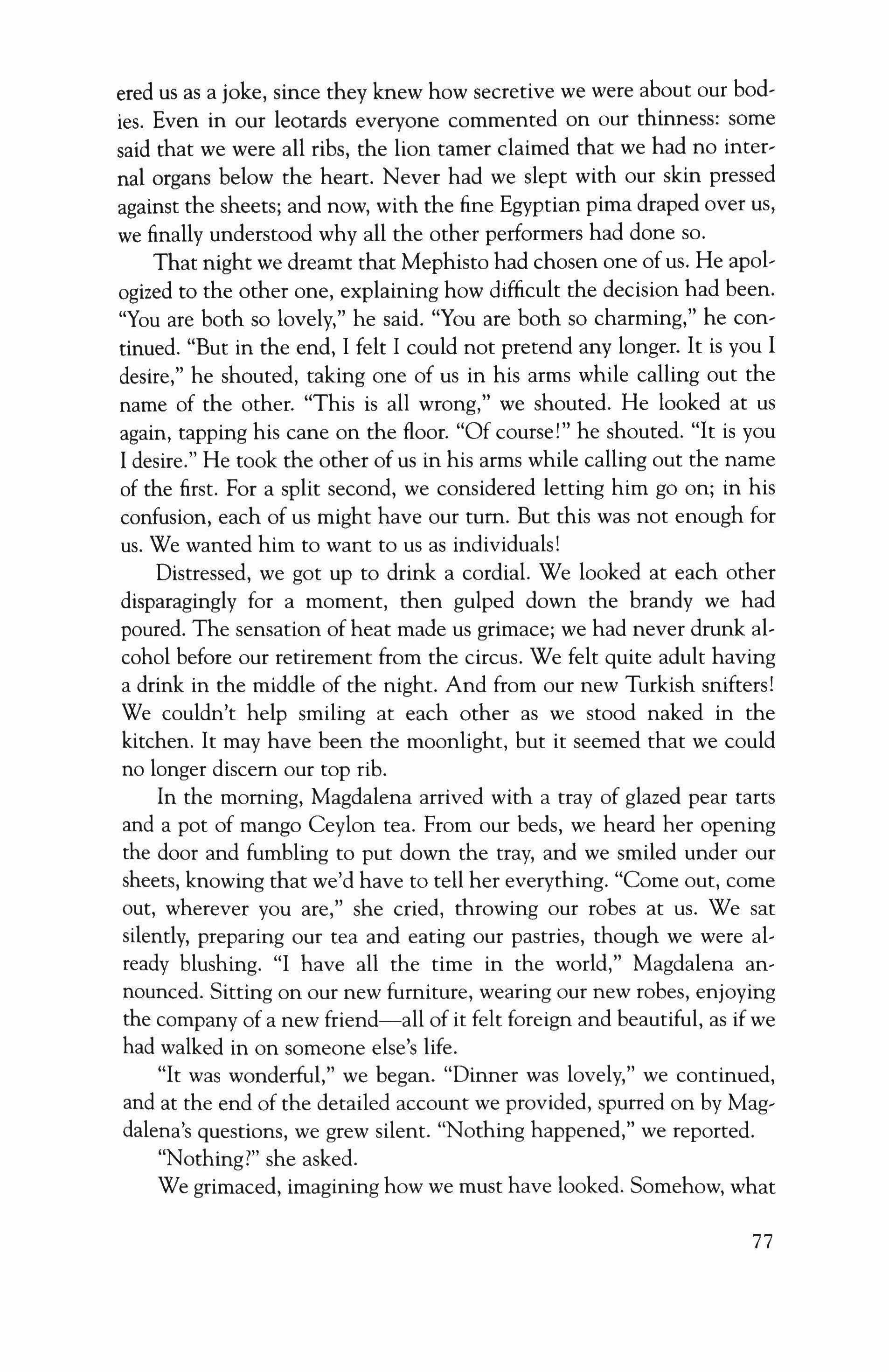
ered us as a joke, since they knew how secretive we were about our bod, ies. Even in our leotards everyone commented on our thinness: some said that we were all ribs, the lion tamer claimed that we had no inter' nal organs below the heart. Never had we slept with our skin pressed against the sheets; and now, with the fine Egyptian pima draped over us, we finally understood why all the other performers had done so.
That night we dreamt that Mephisto had chosen one of us. He apologized to the other one, explaining how difficult the decision had been. "You are both so lovely," he said. "You are both so charming," he con' tinued. "But in the end, I felt I could not pretend any longer. It is you I desire," he shouted, taking one of us in his arms while calling out the name of the other. "This is all wrong," we shouted. He looked at us again, tapping his cane on the floor. "Of course!" he shouted. "It is you I desire." He took the other of us in his arms while calling out the name of the first. For a split second, we considered letting him go on; in his confusion, each of us might have our tum. But this was not enough for us. We wanted him to want to us as individuals!
Distressed, we got up to drink a cordial. We looked at each other disparagingly for a moment, then gulped down the brandy we had poured. The sensation of heat made us grimace; we had never drunk alcohol before our retirement from the circus. We felt quite adult having a drink in the middle of the night. And from our new Turkish snifters! We couldn't help smiling at each other as we stood naked in the kitchen. It may have been the moonlight, but it seemed that we could no longer discern our top rib.
In the morning, Magdalena arrived with a tray of glazed pear tarts and a pot of mango Ceylon tea. From our beds, we heard her opening the door and fumbling to put down the tray, and we smiled under our sheets, knowing that we'd have to tell her everything. "Come out, come out, wherever you are," she cried, throwing our robes at us. We sat silently, preparing our tea and eating our pastries, though we were already blushing. "I have all the time in the world," Magdalena an, nounced. Sitting on our new furniture, wearing our new robes, enjoying the company of a new friend-all of it felt foreign and beautiful, as if we had walked in on someone else's life.
"It was wonderful," we began. "Dinner was lovely," we continued, and at the end of the detailed account we provided, spurred on by Mag' dalena's questions, we grew silent. "Nothing happened," we reported. "Nothing?" she asked.
We grimaced, imagining how we must have looked. Somehow, what
77

we had experienced with Mephisto now seemed crazy. "Something," we admitted, our faces hot with color.
"Did he touch you?"
"Not really."
"But you felt pleasure?"
We nodded.
"That is the way with us too," she cried. She put down her cup and sprang to her feet. "What is that man thinking?" she whispered. "How does he do it?" she continued. "What kind of power can he have over us? What does he get out of it? Why can't he just get on with things?" We bit our lip at her suggestion, already feeling that tingle as we imagined the act.
A few days later, Magdalena went to visit an old friend from her circus days, an illustrated man. "He's got tattoos everywhere," she told us as we waved goodbye. Gilberto insisted we have an outing of our own. As we were leaving for our picnic, Mephisto came up behind us. "Good morning," he announced, catching us off guard. We tried not to seem excited and clenched our teeth so we wouldn't smile. Gilberto took us through the dense forest behind our property to a steep cliff. We worked our way down through a rocky waterfall until we reached the seashore. We barely ate any of Gilberte's famous spaghetti pisano; we were too nervous in Mephisto's presence. When Mephisto spoke, we listened intently, smiling at his witticisms and giggling too energetically. "This is where Magdalena and I came on the day that you girls visited," he admitted, popping the cork of a wine bottle. Why was he telling us this? we wondered.
"And where I came alone when Magdalena visited," Gilberte complained.
"It seems that you and Magdalena are always conspiring to be alone," we teased, trying to seem relaxed.
He answered us quite seriously: "The snake charmer and the snake go hand in hand, but the charmer never forgets the venom of the snake, and the snake never forgets the beauty of the charmer."
"And the bald man should wear a hat," Gilberto exclaimed, slapping Mephisto on the back. "I think, he is getting crazy with the books," Gilberto whispered, even though Mephisto could hear him perfectly well.
Every time we tried to get Mephisto's attention, he seemed engrossed in some important endeavor. When we got into our bathing suits and asked if he would join us for a swim, he declined, having just begun a breathing cycle. He could not help us with our sandcastle construction because he was reading the Upanishads. As the sun began its descent, we shivered, the downy hairs on our arms and bellies stood alert, and our
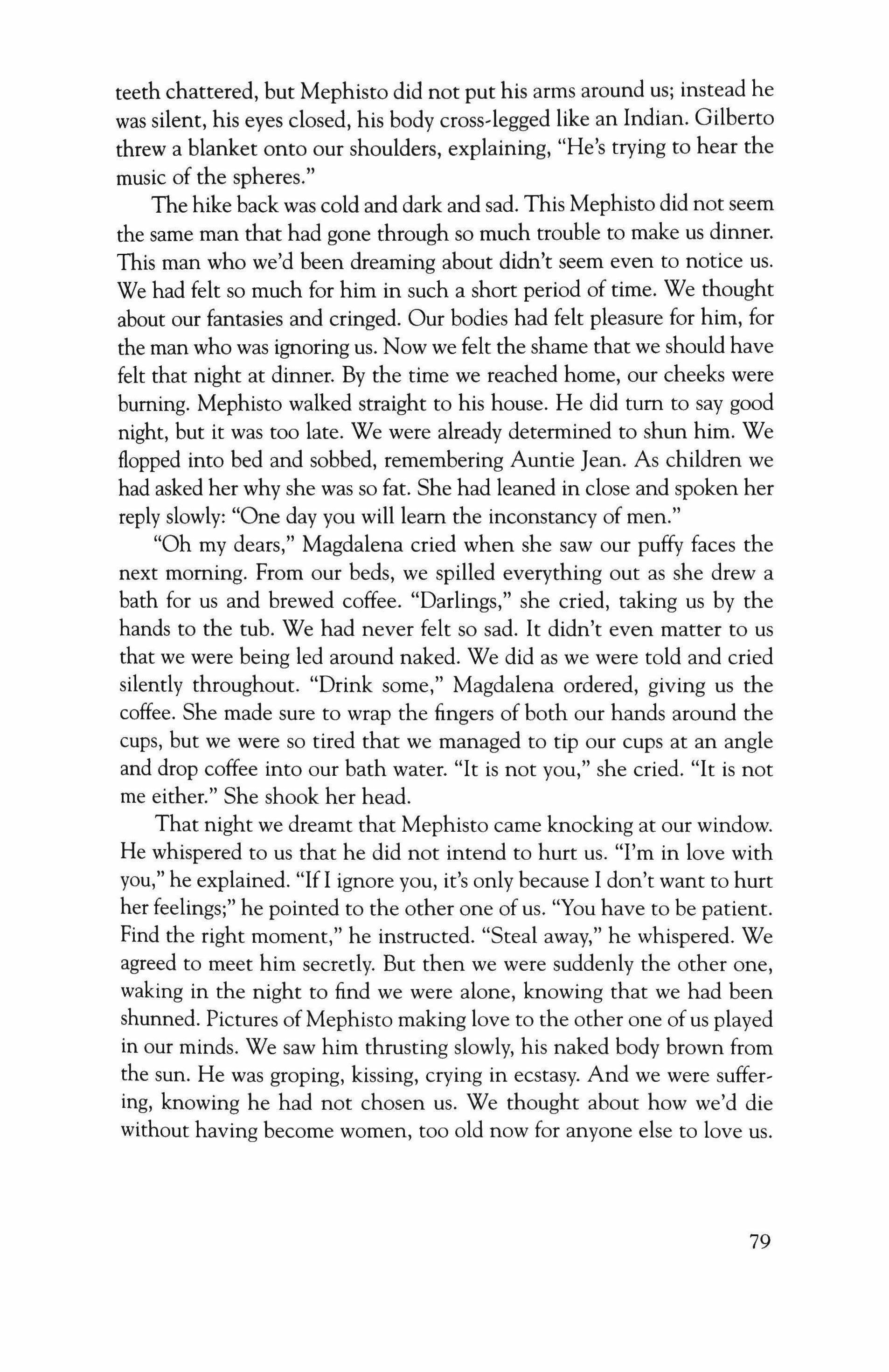
teeth chattered, but Mephisto did not put his arms around us; instead he was silent, his eyes closed, his body cross-legged like an Indian. Gilberto threw a blanket onto our shoulders, explaining, "He's trying to hear the music of the spheres."
The hike back was cold and dark and sad. This Mephisto did not seem the same man that had gone through so much trouble to make us dinner. This man who we'd been dreaming about didn't seem even to notice us. We had felt so much for him in such a short period of time. We thought about our fantasies and cringed. Our bodies had felt pleasure for him, for the man who was ignoring us. Now we felt the shame that we should have felt that night at dinner. By the time we reached home, our cheeks were burning. Mephisto walked straight to his house. He did tum to say good night, but it was too late. We were already determined to shun him. We flopped into bed and sobbed, remembering Auntie Jean. As children we had asked her why she was so fat. She had leaned in close and spoken her reply slowly: "One day you will learn the inconstancy of men."
"Oh my dears," Magdalena cried when she saw our puffy faces the next morning. From our beds, we spilled everything out as she drew a bath for us and brewed coffee. "Darlings," she cried, taking us by the hands to the tub. We had never felt so sad. It didn't even matter to us that we were being led around naked. We did as we were told and cried silently throughout. "Drink some," Magdalena ordered, giving us the coffee. She made sure to wrap the fingers of both our hands around the cups, but we were so tired that we managed to tip our cups at an angle and drop coffee into our bath water. "It is not you," she cried. "It is not me either." She shook her head.
That night we dreamt that Mephisto came knocking at our window. He whispered to us that he did not intend to hurt us. "I'm in love with you," he explained. "If I ignore you, it's only because I don't want to hurt her feelings;" he pointed to the other one of us. "You have to be patient. Find the right moment," he instructed. "Steal away," he whispered. We agreed to meet him secretly. But then we were suddenly the other one, waking in the night to find we were alone, knowing that we had been shunned. Pictures of Mephisto making love to the other one of us played in our minds. We saw him thrusting slowly, his naked body brown from the sun. He was groping, kissing, crying in ecstasy. And we were suffering, knowing he had not chosen us. We thought about how we'd die without having become women, too old now for anyone else to love us.
79
Steven Schwartz

His picture would appear in the paper, scrutinized for any sign of dementia. People would read between the lines for hints of indiscretion or scandal in his background as to what had motivated him. They'd find nothing. No illicit love affairs resulting in blackmail, no crushing gambling debts to do himself in over, no terminal illness that he couldn't bear. Not a thing would be amiss.
He hadn't even planned on doing this. Oh, that was untrue. He had, he had. But not in front of the students. He was sorry; it wasn't like him really. He'd snidely told Kelsey Dunn to "shut her pie hole" in a moment of frustration at her interrupting his concentration, and sorry, too, that he'd alarmed anyone by warning Matthew Morgan to remain in his seat, afraid the boy would stop him, unable to face the humiliation of remaining alive as "that teacher who'd held the gun to his head."
He'd initially planned to carry out the task after school (though would have liked to consider it more a deed than a task, imbuing the act around its edges with a corona ofhistorical significance). Drive to the lake or to an isolated and wooded area in the foothills. But he knew that would entail a search for a missing person, and although he had been missing from himself for some time, he didn't wish to be officially designated as such and cause Margaret the extra hardship of agonizing about his whereabouts before his body was found. Best to get it over in a conspicuous place, and what could be more conspicuous than in front of his class?
Indie 10
80

Too conspicuous, in fact. He'd been staring blankly at his students' quizzes when he reached down and felt the outline of the gun in his briefcase, the .44 caliber Colt black powder revolver. One hundred fifty thousand of the sidearms had been manufactured during the Civil War. Their durability and better firepower-the South had preferred the .36 caliber Navy model-had helped the Union to prevail. Or so he liked to suggest to his students in the reenactment club. He had hoped using such a weapon would lend his action a hint of noble sacrifice, but of course that was folly. He was not, and never had been, a soldier; he'd bonded with an army of men long dead, wearing their blue uniforms and firing their muskets. He read their words in ancient diaries, imagining their battles from Shiloh to Sharpsburg; he collected their regalia and mementos of battle, and remained as ripped apart in himself as the war had rendered the nation.
It would be humiliating for Margaret. Her husband of thirty years a "dedicated high school teacher" who "had snapped" after "holding his class hostage" in a "bizarre incident." He could write the story himself: "a terrifying ordeal for the students," "a frightening experience for the parents," "a complete shock to his family." Honestly, he'd wanted the opposite: privacy, oblivion, indifference; he'd wished to slip away with, out a splash, just like an old caiman. Or that wonderful last shot in On the Beach-the submarine, the last human habitat left in a nuclear toxic world, descending without a wake into the sea.
But he'd made a spectacle ofhimself now, fucked up again, as he was coming to think of his existence in these latter years, though there was no evident signs of such failures, just the twisting pain he lived with all the time, the miserable discharge of dread and disappointment into his guts, as if from an unsalvageable rusting ship (he could not stop think, ing about the oceans-those immense bodies of water that both swallowed one up and promised rebirth).
He had the little pink pills the doctor told him would help, and he had the schedule of exercise classes Margaret had highlighted for him, and he had the cell phone number of a "good man of faith" who wanted to aid, and he had his rightful mind, lest anyone excuse his behavior as that of a madman, and he had his family, of course. Yes, the family, their love, the children and grandchildren, and, if he could only bear staying alive, the great grandchildren too. All the years of watching their blossoming, bountiful lives he'd had it all.
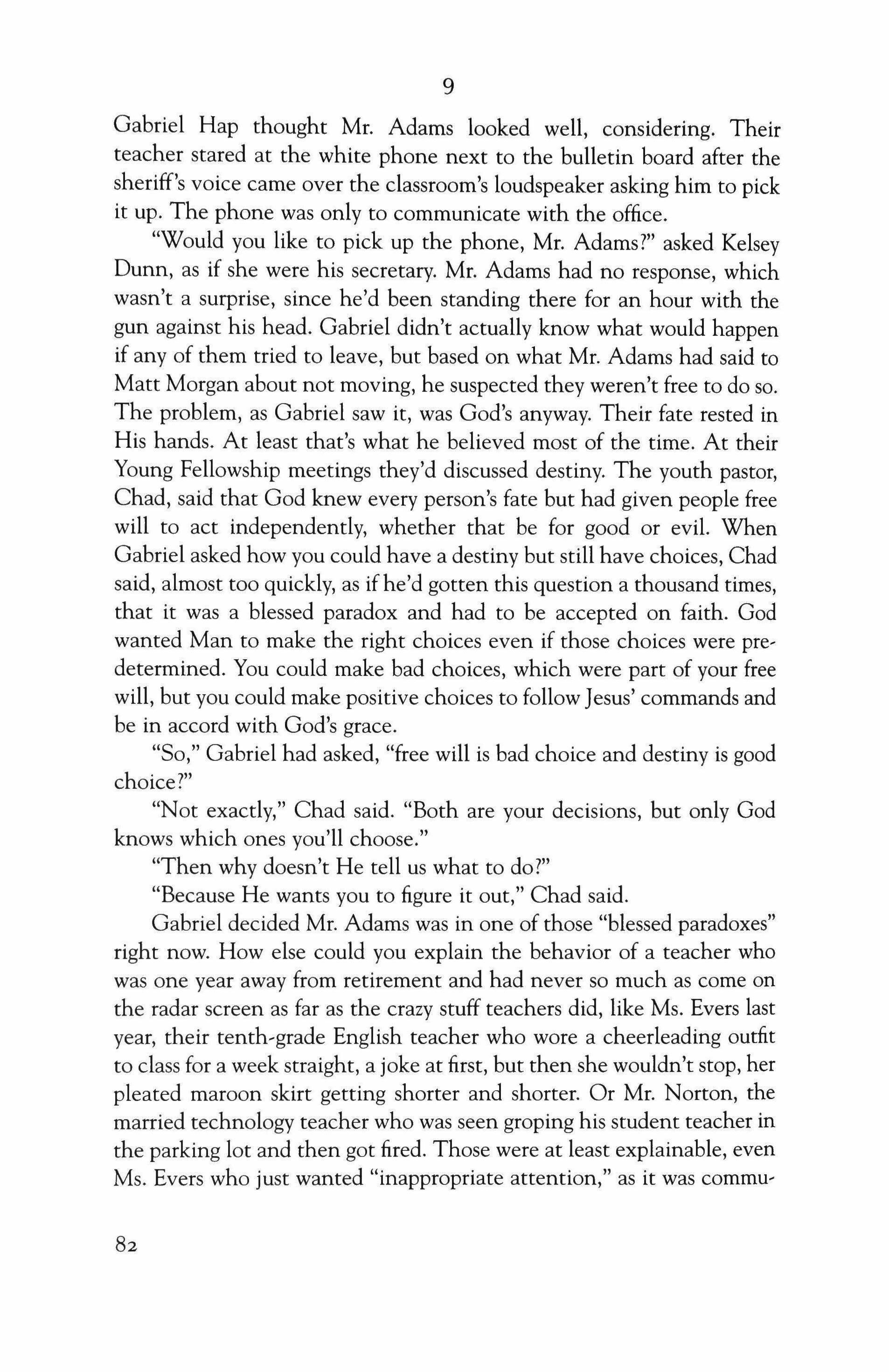
Gabriel Hap thought Mr. Adams looked well, considering. Their teacher stared at the white phone next to the bulletin board after the sheriff's voice came over the classroom's loudspeaker asking him to pick it up. The phone was only to communicate with the office.
"Would you like to pick up the phone, Mr. Adams?" asked Kelsey Dunn, as if she were his secretary. Mr. Adams had no response, which wasn't a surprise, since he'd been standing there for an hour with the gun against his head. Gabriel didn't actually know what would happen if any of them tried to leave, but based on what Mr. Adams had said to Matt Morgan about not moving, he suspected they weren't free to do so. The problem, as Gabriel saw it, was God's anyway. Their fate rested in His hands. At least that's what he believed most of the time. At their Young Fellowship meetings they'd discussed destiny. The youth pastor, Chad, said that God knew every person's fate but had given people free will to act independently, whether that be for good or evil. When Gabriel asked how you could have a destiny but still have choices, Chad said, almost too quickly, as ifhe'd gotten this question a thousand times, that it was a blessed paradox and had to be accepted on faith. God wanted Man to make the right choices even if those choices were pre, determined. You could make bad choices, which were part of your free will, but you could make positive choices to follow Jesus' commands and be in accord with God's grace.
"So," Gabriel had asked, "free will is bad choice and destiny is good choice?"
"Not exactly," Chad said. "Both are your decisions, but only God knows which ones you'll choose."
"Then why doesn't He tell us what to do?"
"Because He wants you to figure it out," Chad said.
Gabriel decided Mr. Adams was in one of those "blessed paradoxes" right now. How else could you explain the behavior of a teacher who was one year away from retirement and had never so much as come on the radar screen as far as the crazy stuff teachers did, like Ms. Evers last year, their tenth,grade English teacher who wore a cheerleading outfit to class for a week straight, a joke at first, but then she wouldn't stop, her pleated maroon skirt getting shorter and shorter. Or Mr. Norton, the married technology teacher who was seen groping his student teacher in the parking lot and then got fired. Those were at least explainable, even Ms. Evers who just wanted "inappropriate attention," as it was cornmu-
9
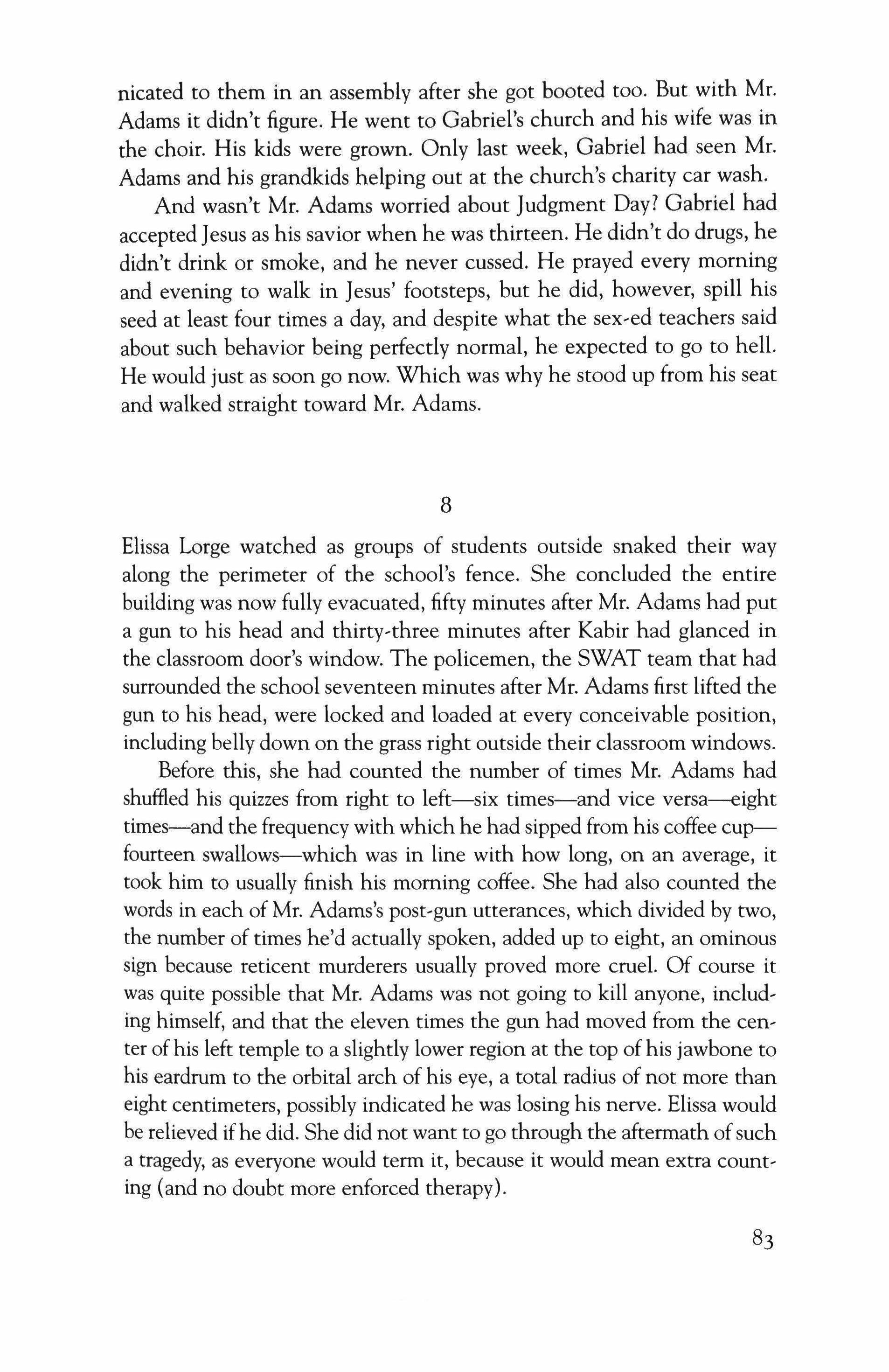
nicated to them in an assembly after she got booted too. But with Mr. Adams it didn't figure. He went to Gabriel's church and his wife was in the choir. His kids were grown. Only last week, Gabriel had seen Mr. Adams and his grandkids helping out at the church's charity car wash. And wasn't Mr. Adams worried about Judgment Day? Gabriel had acceptedJesus as his savior when he was thirteen. He didn't do drugs, he didn't drink or smoke, and he never cussed. He prayed every morning and evening to walk in Jesus' footsteps, but he did, however, spill his seed at least four times a day, and despite what the sex-ed teachers said about such behavior being perfectly normal, he expected to go to hell. He would just as soon go now. Which was why he stood up from his seat and walked straight toward Mr. Adams. 8
Elissa Lorge watched as groups of students outside snaked their way along the perimeter of the school's fence. She concluded the entire building was now fully evacuated, fifty minutes after Mr. Adams had put a gun to his head and thirty,three minutes after Kabir had glanced in the classroom door's window. The policemen, the SWAT team that had surrounded the school seventeen minutes after Mr. Adams first lifted the gun to his head, were locked and loaded at every conceivable position, including belly down on the grass right outside their classroom windows. Before this, she had counted the number of times Mr. Adams had shuffled his quizzes from right to left-six times-and vice versa--eight times-and the frequency with which he had sipped from his coffee cup--fourteen swallows-which was in line with how long, on an average, it took him to usually finish his morning coffee. She had also counted the words in each of Mr. Adams's post-gun utterances, which divided by two, the number of times he'd actually spoken, added up to eight, an ominous sign because reticent murderers usually proved more cruel. Of course it was quite possible that Mr. Adams was not going to kill anyone, including himself, and that the eleven times the gun had moved from the center ofhis left temple to a slightly lower region at the top ofhis jawbone to his eardrum to the orbital arch of his eye, a total radius of not more than eight centimeters, possibly indicated he was losing his nerve. Elissa would be relieved ifhe did. She did not want to go through the aftermath ofsuch a tragedy, as everyone would term it, because it would mean extra count, ing (and no doubt more enforced therapy).

Not counting at all meant, of course, she'd have to go to her room, close her blinds, lie on her bed, stare up at the ceiling, cross her arms, and watch those same old boring reruns of her stepfather putting a knife to her mother's throat and telling the bitch, as he had put it, that he was going to cut her fucking head off. While Elissa screamed in the comer. Ho. Hum. "Mr. Adams," came a voice over the school's intercom, "this is Jack Cunningham with the Severton County Sheriff's Department. Can you please pick up the classroom phone?" 7
What Roland Fineman was thinking about, besides the fact that his father had quit his job as an accountant in midtown Manhattan and moved everyone to this small Colorado town on the Front Range because he believed it was paradise, was finality. What did it really matter that Mr. Adams had a gun pointed at his head? Hadn't Nietzsche written "Men are even lazier than they are timorous, and what they fear most is the troubles with which an unconditional honesty and nudity would burden them?" \X1hat could be more unconditionally honest than standing in front of your AP history class and putting a gun to your head? And talk about 'nudity,' as in baring your soul-here it was in the flesh, but did anybody in this class ofhicks, jocks, phats, spooners, and huggers really appreciate Mr. Adams' guts? He doubted it. Kelsey Dunn was apoplectic with concern, no doubt dying to get in there and do some "peer counseling," if only Mr. Adams hadn't told her a few minutes ago to shut her pie hole, a retort Roland found positively and insanely lovely. He wondered for a brief moment whether he should stand up there in solidarity next to the man. He could quote Nietzsche: My death I praise to you, the free death which comes to me because I want it. Boom!-the gun would go off.
Was that relic even loaded?
"No can do, Mr. A," Dan Brock said. "We can't just can't tum our seats and let you shoot yourself-or us."
"Why not?" Roland put in.
"Excuse me?" Brock said. The last time Roland had talked to Dan Brock was when he left his copy of The Power of One at home and asked Brock if he could share his. "You can have it," Brock had said. "I'm not going to read it anyway." The only other exchange had been Brock asking Roland why he used so many big words.
"Ifhe wants to shoot himself, that's his choice," Roland said. He saw
that Mr. Adams had lowered his gun a bit, as if from the strain of hold, ing it in place.
"What the hell are you talking about?" Dan Brock asked.
Brock mostly sat in the back of class with his aviator sunglasses on, when he wasn't sleeping. Roland was fairly terrified of him. He'd already sent a couple ofkids to the hospital while playingfootball, a sport Roland despised but couldn't help appreciate for its unbridled destruction.
'Nihilism stands at the door.' Wouldn't you agree, Mr. Adams? From 'whence comes this uncanniest of all guests'?" Roland saw Mr. Adams' eyes flicker-was that in recognition of the tele-metaphilosopho level they were communicating on?
"Why don't you shut your trap?" Matthew Morgan told Roland, and then to Mr. Adams, "Were our quizzes that bad?"
"You idiot!" Roland burst out, unable to control himself. "This is nothing to do with us. It's it's about the Overman. Right, Mr. Adams?"
"You're not helping," Dan Brock said, through clenched teeth.
"I'm not trying to help, you jerk," Roland said. "I'm accepting."
"Be quiet! Shut up, all of you! He's standing there with a gun at his head, I'm fucking pregnant, and you're all mouthing bullshit!"
"Ariana?" Oliver said.
"Yes, your goddamn selfish bastard of a brother is the father!"

Dan Brock was just coming out of a dream when he got nudged by the team's center, Matt Morgan. In the dream, he'd been sitting in front of two college coaches, one from Texas A&M and the other from UT Austin. He found it kind of strange that they were both interviewing him at the same time in a Texas hotel room, but everything else was real, just like it had been for his brother Kyle who played quarterback for UT until he got in the car accident that left him a vegetable. He wasn't sup' posed to refer to Kyle as a vegetable, or even think it, and never, never say, "Hey man, you're a vegetable, did ya know?" His parents must have thought he was stupid or something. He'd never say that to Kyle. Sure, he thought it, but you couldn't help that. The guy had a feeding tube and round the clock nursing care and his mobility pretty much consisted of jerking his head involuntarily. Sometimes, Dan stared at him and tried to see the person who'd broke the state high school record for pass' ing yards, the star who'd gotten a full scholarship to Austin, the brother
6
85
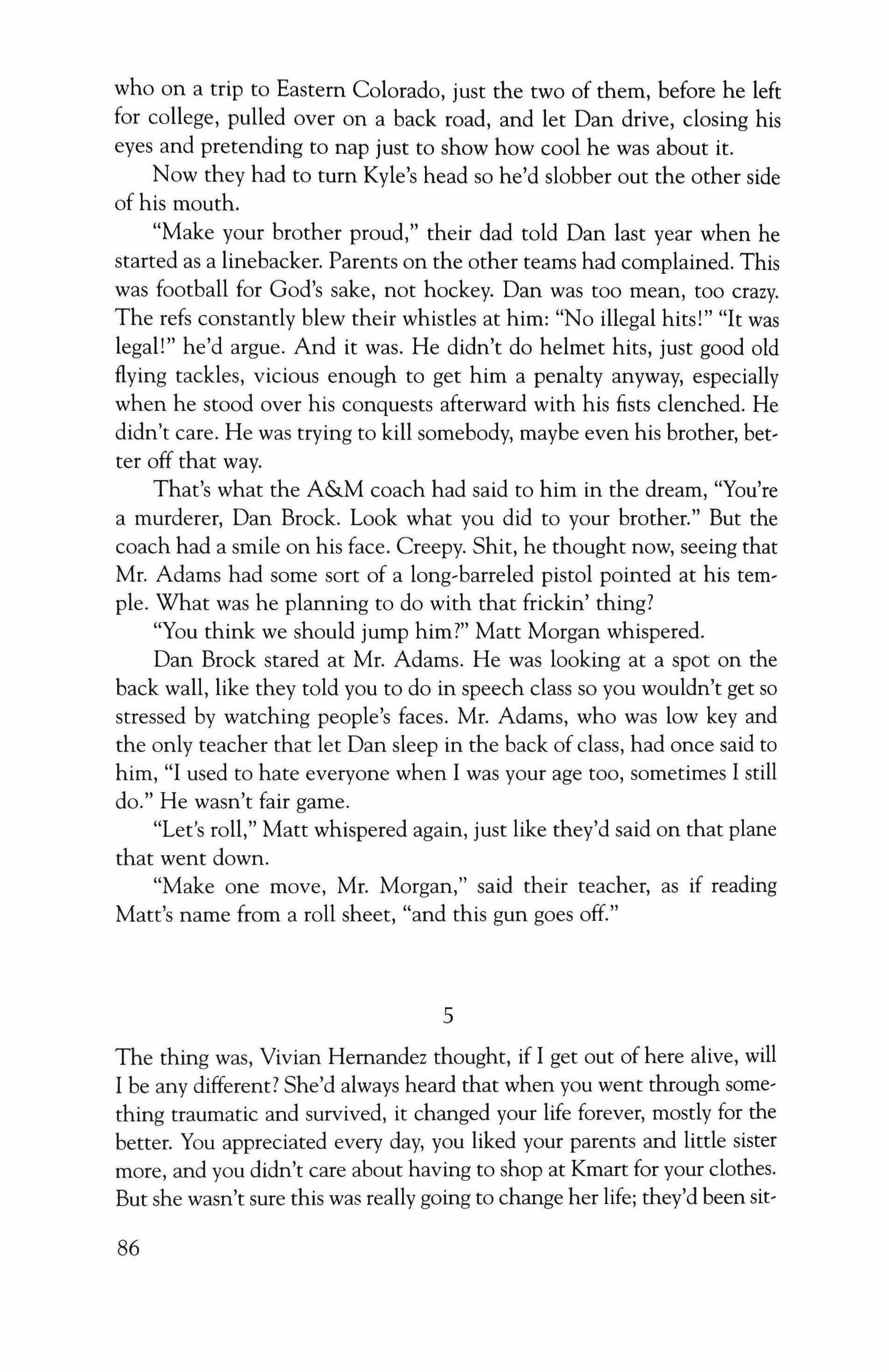
who on a trip to Eastern Colorado, just the two of them, before he left for college, pulled over on a back road, and let Dan drive, closing his eyes and pretending to nap just to show how cool he was about it.
Now they had to turn Kyle's head so he'd slobber out the other side of his mouth.
"Make your brother proud," their dad told Dan last year when he started as a linebacker. Parents on the other teams had complained. This was football for God's sake, not hockey. Dan was too mean, too crazy. The refs constantly blew their whistles at him: "No illegal hits!" "It was legal!" he'd argue. And it was. He didn't do helmet hits, just good old flying tackles, vicious enough to get him a penalty anyway, especially when he stood over his conquests afterward with his fists clenched. He didn't care. He was trying to kill somebody, maybe even his brother, better off that way.
That's what the A&M coach had said to him in the dream, "You're a murderer, Dan Brock. Look what you did to your brother." But the coach had a smile on his face. Creepy. Shit, he thought now, seeing that Mr. Adams had some sort of a long-barreled pistol pointed at his temple. What was he planning to do with that frickin' thing?
"You think we should jump him?" Matt Morgan whispered.
Dan Brock stared at Mr. Adams. He was looking at a spot on the back wall, like they told you to do in speech class so you wouldn't get so stressed by watching people's faces. Mr. Adams, who was low key and the only teacher that let Dan sleep in the back of class, had once said to him, "I used to hate everyone when I was your age too, sometimes I still do." He wasn't fair game.
"Let's roll," Matt whispered again, just like they'd said on that plane that went down.
"Make one move, Mr. Morgan," said their teacher, as if reading Matt's name from a roll sheet, "and this gun goes off." 5
The thing was, Vivian Hernandez thought, if I get out of here alive, will I be any different? She'd always heard that when you went through something traumatic and survived, it changed your life forever, mostly for the better. You appreciated every day, you liked your parents and little sister more, and you didn't care about having to shop at Kmart for your clothes. But she wasn't sure this was really going to change her life; they'd been sit-
86
ting here for twenty minutes, nobody was getting up to leave or trying to talk to Mr. Adams, except Kelsey Dunn who had just said, "Mr. Adams, whatever is wrong, we can get help," and Mr. Adams had answered in a fairly bright voice given the circumstances, "Please shut your pie hole, Kelsey," and gone back to standing at attention with the gun at his head. Everybody was text messaging back and forth. She wasn't allowed to have a cell phone. Her parents thought it would distract her from school, and they still believed it meant gangstas on streets looking to deal, where she'd come from in East L.A. That, after all, was why they'd moved to Colorado. They had relatives in Northern Colorado and her dad had found a job working in maintenance out at the Kodak plant. Her mom cleaned homes just as she did back in L.A., but they had a bigger house here, even if the odor from the nearby stockyard made you gag on a hot summer day.
Kabir had looked in the window of the classroom door a while ago and seen what was going on and then disappeared. His eyes had gotten huge. She hoped he'd gone for help. Kabir reminded her of her father, who was always afraid of doing something wrong and getting sent back to Bogota, even though they were citizens now. Americans were suspicious of Colombians, he said, so they had to set a good example here, because of all the drug business. Kabir often had the same look on his face as her father did, worrying for some trouble he didn't even do, a shame he carried with him just for being here. She wanted to tell Kabir to lighten up and not put his face so close to the exam paper, pressing his pencil down as if drilling his answers into the test. But he was too shy to even speak to anyone, and anyway, she was the same.
"Would you all please tum your chairs around with your backs to me," Mr. Adams said.

4
They'd never used loaded weapons for the drills that they did in their Civil War Reenactment Club. Mr. Adams had strict rules about that. In fact, Jerry Worthington had never fired a gun in his life. But he did know that the particular gun Mr. Adams had, a six-shot Colt .44 revolver with a range of nineteen yards, long enough to reach any of them in class, had the power to penetrate seven three-quarter-inch white pine boards, because Mr. Adams had demonstrated that once using the same gun, blowing out their eardrums in the process.
"Mr. Adams?" Kelsey Dunn asked. "Is this a joke?" He didn't answer.
The barrel was flush against his temple. He was rigid. Was he trying to make a point? It didn't really go with their lesson. They were studying World War I, the Treaty of Versailles. True, Mr. Adams wasn't above a prank now and then. He'd once written comments on their papers backwards, some kind of weird skill he had, so they had to look in the mirror to read them. But was this a prank? It didn't look as though he was punking the whole class.
Everyone turned to Jerry. As if he knew. How would he? They just dressed up in these uniforms and slung rifles with bayonets over their shoulders and marched around and learned about battles. What's going on, Kelsey Dunn whispered to him. I don't have a clue, he whispered back.

3
Ariana was looking over the chart of Indie royalty that Oliver had passed her in history class. Oliver had put her at the bottom, somewhere below Shannon Grayson who had bought all of the band Bitzie's demo tapes off eBay last summer, evidently giving her a secure place in the hierarchy. She noticed Oliver had made himself a bishop. Ariana, meanwhile, was some kind of lowly handmaiden. At the top were Hallie and Ishmael, the king and queen, even though they'd graduated last year. Hallie was in art school back East. Ishmael was still in Colorado working as a busboy at a Mexican restaurant. Ariana wasn't sure how you could be a busboy and still be king of the Indies. At least Hallie had something to show for herself. She was a great painter. But Ishmael's band hadn't worked out. Oliver evidently disagreed. "If you're really Indie," he'd told her, "you understand that it's all about attitude, not what you accomplish." Success, in the conventional sense, was just such bullshit, he said.
"So why do this stupid chart?" she'd asked him.
"Just for fun," Oliver had told her, with his simpering little smile. Oliver wore small green frame glasses and tight Capri jeans-he was above the gender thing, he said-but the jeans made him like Anorexic of the Week. Oliver was also Patrick's younger brother who was Ishmael's best friend and the bass player in their now defunct band, The Turnkeys, and Patrick and Ariana had dated for a while, until it was clear Ariana didn't know enough about Indie bands and obscure poets. Like she cared. The chart was stupid anyway. Indie royalty. What a laugh. Oliver was a little wannabe power grubbie. A snot, too.
88
He'd told her yesterday when they went shopping together at the thrift store that he didn't like the term Indie anymore. Hipster was the better word. Not the old beatnik dudes with their silly berets and bongos or the hippies reeking of sandalwood incense, but the new kind of cool hipsters who could do fashion at the lowest possible cost, like the black suede boots he'd gotten at the Back to the Rack clothing store down in Denver and the velvet jacket with blue satin lapels and its nipped in waist.
"Ugh," he'd told Ariana, when she tried on a flannel shirt at the local thrift store-she'd stupidly agreed to go shopping with him. "That's so Nirvana and Pearl Jam." She took it off. Why did she let this twerp control her? He'd told her Mothman, a band she loved, was no longer acceptable as Indie because they'd appeared on MTV. "Kiss of death," Oliver informed her.
"You're just incredible," said Ariana.
"Thank you," Oliver said, taking it as a compliment. Ariana had rifled through the bins of T'shirts two sizes too big, since she was four months pregnant with Patrick's baby and that was the only reason she was hanging out with Oliver, hoping to enlist his help in breaking the news to his brother, once she got up the guts to tell either of them. Patrick had come up from Boulder his first week after freshman orientation at college and called her. She'd thought they'd broken up but allowed herself be flattered into screwing him at her parents' empty house for the weekend. She hadn't heard from him since, and she kept thinking she should do something decisive, but she couldn't get past staring at the number for Planned Parenthood in the phone book. Her parents-her father was a retired Air Force colonel-would simply kill her.
"Oh, my God," Denise Alexander said, who sat next to Ariana. They were waiting for Mr. Adams to stop shuffling the quizzes, which he'd been doing forever. Mr. Adams had finally stopped, but he had a Civil War pistol pointed at his head.

2
It had happened again. Kabir felt the warmth spread across his groin and into his underwear. Kelsey Dunn in her white shorts, with the flaps ofher back pockets snugly buttoned, had simply walked up to Mr. Adams' desk after collecting all their quizzes. The light from the tall classroom windows had revealed the outline of her panties. It was the same as two

nights ago when he'd been watching a program on the History Channel-his parents restricted his TV watching-and a "flapper"-part of American culture from the 1920s-was dancing and swinging her beads, her loose breasts jiggling. That was enough to do it, his first ejaculation. While watching the History Channel! His mother would be mortified. His father would find it amusing perhaps and say that at least it had been an educational experience. But how could he tell either of them? Back in India no one talked about sex, not where his parents were from at least.
He decided Kelsey Dunn was staring at him oddly.
He raised his hand for permission to go to the bathroom, but Mr. Adams was busy moving around the quizzes that Kelsey had just brought him. He didn't even look at Kabir when he left the room.
Stripping off his jeans in a bathroom stall, he tried-unsuccessfullyto wipe away the sticky fluid that only spread like glue. He thought about throwing the underpants away, but the trashcan was empty and it didn't have a lid. The last thing he wanted to do was stuff them in his pocket, so he flushed them down the toilet and watched as the toilet burbled and gulped and then finally sucked them away with a roar.
He thought again about Kelsey Dunn. She was that kind of nice American girl in this small Colorado town an hour north of Denver where his parents had emigrated two years ago. He was only fifteen but had been placed in the eleventh grade because of high test scores and the insistence ofhis father who didn't want him, their only son, to delay getting a head start on college and finding a good job, preferably in engineering or higher mathematics. Kelsey always questioned him in her sweet American voice about India. She had read two novels by Indian writers over the summer and would like to discuss them with him sometime. She had always wanted to go to India the way other kids dreamed of traveling to Europe or tropical islands.
He would nod politely at such pleasantries, not believing for a minute she was seriously interested in him beyond his importance as a cultural symbol. This did not stop him from picturing his mother having tea with Kelsey while they spoke about the wedding arrangements for Kelsey and him, his mother in her sari with a gold necklace and bangles up her arm to protect her from evil. He had little time to dwell on such a fantasy, because returning to his classroom and glancing in the door's window, he saw his teacher Mr. Adams holding a gun to his head. The confused looks on his classmates' faces indicated that this was not an idle demonstration. Several of them noticed him, including Kelsey, whom he thought mouthed Get help. And he recognized, too, the pale-
ness and vacancy on his teacher's face, the same as when his Uncle Bhanu lost his home and business to a flood in Bihar and held a knife to his own throat until Kabir's father talked his younger brother out of killing himself.
He fled to the office, the fate of his new America trailing behind him.
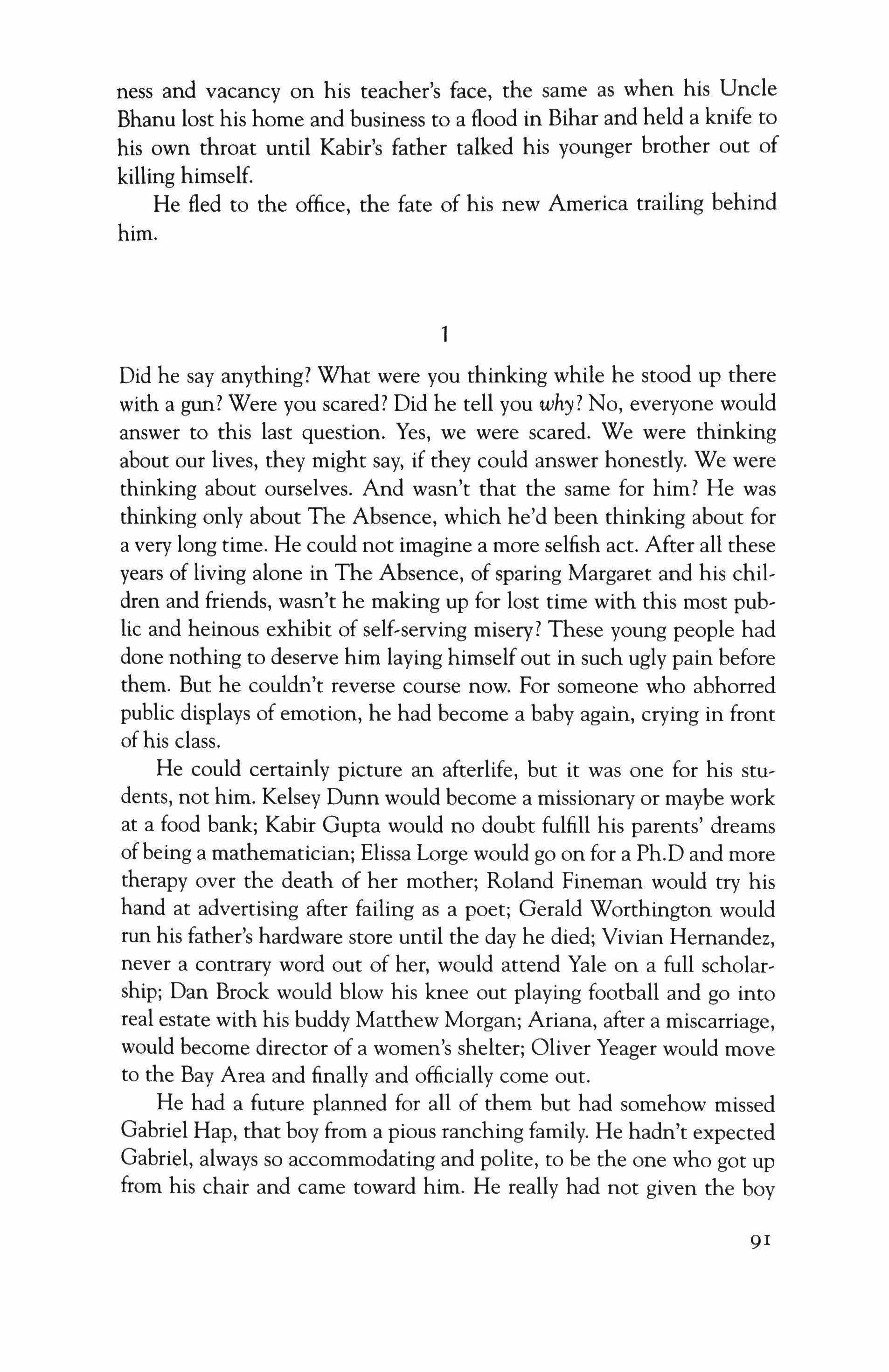
1
Did he say anything? What were you thinking while he stood up there with a gun? Were you scared? Did he tell you why? No, everyone would answer to this last question. Yes, we were scared. We were thinking about our lives, they might say, if they could answer honestly. We were thinking about ourselves. And wasn't that the same for him? He was thinking only about The Absence, which he'd been thinking about for a very long time. He could not imagine a more selfish act. After all these years of living alone in The Absence, of sparing Margaret and his children and friends, wasn't he making up for lost time with this most public and heinous exhibit of self-serving misery? These young people had done nothing to deserve him laying himself out in such ugly pain before them. But he couldn't reverse course now. For someone who abhorred public displays of emotion, he had become a baby again, crying in front of his class.
He could certainly picture an afterlife, but it was one for his students, not him. Kelsey Dunn would become a missionary or maybe work at a food bank; Kabir Gupta would no doubt fulfill his parents' dreams ofbeing a mathematician; Elissa Lorge would go on for a Ph.D and more therapy over the death of her mother; Roland Fineman would try his hand at advertising after failing as a poet; Gerald Worthington would run his father's hardware store until the day he died; Vivian Hernandez, never a contrary word out of her, would attend Yale on a full scholarship; Dan Brock would blow his knee out playing football and go into real estate with his buddy Matthew Morgan; Ariana, after a miscarriage, would become director of a women's shelter; Oliver Yeager would move to the Bay Area and finally and officially come out.
He had a future planned for all of them but had somehow missed Gabriel Hap, that boy from a pious ranching family. He hadn't expected Gabriel, always so accommodating and polite, to be the one who got up from his chair and came toward him. He really had not given the boy
91
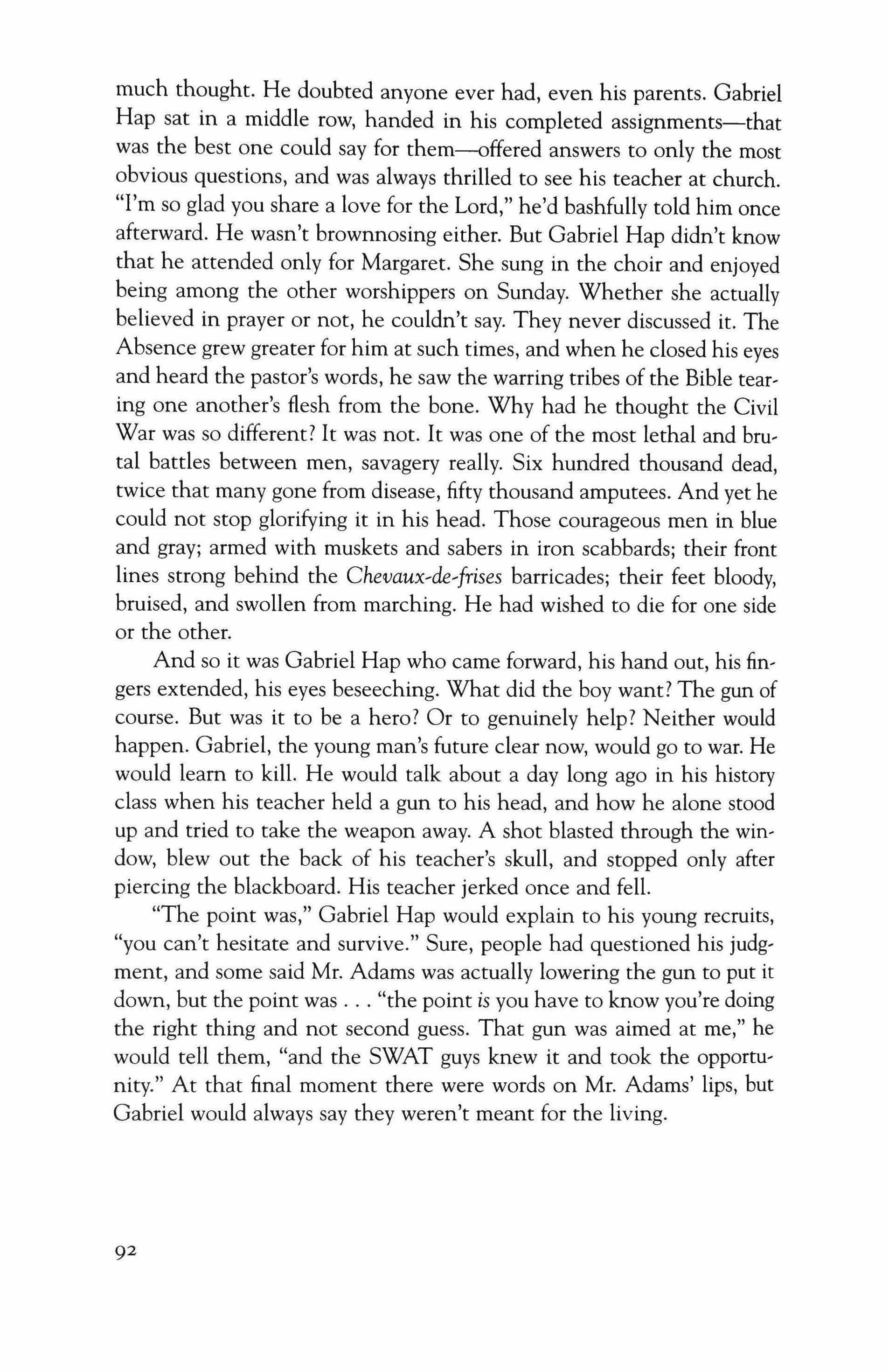
much thought. He doubted anyone ever had, even his parents. Gabriel Hap sat in a middle row, handed in his completed assignments-that was the best one could say for them-offered answers to only the most obvious questions, and was always thrilled to see his teacher at church. "I'm so glad you share a love for the Lord," he'd bashfully told him once afterward. He wasn't brownnosing either. But Gabriel Hap didn't know that he attended only for Margaret. She sung in the choir and enjoyed being among the other worshippers on Sunday. Whether she actually believed in prayer or not, he couldn't say. They never discussed it. The Absence grew greater for him at such times, and when he closed his eyes and heard the pastor's words, he saw the warring tribes of the Bible tearing one another's flesh from the bone. Why had he thought the Civil War was so different? It was not. It was one of the most lethal and brutal battles between men, savagery really. Six hundred thousand dead, twice that many gone from disease, fifty thousand amputees. And yet he could not stop glorifying it in his head. Those courageous men in blue and gray; armed with muskets and sabers in iron scabbards; their front lines strong behind the Cneoaux-de-itises barricades; their feet bloody, bruised, and swollen from marching. He had wished to die for one side or the other.
And so it was Gabriel Hap who came forward, his hand out, his fingers extended, his eyes beseeching. What did the boy want? The gun of course. But was it to be a hero? Or to genuinely help? Neither would happen. Gabriel, the young man's future clear now, would go to war. He would learn to kill. He would talk about a day long ago in his history class when his teacher held a gun to his head, and how he alone stood up and tried to take the weapon away. A shot blasted through the window, blew out the back of his teacher's skull, and stopped only after piercing the blackboard. His teacher jerked once and fell.
"The point was," Gabriel Hap would explain to his young recruits, "you can't hesitate and survive." Sure, people had questioned his judgment, and some said Mr. Adams was actually lowering the gun to put it down, but the point was "the point is you have to know you're doing the right thing and not second guess. That gun was aimed at me," he would tell them, "and the SWAT guys knew it and took the opportunity." At that final moment there were words on Mr. Adams' lips, but Gabriel would always say they weren't meant for the living.
Brendan Mathews

Heroes of the Revolution
"Is nice!" Vitas said. "Is really very nice!"
"She's awful. A monster." Edina kicked an apple out of the narrow path and into the low-slung branches of a tree. The trees were small and spidery, each one a spray of branches erupting from a knobby trunk.
"Monster?" he said. "No! Alicia is sweet girl."
"She asks too many questions," Edina said. "'What did you do last night?' 'What kind of music do you listen to?' 'Where did you get those shoes? Are they Bosnian? Do they make shoes in Bosnia?'''
"You are reporter," he said, his voice sly, teasing. "You are all the time asking questions."
"But why does she need to know these things? Am I the president? A general? A war criminal?" Edina and Vitas had been tromping through the orchard for almost an hour. It was late in the season and the ground was littered with fallen apples, their burnt-orange flesh dissolving at the slightest pressure. "There is no reason," she said. "She just wants to know."
"Is making friends," Vitas said. "You know how is making friends? Ask questions, answer questions, talk about somethings."
Edina shook her head. "She doesn't care. She thinks if she listens to me, then I have to listen when it's her tum to talk."
"Is not so wicked," he said. "Is nice, nice girl."
Edina had a catalog of reasons why Alicia was not, in fact, a nice, nice girl, but before she could cite these for Vitas she squashed an apple with her foot. She was wearing low heels, a long coat, and a black
93

pantsuit; entirely the wrong outfit for apple-picking. Edina blamed Alicia for all of it: for her cold, sore feet; for the mud on the nicest pair of slacks that she brought to the States; for the smell of rotting apples that packed her head like wet wool.
It couldn't have taken her more than half a minute to wipe the applemush off her shoe, but when she looked up, she was alone. She spoke Vitas' name quietly at first, then called out, unable to suppress the edge in her voice. It was only ten meters to the end of the row, but she stumbled on the stiff tufts of yellowed grass and snagged her coat on the spindly branches. Jerking her arm out of the tree's grip, she lost her balance and leaned into the trees on the other side of the path. All around her, branches raked her face and threatened to pull her down. "Vitasl"
She heard him answer from the end of the lane, his voice rising over the tangle of tree limbs and rotten fruit. "Edina! Where you are?"
She was far from home, in the middle of an orchard, in a lane of stunted trees that grew dense as a hedgerow. Edina focused on his voice, not on the way she lurched into the trees on either side of her. Sliding on the wet grass, her hands batting at the branches, she bolted from the path, emerging into the wide, tire-rutted lane that bisected the orchard.
"There you are," he said, his face blooming into a smile. "Come see." He beckoned her with a tilt of his head, but before she drew closer he opened his cupped palms. "Is Jewish apple."
Edina tried to catch her breath. She ran one hand over her head, checking for the silver clip that gathered her hair at the nape of her neck. She felt a fine haze of stiff, unruly grays rising off her scalp, refusing to be patted back in place. A swath of hair hung limply across her forehead.
"Gravenstein," he said, slowly working the syllables. He pointed to a white sign painted with shaky black letters; similar signs marked each row in the orchard: Jonathan, Cortland, English Sweet, Pink Lady. Vitas plucked another apple, its skin mottled red and yellow, and rotated it in his hand.
"You would like?" he said, extending his hand with a flourish. "No," she said, gulping the sodden air. The day was spongy and damp-Midwestern autumn hinting at the early arrival of winter. "No more apples." She was bent over trying to catch her breath, but when she saw Vitas' face-his broad smile warping into puzzlement, even concern-she forced a smile. "Don't you know?" she said. "It's bad luck to pick Jewish apples on the Sabbath."
Vitas laughed his big booming laugh, his head thrown back, the
94

hinge of his jaw springing open. Edina needed to find a word for that kind of laughter in her dictionary: chortle, cackle, guffaw.
"Are afraid you will be striked with lightnings bolt?" he said. "Or pillar of fires?"
"If God could start a nice, warm fire, I might start believing in him." She folded her arms across her chest, one hand clutching the lapels of her coat.
"If God will not save you, then this will." Vitas drew a large flask from inside his coat.
"If there's slivovitz in there I'm going to kiss you on the mouth."
"And where you kiss me if is vodka?"
Vitas was much better at this-this delicate business of sparking interest and feeding it, by breath and movement, until it took on a blazing life of its own. She wanted to tell herself that she was simply out of practice, but she knew that even when she had been young and eager, the perfect thing to say only came to her hours after it was needed, when she was alone in her apartment, scribbling overheated stanzas in her notebook.
Vitas had caught her offguard; in recent years, she only seemed to find herself across the table from the bookish ones-bespectacled, library-pale, with matted hair and only the most casual acquaintance with hygienewondering how much time had to pass before she could say thanks, oh, don't bother, goodnight. Vitas was a different type altogether. A big, bushy-headed blond with eyes like frozen lakes and a nose like a hawk's beak, he looked more like a Viking prince than a Slavic monk. She didn't know if there were Vikings in Lithuania, but she was willing to believe that centuries ago a shaggy berserker with horns on his helmet and an absurd sense of humor had crossed the Baltic, retired from pillaging, and put down roots in Vilnius.
She had spent two months in the same office with Vitas, his laughter echoing in the halls and his head popping into her office to invite her to drinks with the rest of the office on most Fridays-and more than a few Tuesdays and Wednesdays. She had always turned down the offers: she didn't like crowds, she'd said, and she had work to do. The journalism fellowship that had brought her from Bosnia to Chicago-along with Vitas and a half a dozen journalists from China, India, and Africa-was only three months long, and her agenda didn't include much time for socializing, and certainly none for nurturing a crush on one of the other visiting fellows.
She took the flask, cold to the touch, and tilted it back for a quick
95

nip, then again for a stinging throatful of liquor. The mouth of the flask tasted like cigarettes and something hard and sharp. Slate. Or iron.
"God," she said, her voice hoarse, "that does help."
"Is one thing we can thank Russians for," he said. "Maybe is only thing." He raised the flask in salute, said a quick sveikata, and took a drink.
She held out her hand for the flask, and as Vitas' eyes blazed with approval, she riffled through the scanty file of Vitas-related facts and observations she had compiled. He was around her age, perhaps a little older, closing in on forty. He worked for a newspaper in Vilnius and was writing a series of articles on ties between organized crime in Chicago and Lithuania's booming black market. He dressed far better than any reporter she knew: his apple-picking outfit consisted of a buttery suede coat, plush wide-wale corduroys, and Italian-made boots-proof, perhaps, that his interest in black-market goods wasn't purely professional. And now this latest bit of information: he was showing an interest in Edina that she considered far more than collegial.
She wasn't sure what had changed between them, but it had started the moment Vitas had signaled, with a furtive wave, to tum into a lane marked "Golden Delicious." Maybe it was because he was handsome, although Edina wanted to believe that it took more than that. Maybe it was because he didn't ask much of her, just joked and made small observations, and that was enough to make an afternoon in the orchard bearable. Or maybe it was because she was far from home and couldn't resist the urge, like so many others who had come to this country, to shake loose from her past, if only for a few hours.
Edina was getting ahead ofherself. He was only being friendly; Vitas was nothing if not friendly. And it was nice, after all, just wandering together in the orchard, even if her ears stung from the cold and her toes felt stiffand frail as matchsticks. Vitas' flask kept the cloying scent at bay and was probably the source of those thoughts about how warm it must be where his arm met his shoulder. She could close her eyes and allow herself to lean into that spot; it was that easy. Except she wasn't sure what he would do next, and was even less sure of what she would do.
"Yoo-hool Yoo-hool" Edina and Vitas stopped in a row of Granny Smiths, listening to the looping, birdlike call. They exchanged a brief look before Edina lowered her eyes and sighed.
"She hasn't seen us yet," Edina said. "We still have time to escape."
"Is too late," he said, pointing up the lane. "She sees us."
�
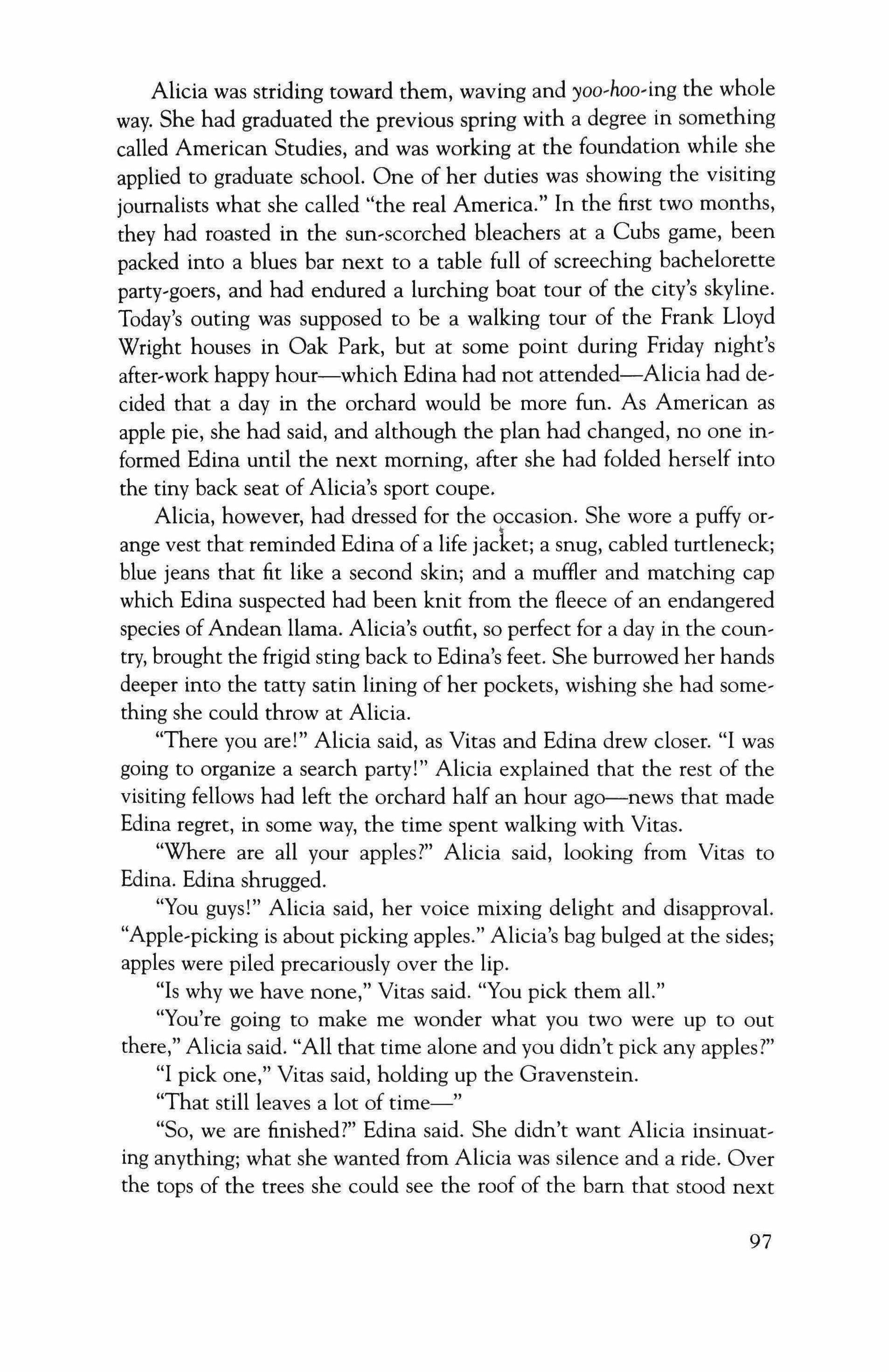
Alicia was striding toward them, waving and yoo-hoo-Ing the whole way. She had graduated the previous spring with a degree in something called American Studies, and was working at the foundation while she applied to graduate school. One of her duties was showing the visiting journalists what she called "the real America." In the first two months, they had roasted in the sun-scorched bleachers at a Cubs game, been packed into a blues bar next to a table full of screeching bachelorette party-goers, and had endured a lurching boat tour of the city's skyline. Today's outing was supposed to be a walking tour of the Frank Lloyd Wright houses in Oak Park, but at some point during Friday night's after-work happy hour-which Edina had not attended-Alicia had de' cided that a day in the orchard would be more fun. As American as apple pie, she had said, and although the plan had changed, no one in, formed Edina until the next morning, after she had folded herself into the tiny back seat of Alicia's sport coupe.
Alicia, however, had dressed for the occasion. She wore a puffy or' ange vest that reminded Edina of a life jacket; a snug, cabled turtleneck; blue jeans that fit like a second skin; and a muffler and matching cap which Edina suspected had been knit from the fleece of an endangered species of Andean llama. Alicia's outfit, so perfect for a day in the country, brought the frigid sting back to Edina's feet. She burrowed her hands deeper into the tatty satin lining of her pockets, wishing she had some' thing she could throw at Alicia.
"There you are!" Alicia said, as Vitas and Edina drew closer. "I was going to organize a search party!" Alicia explained that the rest of the visiting fellows had left the orchard half an hour ago-news that made Edina regret, in some way, the time spent walking with Vitas.
"Where are all your apples?" Alicia said, looking from Vitas to Edina. Edina shrugged.
"You guys!" Alicia said, her voice mixing delight and disapproval. "Apple-picking is about picking apples." Alicia's bag bulged at the sides; apples were piled precariously over the lip.
"Is why we have none," Vitas said. "You pick them all."
"You're going to make me wonder what you two were up to out there," Alicia said. "All that time alone and you didn't pick any apples?"
"I pick one," Vitas said, holding up the Gravenstein.
"That still leaves a lot of time-"
"So, we are finished?" Edina said. She didn't want Alicia insinuating anything; what she wanted from Alicia was silence and a ride. Over the tops of the trees she could see the roof of the bam that stood next
97

to the parking lot. If they left now, they could be back in Evanston by five: time enough for a hot shower before dinner with Vitas-assuming he was free, assuming he was interested.
"We're done with the apple-picking," Alicia said, "but now comes the best part."
"Better than this?" Vitas said. He spread his arms wide, as if to embrace every tree in the orchard. "Is not possible!"
"Vitas, you are so mean." Alicia gave one of his hands a playful shove, and like a mechanical toy Vitas windmilled his arm, snatched the hat from her head, and ran down the lane, the hat held high. Alicia shrieked and chased him, leaving Edina alone with the bag of apples. Up the lane, Vitas stopped and held the hat above Alicia, daring her to jump up and grab it. Alicia raised her hands like a ballerina, her sweater riding up to expose a swath of her taut golden belly. Alicia's body advertised the nation's technological superiority in gymnasium equipment and her hair flowed glossy and viscous as an oil spill. Edina could see the smile erupt on Vitas' face from thirty feet away. After a few more feints, he returned the hat to her and they walked side by side toward the bam. Alicia lurched into Vitas, as if trying to knock him down. As she thudded harmlessly against his side, he wrapped his arm across her shoulders and pulled her closer. Their laughter sparkled in the leaden air.
�
The old bam had been converted into a gift shop and a cafe, where families in flannel shirts and cartoon-bright synthetic pullovers huddled around tables dense with cups of coffee and cider. The walls were decorated with daguerrotypes of stunned-looking men with stiff beards and stem, pinch-faced women in black dresses-pioneers who had settled the wilds of the American Midwest, but had reserved judgment on whether years of plowing, rail-splitting, and Indian-killing had been worth the effort. When Edina entered, Alicia and Vitas were in line at the bakery counter, still laughing over some shared joke. Edina blew into her hands and staggered, as if the floor were also shivering, toward the potbellied stove in one comer.
She intercepted Vitas as he ferried cups of cider to a booth in the back of the room. "So you and Alicia," she said. "You are bosom buddies?"
"I tell you: is nice girl." He raised his hands in protest, or mock surrender, nearly spilling the cider. "Is true!"
"Oh, she's very nice. She has many fine attributes," Edina said,

her hands cupped in front ofher chest. She had meant it to sound light, hearted, but the words left a bitter taste in her mouth.
Vitas winced, his voice mimicking Alicia's heady squeal. "You are so mean!"
He set the cups on a table fashioned from heavily varnished pine planks. Years of apple-pickers had gouged the surface with names, dates, and declarations of love. Edina and Vitas slid into opposite sides of the booth, and amid the unzippings and unbuttonings that came with get' ting settled, Alicia appeared.
"Ta-da!" she said, maneuvering an aluminum dish into the center of the table. "I couldn't let you go home without having a slice of apple pie." Edina stared at the lattice ofsugared pastry laid like fingers over the congealed pie filling. She had been ravenous when they entered the cafe, but at the sight of the pie hunger gave way to nausea.
"You have got to try this," she said, pushing a paper plate toward Edina. "You'll love it." The pie had probably been sitting in the case for hours. Whatever smell of cinnamon or carmelized sugar had emanated when it was fresh from the oven had long since dissipated. She pictured the bakers combing the orchard for apples, finding a few that were still barely ripe, then rounding out the recipe with whatever they could find on the ground. Alicia drew a line through the center with a short plastic knife and began sawing at the scalloped crust.
"Perhaps later." Edina swallowed hard. She saw Alicia steal a look at Vitas.
"Come on," she said, her voice the sing-song lilt that adults used with reluctant children. "You'll love it."
Using her fingernails like tweezers, Edina extracted a pea-size morsel from the crust-more a biopsy than a bite. She examined it, noting the grit of the sugar, before popping it into her mouth. Across the table, Ali, cia's eyes were wide, expectant.
"It's good," Edina said. She knew that she was being too sour, too obviously displeased with the whole idea of sitting across from Alicia eating a pie that made her stomach tum, so she pasted on a smile-more for Vitas' benefit than Alicia's. She didn't know which depressed her more: that she was a thirty-four-year-old woman competing for the at' tentions of a man, or that she was doing so against an Olympic-caliber flirt like Alicia.
"Are sure is good?" Vitas said to Edina. "Look like is eating some, thing poison." There it was: sumzing. It was charming-Vitas' brutal pronunciations, his tight-fisted grip on Slavic grammar-although
99

Edina was disappointed in herself for thinking so. She took pride in her English, her fluent control of its ridiculous rules and inexplicable pronunciations, and before meeting Vitas had considered the headlong abuse of any language to be a failure of self-discipline or a sign of sloppiness.
"Everybody eat up," Alicia said, when each of them had a paper plate of mangled pie in front of them. Edina blew into her hands and rubbed them together, her pale fingers ashen, her nails purple.
Vitas drew out the flask and held it poised over the table. "Edina," he said, "This put feeling back in fingers, toes, ears, hair--everywhere." He poured a splash into her cider, then topped off his cup and Alicia's.
Alicia bolted her drink in a single swallow. Vitas roared with laughter and refilled her cup, while Edina pushed the fragments of pie around her plate and sipped the cocktail of cider and vodka. In the far corner of the room she spotted some kind ofoutdated farm machinery-a scooped metal seat perched above crabbed fingers of bent steel. Edina could only guess how the contraption worked: pulled behind a tractor? Dragged by a mule or ox? Her father and grandfather were doctors; she was at home with stainless steel and sterile surfaces, but not the rust-furred implements offarming. These were causes of injury and infection. These were the reasons why people came to see doctors.
Edina turned her head and sniffed at her shoulder. She could still smell the orchard, and she wanted to know if the scent hung in the air, or only in memory, or if it had penetrated the fabric of her coat.
"Does something smell funny?" Alicia said.
"No, it's nothing," Edina said, quietly cursing Alicia for noticing, and cursing herself for giving Alicia something to notice. Alicia's eyes were trained on her, as harsh and unflattering as bare bulbs. "It's just that smell in the orchard. It lingers."
"You mean that sticky apple smell?" Alicia's face lit up. "I totally know what you mean. It's so specific. It's so, I don't know-memorable. I took this psych class in college, and we talked about how smell is the sense that's most closely linked to memory; that certain smells can bring back these super-intense feelings in a way that hearing a voice or seeing a picture never can." She sipped her vodka, her eyes darting from Vitas to Edina over the rim of the cup. Alicia had eyes like a china doll: bright, almost luminous, and shot through with radiant splinters of brown glass. "This is going to sound crazy," she said, leaning into the table, "but I swear that smell always makes me think of the first time I had sex."
100

Edina almost dropped her cup. It was just as she had told Vitas: She's always looking for an excuse to talk. And the girl will say anything! While Edina stiffened in her seat, Vitas slapped the table and let loose another bark of laughter. At the next table, a man and a woman were parceling out doughnut halves to three red-cheeked boys. In the warmth of the cafe, snot ran freely from their noses. The children flinched, their hands frozen in mid-grasp at the sound of Vitas' laugh. Unaware and undeterred, Vitas clapped his hands like cymbals. "First love!" he said.
"I wouldn't call it love," Alicia said. "I mean, at the time, sure-I was crazy about him. But I think I was just crazy, you know, the way you are when you're seventeen."
"Seventeen." Vitas rolled the word around in his mouth like hard candy, his eyes scanning the rafters high above. "Is crazy, crazy time."
Edina hoped that Alicia's story would end there, with each of them silently contemplating the conjunction of sex and seventeen. Edina raised her cup to her lips. At seventeen, she had just started university. She was finally away from home, and eager for the life she had always imagined was awaiting her in Sarajevo. As the vodka slid down her throat, Alicia broke the silence.
"It was around this time of year," she said, "but up in Wisconsin. That's where I'm from. It's the state above Illinois. There's a lot of trees and hills up there; it's not flat like it is around here." She sipped once from her cup, then finished it off with a gulp.
"So anyway, there was this big Halloween party that my high school threw at one of the orchards outside Madison. There was music, hayrides, a big bonfire. Wait-" Alicia swiveled her head from Vitas to Edina. "Do you guys know what Halloween is?"
They nodded.
"You guys stop me if I say something that doesn't make sense," Ali, cia said. Edina wanted to catch Vitas' eye, but she saw that he was already looking straight at her, one eyebrow raised, warning her: don't be so mean. He twisted the top off the flask and poured a shot into Alicia's cup. "I'm never sure how much you know about American culture," Ali, cia said, "and I don't want to presume that of course you know what Halloween is, or where Wisconsin is. Okay?" Alicia's face was flushed, her eyes glowing. She scanned their faces, ready for questions about local customs and Midwestern geography. Then she raised her cup, winked at Vitas, and downed the contents.
"So there was this big Halloween party, and there must have been two or three hundred kids there. I was a junior-that means third year
101

of high school-and I was hanging out with this guy Todd, who was a senior and on the football team. He wasn't the quarterback or any, thing"
She looked again from Edina to Vitas. "The quarterback is the big star on the football team. He's the one who throws the ball." She cocked her arm, as if about to throw a perfect spiral. "Todd wasn't even that good, but he was cute and nice and whatever. It was high school." Vitas sipped from his cup and nodded, apparently satisfied with this explanation of her attraction to Todd.
"He had swiped a bottle of peppermint schnapps from his parents' liquor cabinet, and we were doing shots straight from the bottle. We'd hooked up a bunch of times, but we hadn't done it. I could tell he wanted to, but I think he was a virgin too so he wasn't too smooth."
"Poor Todd," Vitas said, shaking his head. "Is all the time wonder, ing, when, Alicia? When?"
"Hold your horses," she said, "I'm getting to that part. So anyway, the party was supposed to end at eleven, and by ten o'clock couples were disappearing into the orchard. Todd said we should go for a walk, look at the stars, that sort of thing, and I was like, sure. The moon was out and it was a pretty warm night for October-we call it Indian summer, but I don't know why. Anyway, it was hard to find a spot with a little privacy because every time you went to sit down under a tree there'd be two people totally going at it, and you'd be like, whoops, sorry."
Alicia was speaking more quickly, her words starting to slur. Edina had counted three shots from the vodka bottle since they sat down in the cafe, plus whatever Alicia had during the walk from the orchardher lips where Edina's had been, tasting the sharp metal before the rush ofvodka. As ifreading Edina's mind, Alicia nudged her cup closer to the flask, asking for a refill.
"So Todd and I are making out and blah blah blah and when he unbuttons my jeans I just think, why not? I mean, there was a lot more going through my head than that, but I liked him a lot and I did want to do it. I don't know. I'm sure the schnapps helped.
"So anyway, that smell. Todd's on top of me, and there's nowhere I can go that I don't have about a dozen apples poking me in the back. And that smell-rotten, but also kinda sweet-is everywhere. So I'm squirming around like crazy, which Todd probably thinks is because he's such a superstud, but really I was just trying to find a spot that was halfway comfortable." At the next table, the mother loudly gathered
102

cups and shot acid-laced glances at Alicia's back, while the father pulled mittens over his sons' sugar-coated fingers.
"Lucky for me things didn't last very long; like I said, Todd wasn't exactly Mr. Lover Man. Then on the way back to the fire, Todd let me wear his letter jacket, which I thought was sweet ofhim, but for the rest ofthe night I was pulling these mashed up pieces ofapple out of my hair, and it took like three showers to get rid of that smell. All in all, I guess " it was pretty gross.
"Poor Todd," Vitas said, shaking his head. "So much to learn," "Poor Todd!" Alicia rapped Vitas on the arm, her face a full-lipped pout. "Todd turned out to be a jerk. Two weeks later he hooked up with a cheerleader."
Edina checked her watch. She was starting to think that it didn't matter when they returned to Evanston, because she had a pretty clear idea ofVitas's plans for the night. Maybe she had been missing the signs all along, and today was just another bead in a string ofdrinks and jokes and flirting and more. Was this something Alicia would have eventually told Edina all about, on one of those mornings when she slouched in her doorway? Was this the story that a single question would have unlocked? Alicia and Vitas: hooking up, making out, doing it, blah blah blah.
Edina gulped from her cup. What did she care if Alicia and Vitas met every day for lovers' trysts? As long as they didn't interfere with her work, what did she care? Before today, she had barely thought of Vitas at all. He was that loud, crazy Lithuanian who was rarely in the office; always out "making interviews," as he called it, or stampeding the others to a bar. Soon she would be back in Sarajevo, back in her apartment, back at her job, doing all of the little things that kept life moving: making sure the magazine got to the printer on time; writing updates on the "Bosnian situation" for a variety of well meaning and largely ignored NGOs; organizing panels to discuss displaced persons, civil society, right of return. A friend of hers had once said that Edina didn't have a career, she had an addiction-but it was an addiction that gave shape to her life.
"You're awfully quiet," Alicia said, turning to Edina. With the way Alicia could spin innocuous observations into questions, every word out of her mouth was a landmine. If Edina was quiet, then she must be thinking, and if something was worth thinking-Alicia's philosophy seemed to be-then it was worth saying. Out loud. And preferably to a group of near-total strangers.
"So what's on your mind?" Alicia said.
103
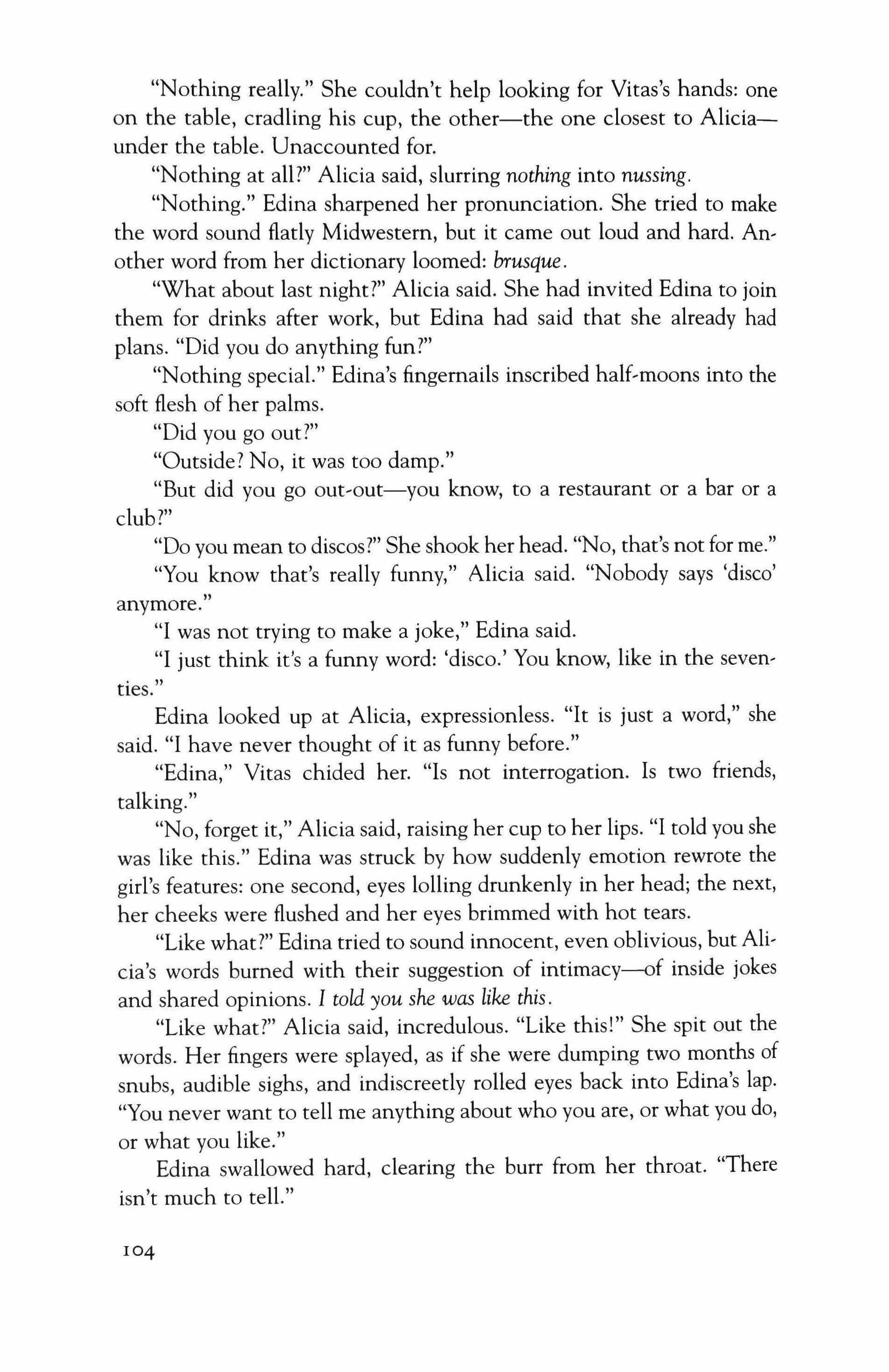
"Nothing really." She couldn't help looking for Vitas's hands: one on the table, cradling his cup, the other-the one closest to Aliciaunder the table. Unaccounted for.
"Nothing at all?" Alicia said, slurring nothing into nussing.
"Nothing." Edina sharpened her pronunciation. She tried to make the word sound flatly Midwestern, but it carne out loud and hard. Another word from her dictionary loomed: brusque.
"What about last night?" Alicia said. She had invited Edina to join them for drinks after work, but Edina had said that she already had plans. "Did you do anything fun?"
"Nothing special." Edina's fingernails inscribed half-moons into the soft flesh of her palms.
"Did you go out?"
"Outside? No, it was too damp."
"But did you go out-out-you know, to a restaurant or a bar or a I b?"cu.
"Do you mean to discos?" She shook her head. "No, that's not for me."
"You know that's really funny," Alicia said. "Nobody says 'disco' anymore."
"I was not trying to make a joke," Edina said.
"I just think it's a funny word: 'disco.' You know, like in the seventies.
Edina looked up at Alicia, expressionless. "It is just a word," she said. "I have never thought of it as funny before."
"Edina," Vitas chided her. "Is not interrogation. Is two friends, talking."
"No, forget it," Alicia said, raising her cup to her lips. "I told you she was like this." Edina was struck by how suddenly emotion rewrote the girl's features: one second, eyes lolling drunkenly in her head; the next, her cheeks were flushed and her eyes brimmed with hot tears.
"Like what?" Edina tried to sound innocent, even oblivious, but Alicia's words burned with their suggestion of intimacy--of inside jokes and shared opinions. I told you she was like this.
"Like what?" Alicia said, incredulous. "Like this!" She spit out the words. Her fingers were splayed, as if she were dumping two months of snubs, audible sighs, and indiscreetly rolled eyes back into Edina's lap. "You never want to tell me anything about who you are, or what you do, or what you like."
Edina swallowed hard, clearing the burr from her throat. "There isn't much to tell."
104
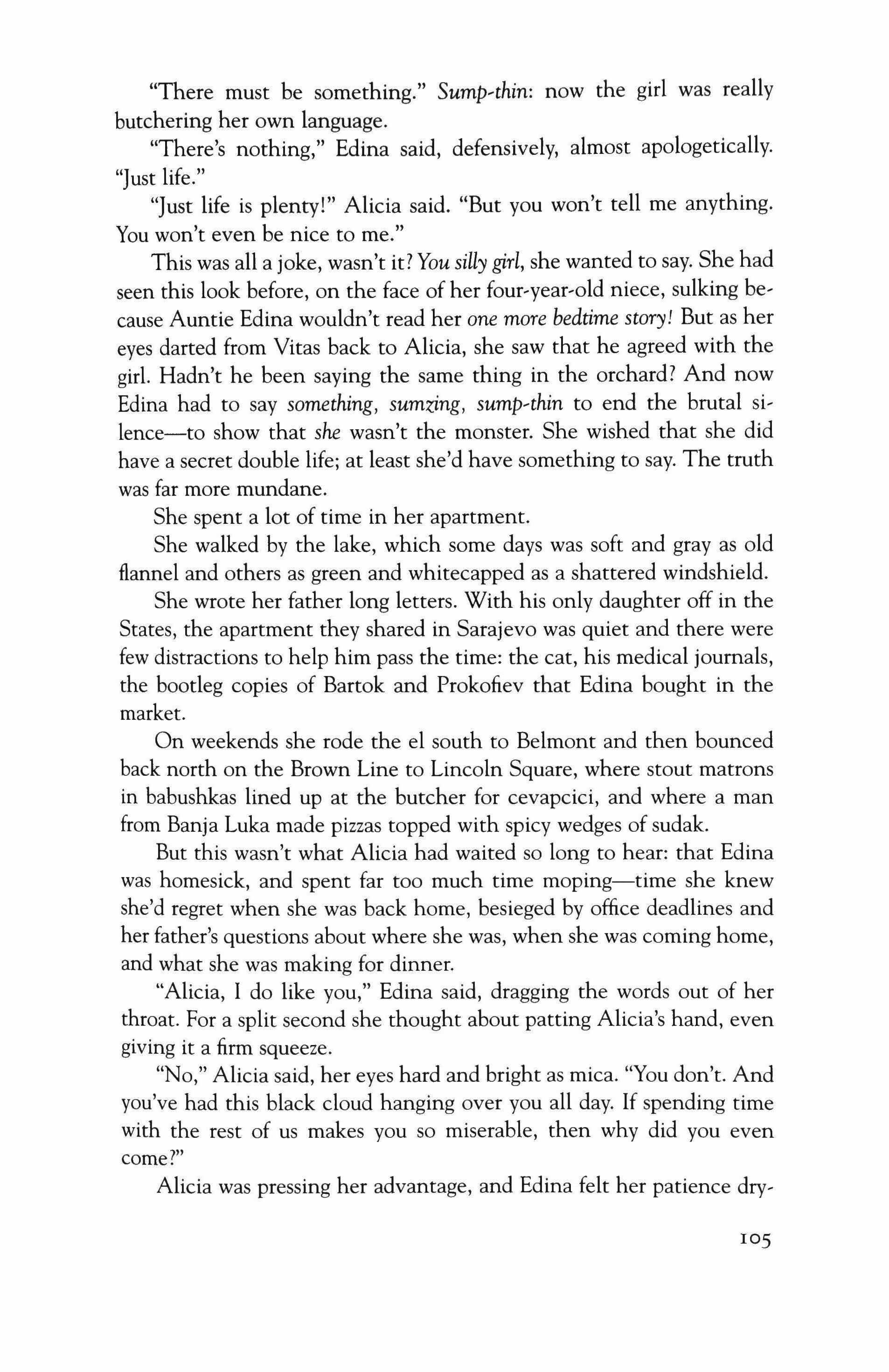
"There must be something." Sump�thin: now the girl was really butchering her own language.
"There's nothing," Edina said, defensively, almost apologetically. "Just life."
"Just life is plenty!" Alicia said. "But you won't tell me anything. You won't even be nice to me."
This was all a joke, wasn't it? You silly girl, she wanted to say. She had seen this look before, on the face of her four-year-old niece, sulking because Auntie Edina wouldn't read her one more bedtime story! But as her eyes darted from Vitas back to Alicia, she saw that he agreed with the girl. Hadn't he been saying the same thing in the orchard? And now Edina had to say something, sumzing, sump�thin to end the brutal silence-to show that she wasn't the monster. She wished that she did have a secret double life; at least she'd have something to say. The truth was far more mundane.
She spent a lot of time in her apartment.
She walked by the lake, which some days was soft and gray as old flannel and others as green and whitecapped as a shattered windshield.
She wrote her father long letters. With his only daughter off in the States, the apartment they shared in Sarajevo was quiet and there were few distractions to help him pass the time: the cat, his medical journals, the bootleg copies of Bartok and Prokofiev that Edina bought in the market.
On weekends she rode the el south to Belmont and then bounced back north on the Brown Line to Lincoln Square, where stout matrons in babushkas lined up at the butcher for cevapcici, and where a man from Banja Luka made pizzas topped with spicy wedges of sudak.
But this wasn't what Alicia had waited so long to hear: that Edina was homesick, and spent far too much time moping-time she knew she'd regret when she was back home, besieged by office deadlines and her father's questions about where she was, when she was coming home, and what she was making for dinner.
"Alicia, I do like you," Edina said, dragging the words out of her throat. For a split second she thought about patting Alicia's hand, even giving it a firm squeeze.
"No," Alicia said, her eyes hard and bright as mica. "You don't. And you've had this black cloud hanging over you all day. If spending time with the rest of us makes you so miserable, then why did you even come?"
Alicia was pressing her advantage, and Edina felt her patience dry-
105

ing up. "If I had known about the change of plans, perhaps I would have stayed at home."
"So now you hate apple-picking, too?" Vitas put a hand on Alicia's shoulder, the hand that had been beneath the table, and murmured into her ear. She swatted at him. "I don't want to calm down! I want to know what her problem is."
"My problem?" Edina said. Blood burned in her face, scouring out the last traces of embarrassment and leaving behind a core of vivid anger. "You want to know what my problem is? You want to know what's on my mind? I'll tell you: That rotten apple smell-the one that reminds you of Halloween parties and sex with the quarterback-"
"Todd wasn't the quarter-"
Edina cut her short with a look she hoped was withering. She sat back abruptly, her fingers tented over her nose. She took a deep breath and told herself to be calm, to take it slowly, not to let it get away from her.
"We had a war," she said finally, looking directly at Alicia, "back when you were a child. When the fighting started, we thought we would be safe. There was a garrison of the Yugoslav Army in our town, and the new Bosnian president said that they would protect us from the militias. He believed that the soldiers would follow his orders. Of course that's not what happened.
"Everyone had heard the rumors about the camps, but it didn't seem possible. This was Europe; things like that didn't happen anymore. Then one day we heard on the radio that the Serbs were coming: we had a day, maybe two to prepare. Most of the people were packing, preparing to go to Tuzla or one of the other safe areas, but a group of us refused to go. We just couldn't believe this was happening. This was our home. We were building a new country." Edina lifted her cup. The vodka was like a spark in her throat.
"The Serbs came in the morning, ready to liberate the town from the Turks. When we saw that they were riding in Yugoslav Army trucks, we realized that no one was going to protect us. There were so many of them, and we had nothing. A few old guns, some hunting rifles-and we weren't soldiers. All we were was young." Alicia was leaning forward, her eyes wide. "I was your age, Alicia. I had just graduated from university. I wanted to be a poet." Her cup was empty, and she waited as Vitas refilled it. After he screwed the top back on the flask, he folded his hands heavily on the tabletop.
"We drove as fast as we could out of town, and when we saw roadblocks ahead, we abandoned the cars and fled into the hills. We thought
106

the Serbs would ignore us: they wanted us to leave; we left." Edina stared across the room at the stiff, spooked faces of the pioneers. "After an hour, we came upon an orchard. There were about thirty of us, men and women both. We were halfway through the orchard when sniper fire started. The trees were like the ones here-short, the branches low to the ground-and we hid wherever we could. I was with my fiance, but when the shooting started we were separated. The trees were so dense that it was impossible to see what was happening even five or ten meters away-just bullets coming through the branches. Then mortars started exploding all around, and when that stopped, the Chetniks moved in on foot. We could hear the sound of their rifles-automatics, Kalashnikovs-going pop�pop�pop. The only thing to do was stay low and shoot at anyone with good boots-the kind the army had given to the militias.
"Because of the war, none of the fruit had been picked, and the ground was covered with rotten apples. For hours I crawled through that mush. Hiding, waiting, then crawling some more. By the time the sun was down, the Serbs moved on and I reached the forest at the edge of the orchard. I waited all night for my fiance or one of the others, and then at dawn I started walking alone. At noon I found a refugee convoy moving toward Sarajevo, but the trucks kept breaking down, and there were checkpoints, and it took eighteen hours to get to the city. All that time, the smell was in my skin, my hair, my mouth, everywhere. No matter how much I scrubbed, the smell wouldn't go away." Edina bolted what vodka remained in her cup. "So today, when you were picking apples and thinking about Wisconsin and Halloween and Todd the quarterback, that's what was on my mind."
Tears traced snail tracks down Alicia's face. "I am so, so sorry," she said. "If I had known-"
"You couldn't have," Edina said. It was some comfort to know that whatever Alicia said next, it would not begin with: "do you know what that reminds me of?" Vitas handed Alicia a wadded paper napkin, which she used to dab at her eyes. His jaw was set, his eyes narrow. He looked like one of those quiet, solid Scandinavians who lived across the Baltic, men carved from ice.
"Is good time to go home," Vitas said.
�
Vitas drove, Edina rode in front, and Alicia passed out in the back seat. There was no map in the car, but Vitas said that all they had to do was go east. Eventually they would hit the lake, and from there it would be
107
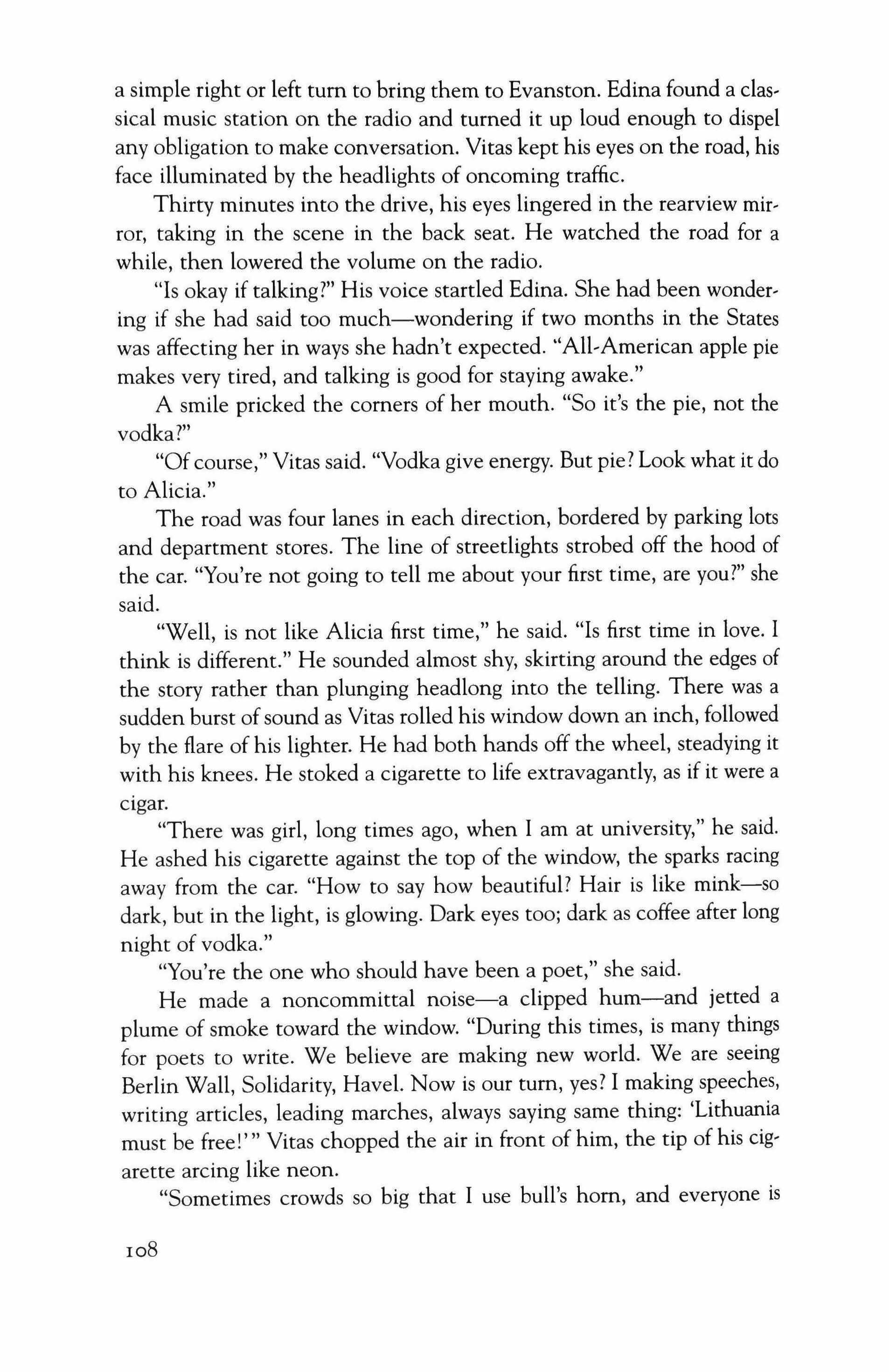
a simple right or left tum to bring them to Evanston. Edina found a classical music station on the radio and turned it up loud enough to dispel any obligation to make conversation. Viras kept his eyes on the road, his face illuminated by the headlights of oncoming traffic.
Thirty minutes into the drive, his eyes lingered in the rearview mirror, taking in the scene in the back seat. He watched the road for a while, then lowered the volume on the radio.
"Is okay if talking?" His voice startled Edina. She had been wondering if she had said too much-wondering if two months in the States was affecting her in ways she hadn't expected. "All-American apple pie makes very tired, and talking is good for staying awake."
A smile pricked the comers of her mouth. "So it's the pie, not the vodka?"
"Of course," Vitas said. "Vodka give energy. But pie? Look what it do to Alicia."
The road was four lanes in each direction, bordered by parking lots and department stores. The line of streetlights strobed off the hood of the car. "You're not going to tell me about your first time, are you?" she said.
"Well, is not like Alicia first time," he said. "Is first time in love. I think is different." He sounded almost shy, skirting around the edges of the story rather than plunging headlong into the telling. There was a sudden burst ofsound as Vitas rolled his window down an inch, followed by the flare of his lighter. He had both hands off the wheel, steadying it with his knees. He stoked a cigarette to life extravagantly, as if it were a cigar,
"There was girl, long times ago, when I am at university," he said. He ashed his cigarette against the top of the window, the sparks racing away from the car. "How to say how beautiful? Hair is like mink-so dark, but in the light, is glowing. Dark eyes too, dark as coffee after long night of vodka."
"You're the one who should have been a poet," she said.
He made a noncommittal noise-a clipped hum-and jetted a plume of smoke toward the window. "During this times, is many things for poets to write. We believe are making new world. We are seeing Berlin Wall, Solidarity, Havel. Now is our tum, yes? I making speeches, writing articles, leading marches, always saying same thing: 'Lithuania must be free!'" Vitas chopped the air in front of him, the tip of his cigarette arcing like neon.
"Sometimes crowds so big that I use bull's hom, and everyone is
108

cheering. I wave arms and cheering is getting louder. When troops come for first time, we saying, 'Go home! Go back Moscow!' They have guns and we have banners, but we do not care. We are young, and is crazy time.
"The young rebel," Edina said, smiling in the darkness. She pictured Vitas, his hair thicker, his features more angular, his skin flushed in the long days of a Baltic summer. "The girls must have loved you."
"Girls. Well. Now are bringing me back to start of story." He checked the rearview mirror-not a darting glance, but slowly, casually. "All the time I making speeches and saying Lithuania must be free I am in love with this girl-"
"The girl with the mink hair?"
"Ofcourse," he said. "Is most beautiful girl at university. Also sweet' est. Also smartest. And here is funny thing: she love me too."
"I thought you said she was smart." Edina played along-she felt the rhythm of their walk in the orchard returning-but her heart wasn't in it. And despite herself, she counted every time he looked in the rearview mirror and wondered if Alicia's hair could be described as mink.
"Smart about everything, but not love," he said. "But I do not com' plain. Is angel. Is bringing me coffee in the morning and vodka at night and rubbing my feet after marches and listening to speeches and telling me how to say better this or that. Her name was Nadia Volkonsky. You are listening? Volkonsky. Very Russian name. Very un-Lithuanian name. It never matters. Nadia is born in Vilnius, and her heart is one hundred percents Lithuanian.
"But then is January, and many more troops coming, and soldiers are killing demonstrators. All of us going crazy. We are pulling down statues of Russian heroes and tearing down street signs in Russian. Anything looking Russian or sounding Russian or smelling Russian: all must go. And I hear voices behind my back say, how can Vitas be for real, when is banging that Russian slut? I saying to them all to fuck off, but their words stay in my head. My country belongs to Russia for too long, and now it must be ours, must be free, must be He paused for a moment, the streetlights illuminating his face in slow pulses. "Must be clean."
Edina shifted in her seat. The faint sound of a piano seeped from the speakers.
"So there is me, big man in movement, and I see Nadia, and I should see angel, because angel is what she is, but what I seeing now is Russian devil. I say to her things are no good. She is not making me happy. Is not understanding me. All bullshit things. Then one day at protest lead,
109

ers' meeting, I start big argument with Nadia, and in front of everyone I saying to her 'Go home to Moscow!' Is same thing we saying to soldiers. She looks for someone to tell me I am asshole-is room full of her friends, her comrades-but nobody says nothing."
Nobody says nuzzing. Edina repeated the words to herself.
"Is standing there, my angel, with tears pouring down her eyes. I feel those eyes, hot like coal, but I am not looking at her. I am looking down. Waiting for her to leave. We all do same. All of us heroes ofrevolution. So brave in streets, but in our hearts, cowards."
Edina listened to the metronomic tick of the road against the tires. They were moving east along a road populated with gas stations and low, flat office parks. Wisps ofexhaust reached upward into the cold night air. After a red light, the gas stations gave way to a dense stand of trees, a black mass of wadded shadows that lined the road.
"You want last chapter?" Vitas said, his voice breaking the silence, again surprising Edina. "For long time, I am thinking I ruin her life. Nadia is sweet, so kind, and see: this is what happens. It kills her, I am thinking, for me to throw her away. But two years ago I am in Saint Petersburg, making interviews. I going to cafe and am seeing woman with husband and little girl. Even from other side of room I see woman is beautiful, and from clothes and hair I can tell is rich, too. One of New Russians. And child is like cherub, and husband doesn't look like old, fat Russian. Not Mafia." He lit another cigarette, quickly this time, and took a long drag.
"Of course is Nadia, and is singing song with little girl and when is done husband claps and gives little girl big hug. Is perfect, yes? Is maybe life I could had. So what I do? I get up. I run. Run like chair is on fire. And when I get to street I still running, and everyone thinking I am crazy drunk, or thief, or man who is seeing ghost." The tip of his cigarette glowed. They were on a road without stop lights, angling south alongside the railroad, the lake roiling darkly behind tall maples and quiet mansions. "Now you see," he said. And then he added: "Is something you should know."
They carried Alicia into her apartment and put her in bed with a glass of water on the nightstand and a shopping bag near her head. Edina did not ask Vitas how he knew where Alicia lived.
Edina bundled her hands into her pockets for the walk to their building. One fist gripped the whistle on her key ring-part of her welcome package from Alicia, who told her that blowing the whistle would
110
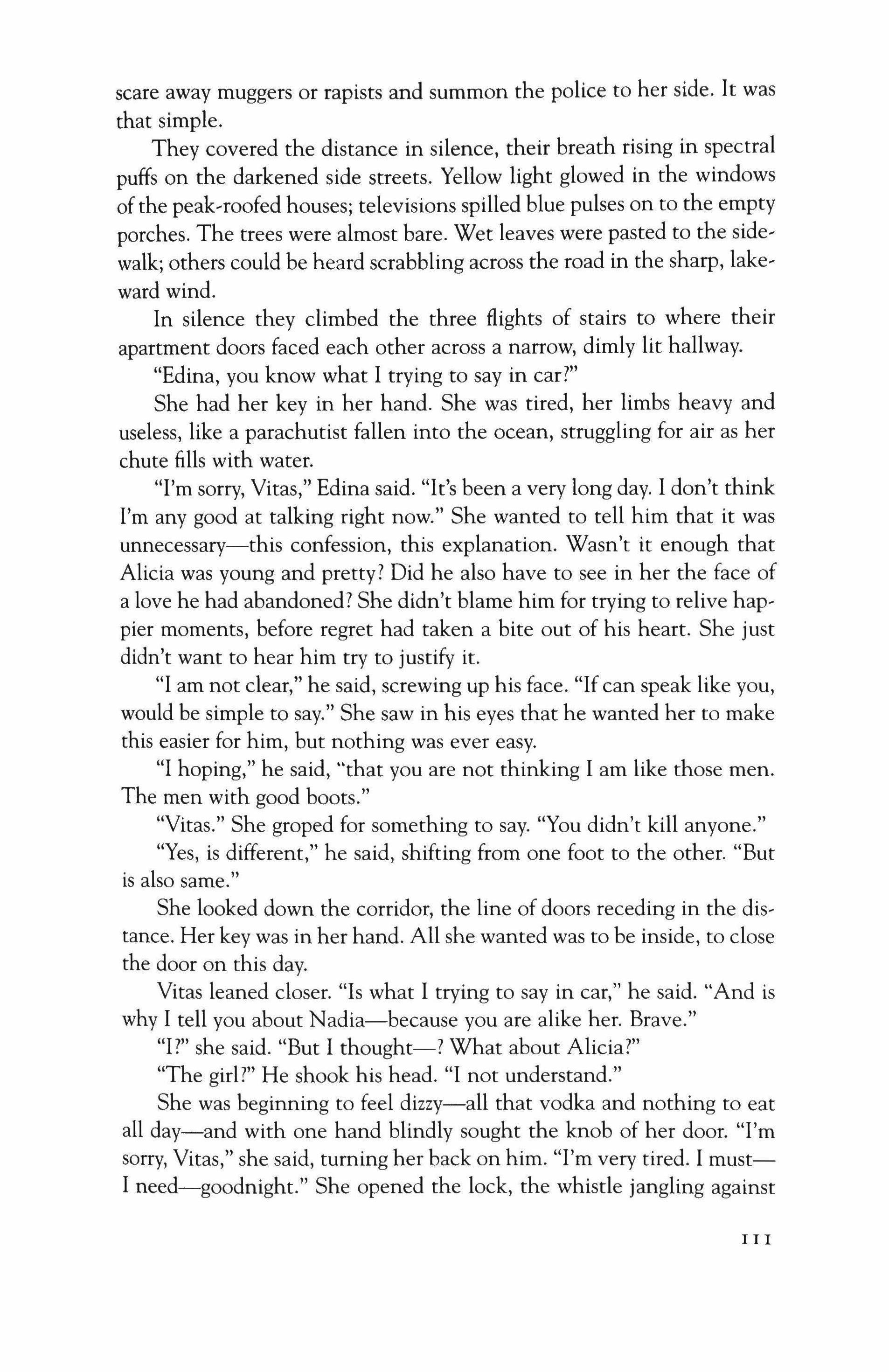
scare away muggers or rapists and summon the police to her side. It was that simple.
They covered the distance in silence, their breath rising in spectral puffs on the darkened side streets. Yellow light glowed in the windows of the peak-roofed houses; televisions spilled blue pulses on to the empty porches. The trees were almost bare. Wet leaves were pasted to the side, walk; others could be heard scrabbling across the road in the sharp, lake, ward wind.
In silence they climbed the three flights of stairs to where their apartment doors faced each other across a narrow, dimly lit hallway.
"Edina, you know what I trying to say in car?"
She had her key in her hand. She was tired, her limbs heavy and useless, like a parachutist fallen into the ocean, struggling for air as her chute fills with water.
"I'm sorry, Vitas," Edina said. "It's been a very long day. I don't think I'm any good at talking right now." She wanted to tell him that it was unnecessary-this confession, this explanation. Wasn't it enough that Alicia was young and pretty? Did he also have to see in her the face of a love he had abandoned? She didn't blame him for trying to relive hap' pier moments, before regret had taken a bite out of his heart. She just didn't want to hear him try to justify it.
"I am not clear," he said, screwing up his face. "If can speak like you, would be simple to say." She saw in his eyes that he wanted her to make this easier for him, but nothing was ever easy.
"I hoping," he said, "that you are not thinking I am like those men. The men with good boots."
"Vitas." She groped for something to say. "You didn't kill anyone."
"Yes, is different," he said, shifting from one foot to the other. "But is also same."
She looked down the corridor, the line of doors receding in the dis, tance. Her key was in her hand. All she wanted was to be inside, to close the door on this day.
Vitas leaned closer. "Is what I trying to say in car," he said. "And is why I tell you about Nadia-because you are alike her. Brave."
"I?" she said. "But I thought-? What about Alicia?"
"The girl?" He shook his head. "I not understand."
She was beginning to feel dizzy-all that vodka and nothing to eat all day-and with one hand blindly sought the knob of her door. "I'm sorry, Vitas," she said, turning her back on him. "I'm very tired. I mustI need-goodnight." She opened the lock, the whistle jangling against
III

her keys. She knew Vitas was standing behind her, but without looking back she slipped inside her apartment.
The glass dome of the peephole flickered when Vitas's apartment spilled light into the hallway, then blinked when his door closed. The only sound was the rattle of steam rising in the radiators. Although it was dark in her apartment, she squeezed her eyes shut, as if that could stop the tears from coming. Sobs constricted her throat and she slid to the floor, where she hugged her knees tight to her chest.
She wasn't brave. That part had come out all wrong, and now it was worse than a lie. She wasn't brave, and she had tried to hold something back for herself, but all she had done was make a mess ofeverything. She wasn't brave, and her fiance-sweet, serious Satko-didn't just disappear. They were separated when the first bullets struck, but all through the sniper fire and the mortar rounds they had called to each other. She would shout his name and wait for his reply, then crawl through the stony crabapples and fetid mush toward the sound of him answering, "Didi! Didi!" Neither of them dared to stand because of the snipers, and for an hour she heard the distant, throaty huff of the mortars followed by the spray of shrapnel and splintered wood over her head. They called each other's names, but the terrain was steep and deeply rutted and they never seemed to draw any closer.
Satko called her name even after Edina saw the boots of the soldiers crushing the fallen fruit. She wanted to yell to him one last time to be quiet, to tell him the soldiers were coming, but she saw the boots in the next row of trees and she knew that any sound would give her away. She gripped the stock of the shotgun and she knew she could kill the man closest to her, but there would be more, and the blast would lead them right to her. So she curled herself into a ball amid the web of branches under one of the trees and silently begged Satko to do the same. To hide. To wait. To bury her name deep in his throat and let it lie there, quiet.
112
Joe Meno
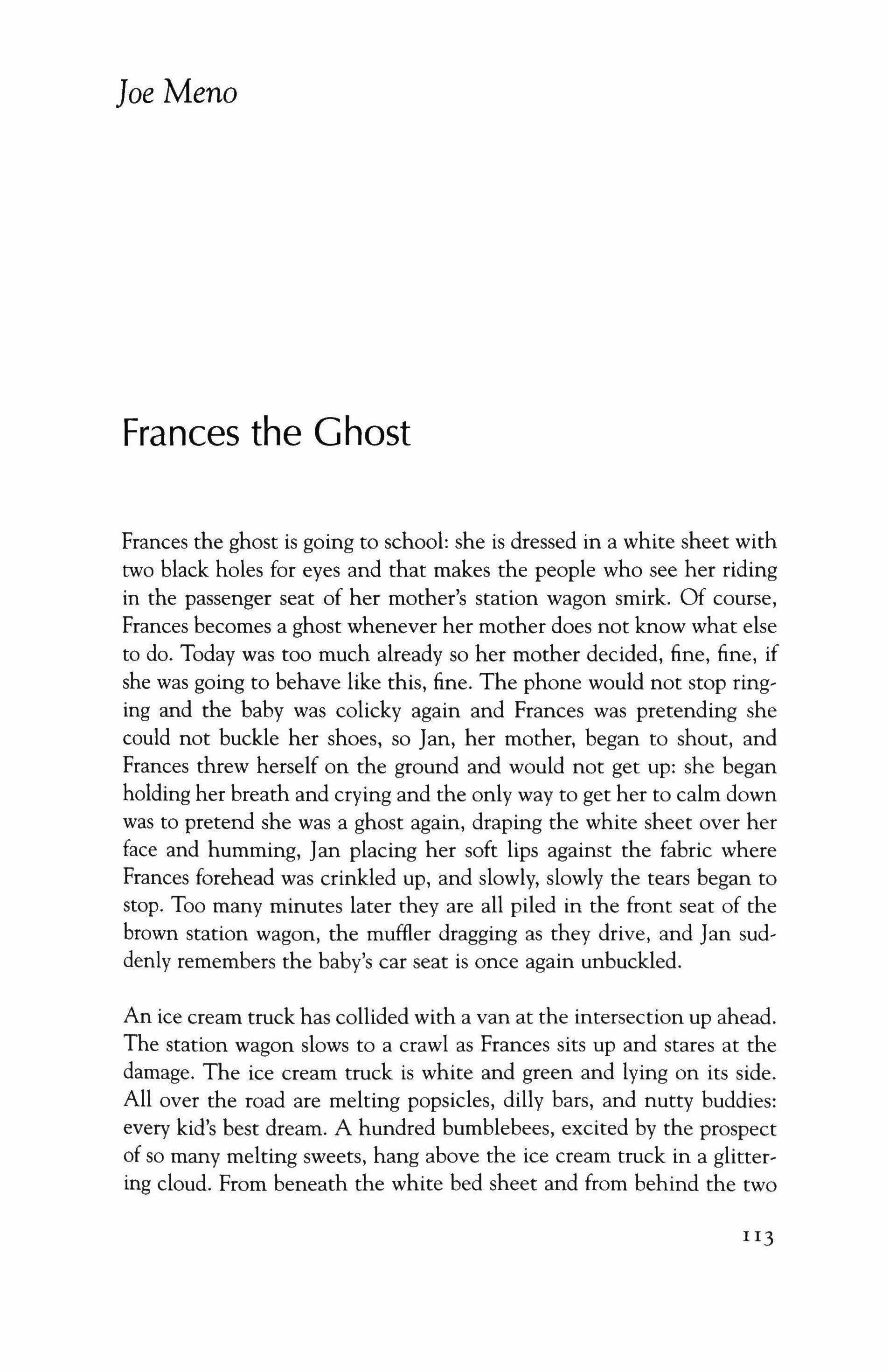
Frances the Ghost
Frances the ghost is going to school: she is dressed in a white sheet with two black holes for eyes and that makes the people who see her riding in the passenger seat of her mother's station wagon smirk. Of course, Frances becomes a ghost whenever her mother does not know what else to do. Today was too much already so her mother decided, fine, fine, if she was going to behave like this, fine. The phone would not stop ring' ing and the baby was colicky again and Frances was pretending she could not buckle her shoes, so Jan, her mother, began to shout, and Frances threw herself on the ground and would not get up: she began holding her breath and crying and the only way to get her to calm down was to pretend she was a ghost again, draping the white sheet over her face and humming, Jan placing her soft lips against the fabric where Frances forehead was crinkled up, and slowly, slowly the tears began to stop. Too many minutes later they are all piled in the front seat of the brown station wagon, the muffler dragging as they drive, and Jan sud, denly remembers the baby's car seat is once again unbuckled.
An ice cream truck has collided with a van at the intersection up ahead. The station wagon slows to a crawl as Frances sits up and stares at the damage. The ice cream truck is white and green and lying on its side. All over the road are melting popsicles, dilly bars, and nutty buddies: every kid's best dream. A hundred bumblebees, excited by the prospect of so many melting sweets, hang above the ice cream truck in a glitter, ing cloud. From beneath the white bed sheet and from behind the two
113

small holes her mother has cut so Frances can see, the little girl stares at the mass of bees suspiciously. Frances does not like bees. She thinks they are her enemy. One day, last spring, she was stung inside her mouth when she surprised a bumblebee hiding under the rim of her soda pop can. Frances places her hand against the outside of the sheet just above her lip remembering. She watches the ice cream truck grow smaller and smaller until it is just another strange, uncertain memory.
Oh, oh, oh. Come and see:
See the girl. See the boy. See the pony.
Come and see: beneath the ghostly white sheet, Frances is very pretty. She has soft brown eyes and a face shaped like a dandelion: her hair is blonde and curly. For some seven months now, Frances refuses to speak. She is reading her schoolbook which is all about horses. In the book, a black mare nestles with a small white pony. The baby, in the car seat beside her, is blowing spit bubbles and smiling at her. While her mother is fooling with the radio, Frances turns and pinches the baby for absolutely no reason.
In the station wagon, in front of the school, Jan turns to face her daughter. Slowly, making sure she can read her lips, she says, "O.K., honey, it's time to take off the sheet."
The ghost does not move.
"Frances.
The ghost is silent.
"Frances, I want you take off that sheet right now."
The ghost makes a small move and Jan can see Frances has folded her arms in front of her chest, pouting.
"It's time for school and it's time for you to take off that blanket."
The ghost shakes its head.
"Frances, right now."
The ghost shakes its head again.
"Frances, take off that blanket or you're going to be on punishment."
The ghost does not move. Jan quickly makes a grab for the flimsy fabric but Frances, small, ruthless, quick, is already gripping it too tightly.
Jan is exhausted and it is not even 8:00 A.M.
"O.K., O.K., O.K., O.K., O.K., O.K., O.K., O.K., O.K., O.K., O.K., O.K., O.K., O.K., O.K., O.K., O.K., O.K., O.K., O.K., O.K., O.K., O.K.,
114

O.K., O.K., O.K.,.O.K., O.K.," Jan shouts, letting go of the white blanket, sheet, whatever it is. "If you want to go in there like that, fine, be my guest."
The ghost is still for a moment, then one solitary pink hand reaches up and finds the door handle. Frances hurries from the front seat of her mother's station wagon across the empty schoolyard, before her mother can change her mind, the white sheet still covering the girl's head. Jan does not even protest. It is now 8:01. It is totally out of her hands. Jan sits and watches the schoolchildren all standing in line, clapping, singing, shouting noiselessly. Frances is doing well at school, mostly. She has known how to read ever since she was three, around the time it be' came obvious something was wrong with her hearing. Frances loves to read but struggles to speak, or to make any sound at all. She can say a few words: No, Yes, Hello, Goodbye, but she's gotten lazy and does not really try to talk anymore. Jan does not remember the last time she heard her daughter mumble anything like a word. Frances is very good at spelling and her vocabulary comprehension is very high. She has a hearing aid but she does not like to switch it on because she does not like to wear it in her ear. She does not like to wear it because it makes the other children stare.
Sitting there, like every morning, Jan wonders if they are doing the right thing, letting Frances still go to the regular public school. There is a deaf-special-ed school but it is an hour and a half away and well, the school here has been very accommodating but the problem is Frances, because she gets frustrated she can be pretty, well, mean.
In line, the first grade class is whistling. Frances whistles along, hers a bright dizzying sound like a small bird doing figure eights in the sky. Frances knows how to whistle. She does not exactly hear the sound but feels the small, bright vibrations along her lips. Frances measures the sound and pitch using her fingertips. Some of the kids laugh, staring at the deaf girl dressed as a ghost, trying to whistle along. An older girl from the fifth grade, who wears a green dress and a small, coy smile, points and laughs at Frances and says her name in a way which Frances hates. She can tell by the look their mouths are making how terribly they are saying it. Soon all of the fifth graders begin to chant it. Fran/ces. Fran/ces. Fran/ces. Frances lunges at the closest fifth grader, a dark,eyed boy, trying to bite his arm through the sheet. Miss Dove appears and asks what is the commotion and very soon, Frances is once again crying.
115
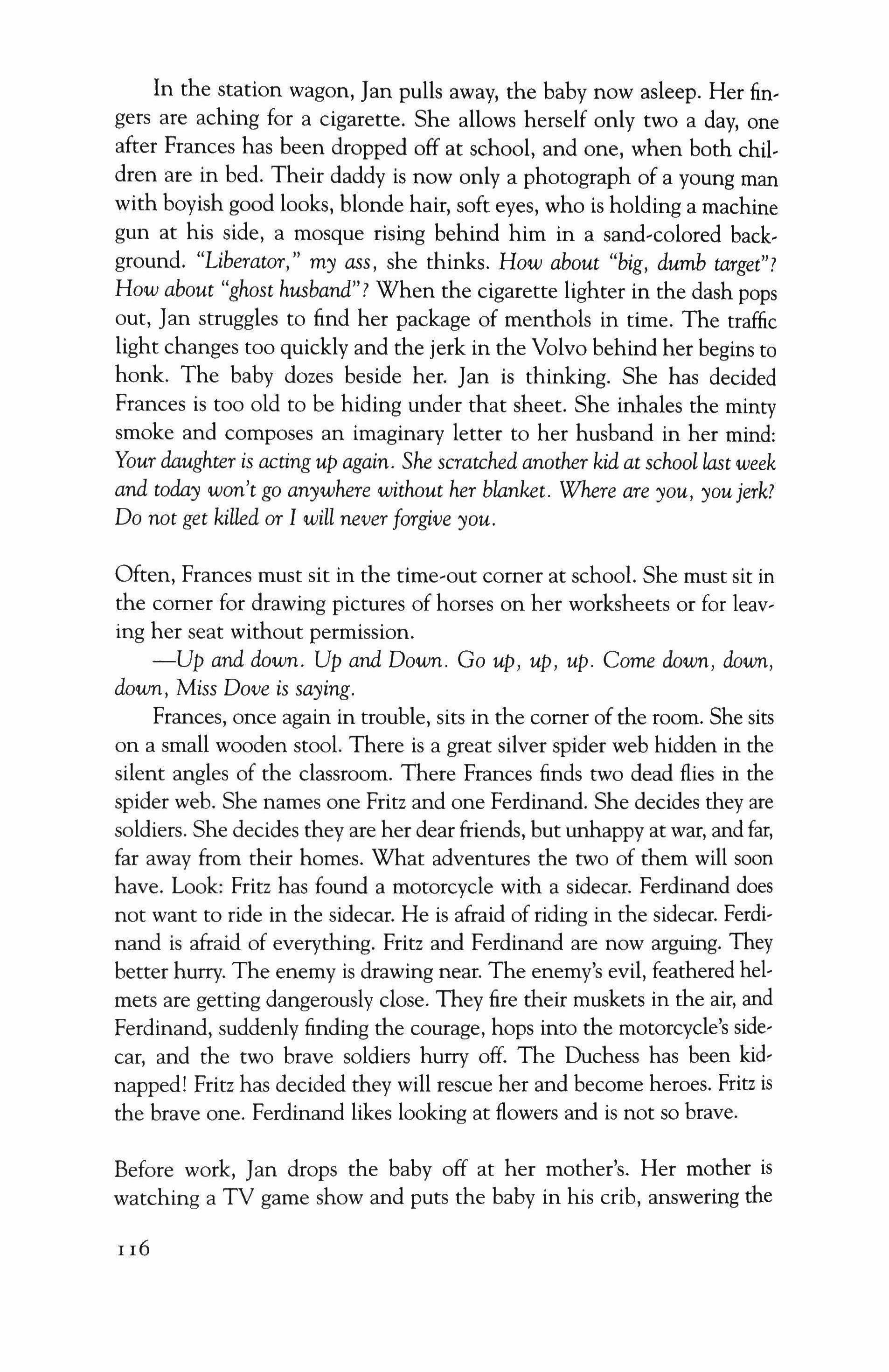
In the station wagon, Jan pulls away, the baby now asleep. Her fingers are aching for a cigarette. She allows herself only two a day, one after Frances has been dropped off at school, and one, when both children are in bed. Their daddy is now only a photograph of a young man with boyish good looks, blonde hair, soft eyes, who is holding a machine gun at his side, a mosque rising behind him in a sand-colored background. "Liberator," my ass, she thinks. How about "big, dumb target"? How about "ghost husband"? When the cigarette lighter in the dash pops out, Jan struggles to find her package of menthols in time. The traffic light changes too quickly and the jerk in the Volvo behind her begins to honk. The baby dozes beside her. Jan is thinking. She has decided Frances is too old to be hiding under that sheet. She inhales the minty smoke and composes an imaginary letter to her husband in her mind: Your daughter is acting up again. She scratched another kid at school last week and today won't go anywhere without her blanket. Where are you, you jerk? Do not get killed or I will never forgive you.
Often, Frances must sit in the time-out corner at school. She must sit in the comer for drawing pictures of horses on her worksheets or for leaving her seat without permission.
-Up and down. Up and Down. Go up, up, up. Come down, down, down, Miss Dove is saying.
Frances, once again in trouble, sits in the comer of the room. She sits on a small wooden stool. There is a great silver spider web hidden in the silent angles of the classroom. There Frances finds two dead flies in the spider web. She names one Fritz and one Ferdinand. She decides they are soldiers. She decides they are her dear friends, but unhappy at war, and far, far away from their homes. What adventures the two of them will soon have. Look: Fritz has found a motorcycle with a sidecar. Ferdinand does not want to ride in the sidecar. He is afraid of riding in the sidecar. Ferdinand is afraid of everything. Fritz and Ferdinand are now arguing. They better hurry. The enemy is drawing near. The enemy's evil, feathered helmets are getting dangerously close. They fire their muskets in the air, and Ferdinand, suddenly finding the courage, hops into the motorcycle's sidecar, and the two brave soldiers hurry off. The Duchess has been kidnapped! Fritz has decided they will rescue her and become heroes. Fritz is the brave one. Ferdinand likes looking at flowers and is not so brave.
Before work, J an drops the baby off at her mother's. Her mother is watching a TV game show and puts the baby in his crib, answering the
116

question the game show host has asked. "Jane Mansfield," is all her mother says to her that morning.
Parking behind the VA hospital, Jan digs her hand beneath the driver's seat and searches for a small cigarette case, which contains four, tightly-wound joints and a small roach, which she lights and inhales from deeply. She checks herself in the rear view mirror, decides she has somehow become her mother over night, squeezes some eye drops into her eyes, and straightens her nurse's uniform once she is standing.
Jan is falling in love with a patient named Private Dan. He is a vet from the first GulfWar, around thirty-five, and is missing most ofhis left leg. He is handsome in a dull way, like an unpolished stone or the sheer, inarguable face of a cliff. He suffers from PTSD and may have Gulf War illness. He is in and out ofher wing of the VA like a celebrity. He served four years in the reserves and was discharged as a private, which does not say much for him.
Today Private Dan is complaining about a rash. And chronic diarrhea.
"You have to wait like everybody else," is what Jan tells him, though when he frowns, pretending to pout, he makes her heart feel small and quivering.
If you look, you can see Frances dressed as a ghost, sitting alone on her grandma's front porch: the bus has dropped her off early and grandma, not expecting her so soon, has gone to the store to get diapers for the baby. Frances is sitting on the top step of her grandma's porch, waving to you as you ride past in the backseat of your parent's minivan. It is only a glimpse of a girl dressed as a small white phantom. You smile and wave but already she is a blur; already she has disappeared. Frances picks up her pink bicycle from the driveway and rides as close to the curb as she can without crossing into the street. The front wheel dangles dangerously over the gray concrete edge and Frances imagines crossing the road while no one is looking. She has been warned never to ride her bike in the street. She edges the front wheel on the black pavement but she does not go any farther. She slowly turns and sees her grandmother arriving home now, the old blue car teetering up the road from the other direction. Frances hops off her bike. She pulls the white sheet from her head and waves hello to grandma. Grandma kisses her cheek, almost forgetting the baby who is still buckled in the car seat. Frances points across the street and Grandma nods, checking for
117

traffic. Frances hurries across the street to go play with a neighbor girl named Allie. Allie is not really Frances' friend: she's three years older and likes to think she is something of a mother to the small, strange girl. Allie is weak-shouldered and skinny, with stringy blonde hair and yellow teeth. She will try to carry Frances around like a baby, but Frances will fight, biting the older girl's shoulder if she does not put her down quickly.
Allie has decided they will go into the woods and throw rocks at a beehive she has recently discovered. Frances does not think this is a good idea. She hates bees. She is completely terrified of them. She stops walking and holds her hand to her mouth at the spot where she was stung. She decides she is not going to go into the woods. She is going to go back to Grandma's and sit and watch TV. Allie stares at Frances and calls her a baby then walks off towards the woods by herself. Frances decides she does not like being called a baby. She decides she is not a baby and so she hurries up to follow Allie. The two small girls gather all the stones they can find and begin pelting the side of the papery brown honeycomb. Allie laughs. Frances thinks maybe there is nothing to be scared of, all they are is dumb bees anyway. Frances throws another rock, then a third. Almost immediately, a string of glittering bees descends, stinging Frances on her face and hands. Allie, a little older but not much brighter, turns and runs away, leaving her small charge to fend for herself. Frances tries to cover her face but they are on her now, the whole hive, stinging her through her blue dress and pink tights.
At the VA, Private Dan insists on a physical exam. Jan draws the curtain as Dan unbuttons his blue shirt.
"How's your husband?" he has the gall to ask. Doesn't he know the way I look at him? Is this his way ofletting me off the hook?
"I get emails from him every few days," Jan says. The emails are sometimes single lines like:
-Found a kid hiding an explosive device under a Humvee.
-Ate candy all day.
-Think our children will no longer recognize me.
"I'm sure he's fine," Private Dan says. "Six months over there and I never fired a round. It was a different war, though," he mutters.
"So tell me about the rash," Jan says, trying to establish some decorum.
"Here," Dan says, pointing to a red mark on his chest. "It really bums."
118

Jan pulls on a latex glove and carefully pokes the vet's chest. Still in shape, Jan thinks. Which is why he took his shirt off. The showboat.
"What do you think?" Dan asks.
"I'm not a doctor," is Jan's reply.
"So?"
"So you'll have to wait to see Dr. Grant."
"Is it serious?"
"I don't know," she says.
"You don't know? You just wanted to see me with my shirt off then?" Dan smiles. He has a big toothy grin that makes Jan laugh.
"The doctor will be right in."
"Nurse?"
"V }"res:
"If you ever want to talk, I mean I know, it can be pretty lonely, waiting for somebody."
"I have to go," she says.
"Nurse?"
"V 7" res:
Private Dan winks, then, before Jan can tum in mock disgust, he blows her a kiss. It hits her, the invisible kiss, it is as real as a real kiss, and when, exiting from the exam room and hurrying back to the nurses' station, she knows she is blushing.
Grandma is looking for Frances, holding the baby in her soft, flabby arms, when she sees Allie sitting alone on the other side of the street. Grandma calls out to her, "Have you seen Frances?"
Allie, alarmed, looks up and shakes her head. No is what her head is saying, but Grandma has raised three kids and knows damn well when one of them is lying.
In the parking lot of the VA, Jan sits in her station wagon beside Private Dan. They do not touch. They do not talk. They light up one of her joints and watch the front seat fill with smoke. Finally, Private Dan be, gins to speak.
"I can feel my toes wiggling when I get high sometimes."
"Hmmm?" Jan asks.
"On the missing leg. I can feel them wiggling when I get high some' times."
"Oh, that's weird."
"It's O.K."
119

The pair is quiet for awhile. Then Private Dan speaks again.
"I would sure like to kiss you, Nurse Jan."
"I' h ve got a guy, s e says.
"I know."
Jan is pleased with herself suddenly. She feels like an adult, like a television actress on a soap opera, like someone's real wife. She begins smiling, thinking of Mickey the Jerk on the other side of world and the way he looks when he is on the couch sleeping.
"I should head back in," she says.
Meredith, the other nurse from her wing, comes hurrying out into the parking lot, looking panicked.
"It's the phone. Your mom. Something's happened."
O.K., first of all, Frances is O.K. She is as swollen as a newborn, but she'll live. Jan looks at Frances' face and arms and hands and counts nine stings. Grandma has, like always, completely gone overboard. Frances is lying on the corduroy sofa and every visible part of her is coated in pink calamine. Frances has arranged her small hands over her waist like a photograph of someone beautiful lying in a casket.
"What happened?" Jan asks but knows her mother has no answer. She turns to face Frances who is pretending to be asleep. She pats Frances's hands and asks Grandma where the baby is.
"Oh, I almost forgot! I left him with Allie across the street," Grandma says and gets up, heading out the front screen door in a hurry.
At home now, Frances wears the white ghost sheet at the table. It is dappled with dots of pink calamine lotion from all of her stings. Jan looks up from the TV dinner, unsure what kind of brown, wet meat she is supposed to be eating. She wipes her mouth on the paper napkin and stares directly at Frances.
"Frances, we are going to have a talk."
Frances blinks, becoming suddenly still.
"Frances, that sheet of yours has got to go."
Frances does not move.
"Frances. Do you want to be a big girl like mommy or a baby like the baby?"
Jan cannot see the expression Frances is making beneath the white blanket.
"Do you want to be a big girl? Big girls don't carry their blankets around with them."
120

Frances does not move.
"You can keep it in your bedroom. But no more wearing it to school. Or at the table. Today is the last day."
Small dots of gray begin to form around the ghost's eyes: Frances has begun to cry. Jan can already hear it, the nearly silent gumming of her teeth, the tightening of her small lips.
Jan gets up from her chair and puts Frances in her lap. She places her mouth right beside Frances's ear and begins to sing: Frances/ Frances/ please don't cry/please don't cry
Of course, it is true: if you cover your ears, a whisper does not feel the same as a kiss. A laugh does not make the small hairs around your neck startled the way it does when someone is shouting. When someone cries, it feels like you are waiting for the rain. When someone sings, it feels like the shape of a heart is being traced along the center of your chest.
Frances lays her head against her mother's neck and slowly stops erving.
By the time the baby is asleep, Frances is ready for bed, too. Jan sits beside her and reads her a story that has a horse and a princess and a castle in it. She dabs calamine at the sting above Frances's left eye and then switches on the nightlight. She goes downstairs, then waits a half hour, flipping through the channels. When she thinks she is sure Frances is asleep, she climbs back upstairs and sneaks into Frances's room, carefully, oh so carefully, tugging the white sheet from beneath her daughter's head. She does not know what she is going to do with it, and sits on the couch composing another imaginary letter to her husband:
I did a bad thing tonight, one of the most terrible things ever: I waited for her to fall asleep then stole the sheet from under her head. I am missing you or maybe just the idea of you. I have begun seriously thinking about other men. I am afraid I am not strong enough or tough enough for this. I am afraid all the time. I have not slept well in months. When are you coming back, you jerk? We are all trying to be brave without you and doing real a crummy job of it. I do not want to have to be brave anymore without you.
Jan holds the white sheet against her face and feels like crying, but she doesn't. She pulls it over her head and sighs, sitting on the couch like that for awhile, a ghost staring through the small eye holes at the TV. After a while, she carries the sheet downstairs and hides it with
121

the rest of the laundry, once again afraid she is not doing the right thing.
Once again, the morning begins with the phone ringing nonstop. First it's her mother, then Meredith at the VA asking about Frances, then some jerk from the military selling life insurance. By the time Frances is awake, the baby has already been fed. Soon J an has everyone in the front seat of the station wagon. She turns the key, adjusts the rear view mirror, and throws the wagon in reverse. Frances immediately begins fussing. She has forgotten something. She has forgotten her white sheet. She kicks her legs and begins sobbing. Jan throws the station wagon in park and takes a breath, then turns to her daughter, lowering her chin so Frances can read her lips.
"Frances, I need your help. I need you to help me get through this today."
Frances' face is stony white. Small beads of tears hang at the tips of her small black eyelashes.
"Frances, we are going to try to get through the day without the sheet. If we make it, we will have ice cream sundaes after dinner. But if you throw a tantrum right now, I think I am going to quit right now, honey. I think I am going to go back inside and never get out of bed agam.
The station wagon sounds like it is going to die. Jan stares at her daughter, ready to cry herself, waiting for her daughter to begin screaming. But Frances turns, still pouting, staring straight ahead. She is mad, she is angry, but she does not cry. Jan decides this O.K., this fine. Angry she can handle. Angry sounds great.
122
Heather A. Slomski

The Allure of All This
Anderson stood behind the counter in the men's section of the department store. He had arrived, as always, with a Styrofoam cup of tea that he hid on the shelf beneath the register. No beverages across the red line. Julian, his manager, had been instructed to paint a red line on the threshold of the break room. Since the nine o'clock hour Anderson had waited on one lady and one gentleman. A pair of striped socks for the lady's husband, and a double-breasted suit for the gentleman. Anderson spent his day sorting, folding, hanging clothes, and with afternoon he grew tired in the glow of dress shirts surrounding him.
It was seven forty-five when Anderson turned the key to his third-floor apartment. He walked through the small living room and into the kitchen where he set two brown bags on the counter. Ermalinda? he called. At the end of her name he heard the bathtub faucet screech on for a moment then off. Ermalinda? he called again just before his knuckles rapped the bathroom door. Still no answer from his wife so Anderson cracked the door and asked once more, Ermalinda? before he opened it and entered.
She was in the bathtub, covered in suds. One leg lifted and bent, her foot flat against the tiled wall above the faucets and a green razor in her hand. She didn't look up. I've brought dinner, he said. Burgers, and carrots instead of fries. Ermalinda ran the razor up her shin, over her knee and up her long, soapy thigh. She did this on every line of her leg and when she switched legs the suds parted and Anderson could see her
123
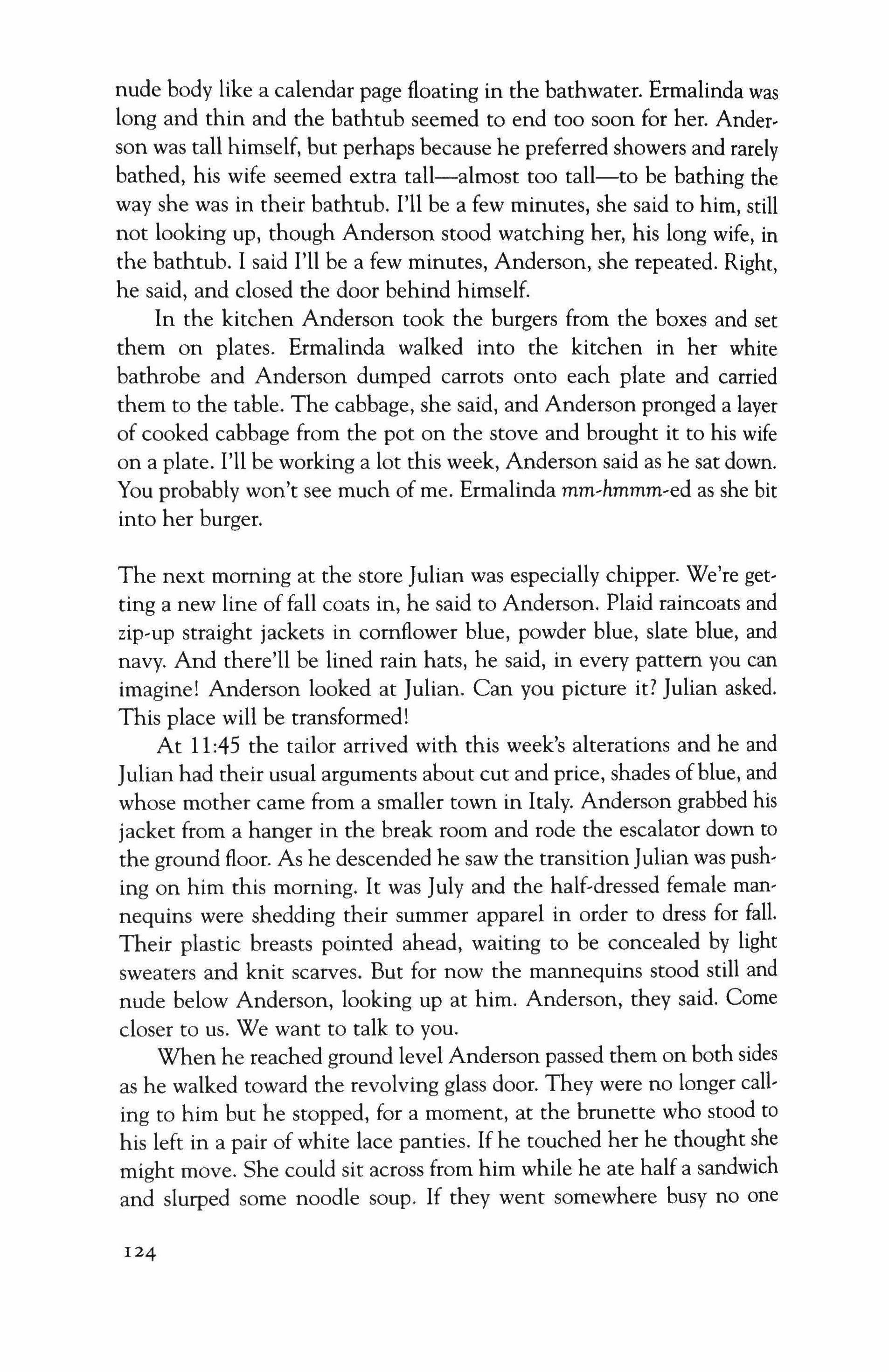
nude body like a calendar page floating in the bathwater. Ermalinda was long and thin and the bathtub seemed to end too soon for her. Anderson was tall himself, but perhaps because he preferred showers and rarely bathed, his wife seemed extra tall-almost too tall-to be bathing the way she was in their bathtub. I'll be a few minutes, she said to him, still not looking up, though Anderson stood watching her, his long wife, in the bathtub. I said I'll be a few minutes, Anderson, she repeated. Right, he said, and closed the door behind himself.
In the kitchen Anderson took the burgers from the boxes and set them on plates. Ermalinda walked into the kitchen in her white bathrobe and Anderson dumped carrots onto each plate and carried them to the table. The cabbage, she said, and Anderson pronged a layer of cooked cabbage from the pot on the stove and brought it to his wife on a plate. I'll be working a lot this week, Anderson said as he sat down. You probably won't see much of me. Ermalinda mm-hmmm-ed as she bit into her burger.
The next morning at the store Julian was especially chipper. We're getting a new line of fall coats in, he said to Anderson. Plaid raincoats and zip-up straight jackets in cornflower blue, powder blue, slate blue, and navy. And there'll be lined rain hats, he said, in every pattern you can imagine! Anderson looked at Julian. Can you picture it? Julian asked. This place will be transformed!
At 11 :45 the tailor arrived with this week's alterations and he and Julian had their usual arguments about cut and price, shades ofblue, and whose mother came from a smaller town in Italy. Anderson grabbed his jacket from a hanger in the break room and rode the escalator down to the ground floor. As he descended he saw the transition Julian was pushing on him this morning. It was July and the half-dressed female mannequins were shedding their summer apparel in order to dress for fall. Their plastic breasts pointed ahead, waiting to be concealed by light sweaters and knit scarves. But for now the mannequins stood still and nude below Anderson, looking up at him. Anderson, they said. Come closer to us. We want to talk to you.
When he reached ground level Anderson passed them on both sides as he walked toward the revolving glass door. They were no longer calling to him but he stopped, for a moment, at the brunette who stood to his left in a pair of white lace panties. If he touched her he thought she might move. She could sit across from him while he ate half a sandwich and slurped some noodle soup. If they went somewhere busy no one
124

would even notice, like that little place on Charles Street where you push your tray along the tracks, and they have those high stools. He'd have to cover her with his jacket, but he won't be able to--he'll have sweat stains on his shirt from walking. Anderson walked past the man' nequin and stepped into the yellow light of the revolving door and was pushed out onto the street.
Anderson pulled a pear from his pocket and ate it as he walked to, ward Newbury Street, though he wasn't paying attention and instead found himself on a bench looking across the Charles River to Cam, bridge. Sailboats in front ofbuildings, seagulls in front ofsailboats-An, derson threw the pear core in a beautiful arc: a homerun at Fenway; a swan-diving woman; the sun rising over the harbor and setting through the windows of the department store.
Circling through the revolving doors Anderson entered Lingerie. He walked past the mannequins stuck in their gestures and just before the make-up counters he stepped on the escalator and rode slowly up, feel, ing light-headed, Anderson, the brunette called to him. Don't leave. I am lonely, Anderson. I want to talk to you.
Anderson turned around to see her. So petite and beautiful, she was getting smaller with each step that was sucked into the second floor. He looked at her-then at the shortening distance between himself and the top of the escalator-then back to her. He was caught. I'm sorry, he said without speaking. I can't.
Do we have any larges in these 401 Raindrops, Julian asked Ander, son who nearly walked right past him, not seeing him engrossed in a rack of men's dress shirts. Jesus-said Anderson. No. I sold the last one yesterday. He continued walking to the sales counter where he began folding and hanging items that someone had decided against, stretching out the arms of a lavender shirt when he caught himself in the mirror with a male mannequin in the near distance behind him. What is it? [ulian asked, a handful of ties hanging from his fist like fish. Have you ripped a seam? No, said Anderson, it's nothing, and he walked away from the counter with a small pile of clothes to return to the racks and shelves.
Mr. Sentry? Mr. Sentry! Julian called as he stepped through the door to the fitting rooms. This is nice, he said, holding a haystack green tie beneath Mr. Sentry's throat. Look into the mirror, Julian told him. Do you see the hazel appear in your brown eyes?
As Anderson rode the escalator to the ground floor he saw the exit
125

light by the revolving door shining on the brunette, who was wrapped loosely in a short, black see-through robe. Anderson stepped off the escalator and walked toward the door. Hello Anderson, she said. Corne to me. He put his hands in his pockets and walked toward her. Don't worry so much, Anderson. You're only lost. Anderson looked through her lingerie. What's your name, he asked. Mia, she said. Mia, he repeated, and his phone began ringing from his coat pocket. It's Ermalinda, he said. My wife. Your wife, said Mia. Goodbye, Anderson. Anderson looked up at her and she was still and mute. Wait, he said. He lifted his hand to her cheek but didn't touch her. I'm sorry, he said. And he stepped into the golden light that circled him onto the sidewalk.
Anderson set his tea beneath the register and moved the bamboo shoots to the corner of the counter. Julian brought them last week: three green sticks in gravel and water, in a low rectangular pot. They're soothing, he'd said. Our customers should feel relaxed when they come here. You should, too, Anderson, though I know it's sometimes difficult.
Anderson-thank God you're here early! Julian rushed up to him. We're completely out of boxes. Could you check the Women's department? I've got to get all the orders in by 9:30 so I don't have timewould you mind? Sure, said Anderson, and he took a sip ofhis tea. Don't spill that, Julian winked.
As Anderson rode the escalator down he straightened his tie and wiped his hands on his pant legs. He took a left into Women's, passing a mannequin with a pumpkin-colored shawl over her shoulders and a brown handbag hanging from her wrist. At the sales counter he asked Charlene for boxes. I've never known Julian to run out of anything, she said. Here. And she handed him a tall stack. Thank you, he said, and how much is that shawl? Seventy-eight-isn't it gorgeous? said Charlene. Thanks for the boxes, Anderson said and he walked toward the escalator, past the escalator, and into Lingerie. The boxes rubbing against his chin, he saw Mia. As he approached her he looked through her tiny, purple dress to her triangle of panties. Out of boxes? Mia asked. Temporarily, Anderson said. You can check with Marcee, Mia said. She over-orders on them all the time. Thanks, said Anderson, but this is probably enough for now. I like that, he said, what you're wearing. Mia looked down at her body. I'm barely wearing anything, she said. You like what I'm not wearing. I just mean you look nice, he said, a bead of sweat sliding down his forehead. There's a shawl over there I think would be

great on you, he said. The one Cindy's wearing? Mia asked. It's stunning, she said. So classy. Yeah, said Anderson. Classy. Well I couldn't wear it, she said. Not here. Of course not here, Anderson said, but maybe out' side of work. It's expensive, Mia said. I can't spend that kind of money. Can you have lunch with me later? Anderson asked. My treat? No, she said. You seemed too alone to be married. I wouldn't have called you to me if I'd known you were married. Well you shouldn't be so careless, Anderson said. You really shouldn't. He turned around for the escalator and felt a little unbalanced with all those boxes. He felt like a baker balancing a wedding cake. Don't drop it don't drop it don't drop it.
At the end of the day when Anderson took the stairs that exited through Accessories, Julian called down the stairwell: Anderson! Have a nice day off tomorrow!
Saturday morning, Ermalinda still asleep, Anderson opened his eyes and looked directly into the mirror that faced the bed. He saw Ermalinda's uncovered leg and sat up, gently touching it with his fingers. She felt chilled, and Anderson covered her with the quilt. He swung his feet out over the side of the bed, stepped into his slippers and shuffled to the kitchen where he peeled an orange at the breakfast table. Through the windows there was sun and a light breeze and three stories below he saw a man happily carrying a duffel bag of clothes toward the Laundromat. Orange peel uncoiling from his hands, Anderson looked through the lace curtains. The man nodded to the delivery guy walking toward him with a clipboard and the two men lingered for a moment-a brief morning conversation.
Anderson dressed in the bathroom: khakis, a semi,casual dress shirt and a light corduroy suit coat, and he left the apartment before nine, after which Ermalinda could be expected to wake. He walked down the street, stopping, for a moment, to peer through the window of the Laundromat at the man sitting on an orange-cushioned metal chair next to the circular hum of the dryers. He was reading something, and drinking a Coke. He saw Anderson at the window, and Anderson gave him an awkward wave and continued walking toward Park Street where he boarded the T and rode to Copley.
One leg forward, Mia stood with her hands on her hips. It's your day off, she said to Anderson. What are you doing here? Mia, he said, my mar' riage is a formality. I mean it is now. We married young and for a while it was youth, but for a long time it's been a formality. In bed we are two
127
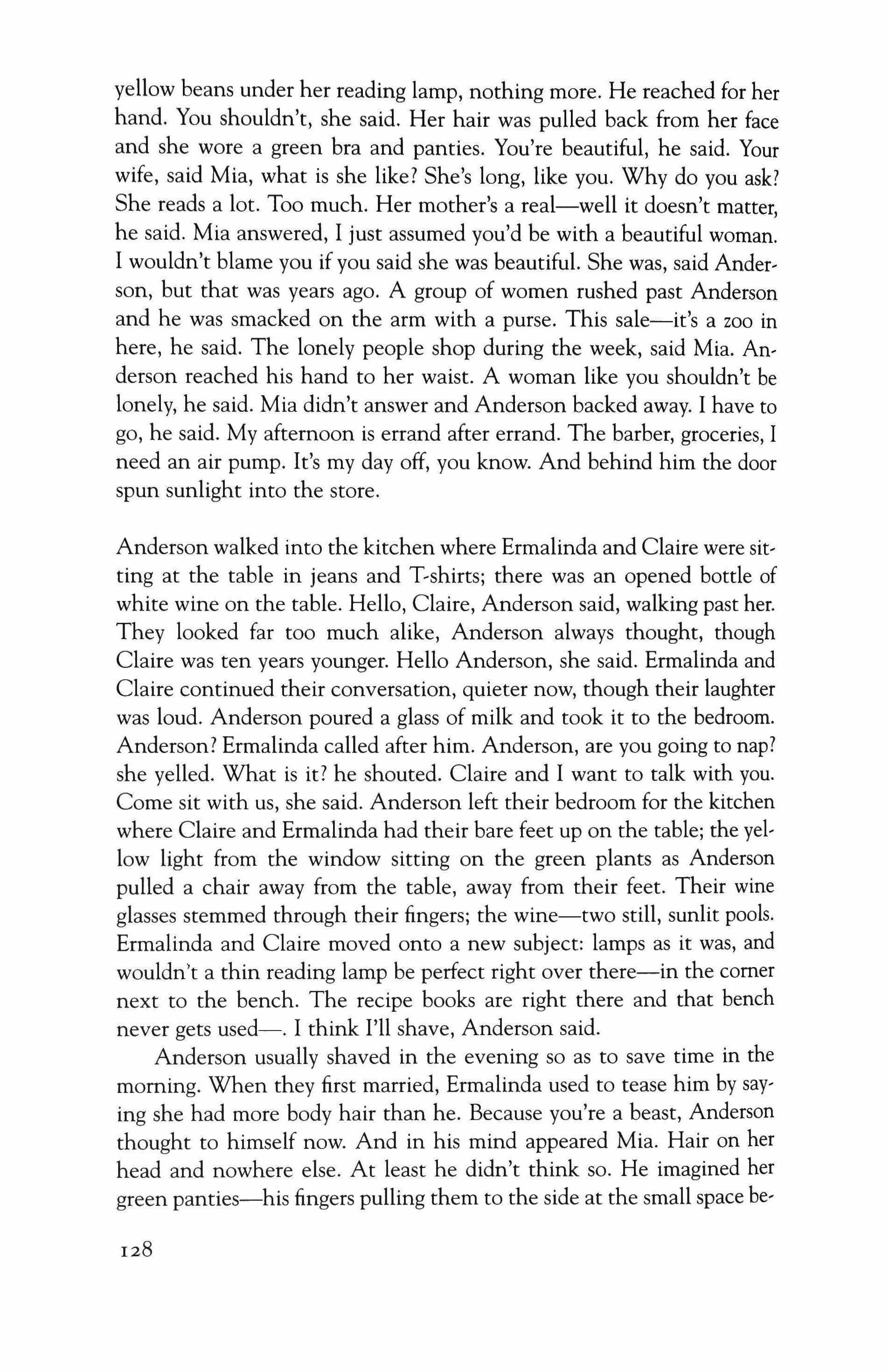
yellow beans under her reading lamp, nothing more. He reached for her hand. You shouldn't, she said. Her hair was pulled back from her face and she wore a green bra and panties. You're beautiful, he said. Your wife, said Mia, what is she like? She's long, like you. Why do you ask? She reads a lot. Too much. Her mother's a real-well it doesn't matter, he said. Mia answered, I just assumed you'd be with a beautiful woman. I wouldn't blame you if you said she was beautiful. She was, said Anderson, but that was years ago. A group of women rushed past Anderson and he was smacked on the arm with a purse. This sale-it's a zoo in here, he said. The lonely people shop during the week, said Mia. Anderson reached his hand to her waist. A woman like you shouldn't be lonely, he said. Mia didn't answer and Anderson backed away. I have to go, he said. My afternoon is errand after errand. The barber, groceries, I need an air pump. It's my day off, you know. And behind him the door spun sunlight into the store.
Anderson walked into the kitchen where Ermalinda and Claire were sitting at the table in jeans and 'Tshirts, there was an opened bottle of white wine on the table. Hello, Claire, Anderson said, walking past her. They looked far too much alike, Anderson always thought, though Claire was ten years younger. Hello Anderson, she said. Ermalinda and Claire continued their conversation, quieter now, though their laughter was loud. Anderson poured a glass of milk and took it to the bedroom. Anderson? Ermalinda called after him. Anderson, are you going to nap? she yelled. What is it? he shouted. Claire and I want to talk with you. Come sit with us, she said. Anderson left their bedroom for the kitchen where Claire and Ermalinda had their bare feet up on the table; the yellow light from the window sitting on the green plants as Anderson pulled a chair away from the table, away from their feet. Their wine glasses stemmed through their fingers; the wine-two still, sunlit pools. Ermalinda and Claire moved onto a new subject: lamps as it was, and wouldn't a thin reading lamp be perfect right over there-in the comer next to the bench. The recipe books are right there and that bench never gets used-. I think I'll shave, Anderson said. Anderson usually shaved in the evening so as to save time in the morning. When they first married, Ermalinda used to tease him by saying she had more body hair than he. Because you're a beast, Anderson thought to himself now. And in his mind appeared Mia. Hair on her head and nowhere else. At least he didn't think so. He imagined her green panties-his fingers pulling them to the side at the small space be-

tween her legs-and he felt himself move closer to the sink though he looked down at his stationary feet. Anderson had an erection, and he locked the door.
Anderson? Ermalinda called through the bathroom door. I'm in the bathroom! he shouted. I know you're in the bathroom, she said. You've been in there a while and I've left my book on the stool by the bathtub. Claire has left and I'm going to read. It's by the bed! he yelled. No, she said, not that one. Well can you wait a minute? he asked. Fine, said Ermalinda, but don't be forever. Anderson stood at the sink with his erection. I won't be forever, he said, and he began to lightly stroke himself. Baby, he said to Mia. Her pouty mouth when he first mentioned Ermalinda. Her bangs. Her Barbie doll hips. And today, looking so pensive, almost regretful in her olive-colored undergarments. Oh Anderson, he could hear her say. He could feel her breasts soften under his touch. Her nipples harden into marbles. And between her legs he felt-Anderson! called Ermalinda. Can't you at least hand it to me? I can't! he said. Go away-just go-I'll be a few-and his voice was sucked from his chest like the escalator steps into the second floor and he exhaled a long, pulsing breath. Minutes, he said lightly. He leaned forward onto the sink, holding himself up with his left hand. Minutes, he whispered again.
The next morning Anderson found Ermalinda in the living room asleep in her reading chair, a book in her hands. He slid the book through her fingers and he almost pushed her hands to her lap, but he didn't want to wake her. He turned and unhooked his bicycle from the wall. He wheeled it into the hallway and walked it down the two flights of stairs, the back wheel bumping behind him, and he rode it to work instead of taking the train. He pedaled fast through the quiet streets of Beacon Hill. He coasted down the slope of the Commons, turning his head to the vendors-Boston 'f-shlrts and sweatshirts hanging from a line like laundry. He saw people reading on park benches and he resumed his pedaling, though he was still riding downhill. Once on Boylston he sprung from the sidewalk onto the street and rode alongside the cars to Copley Square. He weaved around double-parked cars. He thumped the trunk of a taxi when the light turned green. He flipped a man off for turning in front ofhim, when he had the right-of-way, And when he arrived at the department store, sweaty and wrinkled, Julian took his arm. Anderson, he said, what happened? You look like you did somersaults to work. You'll have to buy something from clearance. Come with me. Wiping sweat from his forehead with his forearm, Anderson followed
129
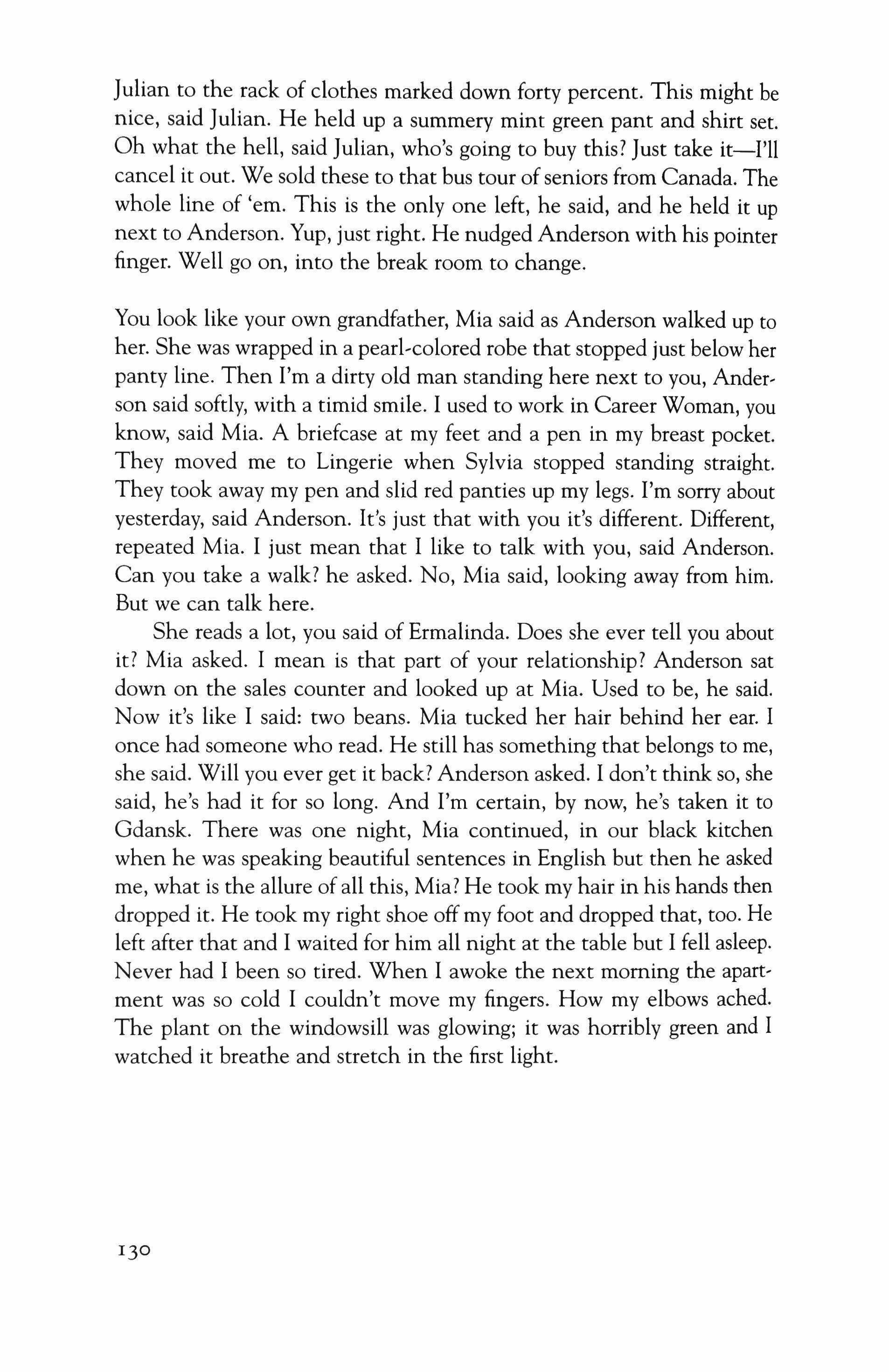
Julian to the rack of clothes marked down forty percent. This might be nice, said Julian. He held up a summery mint green pant and shirt set. Oh what the hell, said Julian, who's going to buy this? Just take it-I'll cancel it out. We sold these to that bus tour of seniors from Canada. The whole line of 'em. This is the only one left, he said, and he held it up next to Anderson. Yup, just right. He nudged Anderson with his pointer finger. Well go on, into the break room to change.
You look like your own grandfather, Mia said as Anderson walked up to her. She was wrapped in a pearl-colored robe that stopped just below her panty line. Then I'm a dirty old man standing here next to you, Anderson said softly, with a timid smile. I used to work in Career Woman, you know, said Mia. A briefcase at my feet and a pen in my breast pocket. They moved me to Lingerie when Sylvia stopped standing straight. They took away my pen and slid red panties up my legs. I'm sorry about yesterday, said Anderson. It's just that with you it's different. Different, repeated Mia. I just mean that I like to talk with you, said Anderson. Can you take a walk? he asked. No, Mia said, looking away from him. But we can talk here.
She reads a lot, you said of Ermalinda. Does she ever tell you about it? Mia asked. I mean is that part of your relationship? Anderson sat down on the sales counter and looked up at Mia. Used to be, he said. Now it's like I said: two beans. Mia tucked her hair behind her ear. I once had someone who read. He still has something that belongs to me, she said. Will you ever get it back? Anderson asked. I don't think so, she said, he's had it for so long. And I'm certain, by now, he's taken it to Gdansk. There was one night, Mia continued, in our black kitchen when he was speaking beautiful sentences in English but then he asked me, what is the allure of all this, Mia? He took my hair in his hands then dropped it. He took my right shoe off my foot and dropped that, too. He left after that and I waited for him all night at the table but I fell asleep. Never had I been so tired. When I awoke the next morning the apartment was so cold I couldn't move my fingers. How my elbows ached. The plant on the windowsill was glowing; it was horribly green and I watched it breathe and stretch in the first light. 13°
Sande Boritz Berger
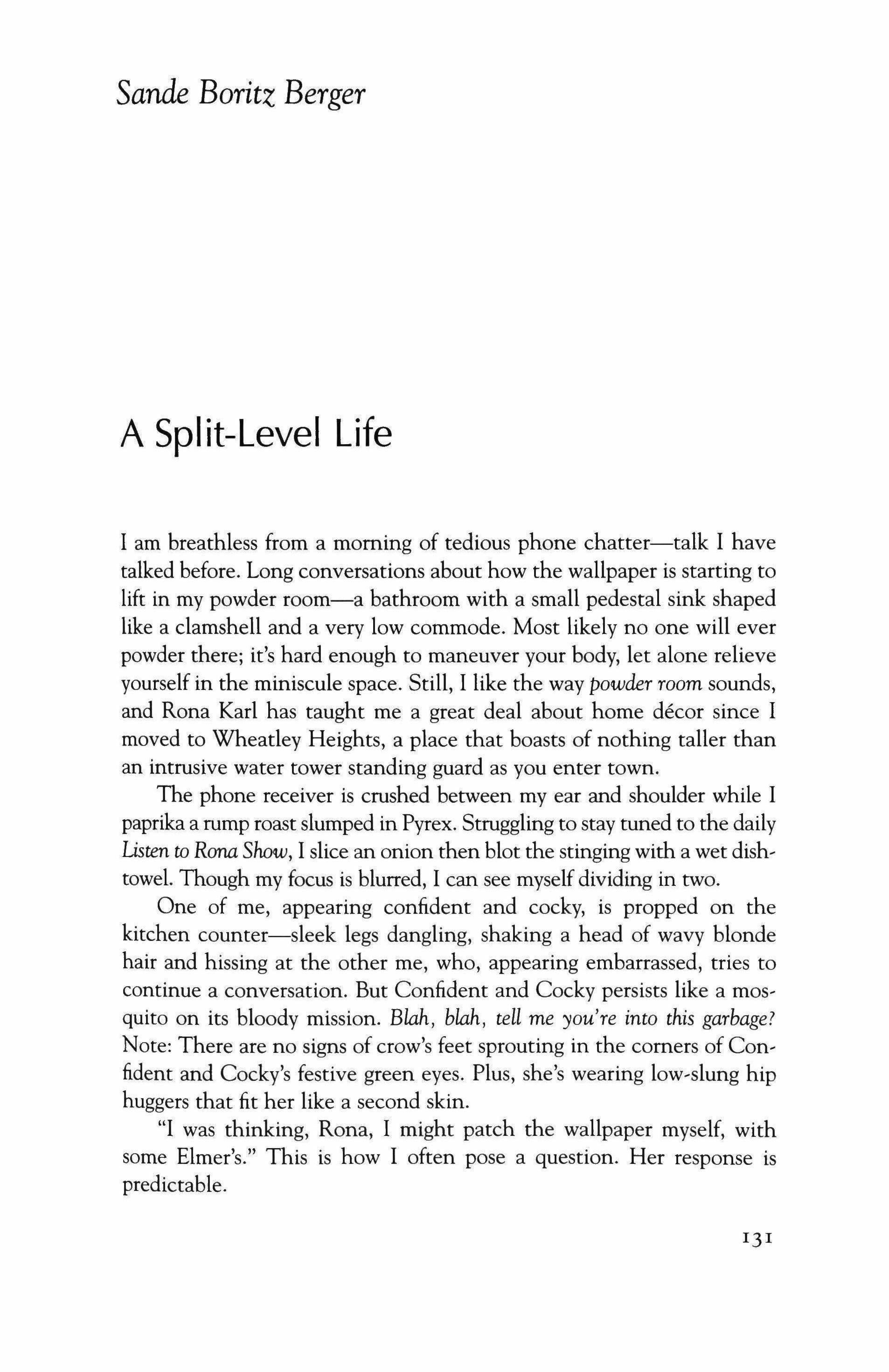
A Split-Level Life
I am breathless from a morning of tedious phone chatter-talk I have talked before. Long conversations about how the wallpaper is starting to lift in my powder room-a bathroom with a small pedestal sink shaped like a clamshell and a very low commode. Most likely no one will ever powder there; it's hard enough to maneuver your body, let alone relieve yourself in the miniscule space. Still, I like the way powder room sounds, and Rona Karl has taught me a great deal about home decor since I moved to Wheatley Heights, a place that boasts of nothing taller than an intrusive water tower standing guard as you enter town.
The phone receiver is crushed between my ear and shoulder while I paprika a rump roast slumped in Pyrex. Struggling to stay tuned to the daily Listen to Rona Show, I slice an onion then blot the stinging with a wet dishtowel. Though my focus is blurred, I can see myselfdividing in two.
One of me, appearing confident and cocky, is propped on the kitchen counter-sleek legs dangling, shaking a head of wavy blonde hair and hissing at the other me, who, appearing embarrassed, tries to continue a conversation. But Confident and Cocky persists like a mosquito on its bloody mission. Blah, blah, tell me you're into this garbage? Note: There are no signs of crow's feet sprouting in the comers of Confident and Cocky's festive green eyes. Plus, she's wearing low-slung hip huggers that fit her like a second skin.
"I was thinking, Rona, I might patch the wallpaper myself, with some Elmer's." This is how I often pose a question. Her response is predictable.
131

"Are you nuts, AL�UX? Do you want to ru-in everything you've done so far?"
"Of course not you know better about these things."
"Hold on a minute," Rona says without curbing her exasperation. I slide the rusty roast into the Magic Chef and slam the oven door. Where is Confident and Cocky when I need her? She was right here a second ago-where'd she go?
Stretching the phone cord to its uncoiled limits, I move to the den and begin dusting the bookshelves. My feather duster is held high like a magic wand. Poofl Make just one wish, Alex. Why is that so hard? There was a time when you had fistfuls of wishes-thought all you needed was the assurance of your beliefs to make them come true.
My shoulder bumps an ancient edition of Monopoly, which sends a slew of cookbooks cascading to the floor. I rearrange the wobbly shelf and rub the grease off the cover of The Fi!teen,Minute Quiche. Above the culinary section sits a shelf dedicated to the fine art of gardening and how I've learned to rescue my roses from the cruelty of mealy bugs and aphids. On the bottom shelf, easily accessible, is a tower of decorating magazines, which have replaced all the fine art books and boast effortless projects like silk flower arranging and chic decorating with sheets.
But shoved in the back of the one skinny drawer of this flimsy teak wall unit, wrapped in a plastic bread bag, is my one little secret-an often-scanned, ear-marked copy of The Sensuous Woman by "J," the only book I own in the category of self-improvement. "J" offers a woman'seye view with detailed information on how to set off fireworks in the bedroom with tantalizing chapters like "The Whipped Cream Wiggle" and "The Butterfly Flick." I'd bought the book soon after Becky's first birthday, not realizing I was already pregnant with Lana. So for now, I'm sticking to decorating with sheets, giving much less thought to what I could be doing on top of them.
"Got a pencil?" Rona's voice blasts through the receiver, and I stuff the book back in its hiding place.
In the kitchen I fumble through the junk drawer. There are sales receipts for items purchased well over a year ago. A blonde Barbie head topples out and lands at my feet. Rona's breathing turns huffy. She has important things to do like removing finger marks from all her wooden railings. Still, I think she enjoys being my personal, household hint hotline, and sharing her bible laden with numbers of suppliers and service people in a ten-mile radius. Plus she never fails to toss out
132
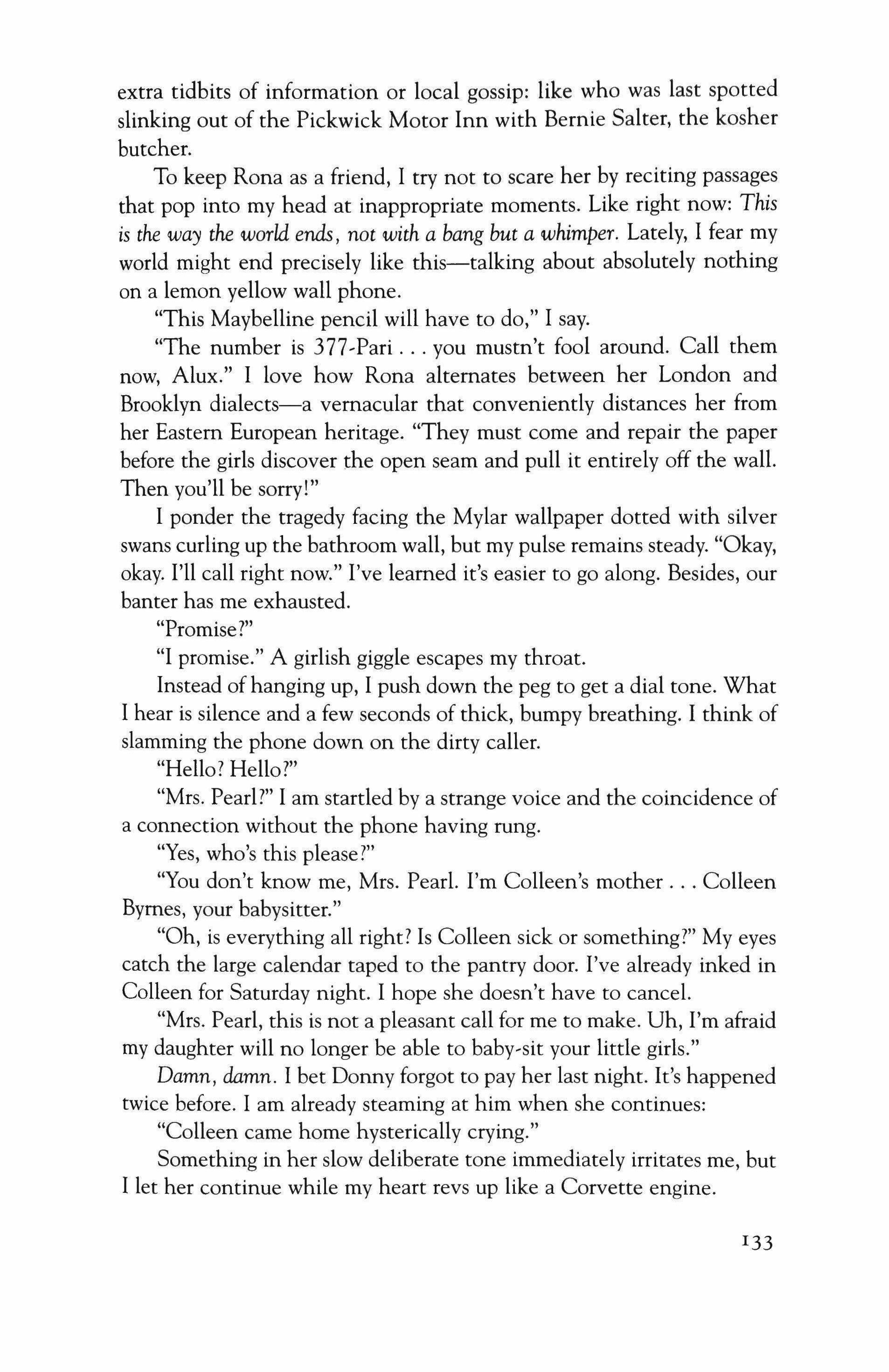
extra tidbits of information or local gossip: like who was last spotted slinking out of the Pickwick Motor Inn with Bernie Salter, the kosher butcher.
To keep Rona as a friend, I try not to scare her by reciting passages that pop into my head at inappropriate moments. Like right now: This is the way the world ends, not with a bang but a whimper. Lately, I fear my world might end precisely like this-talking about absolutely nothing on a lemon yellow wall phone.
"This Maybelline pencil will have to do," I say.
"The number is 377,Pari you mustn't fool around. Call them now, Alux." I love how Rona alternates between her London and Brooklyn dialects-a vernacular that conveniently distances her from her Eastern European heritage. "They must come and repair the paper before the girls discover the open seam and pull it entirely off the wall. Then you'll be sorry!"
I ponder the tragedy facing the Mylar wallpaper dotted with silver swans curling up the bathroom wall, but my pulse remains steady. "Okay, okay. I'll call right now." I've learned it's easier to go along. Besides, our banter has me exhausted.
"Promise?"
"I promise." A girlish giggle escapes my throat. Instead of hanging up, I push down the peg to get a dial tone. What I hear is silence and a few seconds of thick, bumpy breathing. I think of slamming the phone down on the dirty caller.
"Hello? Hello?"
"Mrs. Pearl?" I am startled by a strange voice and the coincidence of a connection without the phone having rung.
"Yes, who's this please?"
"You don't know me, Mrs. Pearl. I'm Colleen's mother Colleen Byrnes, your babysitter."
"Oh, is everything all right? Is Colleen sick or something?" My eyes catch the large calendar taped to the pantry door. I've already inked in Colleen for Saturday night. I hope she doesn't have to cancel.
"Mrs. Pearl, this is not a pleasant call for me to make. Uh, I'm afraid my daughter will no longer be able to baby-sit your little girls."
Damn, damn. I bet Donny forgot to pay her last night. It's happened twice before. I am already steaming at him when she continues:
"Colleen came home hysterically crying."
Something in her slow deliberate tone immediately irritates me, but I let her continue while my heart revs up like a Corvette engine.
133
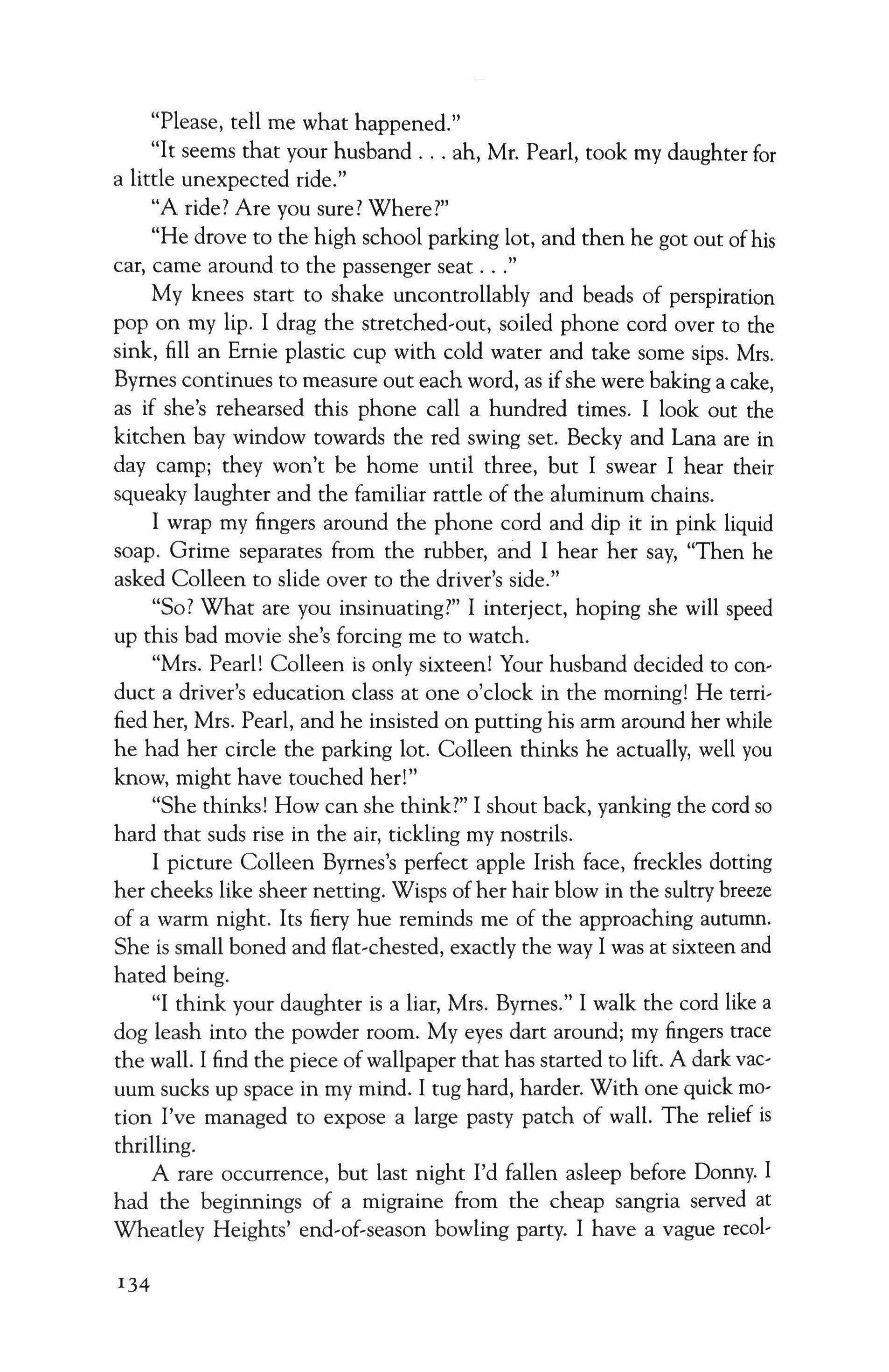
"Please, tell me what happened."
"It seems that your husband ah, Mr. Pearl, took my daughter for a little unexpected ride."
"A ride? Are you sure? Where?"
"He drove to the high school parking lot, and then he got out ofhis car, came around to the passenger seat
My knees start to shake uncontrollably and beads of perspiration pop on my lip. I drag the stretched-out, soiled phone cord over to the sink, fill an Ernie plastic cup with cold water and take some sips. Mrs. Byrnes continues to measure out each word, as ifshe were baking a cake, as if she's rehearsed this phone call a hundred times. I look out the kitchen bay window towards the red swing set. Becky and Lana are in day camp; they won't be home until three, but I swear I hear their squeaky laughter and the familiar rattle of the aluminum chains.
I wrap my fingers around the phone cord and dip it in pink liquid soap. Grime separates from the rubber, and I hear her say, "Then he asked Colleen to slide over to the driver's side."
"So? What are you insinuating?" I interject, hoping she will speed up this bad movie she's forcing me to watch.
"Mrs. Pearl! Colleen is only sixteen! Your husband decided to can' duct a driver's education class at one o'clock in the morning! He terri, fied her, Mrs. Pearl, and he insisted on putting his arm around her while he had her circle the parking lot. Colleen thinks he actually, well you know, might have touched her!"
"She thinks! How can she think?" I shout back, yanking the cord so hard that suds rise in the air, tickling my nostrils.
I picture Colleen Byrnes's perfect apple Irish face, freckles dotting her cheeks like sheer netting. Wisps of her hair blow in the sultry breeze of a warm night. Its fiery hue reminds me of the approaching autumn. She is small boned and flat-chested, exactly the way I was at sixteen and hated being.
"I think your daughter is a liar, Mrs. Byrnes." I walk the cord like a dog leash into the powder room. My eyes dart around; my fingers trace the wall. I find the piece of wallpaper that has started to lift. A dark vacuum sucks up space in my mind. I tug hard, harder. With one quick motion I've managed to expose a large pasty patch of wall. The relief is thrilling.
A rare occurrence, but last night I'd fallen asleep before Donny. I had the beginnings of a migraine from the cheap sangria served at Wheatley Heights' end-of-season bowling party. I have a vague recol-
134

lection of opening my eyes, just once, briefly. Donny was standing beside the bed staring at me.
"What?" I think I said, startled.
"Nothing, I'm sorry," he whispered, "I didn't want to wake you, hon. 00 back to sleep."
I stare blankly at the receiver. "My husband would never do anything like you're describing. I think you should sit your daughter down and make her tell the truth. Why not put her on the phone?" I say evenly, stifling an urge to gag.
"Sorry, but I know my daughter, Mrs. Pearl. She'd never make anything like this up."
"And I know my husband!" I shriek, before slamming the receiver against the wall.
My body is in tremor. I am like a covered soup pot without the vent. The acid from my morning juice rises like a geyser and sears my throat. I gulp down some more water, then with a jumbo sponge, I wipe the already spotless Formica counter, move on to the refrigerator doors, attacking chocolate and ketchup stains. But I can't wipe away the images tattooed inside my skull. They have magnified and reached billboard proportion.
I think of calling Donny to hear his voice and "the woman doesn't know what she's talking about" response. But since Donny works with his parents, there is rarely privacy in our phone conversations. Besides, I'm not in the mood for idle chatter with Donny's mother, even though she is capable of imparting soothing words-some ancient maternal wisdom that might magically allay my fears.
I pace and pace then mop the kitchen floor twice and rest to catch my breath. My red vinyl beach bag is propped on the chair next to me. I empty it upside down and find, among loose change and lollipops, a pink plastic bottle containing a mixture of baby oil and iodine, along with Donny's makeshift sun reflector, a Bee Gees album covered in aluminum foil. Stepping over the mound of white sand I've dumped on the freshly mopped floor, I head for the patio.
Outside, I ease myself onto the burning cushions of a redwood chaise. And within minutes, my shivering stops. The gardeners have come and gone, so I unbutton my blouse to dot my face and chest with the soothing pink oil. Hidden under bright blue goggles, my eyes sting like lemons on an open cut. Hot, salty tears slide down my cheeks and linger on my lip. If Donny were here, I wonder if he'd kiss me and lick my tears the way he did when we were first married. I can see his face; I
135

know he'd be furious I had to listen to Mrs. Byrnes's ridiculous accusations. I bet I'd have to restrain him from going over to Colleen's house, to force her to admit how she made this whole thing up.
The phone rings and I don't budge. I try to block out ghoulish thoughts about the girls: Did they have some catastrophe at camp (get hit in the eye with an airborne rock, choke on a wad of bubble gum while swimming? Or were they kidnapped at gunpoint while their counselors looked on helplessly?) It's probably Rona calling to check whether I've contacted the folks at Parisian Home Decor. If not her, then Donny, asking what's for dinner.
A bumblebee the size of a small passenger jet grazes the tip of my nose. I snap up, fists out, ready to fight. I have no idea how long I've been outside, no conception of time. My face has a mask-like tautness I associate with many summers spent near the beach. Peeling my damp thighs off the cushions, I head back inside. An aroma of burnt onions wafts through the sliding screen door, competing with the fragrant Queen Anne Roses and the freshly mowed grass. I never set the timer and have completely charred the roast I shoved in the oven. Maybe I should serve the black lump to Donny? Hasn't he always preferred his beef well-done? Knowing him he'd most likely laugh, which might steal a grin from me, and now I need to remain dead serious. Until we discuss it, he is the only one I can tell about this phone call. It's tempting to pick up the receiver and dial Rona. If I shared with her, our friendship might move in a whole new direction. But she's more likely to brush the incident off, like she does most things that don't directly concern her. Al-ux, so they took a little ride, don't make such a big deal.
I'm surprised by a distorted reflection in the stainless oven door. Staring back from my own fun-house mirror is a fiery pink Modigliani face. I grab a can of Fresca, press it to my lips and drink, trying to soothe my throat. A large sales slip escapes the refrigerator magnet and soars through the air. It's an order for several shirts that I'm supposed to tiedye, paint and deliver to a local children's boutique before school begins in two weeks. One is for a child named Emily and shows a nearly naked girl running in a field with golden hair cascading down her back.
Hey kid! You call yourself a painter? It's that nag again, inquiring about the five-foot canvas I abandoned a year ago after coating it with primer. Primed for what, I was never quite sure. I take solace when recalling the late-life career of Grandma Moses. Over and over I tell myself: live first, Alex; paint later.
The yellow minibus honks loudly in the driveway, stirring me from

my trance. Pasting a smile on my face, I sprint out the front door to see my Lana, four and a half, cradled in the arms of a young counselor in training. She has fallen asleep on the bus ride home, and her dark brown curls are soaked with perspiration. Becky will be six in September. She dashes into my arms for a lift, circle swing, and hug. I lick her flushed cheek, call her by her pet name-Sweet Vanilla Girl. She is pale blonde and golden in summer, while Lana's skin is dark milk chocolate. Becky's deep blues squint up at me, scrutinizing my face.
"Mommy, are you sad today?" She startles me with her old lady observation.
"No, but I am very, very busy."
"Oh no, what do I smell?" Becky sniffs my hands, looks up at me, wide-eyed.
"I burned tonight's dinner, that's all. Hey, cookie, what's that you're wearing around you neck?
"It's a lanyard for Daddy's keys. We made them in arts and crafts."
"Very nice I'm sure Daddy will love it. Will you teach me?"
"It's pretty hard Mommy, but I'll try."
I take Lana from the counselor's arms and rock her gently. Lana has dolls that weigh more than she does. Her thick brown lashes begin to flutter as she sucks on her two middle fingers. When I tickle her, I see her little smirk, but she pretends to be asleep. She is a bundle of energy, a born actress named after my father's mother, who lived long enough to bury three adoring husbands. I play along and carry her into the house while Becky runs ahead and holds open the door. "Heavy, heavy sack of potatoes," I tease.
When I plop Lana on the den couch, she does a deliberate flip onto the shag carpeting, then jumps to her feet, wide awake with out' stretched arms.
"Mommy, hug!"
Usually I'd wait for Donny to help get the girls bathed, but I need this time alone with them to quiet the engine roaring inside my head. After a snack of crackers, I usher Becky and Lana up the stairs and follow them collecting dirty socks and panties they drop on the way to the bathroom hamper. Standing on either side of my crouched body, they rival two naked cherubs out of an ancient fresco. I pour bubble bath under the spigot, and Lana squeals as bubbles escape in the air. She is already in the tub splashing, while Becky cautiously holds my arm until her legs are firmly planted in the tub.
After a few cries of dread, they each press a washcloth to their eyes
137

while I swiftly pour lukewarm water over their locks, rinsing out shampoo. I wrap them in one large beach towel and they collide, giggling as I inhale the phenomenon of their scent.
At precisely five o'clock, Fred Rogers's hypnotic voice fills our large, rustic den. Lana and Becky sit squeezed together, holding hands on Donny's faux leather recliner. Mesmerized by the hospitable gentleman inviting them on his daily journey, their tiny pink tongues poke out and lick the dryness from their lips, and my heart aches with tenderness. Look, Nana, these are your great�granddaughters. Becky's named for you. She has your long, beautiful fingers and silken hair. I have always maintained an open line to my maternal grandmother, who disappointed me only once, by dying.
The automatic garage door rumbles, and I swallow hard. This, the only sound the girls hear over the clanging of the trolley in Mr. Rogers' neighborhood.
"Daddy's home," Lana announces before returning her fingers to her mouth.
I hear the familiar heavy shuffle of Donny's feet as he walks through the doorway that connects our garage to the den. His full, wiry brows are knit together and his shoulders are hunched up to his ears, hinting he's had one rough day at the factory. Donny is no longer the aspiring tax lawyer his father once bragged about. Since his father put him in charge of a brand new division at H. Pearl and Sons, he is an employee, capable of screwing up like all the others.
I cower behind the dining room wall like a cat that's been shooed away from the table. Donny makes a pit stop into the powder room. I listen to his long, never ending stream. He's left the door wide open, and I refrain from scolding. But as soon as he charges into the den and lifts Becky and Lana to give them rough nuzzles on their necks, I rush forward and tug at his shirt-sleeve. I've never done this before. In fact, watching Donny with the girls has always filled me with immense pleasure, but now I need him separate-no delicate and fragile props like our children.
"Hi," he says, his kiss missing my cheek as I pull back and stiffen. "What's up? Okay, what did you bum?" He follows me into the kitchen, glancing at a few bills on the table and the blackened Pyrex soaking in the sink. He shoots a sympathetic grin. "I can pick up Chinese?"
"I'm not hungry. I want to talk. Let's go sit in the living room."
Becky and Lana, having abandoned their Swiss and baloney sandwiches, are slurping chocolate milk through striped straws. Their rapt attention is on Mr. Rogers, who has just zipped up his beige cardigan.

Donny's concern is woven with impatience. He passes our white spinet piano and lingers, hits a C chord, like in a television drama. Looking at his watch he plops down on the loveseat right beside me. I wait while he removes his lenses. Here comes the ritual of rubbing his eyes. If only he could see me now, really see me; but without his "eyes" he's close to legally blind. He hasn't noticed my sunburn or the mascara streaked beneath my lashes making me look like a baby raccoon.
"Shoot," he says.
"I got a call this morning from Mrs. Byrnes." He looks blank.
"Who's that?"
"She's the mother of Colleen our sitter, remember, Don?" My voice cracks. I take a deep breath and rally to regain my composure. Donny leans forward, resting his elbows on his knees. He pushes his glossy auburn hair back with his hands, and I see his smooth profile, how uniquely handsome he is-how any young teenage girl might confuse his intentions. But, having said her name again, I am trembling. Donny slides over and kneads my shoulder. I can't, won't look in his eyes. In, stead, I stare at a pulled loop in the area rug, praying Becky and Lana stay put in the den.
"Mrs. Byrnes said you took Colleen to the high school parking lot late last night. Why didn't you take her straight home? What the hell were you thinking?"
Donny is mute, which only frightens me more. I wish he'd say some, thing, anything. When I turn and look at him, he appears filmy through my tears. He is still in profile. His jaw, once hidden by his goatee, sets firmly, and juts forward.
"I thought Mrs. Byrnes was lying, Donny. I screamed and hung up on her. She wasn't lying, was she? Was she?" Donny's face is bloated as if it's about to explode. I yank away from his firm hold, but he grabs me and presses me hard against his chest. "Please tell me why." I am talking into his work,shirt and taking in the dizzying aroma of sewing machine grease.
"I don't know, Alex," he says somberly. "It was nothing, really. The kid said she was afraid to drive. I told her it was a snap. All I did was ask if she wanted to try. She said yes. Alex, we were in the parking lot for ten minutes at the most."
I try to wiggle away again, afraid that I'll scratch out Donny's beau, tiful hazel eyes. He holds me tighter as if to say, Yes, do it if it'll make you feel better. Hurt me back. Slowly, I begin to picture the stupidity, even find innocence in Donny's act-that childish need of his to feel
139
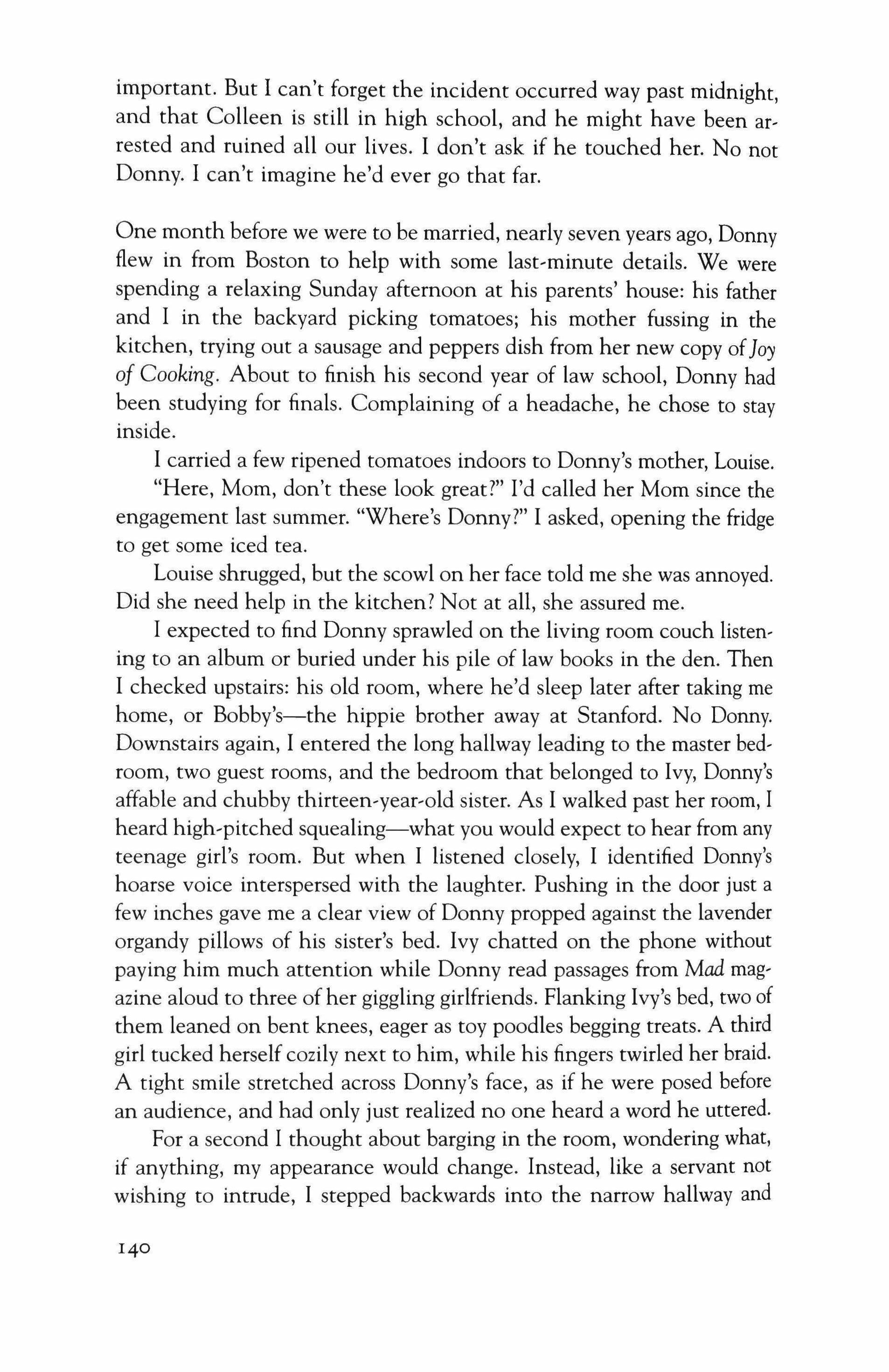
important. But I can't forget the incident occurred way past midnight, and that Colleen is still in high school, and he might have been arrested and ruined all our lives. I don't ask if he touched her. No not Donny. I can't imagine he'd ever go that far.
One month before we were to be married, nearly seven years ago, Donny flew in from Boston to help with some last-minute details. We were spending a relaxing Sunday afternoon at his parents' house: his father and I in the backyard picking tomatoes; his mother fussing in the kitchen, trying out a sausage and peppers dish from her new copy ofJoy of Cooking. About to finish his second year of law school, Donny had been studying for finals. Complaining of a headache, he chose to stay inside.
I carried a few ripened tomatoes indoors to Donny's mother, Louise. "Here, Mom, don't these look great?" I'd called her Mom since the engagement last summer. "Where's Donny?" I asked, opening the fridge to get some iced tea.
Louise shrugged, but the scowl on her face told me she was annoyed. Did she need help in the kitchen? Not at all, she assured me.
I expected to find Donny sprawled on the living room couch listening to an album or buried under his pile of law books in the den. Then I checked upstairs: his old room, where he'd sleep later after taking me home, or Bobby's-the hippie brother away at Stanford. No Donny. Downstairs again, I entered the long hallway leading to the master bedroom, two guest rooms, and the bedroom that belonged to Ivy, Donny's affable and chubby thirteen-year-old sister. As I walked past her room, I heard high-pitched squealing-what you would expect to hear from any teenage girl's room. But when I listened closely, I identified Donny's hoarse voice interspersed with the laughter. Pushing in the door just a few inches gave me a clear view of Donny propped against the lavender organdy pillows of his sister's bed. Ivy chatted on the phone without paying him much attention while Donny read passages from Mad magazine aloud to three of her giggling girlfriends. Flanking Ivy's bed, two of them leaned on bent knees, eager as toy poodles begging treats. A third girl tucked herself cozily next to him, while his fingers twirled her braid. A tight smile stretched across Donny's face, as if he were posed before an audience, and had only just realized no one heard a word he uttered. For a second I thought about barging in the room, wondering what, if anything, my appearance would change. Instead, like a servant not wishing to intrude, I stepped backwards into the narrow hallway and

quietly shut the door. I was embarrassed for Donny, but mostly for mea stranger, roaming around the house of people I hardly knew. I didn't know where to put myself or where, if anywhere, I belonged.
Colleen's lovely face appears once again, and I tear myself from Donny's grip. He trails me to the kitchen and hands me the Kleenex box from the top of the fridge. Becky and Lana have taken off their bathrobes; they are rolling around the shag carpet, gathering orange fuzz balls in their damp hair and buttocks. Donny bites the inside of his cheek, waiting for my reaction. They are adorable and funny, but how can I laugh? There's nothing he can say to make me feel better.
I begin to wonder if maybe, without knowing it, Colleen lured Donny into taking her to the parking lot. Later she was overcome with guilt and decided she could never look me in the face again-so it was easier to twist the truth and fling this fanciful muddle on to Donny. The tightness in my chest loosens up and I get busy. Busy always helps.
While I settle the girls upstairs, Donny scrambles some onions and eggs-soothing, easy-to-go-down food. We don't talk much; I have only one word answers and grunts. I take bird-like nibbles from my plate while the Moody Blues sing "Nights in White Satin." It's a little before eight, still light. There is a hint of autumn in the air, the slightest smell of ragweed. I sneeze loudly surprising us both. "God bless," Donny says, and I nod a thanks, thinking how sometimes civility restores normalcy. I carry my coffee mug outside to the patio and sit down. Donny stands while he lights up a joint. We both stare at the purple marble sky. He passes the joint to me; I hesitate but take a tiny drag.
"Hold it in," he says, coaching me as usual. I guess he hopes getting me stoned will tuck my angry thoughts away.
"Enough, take the stupid thing." I blow the smoke out, but it's already burned my nasal passages.
"Are you okay?" he asks, watching me recover. "AI, I meant to ask, what happened to the paper in the bathroom?" I watch him take a long, deep drag.
"The adhesive dried out. They're coming back to repair it." I only just realize I never got to make the call.
Donny shoots me his best piercing look: head cocked and eyes big as puddles. Is he waiting for me to crack wide-open, ooze like a farm fresh egg? I remember when I first took a shot at trusting him: how I'd offered my smooth upturned hand like an anxious child, hoping for candy. He leans forward in the cold metal chair, and I put out my hand,

automatically, like I am accepting his invitation to dance. Standing, he takes it in his, pulling me to my feet. His breath is soft and smoky against my ear.
"D D d amn you, onny, amn you.
"I'm sorry honey, so sorry." His arms move up and down my hips while he kisses my face. Nervous, I look up to notice the sporadic dance of lights in all the surrounding houses. I hear the screen door right nextdoor open then close. There are people, people I hardly know, just yards away from us beyond the woven fence and the aphid-free roses. I smell the rich perfume of perennials, the charring of well-priced filets. Good fences make good neighbors. My mind has become a cafeteria serving up stored one-liners.
Donny takes the kitchen phone off the hook and tosses it in the junk drawer. Smiling, he leads me to the powder room and locks the door behind us. I am braced against the wall, exactly where I'd yanked the section of silver wallpaper. He presses against me, his thin yet dexterous fingers moving up and down my body as if I were a keyboard-a place to feel at home. My arms reach for him, helping while he quickly unzips his jeans, and before I change my mind. This is the first time in months Donny's been this excited, pulsing and hard. I give him all the control he wants.
I balance one leg on the dwarf size commode while Donny pushes himself deep inside me. Like always, it hurts for only a second. Relax, relax. My fingers grasp and glide through the oily darkness of his hair. And I am certain this is all I want, what I have always wanted.
Jonathan David
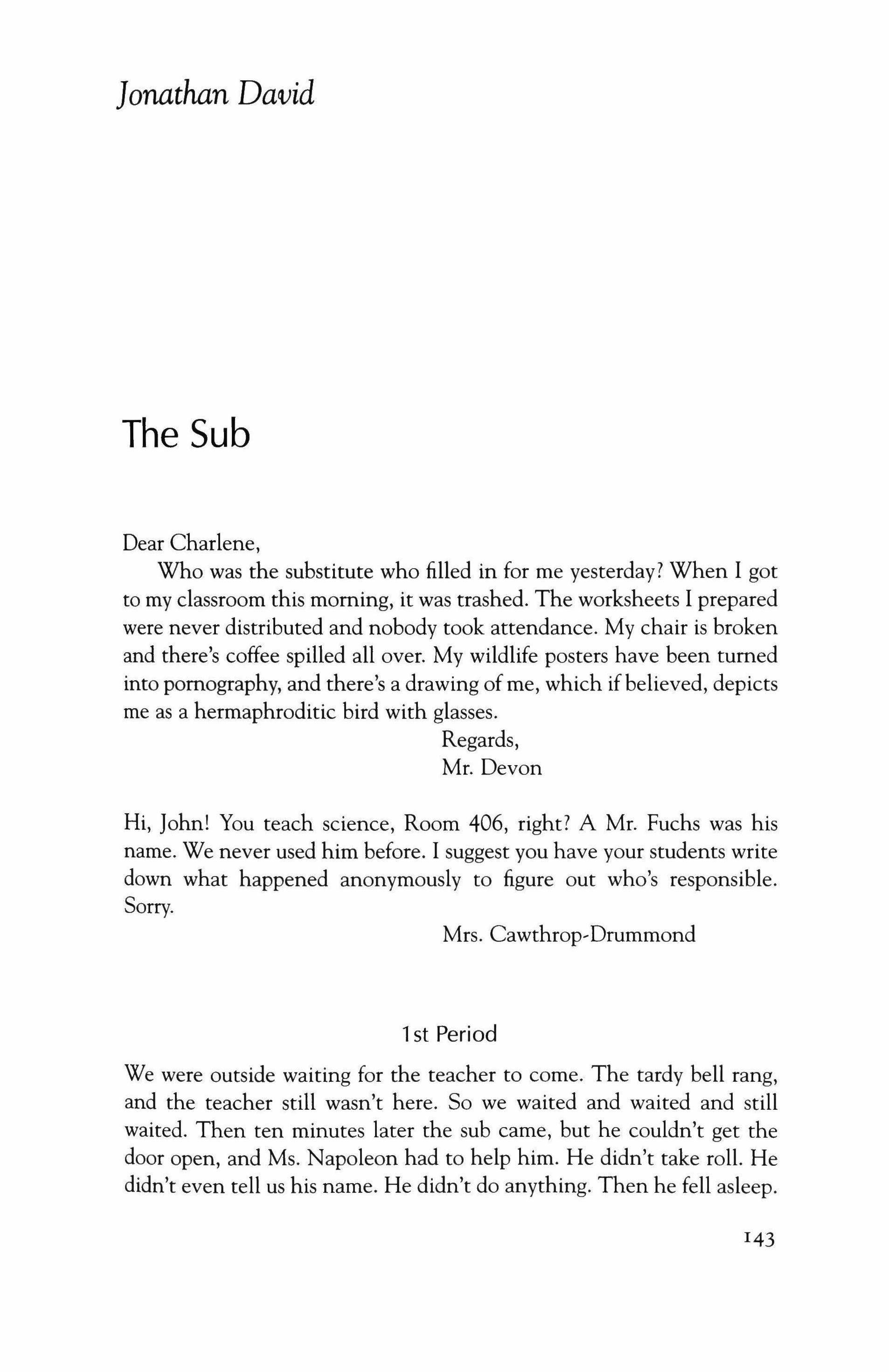
The Sub
Dear Charlene,
Who was the substitute who filled in for me yesterday? When I got to my classroom this morning, it was trashed. The worksheets I prepared were never distributed and nobody took attendance. My chair is broken and there's coffee spilled all over. My wildlife posters have been turned into pornography, and there's a drawing of me, which ifbelieved, depicts me as a hermaphroditic bird with glasses.
Regards,
Mr. Devon
Hi, John! You teach science, Room 406, right? A Mr. Fuchs was his name. We never used him before. I suggest you have your students write down what happened anonymously to figure out who's responsible. Sorry.
Mrs. Cawthrop-Drummond
1 st Period
We were outside waiting for the teacher to come. The tardy bell rang, and the teacher still wasn't here. So we waited and waited and still waited. Then ten minutes later the sub came, but he couldn't get the door open, and Ms. Napoleon had to help him. He didn't take roll. He didn't even tell us his name. He didn't do anything. Then he fell asleep.
143
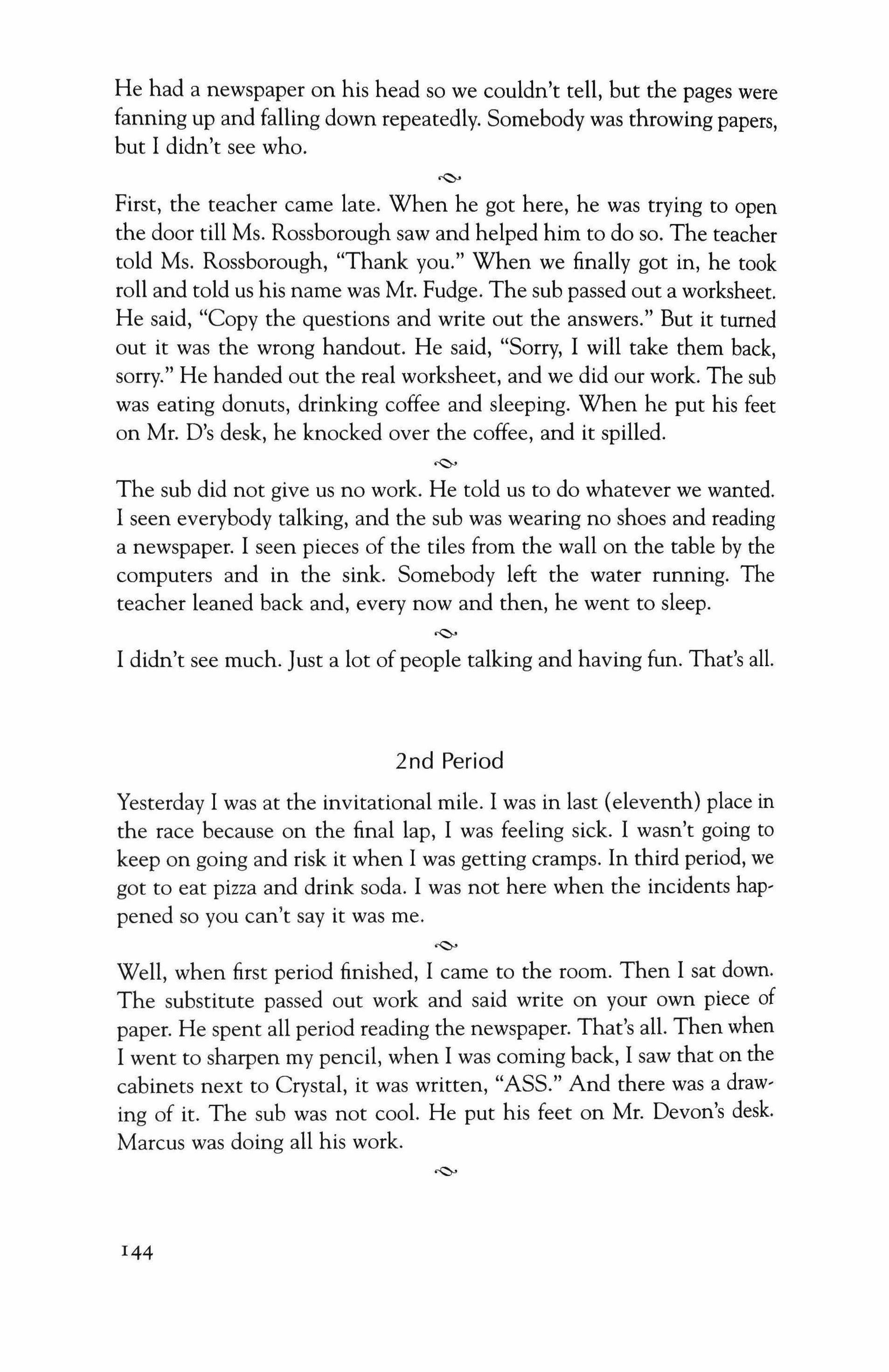
He had a newspaper on his head so we couldn't tell, but the pages were fanning up and falling down repeatedly. Somebody was throwing papers, but I didn't see who.
�
First, the teacher came late. When he got here, he was trying to open the door till Ms. Rossborough saw and helped him to do so. The teacher told Ms. Rossborough, "Thank you." When we finally got in, he took roll and told us his name was Mr. Fudge. The sub passed out a worksheet. He said, "Copy the questions and write out the answers." But it turned out it was the wrong handout. He said, "Sorry, I will take them back, sorry." He handed out the real worksheet, and we did our work. The sub was eating donuts, drinking coffee and sleeping. When he put his feet on Mr. D's desk, he knocked over the coffee, and it spilled.
�
The sub did not give us no work. He told us to do whatever we wanted. I seen everybody talking, and the sub was wearing no shoes and reading a newspaper. I seen pieces of the tiles from the wall on the table by the computers and in the sink. Somebody left the water running. The teacher leaned back and, every now and then, he went to sleep.
�
I didn't see much. Just a lot of people talking and having fun. That's all.
2nd Period
Yesterday I was at the invitational mile. I was in last (eleventh) place in the race because on the final lap, I was feeling sick. I wasn't going to keep on going and risk it when I was getting cramps. In third period, we got to eat pizza and drink soda. I was not here when the incidents happened so you can't say it was me.
�
Well, when first period finished, I came to the room. Then I sat down. The substitute passed out work and said write on your own piece of paper. He spent all period reading the newspaper. That's all. Then when I went to sharpen my pencil, when I was coming back, I saw that on the cabinets next to Crystal, it was written, "ASS." And there was a drawing of it. The sub was not cool. He put his feet on Mr. Devon's desk. Marcus was doing all his work.
144

Kids were eating candies and dropping wrappers. In Chichi, students are very nice and respect their teachers. Where I come from, there's mountains and fog. The cofradias have procesion every Sunday. Mami says they put me in this ESL class because I'm from Guatemala, not Mexico and they think they're better than us. We had no computers in school like here, but yesterday, they tilted the monitors and destroyed the keyboards. Some people! Arlan and Vladimir even rearranged the buttons to say bad things. (It said SHIT HOLE.) Tony talked uncontrollably.
�
A lot of things happened when the sub was here. One of the things that happened was that everybody was talking. No one was reading. Another thing that happened was that the sub only paid attention to the newspaper. Not the class. Another thing was that all the stuff was taken off the walls and boards and the tables were written on with pencil. Another thing was everyone said Yervand was in love with Esmeralda, and he turned red.
3rd Period
It was to me that as soon as I got into the room, I sat down in my chair and began to do my work. Everyone was in different seats except me. When I looked at the wall, there was writing that said, "Miss Devon." Not to be bad, but that is what it said. Then the bell rang, and the sub didn't collect the worksheets.
�
What I saw when the sub was here was nothing. The whole day was very boring. Diego did happen to fart. The teacher chewed gum real loud and didn't close his mouth. The noise was irritating. Everybody was talking about how Daisy Brios likes to wear sexy spaghetti shirts and little red shorts and how mean she was to Yervand when they dated and how she wears too much makeup.
�
The computer desk was tilted a little to the right of the wall, and there was tagging all over the posters, desks and walls when we got in. There were pen caps and bits of paper all over the floors and desks. The sub never yelled or had to send anyone out of class. He was very nice.
�
145
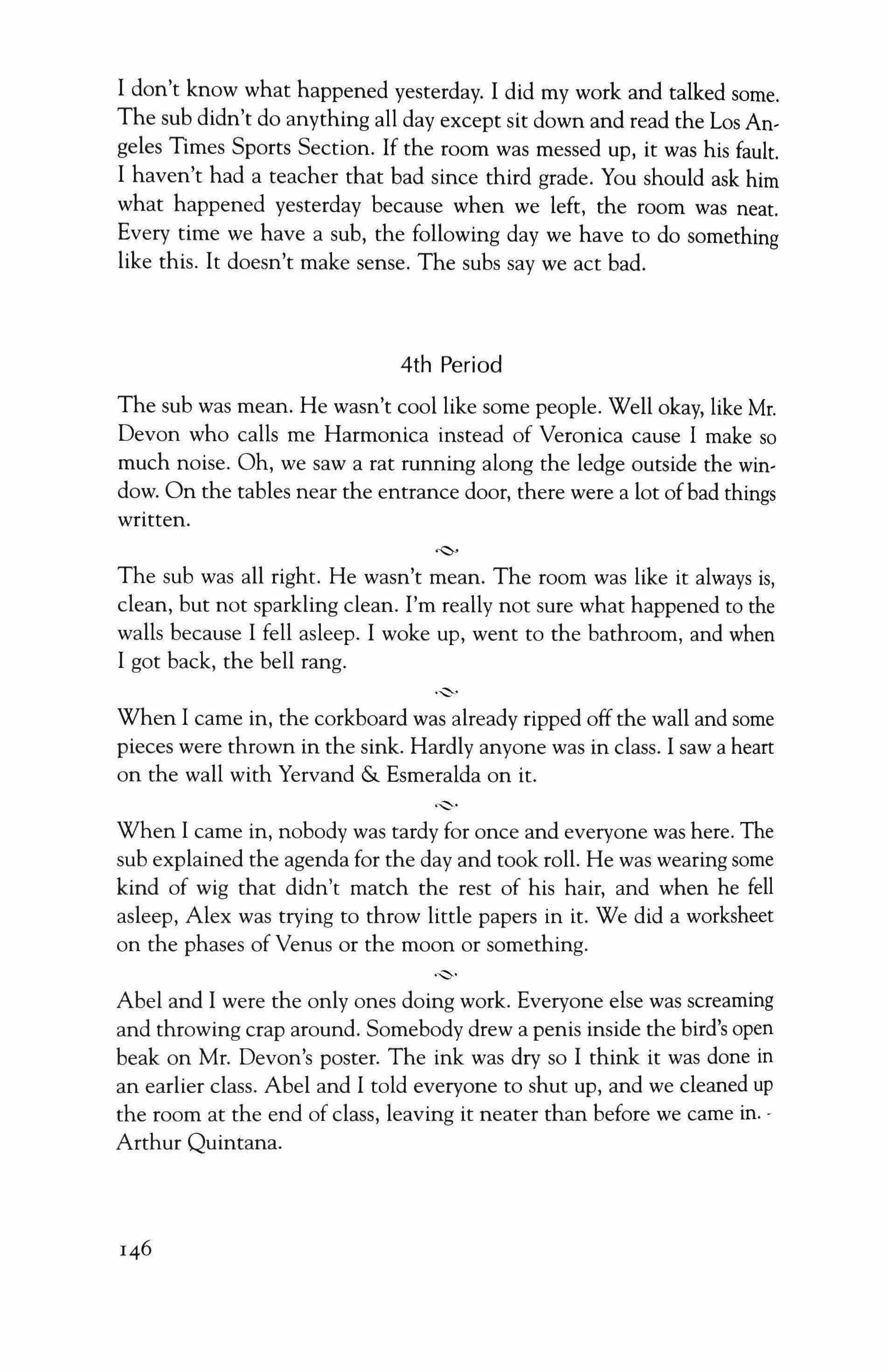
I don't know what happened yesterday. I did my work and talked some. The sub didn't do anything all day except sit down and read the Los Angeles Times Sports Section. If the room was messed up, it was his fault. I haven't had a teacher that bad since third grade. You should ask him what happened yesterday because when we left, the room was neat. Every time we have a sub, the following day we have to do something like this. It doesn't make sense. The subs say we act bad.
4th Period
The sub was mean. He wasn't cool like some people. Well okay, like Mr. Devon who calls me Harmonica instead of Veronica cause I make so much noise. Oh, we saw a rat running along the ledge outside the window. On the tables near the entrance door, there were a lot ofbad things written. �
The sub was all right. He wasn't mean. The room was like it always is, clean, but not sparkling clean. I'm really not sure what happened to the walls because I fell asleep. I woke up, went to the bathroom, and when I got back, the bell rang.
When I came in, the corkboard was already ripped offthe wall and some pieces were thrown in the sink. Hardly anyone was in class. I saw a heart on the wall with Yervand & Esmeralda on it
When I came in, nobody was tardy for once and everyone was here. The sub explained the agenda for the day and took roll. He was wearing some kind of wig that didn't match the rest of his hair, and when he fell asleep, Alex was trying to throw little papers in it. We did a worksheet on the phases of Venus or the moon or something.
Abel and I were the only ones doing work. Everyone else was screaming and throwing crap around. Somebody drew a penis inside the bird's open beak on Mr. Devon's poster. The ink was dry so I think it was done in an earlier class. Abel and I told everyone to shut up, and we cleaned up the room at the end of class, leaving it neater than before we came in.Arthur Quintana.
�-.
'V'

5th Period
Everyone was doing their work, but the sub was making a lot of noise with his CD player. We had to tell him numerous times to turn it down. Then he screamed, "Your teacher's not here; so, I'm the boss." He did tum it down, though and then he went to sleep. So, later we told him, "Maybe you should teach us something because we want to learn."
-e-
Tomas saw a roach crawling under his desk. He went all freaky-deekv and smashed it with his pimp high-tops. I was like, "Homeslice, calm down." Then after it was dead, I pulled the legs off it and shit. My mother says I'm sick because I throw rocks at dead cats and squirrels on the street. Do you think that's messed up? I mean they're already dead. If I was dead and somebody threw rocks at me, what would it matter?
�
I don't know who the hell drew on the posters. Anyway, if we did do something bad, the sub wasn't gonna know who the hell did it. But me, "Daisy," was behaving good like a smart girl. All I know is that I can't wait to get the f*** out of here cause I do not like this class.
�
Daisy was saying Esmeralda better stay away from Yervand. Her lips kind of twisted as she spoke. "Or else baby." She clapped her hands once sharply and said. "I'll wipe her out." I sawall the posters were messed up, and people drew breasts and bad things on the birds, polar bears and fish.
�
I think the class behaved better yesterday than it has all year. It was quiet most of the time, and the sub just slept. Even Monserrat behaved which was really weird on her part. I have no idea about the tiles being pulled off the wall. To be honest, I never even knew there were tiles up there to begin with since I hardly ever look in that direction.
The sub made us all line up after the bell rang. Then he took out his wiener and asked Daisy to suck it. And she did. It looked like a purple enchilada. We all had to suck it. I think I'm hiv, My parents are gonna sue.
�
Once upon a time there was a teacher named Mr. Devon. He wore nice ties, dress pants and shirts with collars. He was an honest person who
147

was having problems with some of his classes. Yesterday he had a sub, and one of these problem classes destroyed the room. To resolve this, he could give referrals to the students who behaved badly. Or he could change some students to other classes or schools. His classes were in a school that could be mistaken for a prison.
6th Period
The sub was short and fat because he eats too many hamburgers. I've seen him at Lucky Boy, and he had a big bag from there that had clearish spots from grease on it. He gave us a worksheet, and we sat wherever we wanted. I sat next to Kenia, and I never did finish that worksheet. We were talking about how Esmeralda gave Daisy a black eye after school yesterday when Miss Daisy was all up in her face and how Daisy tried to hide it with all her makeup today.
�
All I saw was at the end of class when the bell rang was one student-I'm not saying who cause I don't want him to beat me up after school-who pulled the toupee off the sub's head. He had bald patches underneath and short white hair. The kid threw the wig on top of the TV.
�
What the sub did was he just read his newspaper, took off his shoes and put them on the desk and you could see his toes because there were holes in his socks. Esmeralda said she loved Yervand, and that it was the pull your hair out kind of love and not the not pull your hair out kind of love. All the corkboard tiles were off the wall except for one. I didn't think it mattered.
�
I sat next to Ashley who has a pretty smile, but only because she got braces. That's why her smile looks nice and honest. I kind of like that about her, but not really. Ms. Bledsoe's class sucks. Every day she looks at my homework, shakes her head and says, "Bless these childrens." I hate her. She thinks I'm not that bright in algebra. Which basically is so true. This is my favorite class. In this class I sit with my girls who are Rocio, ]azmin, Ashley and Esmeralda and two other girls who sit there. I have no clue who they are. I don't know what happened yesterday when the sub was here.

Dear Charlene,
Forget about yesterday. Could somebody corne to fix my broken chair? I have no place to sit.
Regards, Mr. Devon
Hi, John! The people who repair the chairs were let go a few years ago. We can't fix yours because if it breaks again when you're sitting in it, you could sue the District. I'll send a student chair over for you. Sorry.
Mrs. Cawthrop-Drurnmond
149
Molly McQuade
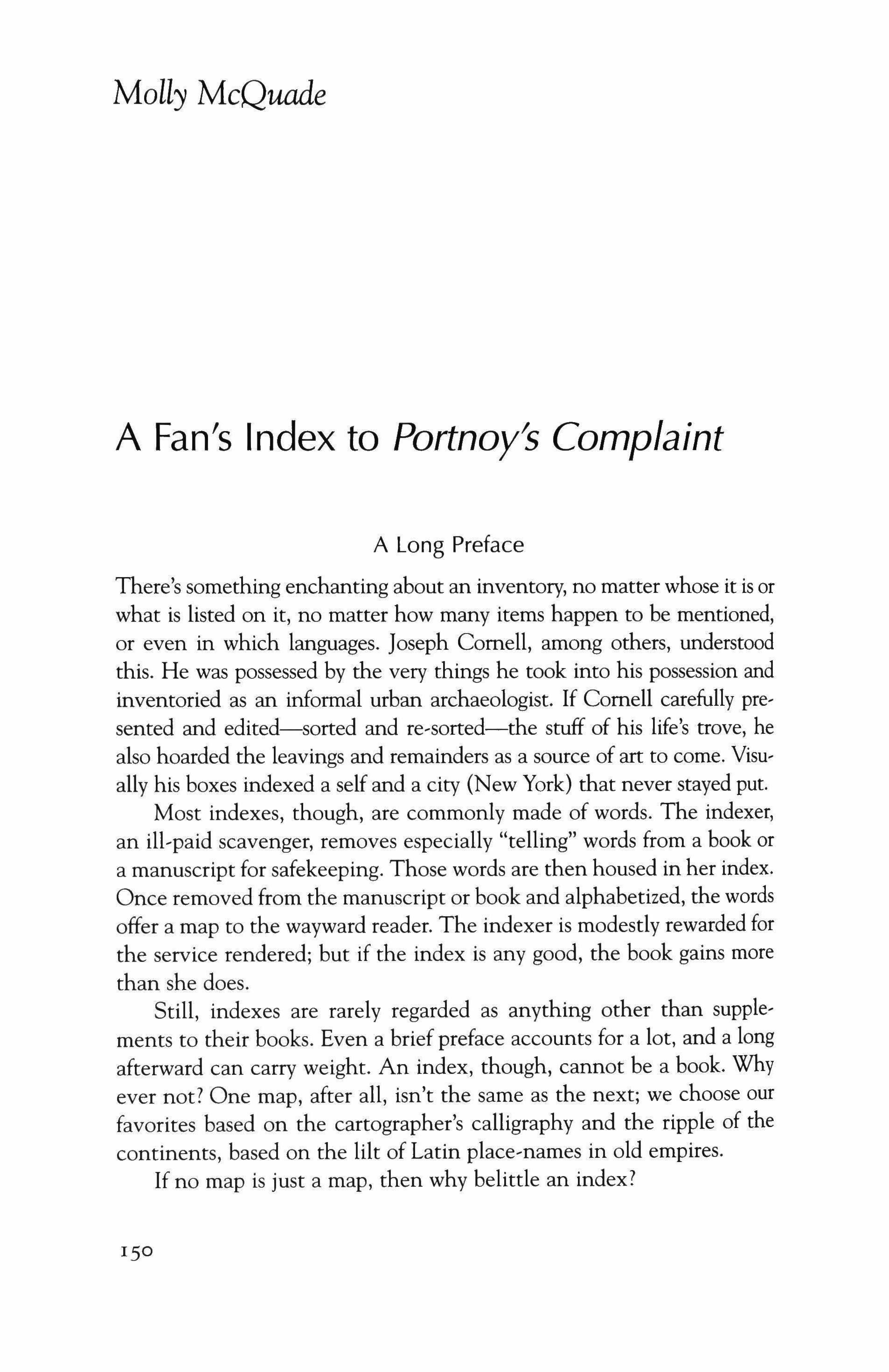
A Fan's Index to Portnoy's Complaint
A Long Preface
There's something enchanting about an inventory, no matter whose it is or what is listed on it, no matter how many items happen to be mentioned, or even in which languages. Joseph Cornell, among others, understood this. He was possessed by the very things he took into his possession and inventoried as an informal urban archaeologist. If Cornell carefully presented and edited-sorted and re-sorted-the stuff of his life's trove, he also hoarded the leavings and remainders as a source of art to come. Visually his boxes indexed a self and a city (New York) that never stayed put.
Most indexes, though, are commonly made of words. The indexer, an ill-paid scavenger, removes especially "telling" words from a book or a manuscript for safekeeping. Those words are then housed in her index. Once removed from the manuscript or book and alphabetized, the words offer a map to the wayward reader. The indexer is modestly rewarded for the service rendered; but if the index is any good, the book gains more than she does.
Still, indexes are rarely regarded as anything other than supplements to their books. Even a brief preface accounts for a lot, and a long afterward can carry weight. An index, though, cannot be a book. Why ever not? One map, after all, isn't the same as the next; we choose our favorites based on the cartographer's calligraphy and the ripple of the continents, based on the lilt of Latin place-names in old empires.
If no map is just a map, then why belittle an index?
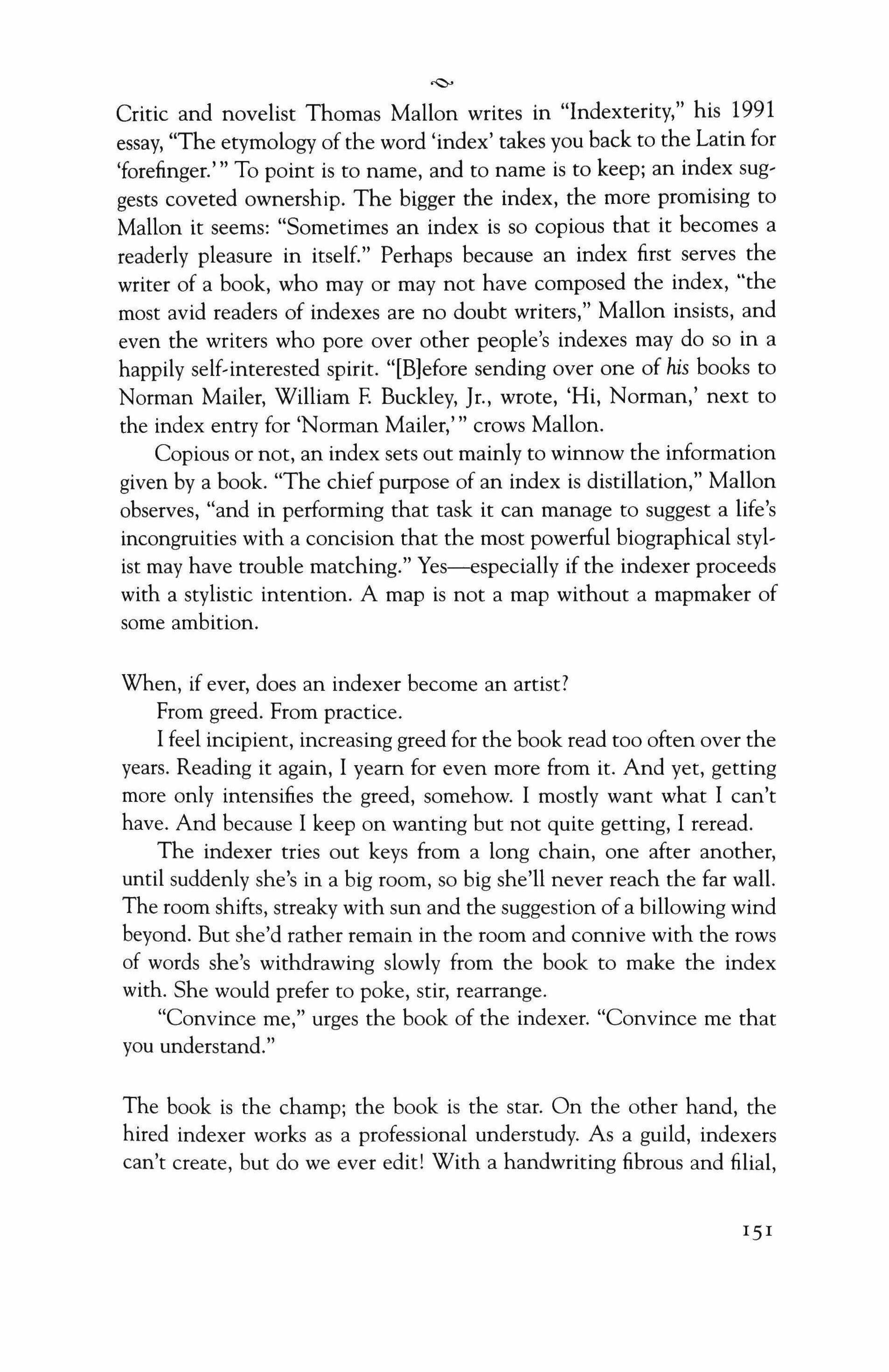
Critic and novelist Thomas Mallon writes in "Indexterity," his 1991 essay, "The etymology of the word 'index' takes you back to the Latin for 'forefinger.''' To point is to name, and to name is to keep; an index suggests coveted ownership. The bigger the index, the more promising to Mallon it seems: "Sometimes an index is so copious that it becomes a readerly pleasure in itself." Perhaps because an index first serves the writer of a book, who mayor may not have composed the index, "the most avid readers of indexes are no doubt writers," Mallon insists, and even the writers who pore over other people's indexes may do so in a happily self,interested spirit. "[B]efore sending over one of his books to Norman Mailer, William F. Buckley, [r., wrote, 'Hi, Norman,' next to the index entry for 'Norman Mailer,'" crows Mallon.
Copious or not, an index sets out mainly to winnow the information given by a book. "The chief purpose of an index is distillation," Mallon observes, "and in performing that task it can manage to suggest a life's incongruities with a concision that the most powerful biographical stylist may have trouble matching." Yes-especially if the indexer proceeds with a stylistic intention. A map is not a map without a mapmaker of some ambition.
When, if ever, does an indexer become an artist?
From greed. From practice.
I feel incipient, increasing greed for the book read too often over the years. Reading it again, I yearn for even more from it. And yet, getting more only intensifies the greed, somehow. I mostly want what I can't have. And because I keep on wanting but not quite getting, I reread.
The indexer tries out keys from a long chain, one after another, until suddenly she's in a big room, so big she'll never reach the far wall. The room shifts, streaky with sun and the suggestion of a billowing wind beyond. But she'd rather remain in the room and connive with the rows of words she's withdrawing slowly from the book to make the index with. She would prefer to poke, stir, rearrange.
"Convince me," urges the book of the indexer. "Convince me that you understand."
The book is the champ; the book is the star. On the other hand, the hired indexer works as a professional understudy. As a guild, indexers can't create, but do we ever edit! With a handwriting fibrous and filial,
-cs-

we merely write "after" another. We are professional scriptorial eavesdroppers.
An understudy knows everything the star knows, yet receives none of the attention. Understudies have to try a little harder. And they have to wait. Their waiting is supposed to gather strength for the person who is sometimes left behind in all the understudy's effort. Waiting is a muscle which, if exercised routinely, can become useful.
I am the uncomplaining understudy ofAlexander Portnoy. He is my better half. I am his waiting ear. Soon I will come to know his lines as well as he does. Although my role is a touch mischievous, my greed is wholehearted and sincere.
I am his understudy at a time when Alex particularly deserves me and my attention, because his audience has mostly left the theater. His fans live in the archives, where his enemies remember him better.
His enemies may always need him more than he needs them. In 1969, Anatole Broyard called the then-just-published Portnoy's Complaint, "a sort of Moby Dick of masturbation" in which "[e]verything is oversimplified as a comic strip Portnoy is not so much a human being as a monomaniacal hang-up." Carped Kingsley Amis, "I did not find Mr. Roth's book funny." (Also despaired Amis in his review for Harper's, "The last sixty pages of the book consist virtually of appendices odd scraps that would not go in earlier.") Above all, Amis raised an eyebrow at Alexander's "wang" and at Portnoy's busy solo work with it. "I only wish Mr. Roth had shown us Portnoy senior lecturing his son on the dangers of this dreadful habit," sniffed the critic.
Irving Howe accused Roth of "literary narcissism": "[I]t is Roth who has taken over, shouldering aside his characters and performing on his own the cruelest thing anyone can do with Portnoy's Complaint is to read it twice." Many Jews who read it once attacked the author for his satire of Jewish life and morals; women did and do hate Alex because he fucks with their minds and bodies. Even Roth flinched at his "overnight notoriety" and his "new reputation as a crazed penis," but meanwhile he proclaimed of Portnoy, "I wanted to raise obscenity to the level of a subject." And he went further. "I have always been far more pleased by my good fortune in being born a Jew than my critics may begin to imagine," Roth protested. "It's a complicated, interesting, morally demanding, and very singular experience, and I like that."
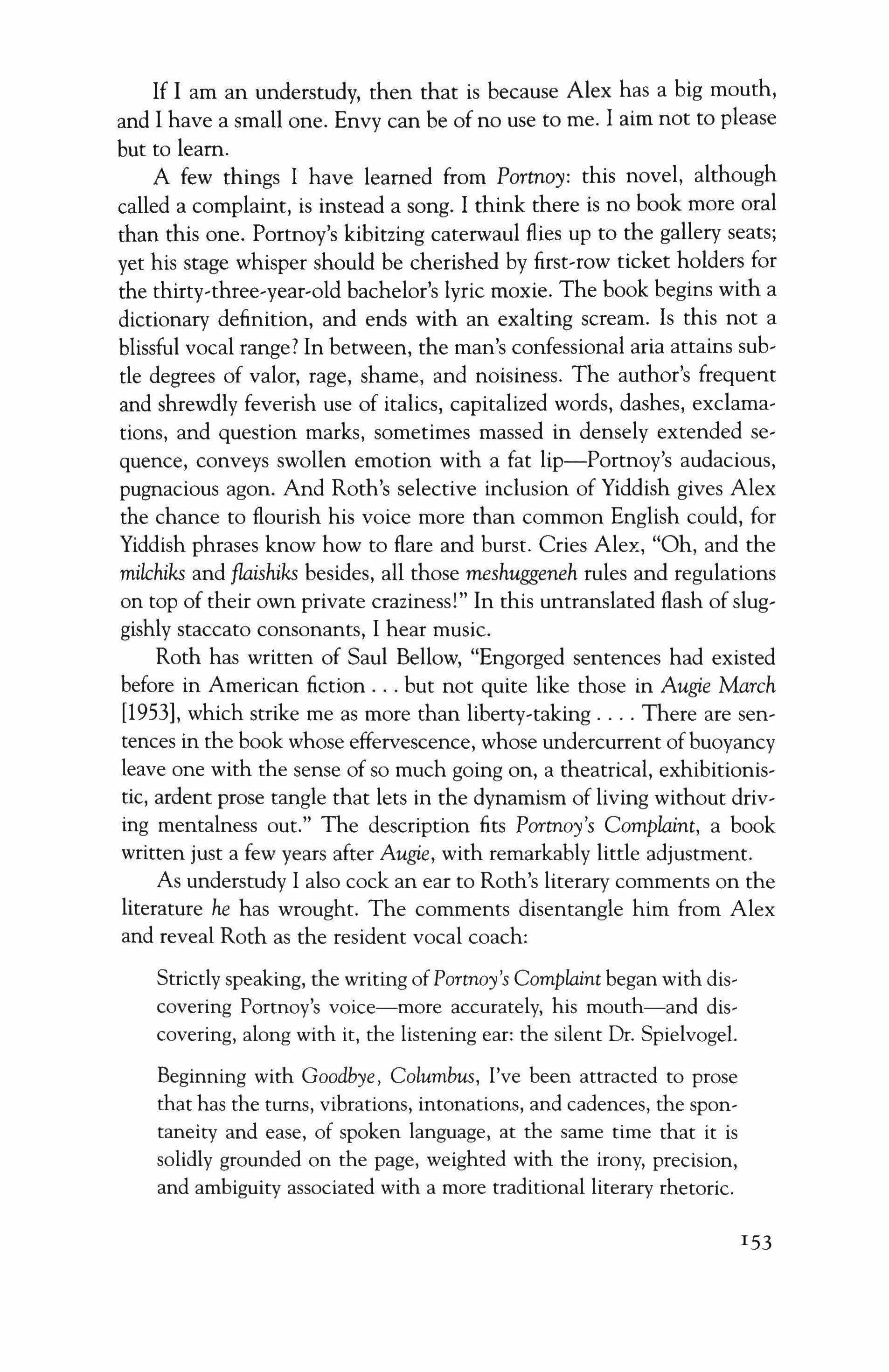
If I am an understudy, then that is because Alex has a big mouth, and I have a small one. Envy can be of no use to me. I aim not to please but to learn.
A few things I have learned from Portnoy: this novel, although called a complaint, is instead a song. I think there is no book more oral than this one. Portnoy's kibitzing caterwaul flies up to the gallery seats; yet his stage whisper should be cherished by first-row ticket holders for the thirty,three,year'old bachelor's lyric moxie. The book begins with a dictionary definition, and ends with an exalting scream. Is this not a blissful vocal range? In between, the man's confessional aria attains sub, tle degrees of valor, rage, shame, and noisiness. The author's frequent and shrewdly feverish use of italics, capitalized words, dashes, exclamations, and question marks, sometimes massed in densely extended sequence, conveys swollen emotion with a fat lip-Portnoy's audacious, pugnacious agon. And Roth's selective inclusion of Yiddish gives Alex the chance to flourish his voice more than common English could, for Yiddish phrases know how to flare and burst. Cries Alex, "Oh, and the milchiks and f/aishiks besides, all those meshuggeneh rules and regulations on top of their own private craziness!" In this untranslated flash of slug, gishly staccato consonants, I hear music.
Roth has written of Saul Bellow, "Engorged sentences had existed before in American fiction but not quite like those in Augie March [1953], which strike me as more than liberty-taking There are sen, tences in the book whose effervescence, whose undercurrent ofbuoyancy leave one with the sense of so much going on, a theatrical, exhibitionistic, ardent prose tangle that lets in the dynamism of living without driving mentalness out." The description fits Portnoy's Complaint, a book written just a few years after Augie, with remarkably little adjustment. As understudy I also cock an ear to Roth's literary comments on the literature he has wrought. The comments disentangle him from Alex and reveal Roth as the resident vocal coach:
Strictly speaking, the writing of Portnoy's Complaintbegan with dis, covering Portnoy's voice-more accurately, his mouth-and dis, covering, along with it, the listening ear: the silent Dr. Spielvogel.
Beginning with Goodbye, Columbus, I've been attracted to prose that has the turns, vibrations, intonations, and cadences, the spontaneity and ease, of spoken language, at the same time that it is solidly grounded on the page, weighted with the irony, precision, and ambiguity associated with a more traditional literary rhetoric.
153
One rhetoric deserves another. As the last act of an understudy, I will present an index as my only bona fide performance. This isn't mandatory, yet I feel I must do it, with the clammy hands and the addled brain of a scriptorial obsessive. I have edited and re-edited my little index, checked the page numbers and the pages with an embarrassing wariness, because I know this is the best that I can offer. It is my chance to leave myselfbehind; it is my chance to be a scrupulous auditor.
A short afterword will aim to acclimate and soothe those readers of the index who survive my zealously alphabetized entries.
An Index

A
Aaaa hhhh!!!!!, p. 274
afflicted, p. 5
Alice Dembosky, p. 59
All-Bran, p. 115 anything but ladylike, p. 218 apertures and openings, p. 104
B
Baby, please, don't howl, p. 105 bamboozled, p. 91 being boffed, p. 103
Big John's shlong, p. 211
Bubbles Girardi, p. 165
C Catholic bullshit, p. 98 chocolate pudding, p. 88 Commissioner of Cunt, p. 204
D Deck her, Jake!, p. 88
diarrhea, p. 19
Diaspora, p. 265
154
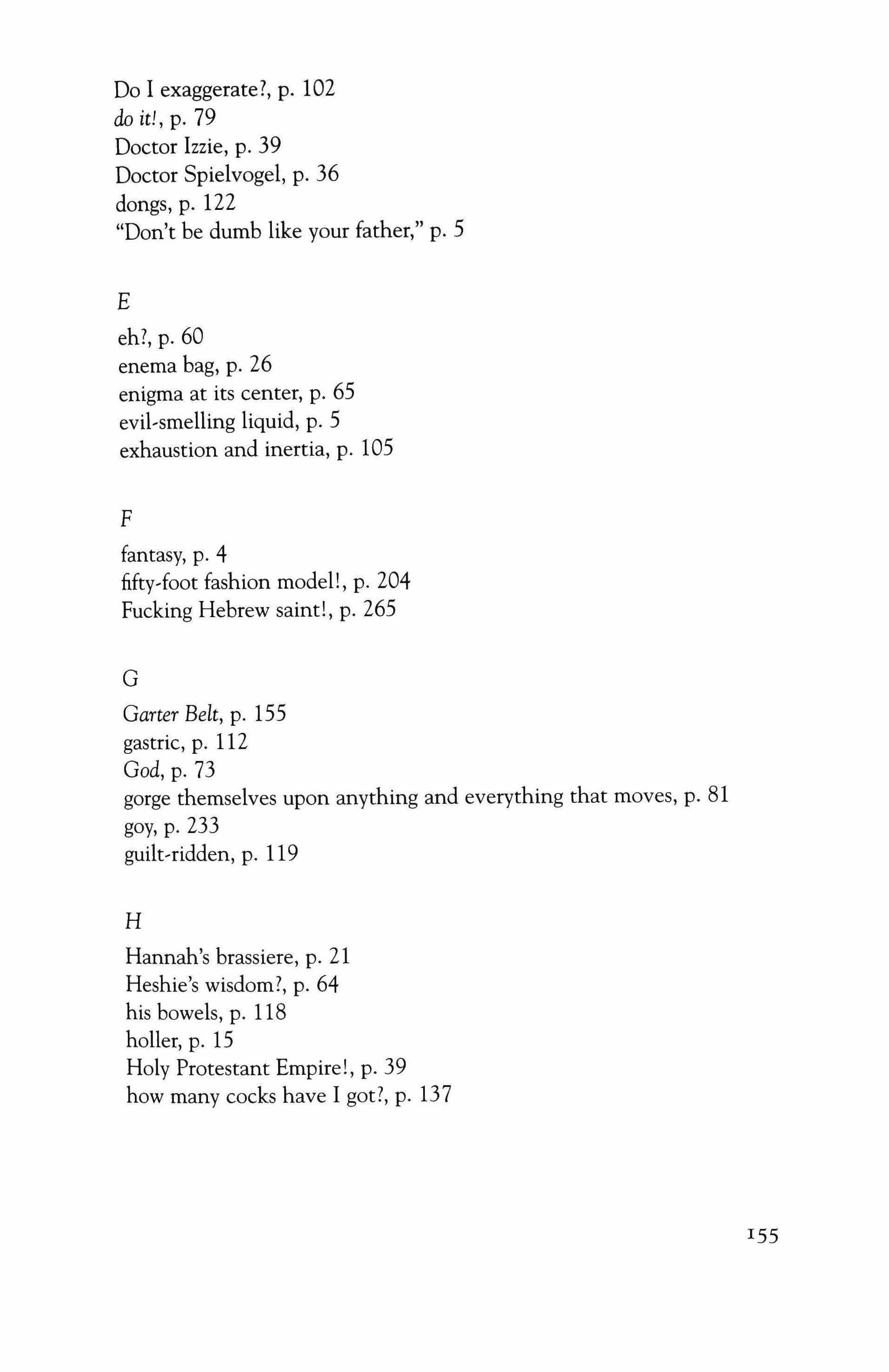
Do I exaggerate?, p. 102
do it!, p. 79
Doctor Izzie, p. 39
Doctor Spielvogel, p. 36
dongs, p. 122
"Don't be dumb like your father," p. 5
E eh?, p. 60
enema bag, p. 26
enigma at its center, p. 65 evil-smelling liquid, p. 5 exhaustion and inertia, p. 105
F fantasy, p. 4
fifty-foot fashion model!, p. 204
Fucking Hebrew saint!, p. 265
G
Garter Belt, p. 155
gastric, p. 112
God, p. 73
gorge themselves upon anything and everything that moves, p. 81 goy, p. 233 guilt-ridden, p. 119
H
Hannah's brassiere, p. 21
Heshie's wisdom?, p. 64
his bowels, p. 118
holler, p. 15
Holy Protestant Empire!, p. 39
how many cocks have I got?, p. 137
155

I fuck out of obligation, p. 102
"I know a poem," p. 191
I win the right to get the syph!, p. 177 illicit pleasure, p. 66
]Jane Powell, p. 151
jello, p. 20
jerking off, p. 20
Jersey City, p. 96
Jewish desperado, p. 84 Joy! Sheer joy!, p. 119
K
Kay Campbell, p. 230 kishkas, p. 92 kvetching, p. 94
L
Lake Hopatcong, p. 219
Latinate, p. 170
Lenore Lapidus's big fat red-hot brassiere, p. 21
LET'S PUT THE ID BACK IN YID!, p. 124
Lina, p. 137
little prick, p. 64
lowly creature, p. 81 lunatic asylum, p. 89
M making believe, p. 179
MARY JANE REED, p. 272
Mom, those galoshes!, p. 86
Mr. Big Shot, p. 61
Mr. Insurance Man, p. 10
Mr. Smart Guy, p. 24
Mrs. Nimkin, p. 97
I
my apostasy, p. 72
my boyhood, p. 95
my left testicle, p. 38
my slut, p. 159
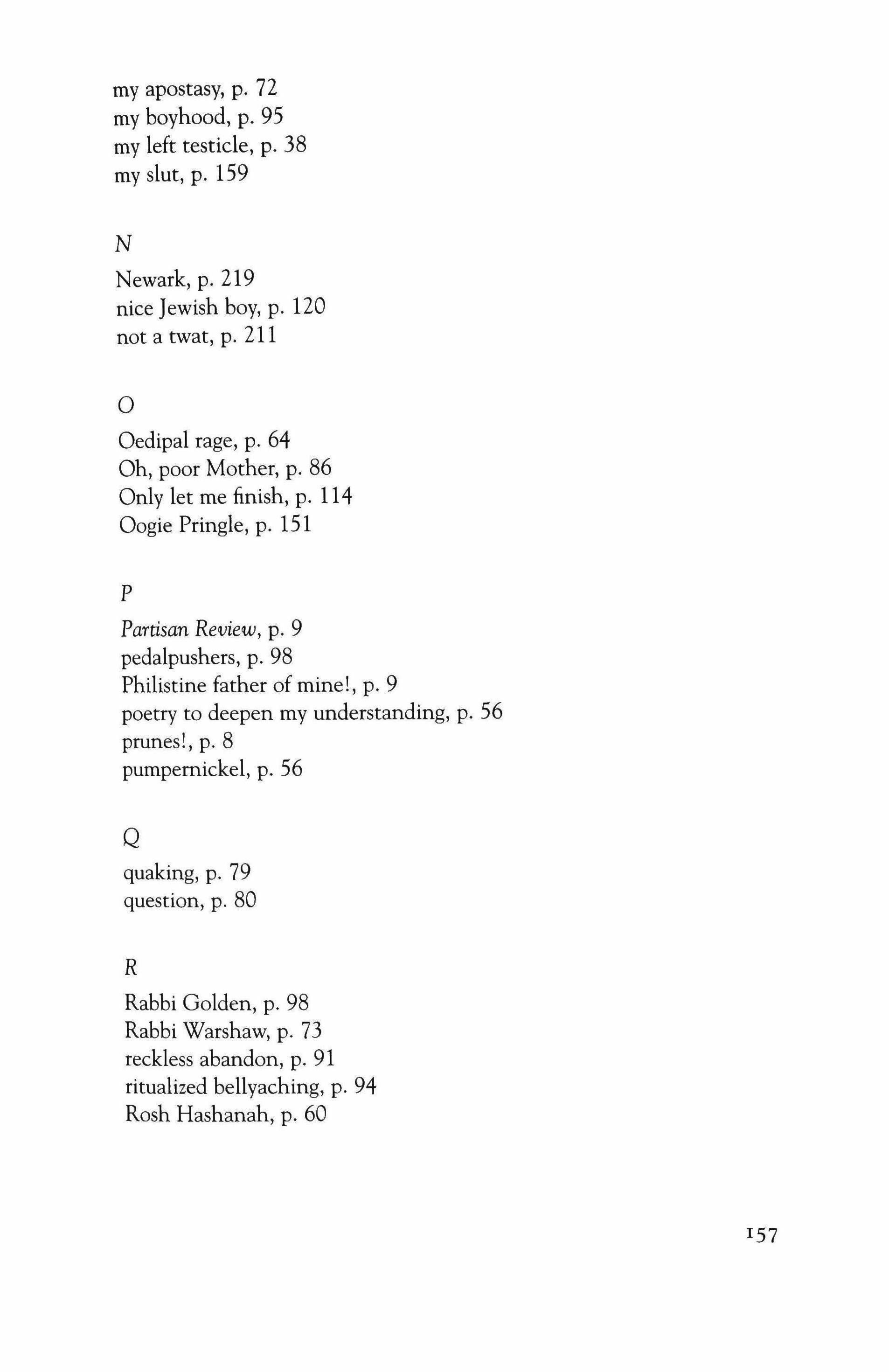
N
Newark, p. 219
nice Jewish boy, p. 120 not a twat, p. 211
o
Oedipal rage, p. 64
Oh, poor Mother, p. 86
Only let me finish, p. 114
Oogie Pringle, p. 151
p
Partisan Review, p. 9
pedalpushers, p. 98
Philistine father of mine!, p. 9
poetry to deepen my understanding, p. 56 prunes!, p. 8
pumpernickel, p. 56
Q
quaking, p. 79
question, p. 80
R
Rabbi Golden, p. 98
Rabbi Warshaw, p. 73
reckless abandon, p. 91
ritualized bellyaching, p. 94
Rosh Hashanah, p. 60
157
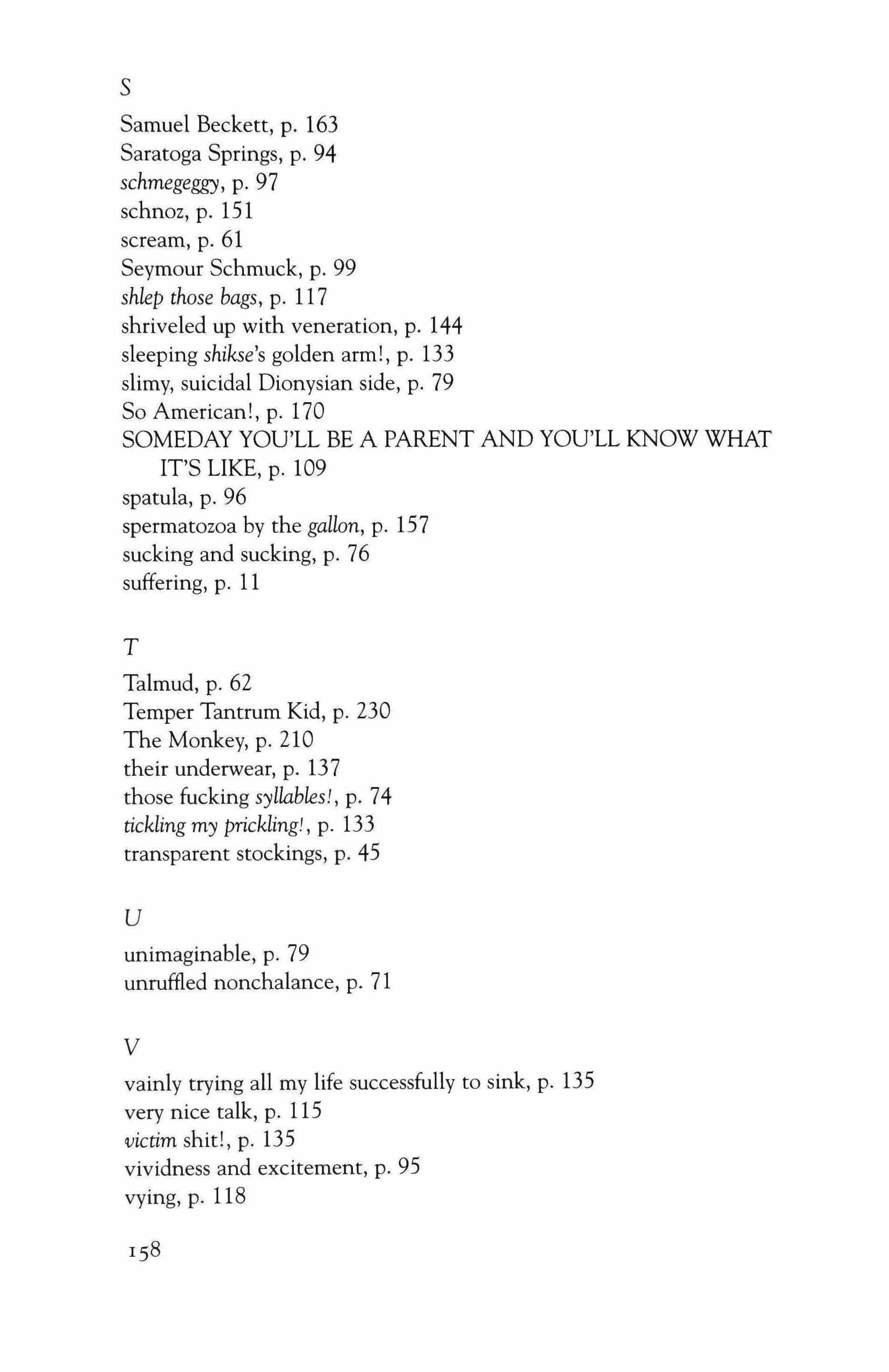
Samuel Beckett, p. 163
Saratoga Springs, p. 94
schmegeggy, p. 97
schnoz, p. 151
scream, p. 61
Seymour Schmuck, p. 99
shlep those bags, p. 117
shriveled up with veneration, p. 144 sleeping shikse's golden arm!, p. 133 slimy, suicidal Dionysian side, p. 79
So American!, p. 170
SOMEDAY YOU'LL BE A PARENT AND YOU'LL KNOW WHAT IT'S LIKE, p. 109 spatula, p. 96
spermatozoa by the gallon, p. 157 sucking and sucking, p. 76
suffering, p. 11
T
Talmud, p. 62
Temper Tantrum Kid, p. 230
The Monkey, p. 210 their underwear, p. 137 those fucking syllables!, p. 74 tickling my prickling!, p. 133 transparent stockings, p. 45
u unimaginable, p. 79
unruffled nonchalance, p. 71
V
vainly trying all my life successfully to sink, p. 135 very nice talk, p. 115 victim shitl, p. 135 vividness and excitement, p. 95 vying, p. 118
S
Wagnerian pitch, p. 190
weeping, p. 11
Weequahic Diner, p. 125
WHACKING OFF, p. 17
WHEN IS ALEXANDER PORTNOY GOING TO STOP BEING
SELFISH AND GIVE HIS PARENTS, WHO ARE SUCH WONDERFUL PEOPLE, GRANDCHILDREN?, p. 100
Whew! Have I got grievances!, p. 94 whisper in Italian, p. 136
"Who used to suck us all off?," p. 175 who wins an argument with a hard-on], p. 128 whore's legs, p. 137
Worry, Fear & Frustration, p. 26
x y YOUR FUCKING SELFISHNESS AND STUPIDITY!, p. 98
"your real Jewish chopped liver," p. 84
Z
zombie, p. 125 zylon jacket, p. 128
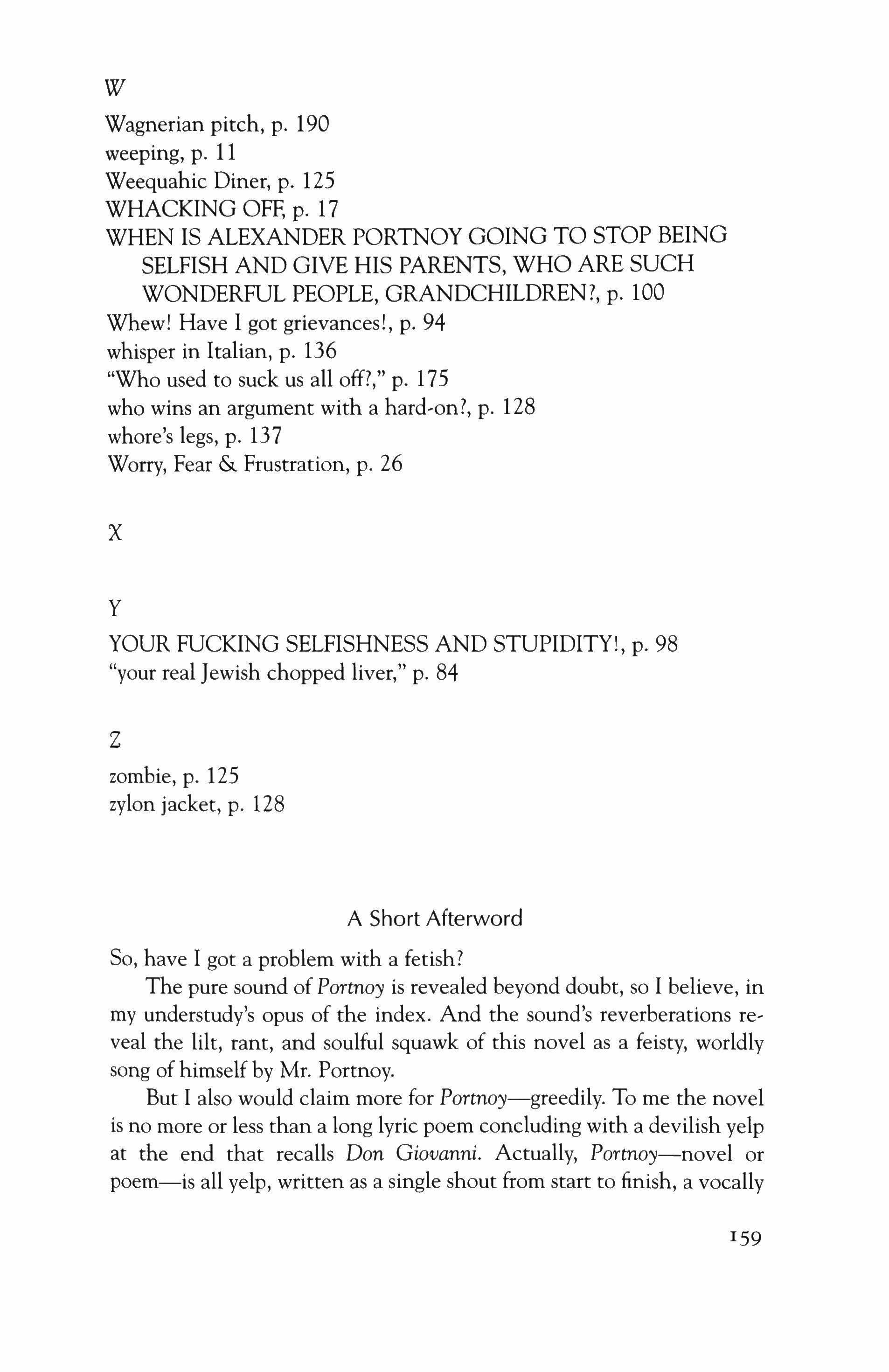
A Short Afterword
So, have I got a problem with a fetish?
The pure sound of Portnoy is revealed beyond doubt, so I believe, in my understudy's opus of the index. And the sound's reverberations reveal the lilt, rant, and soulful squawk of this novel as a feisty, worldly song of himself by Mr. Portnoy.
But I also would claim more for Portnoy-greedily. To me the novel is no more or less than a long lyric poem concluding with a devilish yelp at the end that recalls Don Giovanni. Actually, Portnoy-novel or poem-is all yelp, written as a single shout from start to finish, a vocally
W
159
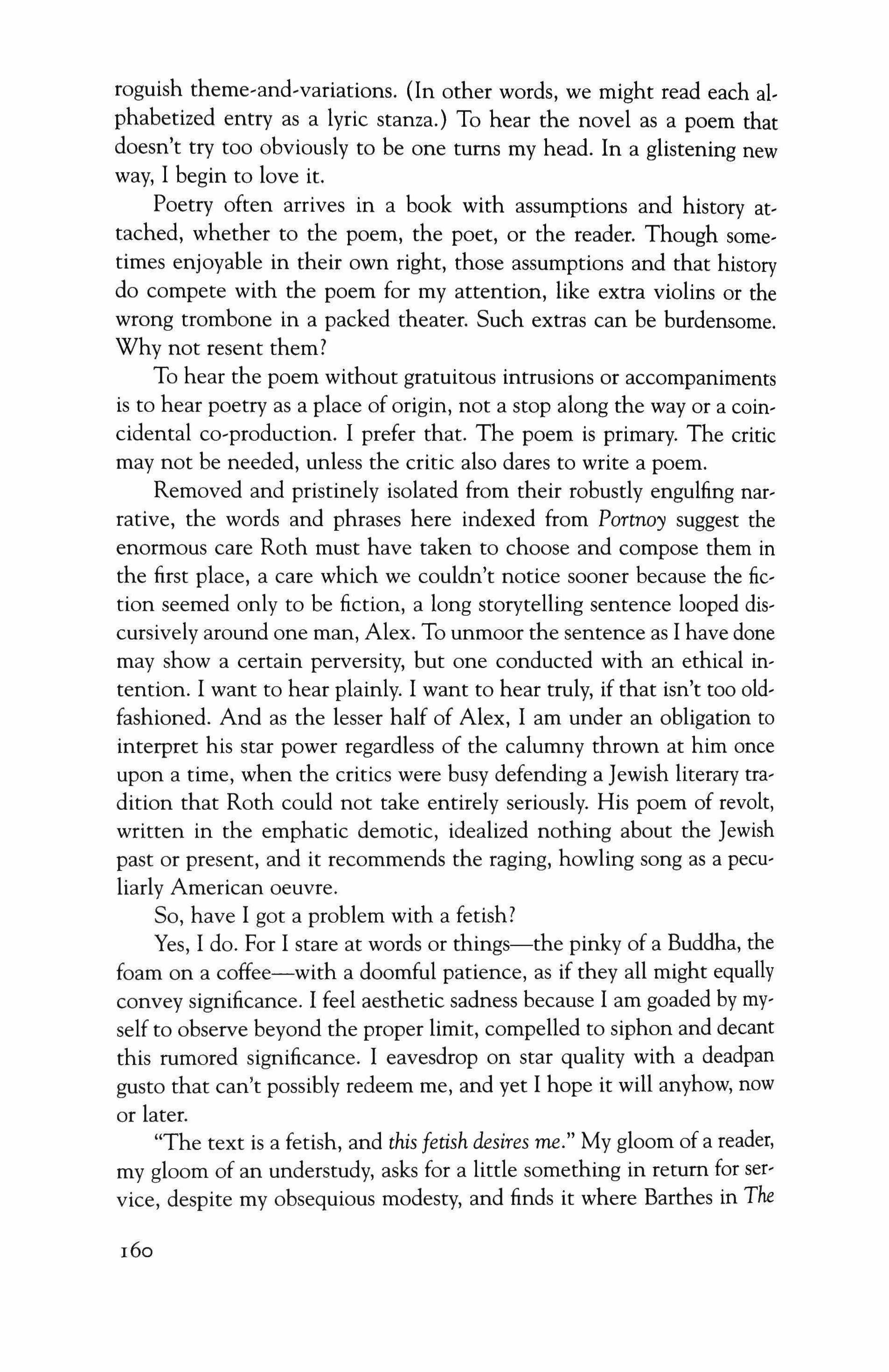
roguish theme-and-variations. (In other words, we might read each alphabetized entry as a lyric stanza.) To hear the novel as a poem that doesn't try too obviously to be one turns my head. In a glistening new way, I begin to love it.
Poetry often arrives in a book with assumptions and history attached, whether to the poem, the poet, or the reader. Though sometimes enjoyable in their own right, those assumptions and that history do compete with the poem for my attention, like extra violins or the wrong trombone in a packed theater. Such extras can be burdensome.
Why not resent them?
To hear the poem without gratuitous intrusions or accompaniments is to hear poetry as a place of origin, not a stop along the way or a coincidental co-production. I prefer that. The poem is primary. The critic may not be needed, unless the critic also dares to write a poem.
Removed and pristinely isolated from their robustly engulfing narrative, the words and phrases here indexed from Portnoy suggest the enormous care Roth must have taken to choose and compose them in the first place, a care which we couldn't notice sooner because the fietion seemed only to be fiction, a long storytelling sentence looped discursively around one man, Alex. To unmoor the sentence as I have done may show a certain perversity, but one conducted with an ethical intention. I want to hear plainly. I want to hear truly, if that isn't too oldfashioned. And as the lesser half of Alex, I am under an obligation to interpret his star power regardless of the calumny thrown at him once upon a time, when the critics were busy defending a Jewish literary tradition that Roth could not take entirely seriously. His poem of revolt, written in the emphatic demotic, idealized nothing about the Jewish past or present, and it recommends the raging, howling song as a peculiarly American oeuvre.
So, have I got a problem with a fetish?
Yes, I do. For I stare at words or things-the pinky of a Buddha, the foam on a coffee-with a doomful patience, as if they all might equally convey significance. I feel aesthetic sadness because I am goaded by myself to observe beyond the proper limit, compelled to siphon and decant this rumored significance. I eavesdrop on star quality with a deadpan gusto that can't possibly redeem me, and yet I hope it will anyhow, now or later.
"The text is a fetish, and this fetish desires me." My gloom of a reader, my gloom of an understudy, asks for a little something in return for service, despite my obsequious modesty, and finds it where Barthes in The
160
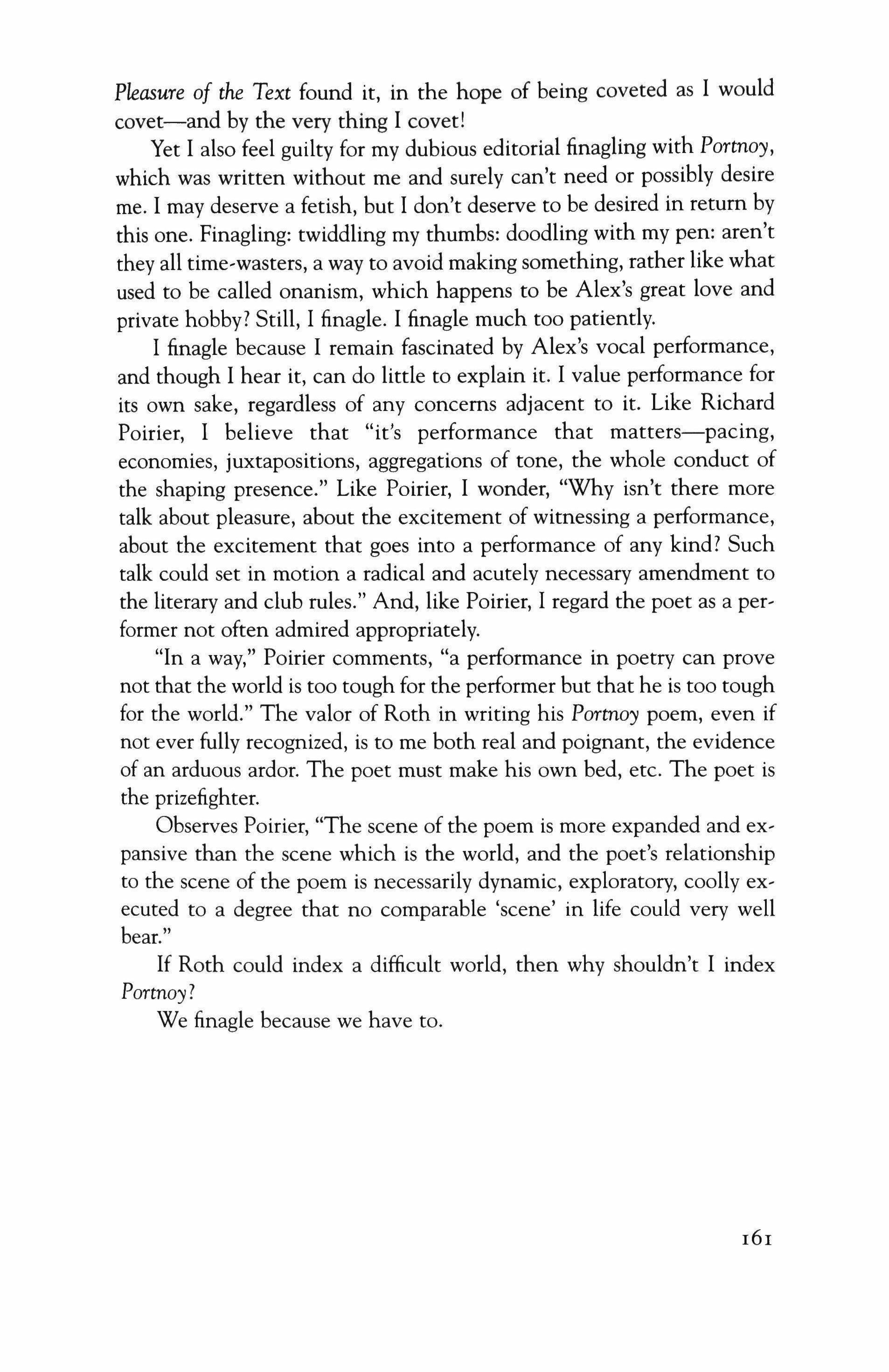
Pleasure of the Text found it, in the hope of being coveted as I would covet-and by the very thing I covet!
Yet I also feel guilty for my dubious editorial finagling with Portnoy, which was written without me and surely can't need or possibly desire me. I may deserve a fetish, but I don't deserve to be desired in return by this one. Finagling: twiddling my thumbs: doodling with my pen: aren't they all time-wasters, a way to avoid making something, rather like what used to be called onanism, which happens to be Alex's great love and private hobby? Still, I finagle. I finagle much too patiently.
I finagle because I remain fascinated by Alex's vocal performance, and though I hear it, can do little to explain it. I value performance for its own sake, regardless of any concerns adjacent to it. Like Richard Poirier, I believe that "it's performance that matters-pacing, economies, juxtapositions, aggregations of tone, the whole conduct of the shaping presence." Like Poirier, I wonder, "Why isn't there more talk about pleasure, about the excitement of witnessing a performance, about the excitement that goes into a performance of any kind? Such talk could set in motion a radical and acutely necessary amendment to the literary and club rules." And, like Poirier, I regard the poet as a performer not often admired appropriately.
"In a way," Poirier comments, "a performance in poetry can prove not that the world is too tough for the performer but that he is too tough for the world." The valor of Roth in writing his Portnoy poem, even if not ever fully recognized, is to me both real and poignant, the evidence of an arduous ardor. The poet must make his own bed, etc. The poet is the prizefighter.
Observes Poirier, "The scene of the poem is more expanded and expansive than the scene which is the world, and the poet's relationship to the scene of the poem is necessarily dynamic, exploratory, coolly executed to a degree that no comparable 'scene' in life could very well bear."
If Roth could index a difficult world, then why shouldn't I index Portnoy?
We finagle because we have to.
161
On Adoration and Envy
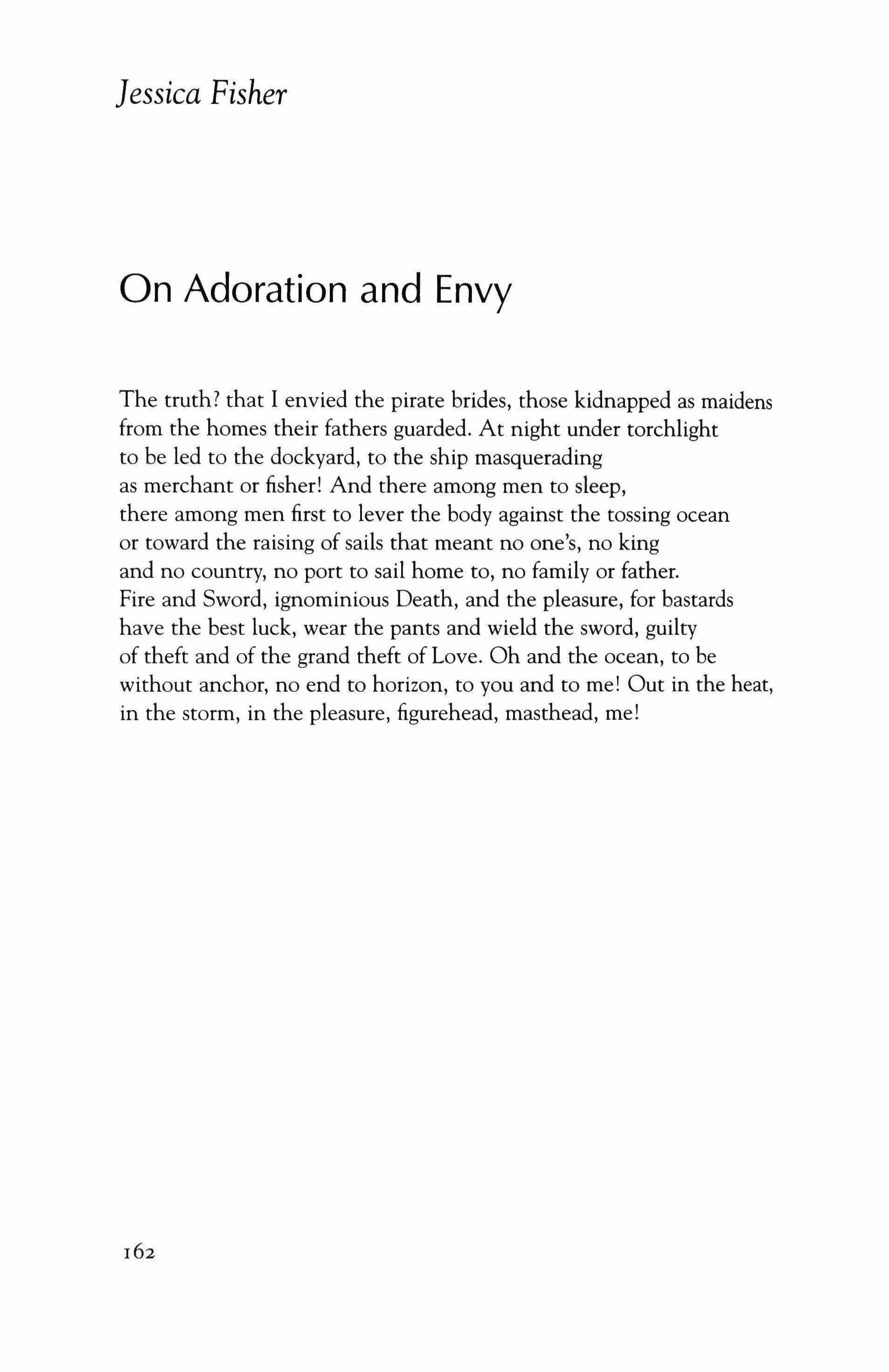
The truth? that I envied the pirate brides, those kidnapped as maidens from the homes their fathers guarded. At night under torchlight to be led to the dockyard, to the ship masquerading as merchant or fisher! And there among men to sleep, there among men first to lever the body against the tossing ocean or toward the raising of sails that meant no one's, no king and no country, no port to sail home to, no family or father. Fire and Sword, ignominious Death, and the pleasure, for bastards have the best luck, wear the pants and wield the sword, guilty of theft and of the grand theft of Love. Oh and the ocean, to be without anchor, no end to horizon, to you and to me! Out in the heat, in the storm, in the pleasure, figurehead, masthead, me!
Jessica Fisher
On the Problem of Distinction

Romance is always epistolary. Sex is on the floor. There's little reason for the confusion that greets them: the letter holds the self in all its trappings, while the body's trapped against cold linoleum. What needs elaboration is the odd fact of the matter: that there can be one self with many bodies. As illustration, take Jove in all his guises. And don't be startled if you see me splayed first under this one, then under that: I love one man only, though he changes. You would call him fickle but he is not changing-think of his unyielding desire, or think of the thunderbolt that precedes him, no matter his form. You might guess I grew tired of his games, but truth be told, I liked the bull, the swan, the gold that came into my chamber.
Robert Cording

Waiting for the Word
A right arm she can't lift up, a left hand that's still no good at managing a fork; the mild summer weather she remembers from childhood and the crazy, overheated weather these days; the once upon a time that is never enough; and the dead still demanding to be remembered by a mind steadily failing; the mourning doves that don't know a damn thing about sadness, and a God always taking back what he gives-and then, Nevertheless arrives as always, her phone soliloquy continuing with the chickadees outside her window, the smell of pine trees after rain, the pretty pink and gray-ribbed undersides of the squatting clouds, a towhee insisting she drink her tea, and the sunny, less humid days due sometime at the week's end.
Nocturne
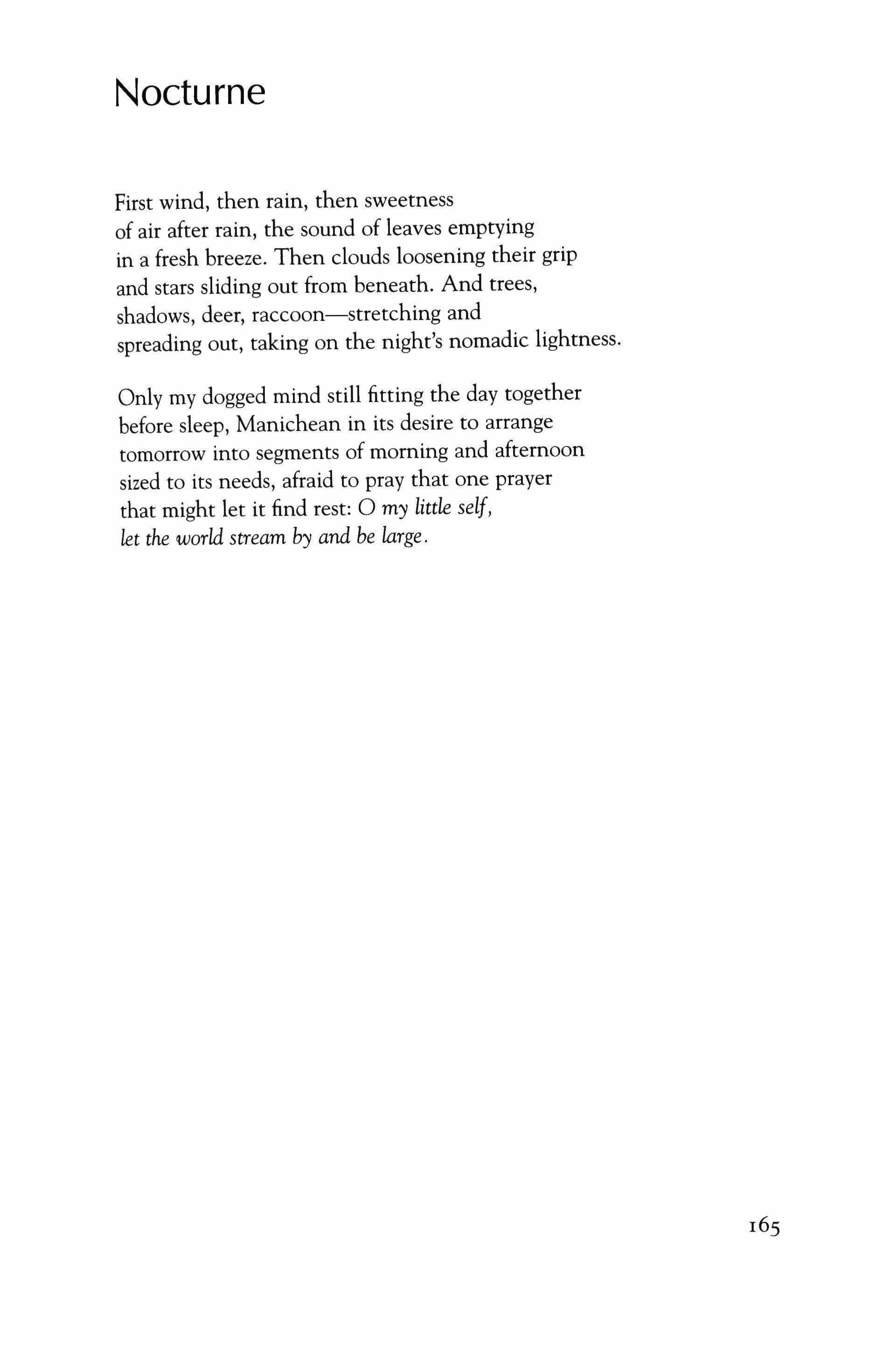
First wind, then rain, then sweetness of air after rain, the sound of leaves emptying in a fresh breeze. Then clouds loosening their grip and stars sliding out from beneath. And trees, shadows, deer, raccoon-stretching and spreading out, taking on the night's nomadic lightness.
Only my dogged mind still fitting the day together before sleep, Manichean in its desire to arrange tomorrow into segments of morning and afternoon sized to its needs, afraid to pray that one prayer that might let it find rest: 0 my little self, let the world stream by and be large.
On a Drop of Rain

Late in the day, the rain abating, I force myself outside for my daily walk. I do not go far. Everything is doused and diamonded with water. Even the stones seem polished. At each bud of every scrub roadside tree, and even on the thorns of wild roses, hangs a drop of rainas if someone had hoisted chandeliers to light the road from end to end.
I think of Marvell, how he found a story one morning shining with meaning in a drop of dew. A figure for the soul, Marvell's dewdrop contained the whole sky and, mindful of its native home, came and went, scarcely touching the earthly flower on which it floated, its one aspiration the sunny exhalation of water into air. It never seemed to feel
death's shiver. Here, it's nearly evening, the air still rheumy enough to silver the weedy edge of the road where beer cans find their rest. My raindrops-tense, tremblingreally do seem to cling for dear life, a story, I'm sad to say, of my all too earthly wish to hang around forever in my body. No chance, the wind says, extinguishing with every breeze, one drop after another.
166
Hadara Bar--Nadav

Woman
with Plum
I.
Antithesis of thin. Glob. Glue. My hair trailing behind. There in the curls, a growth the size of a plum, a father with his oversized heart, a mother clutching her kidneys, crying. Listen: you will be let go of. The world has become flat again. People walk off the edge, precipice with starfish waiting in the sea below. Fleshy palms with want in their hearts. The growth, my hearty plum, will become whatever it is. Proliferation of cells. I'm talking about sex here. Textbooks a foot thick. How origin, how evolution. How women are gatherers and women who starve themselves grow fur like a bear. Must gather. Must glue myself to me.
II.
The same reason puzzles are frightening. Fracture. Systematic hysteria of supermarkets. Can I sit down for a minute among the pies? Hide behind the canned tomatoes? Vertigo with cell phone in hand and dreams of my mother's voice. Dreams as in wish. Need. Now sitting down among the pumpkin, the pecan. The aisles writhe. Grinning packages of red-faced meat. Jars of honey wink. Grotesque lust on the faces of peaches. I'm talking about sex here. A woman faking it in the next row. Oh, what beautiful plums! An answering machine picks up. I leave empty.
III.
What cannot be eaten? Snap the page. Chum and chew. Salivary stew. Pulp made of spit and glue. Words with knives inside like biopsy and fuck. To love what is deleted. To want it back. The undesirable shoved to the side of the plate. Disgraced. Deletions are reasons to love. A woman who wants again to be fat. To fill a whole page tip to tip. Bath
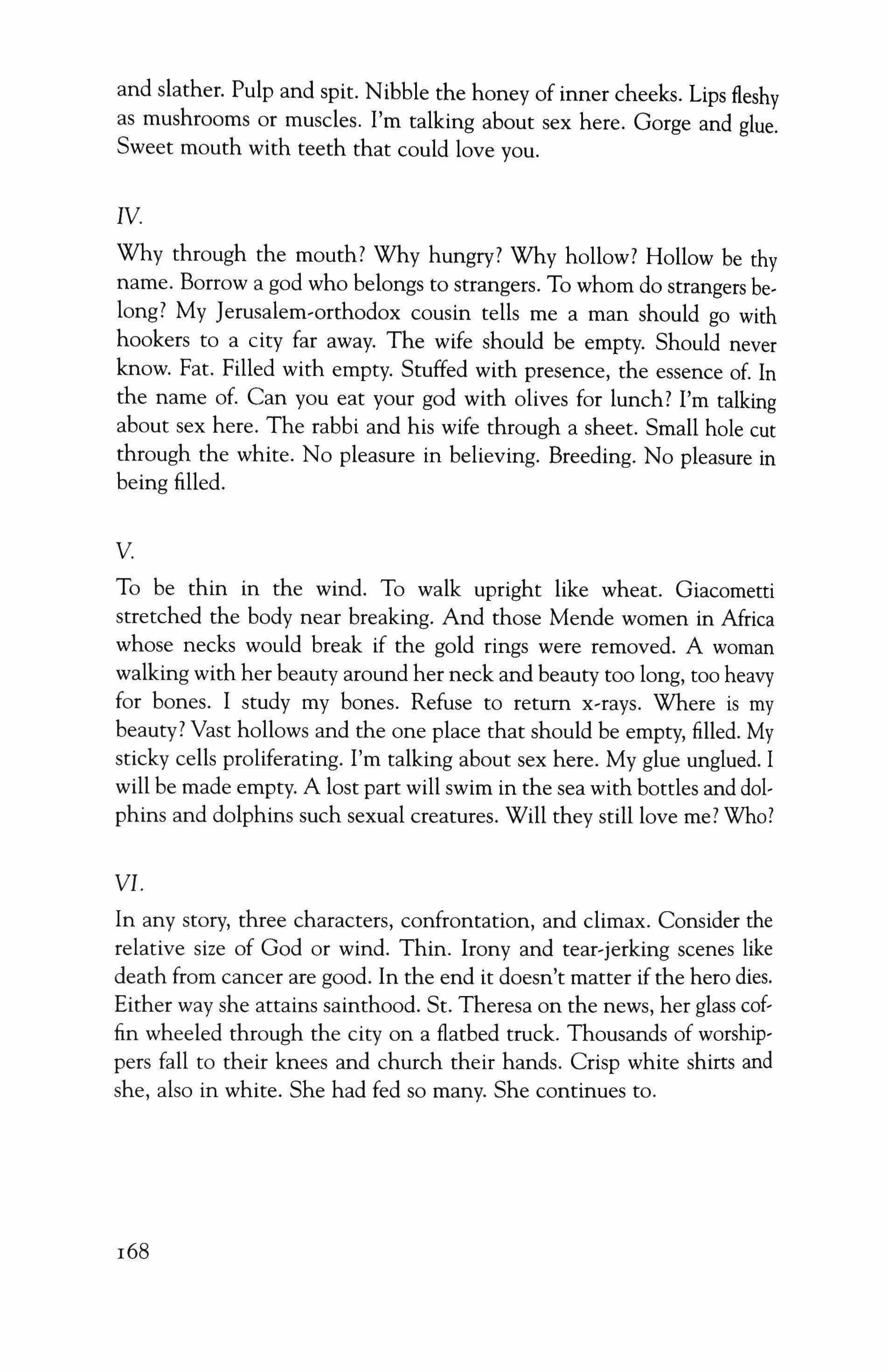
and slather. Pulp and spit. Nibble the honey of inner cheeks. Lips fleshy as mushrooms or muscles. I'm talking about sex here. Gorge and glue. Sweet mouth with teeth that could love you.
IV.
Why through the mouth? Why hungry? Why hollow? Hollow be thy name. Borrow a god who belongs to strangers. To whom do strangers belong? My Jerusalem-orthodox cousin tells me a man should go with hookers to a city far away. The wife should be empty. Should never know. Fat. Filled with empty. Stuffed with presence, the essence of. In the name of. Can you eat your god with olives for lunch? I'm talking about sex here. The rabbi and his wife through a sheet. Small hole cut through the white. No pleasure in believing. Breeding. No pleasure in being filled.
V.
To be thin in the wind. To walk upright like wheat. Giacometti stretched the body near breaking. And those Mende women in Africa whose necks would break if the gold rings were removed. A woman walking with her beauty around her neck and beauty too long, too heavy for bones. I study my bones. Refuse to return x-rays. Where is my beauty? Vast hollows and the one place that should be empty, filled. My sticky cells proliferating. I'm talking about sex here. My glue unglued. I will be made empty. A lost part will swim in the sea with bottles and dolphins and dolphins such sexual creatures. Will they still love me? Who?
VI.
In any story, three characters, confrontation, and climax. Consider the relative size of God or wind. Thin. Irony and tear-jerking scenes like death from cancer are good. In the end it doesn't matter if the hero dies. Either way she attains sainthood. St. Theresa on the news, her glass coffin wheeled through the city on a flatbed truck. Thousands of worshippers fall to their knees and church their hands. Crisp white shirts and she, also in white. She had fed so many. She continues to.
168
Night, White and Gold for Louise Nevelson
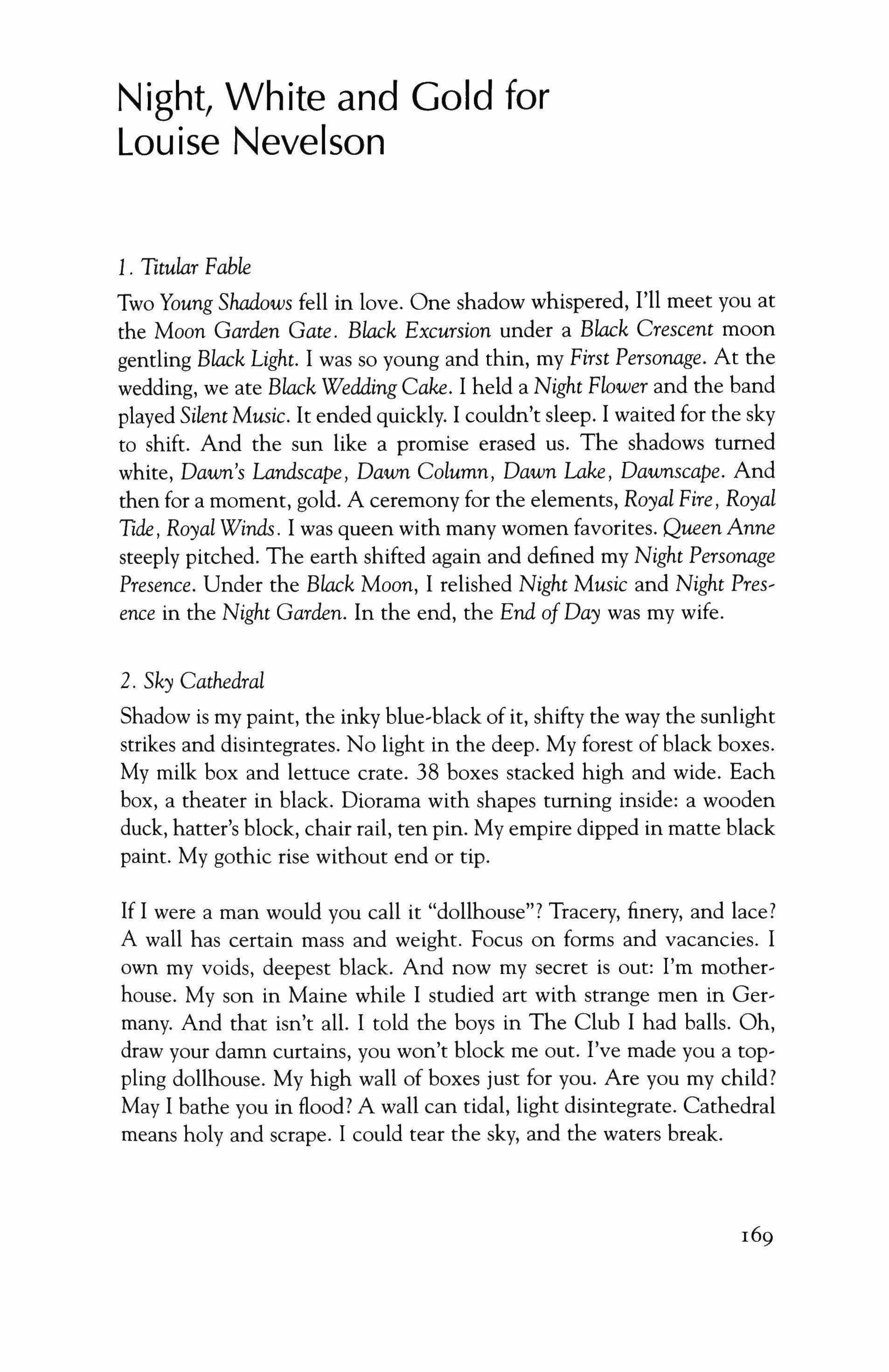
1. Titular Fable
Two Young Shadows fell in love. One shadow whispered, I'll meet you at the Moon Garden Gate. Black Excursion under a Black Crescent moon gentling Black Light. I was so young and thin, my First Personage. At the wedding, we ate Black Wedding Cake. I held a Night Flower and the band played Silent Music. It ended quickly. I couldn't sleep. I waited for the sky to shift. And the sun like a promise erased us. The shadows turned white, Dawn's Landscape, Dawn Column, Dawn Lake, Dawnscape. And then for a moment, gold. A ceremony for the elements, Royal Fire, Royal Tide, Royal Winds. I was queen with many women favorites. Queen Anne steeply pitched. The earth shifted again and defined my Night Personage Presence. Under the Black Moon, I relished Night Music and Night Presence in the Night Garden. In the end, the End ofDay was my wife.
2. Sky Cathedral
Shadow is my paint, the inky blue-black of it, shifty the way the sunlight strikes and disintegrates. No light in the deep. My forest of black boxes. My milk box and lettuce crate. 38 boxes stacked high and wide. Each box, a theater in black. Diorama with shapes turning inside: a wooden duck, hatter's block, chair rail, ten pin. My empire dipped in matte black paint. My gothic rise without end or tip.
If I were a man would you call it "dollhouse"? Tracery, finery, and lace? A wall has certain mass and weight. Focus on forms and vacancies. I own my voids, deepest black. And now my secret is out: I'm motherhouse. My son in Maine while I studied art with strange men in Ger� many. And that isn't all. I told the boys in The Club I had balls. Oh, draw your damn curtains, you won't block me out. I've made you a toppling dollhouse. My high wall of boxes just for you. Are you my child? May I bathe you in flood? A wall can tidal, light disintegrate. Cathedral means holy and scrape. I could tear the sky, and the waters break.

3. Dawn's Wedding Feast
(with a line from Paul Eluard)
Begin at the edge of skin. Where are you in the landscape? This fan with beautiful ribs. Black into gold. Now white. Dimension counts on its fingers: 1, 2, 3, 4, and I make my shadows light. Even white has her shadow. Dawn, her silver fan. In Dawn's Wedding Feast forms are being wed. Table top to leg, porch post to bed. My first white, first flat girl-bride, forms and thighs laid on the table. Able, bounty, feast. The landscape unveils a wedding suite. You be the day and I'll be the night, hand in hand in white.
Assemble for the feast. Assembly of pieces and the pieces assemble into shapes. The feast, a landscape of skin that begins with cake, a pillow, chapel, and baluster case. And then there's the mirror where we meet. Enter and eat. Pause and sweeten, cheek to cheek. The body is meat. Call me lamb-chop, honey, or Louise. Please pass the landscape. Gravy of tears and white paint. I'll never again marry, but the cities we'll build, the shadows we'll shape. White landscape where we forsake our names, undone by the love of making.
4. Dreamhouse
I wanted a house. House-hungry. Bi-level. Split. A house to house me, feed me with. Wood the color of gingerbread burned sweet. Licorice walls, black forest bricks. Frosting shaped into plump hens and pigs. Raisin bread in the oven, butter slit. 30th Street, my apartment in parts. Make use of each discarded piece. Toy chest and cherry-wood heart. I'd marry a house, sing songs, gather wood. We'd wed each day, woman and room. House who waits with longing kisses and stares. House who longs for me: body, box, oval, square.
Architect of shadows and shapes. Dream a dreamhouse, dreambox filled with people. Sweet filling like cake. Swilling with people, a boisterous lot. House of cozy, besotted, and cot. A fluted bed for a boy who dreams in Maine. A lovely space for people and shapes. House filled with finials, rectangles, chairs. Dozens of chairs for shapes to sit, for shapes to chat, liquor, and cake. Miles away with shadows and shapes, I wait for you in lovely space.

5. The New Continent
Couldn't keep it whole. Total. Nobody would have it. I've destroyed so much. Even Dawn's Wedding Feast. I would have given it away, but in, stead reassembled the pieces. The New Continent, another forest in black. That's what I do. Lay the names down in shadow. Present in the shadows. Disappear in light. When everything is black, safety among objects. I take them from your bedrooms, kitchens, bars, schools, and will not name them banister or child. I love them all. I make a wall and build them each a room.
Look at time and it passes. I left time, a boy who dreams in Maine, a husband, Kiev when I was three, the names and shapes of things. The dark makes us present, equivalent. Even SelfPortrait in tattistone is black. Black is Relief. Safety in shadows. Anonymity of shapes. Table leg and armchair finally released. Difficult ornaments from someone else's dream. Regret swallowed with memory.
6. Assemblage with Night
I'll make room for you in my bed. Bed of maple, oak, ash, or my sweet favorite cherry. I kneeled in the dust, smelled it on his clothes. My fa, ther owned a lumberyard, which means wood was home. Familiar, though I plunged each piece into paint-black, white, and gold-to unhinge the familiar, anonymously at home. Later there was aluminum and steel. Whole monuments storeys and stories high. High stories, stacking one story on another. Each box with letters inside. I turned to Lucite, epoxy, and glass to be closer to the light. I wore silver armor around my neck and walked through the day thinner than light. Dar, ling, I was disappearing. Wind passed through the thin room of me. A tumor inside the room of my mind. So light and thin I could feel my skull lifting at the seams. At last, my mind released me. The boxes watched.
A wall full of stories. A wall like a letterpress, like letters being set. Leading like leather and setting. Kerning like kernel and keening. A wall to lean on, simple as hope. Either you would stay there or cut your throat. Such mercy inside shadow and form. Each box, a loving alphabet of its own. Each wall an assembly of letters left behind. Discarded, I found them on the streets at night.

Look at time and it passes. Like a twitch. In the end, even fabric and paper were knit. The pieces, ready made and willing to hinge. Assemblage, montage, collage, architectural debris, detritus, free, found on the street, offal, piecemeal, a meal in pieces but a meal nevertheless. Piecing is feminine. I saved each piece to hinge and knit. I gathered each and myself into the landscape. Salvaged a doorknob and a day.
Eleanor Stanford
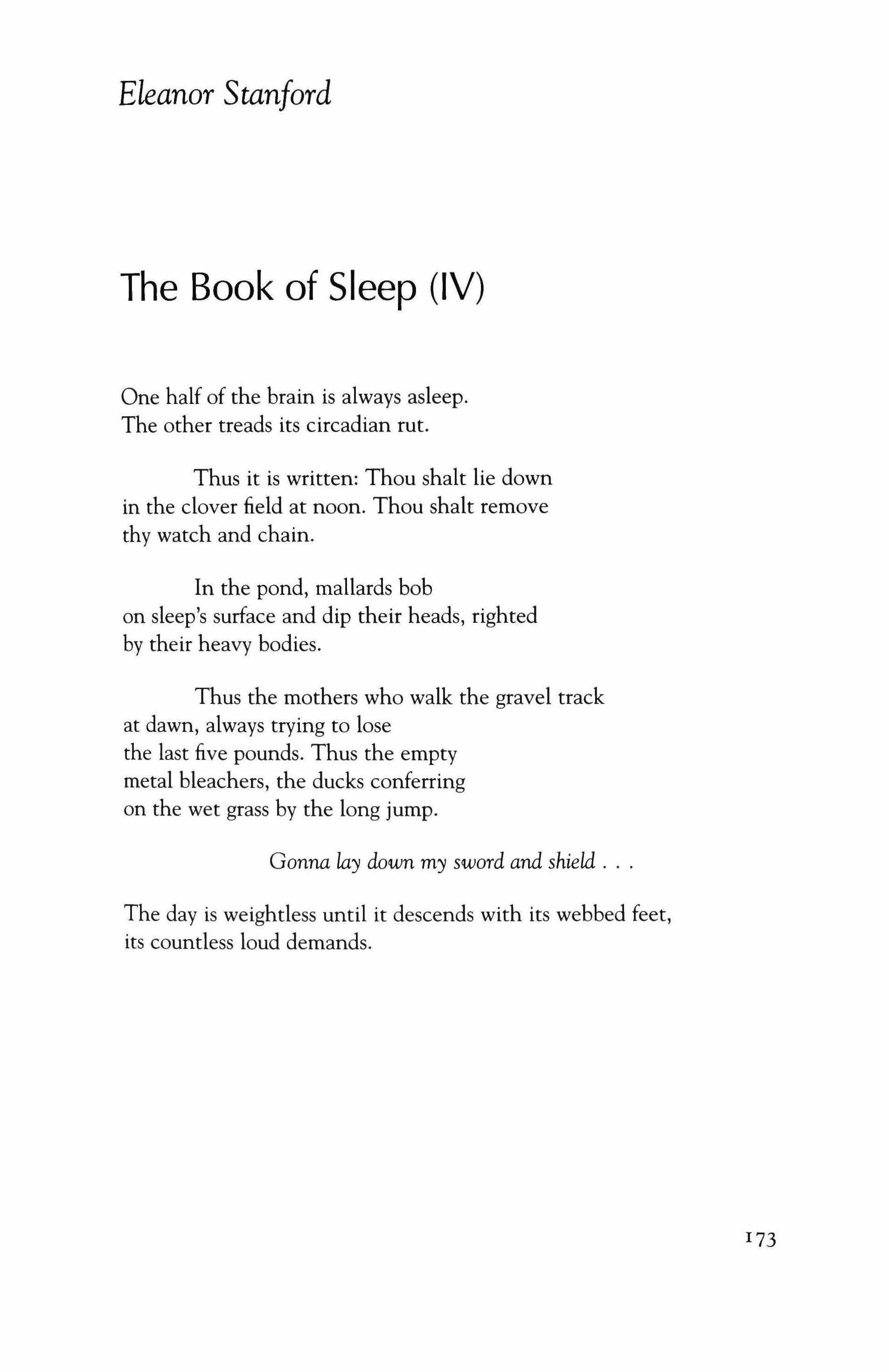
The Book of Sleep (IV)
One half of the brain is always asleep. The other treads its circadian rut.
Thus it is written: Thou shalt lie down in the clover field at noon. Thou shalt remove thy watch and chain.
In the pond, mallards bob on sleep's surface and dip their heads, righted by their heavy bodies.
Thus the mothers who walk the gravel track at dawn, always trying to lose the last five pounds. Thus the empty metal bleachers, the ducks conferring on the wet grass by the long jump.
Gonna lay down my sword and shield
The day is weightless until it descends with its webbed feet, its countless loud demands.
173
The Book of Sleep (XIII)

Gustinha's memorized the Book of Sleep, recites long passages in her head while she beats the clothes against the washboard.
And so Gurete in the kitchen, Nunena in the fields, Nha Nha hauling water in a bucket on her head.
The roster echoes off the schoolhouse walls:
]eiza, Fatima, Lila, Tete.
Not here, not here, not here, not here.
A thin film of kerosene keeps the mosquitoes from breeding in the well. Soon you learn to swallow it, to crave its dark iridescence on your tongue.
174
The Book of Sleep (XV)

All night I waited at the edge of the gallery-forest. I dreamed the lion with your bloody cloak in his mouth. I dreamed the river swallowed you, your body a small bulge in its throat.
This place where I live now, it is a country whose name has changed many times. A country whose present status is not clear.
By the sleek surface of the lake, the cattle flick their tails, bend their large heads to drink.
On the road I saw a beautiful girl, carrying a clay urn on her head. She balanced it so casually, I knew it was full, and knew that whatever it contained was all she had.
175
"The World Was Created by Ten Utterances"
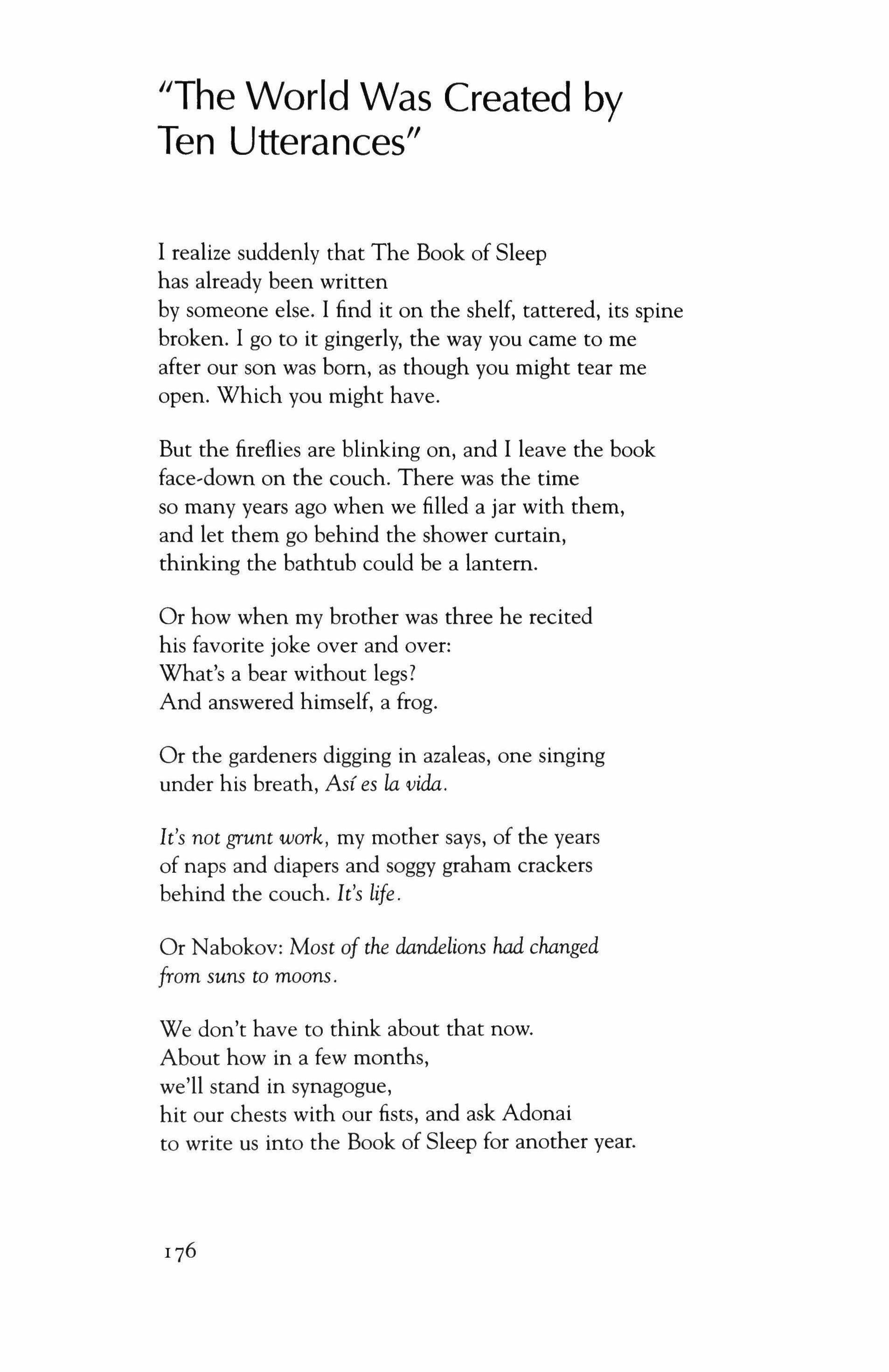
I realize suddenly that The Book of Sleep has already been written by someone else. I find it on the shelf, tattered, its spine broken. I go to it gingerly, the way you came to me after our son was born, as though you might tear me open. Which you might have.
But the fireflies are blinking on, and I leave the book face-down on the couch. There was the time so many years ago when we filled a jar with them, and let them go behind the shower curtain, thinking the bathtub could be a lantern.
Or how when my brother was three he recited his favorite joke over and over: What's a bear without legs? And answered himself, a frog.
Or the gardeners digging in azaleas, one singing under his breath, Asf es la vida.
It's not grunt work, my mother says, of the years of naps and diapers and soggy graham crackers behind the couch. It's life.
Or Nabokov: Most of the dandelions had changed from suns to moons.
We don't have to think about that now. About how in a few months, we'll stand in synagogue, hit our chests with our fists, and ask Adonai to write us into the Book of Sleep for another year.
Marianne Boruch
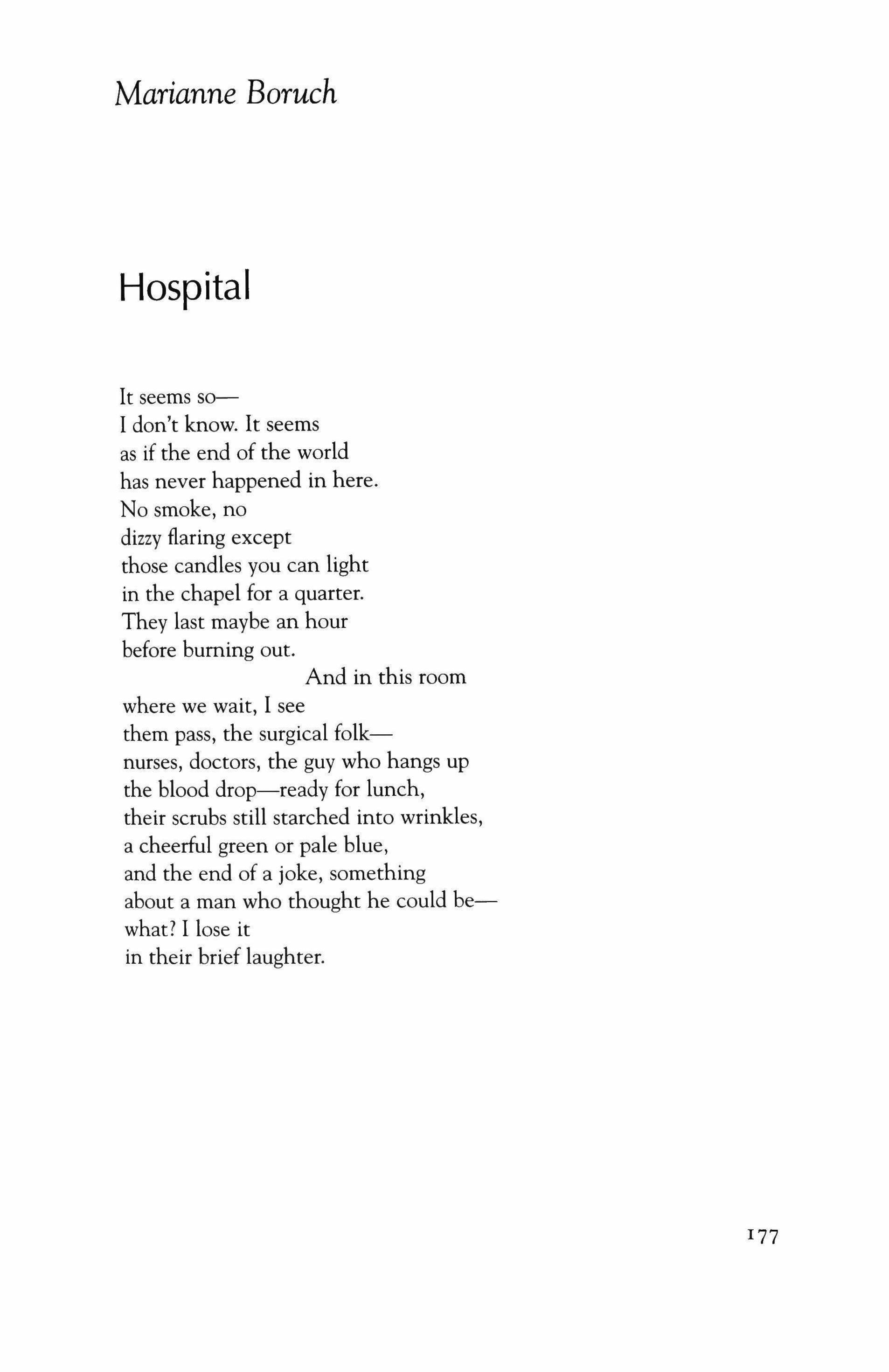
Hospital
It seems sol don't know. It seems as if the end of the world has never happened in here. No smoke, no dizzy flaring except those candles you can light in the chapel for a quarter. They last maybe an hour before burning out. And in this room where we wait, I see them pass, the surgical folknurses, doctors, the guy who hangs up the blood drop-ready for lunch, their scrubs still starched into wrinkles, a cheerful green or pale blue, and the end of a joke, something about a man who thought he could bewhat? I lose it in their brief laughter.
177
Spring, In Five Parts

1.
Here's paper. Here's ink in a steady line through the pen in my hand. Here's the word word and here and hand. Can you think about thinking? Can you take whatever passes there, the shredded postcard delivered anyway, pieced together out by the curb in a truck, and taped? Thought like a gene come down through the pool, medieval moment, the bright, sweaty Renaissance, every painter straining toward a ceiling. Then into that river world, a new continent, swift way from here to there, trees in the distance or too close and you can't see a thing. He was really a composer, the poet said about the poet. He kept rewriting those lines the way a composer hears things. Tinkering dark, I thought, up to-not light. It was a major key. Or the reverse, the utter reverse of the angle. It drops into shade, sinks back and back, not even remembered anymore, those trees, that continent. Dreamt.
2.
We were girls, high girlhood, fifteen or sixteen. And the nun not much older in that ordinary school once a novitiate, not then, not when we stood there in spring, the grounds wooded and terraced, the light bulbs bare, hung by their cords.

The hallway bent to a spray of new light, three of us talking to her, the young woman in those black robes still-Vatican II just beginning-her face so like our faces, quickened and blank by turns, opened and closed, curious then just-standing-by. And the religious life, she called it, this thing she stepped into thinking world so perfect. She sounded like singing, low note and no note. Or sadlywas it sad?-her sudden old to our young, her inside to our outside But I forgot, she said, when you go anywhere, you bring yourself.
3.
I knew exactly. And then I didn't. Was there a porch in all this? Was there a house? Light waxing out there, then waning. A cat slow and fragile and mean and sweet by turns. He quickened to a mouse, but only a false one, fattened by catnip and full of sewn seams. Days unwind themselves. It's Monday, then Friday, a lot of walking in between, a lot of riding in the car. A lot of spoon to mouth, a lot of talk talk talk. I could, I suppose. I mean I can, I said, agreeing. Really, it's the cat at night, finding that mouse again. A toy mouse, but he's thrilled. Thrilled. I hear him in the dark, his communion.
179
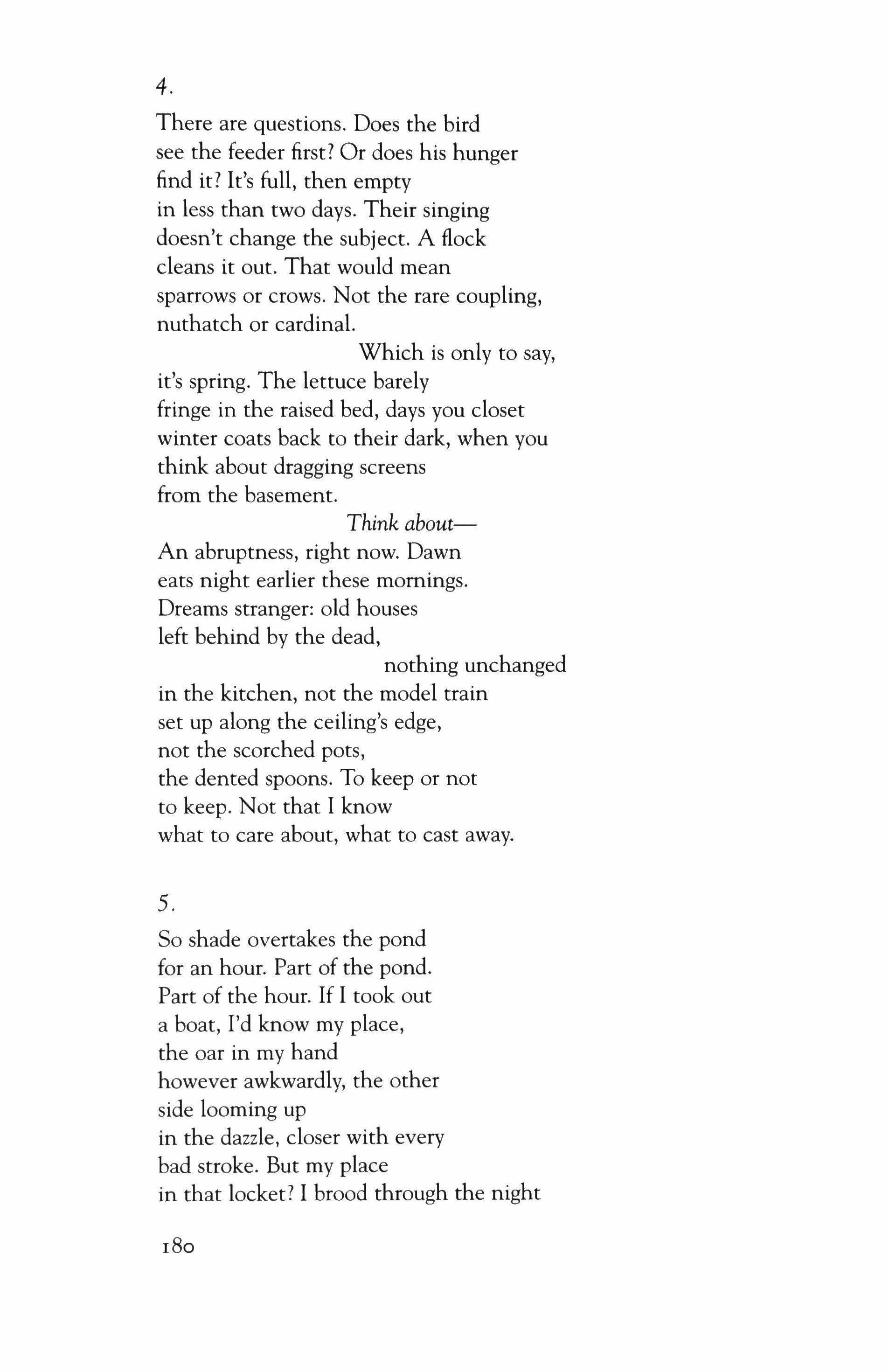
4.
There are questions. Does the bird see the feeder first? Or does his hunger find it? It's full, then empty in less than two days. Their singing doesn't change the subject. A flock cleans it out. That would mean sparrows or crows. Not the rare coupling, nuthatch or cardinal.
Which is only to say, it's spring. The lettuce barely fringe in the raised bed, days you closet winter coats back to their dark, when you think about dragging screens from the basement.
Think about
An abruptness, right now. Dawn eats night earlier these mornings. Dreams stranger: old houses left behind by the dead, nothing unchanged in the kitchen, not the model train set up along the ceiling's edge, not the scorched pots, the dented spoons. To keep or not to keep. Not that I know what to care about, what to cast away.
5.
So shade overtakes the pond for an hour. Part of the pond. Part of the hour. If I took out a boat, I'd know my place, the oar in my hand however awkwardly, the other side looming up in the dazzle, closer with every bad stroke. But my place in that locket? I brood through the night
180

as much as anyone, now and then the clock, enormous with its ticking though the gears are tiny, their little teeth catch almost nothing. It's May, or it's April. All afternoon pretty much how it sounds: all, then afternoon. The way, coming out of surgery, I saw a room slow and fill itself in richly, without me.
181
Michael McFee
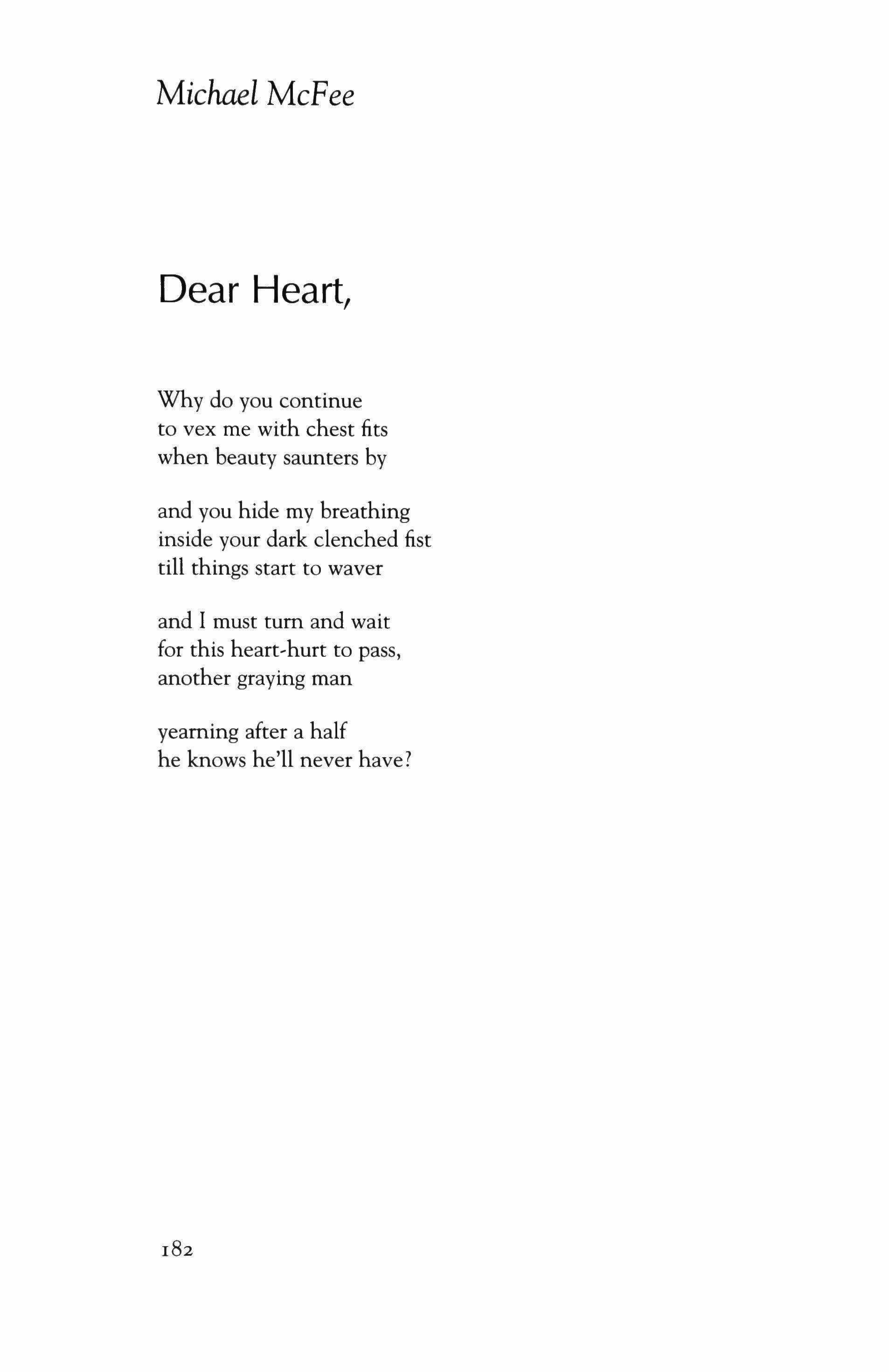
Dear Heart,
Why do you continue to vex me with chest fits when beauty saunters by and you hide my breathing inside your dark clenched fist till things start to waver and I must tum and wait for this heart-hurt to pass, another graying man
yearning after a half he knows he'll never have?
A Different Nothing
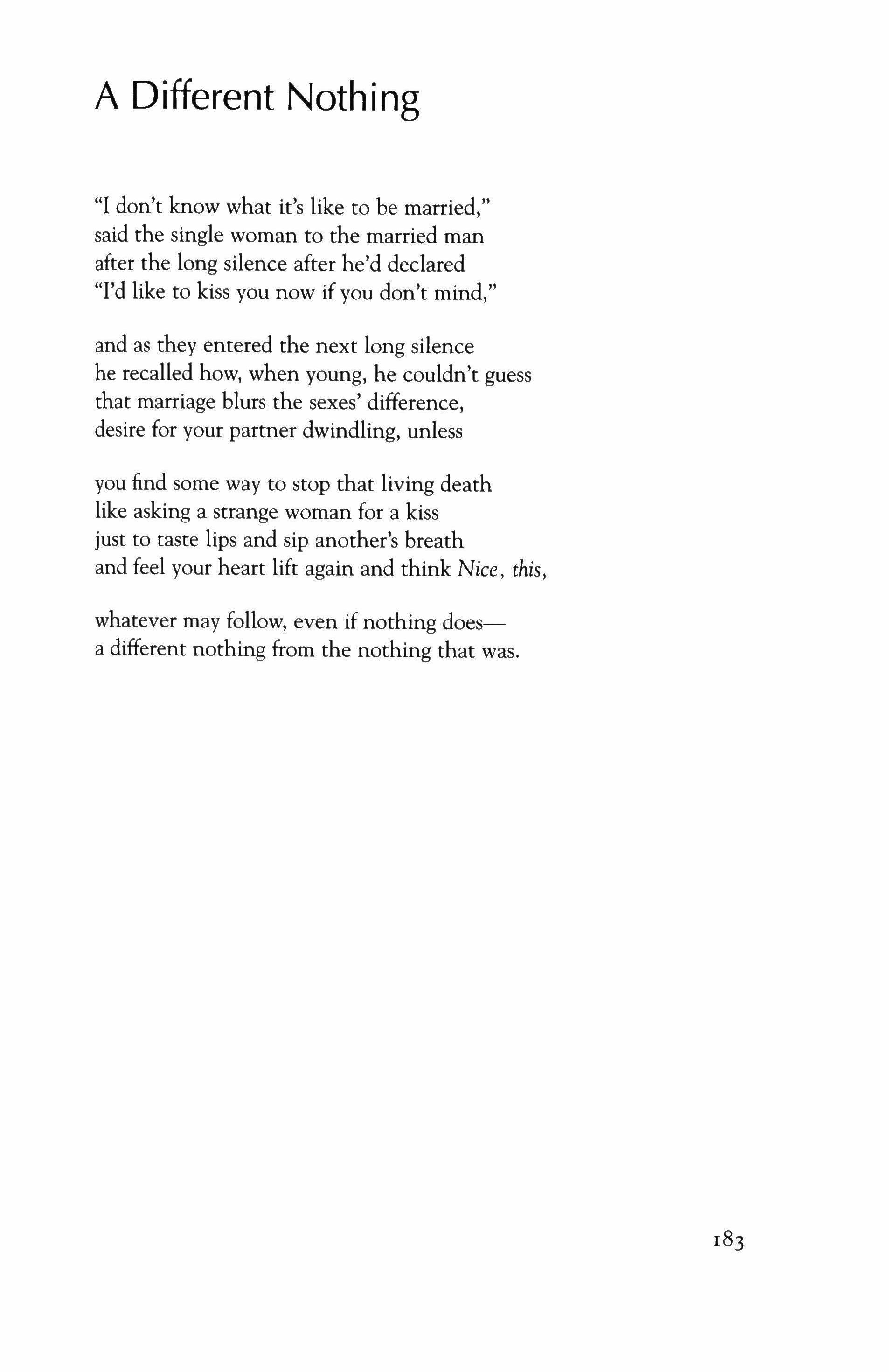
"1 don't know what it's like to be married," said the single woman to the married man after the long silence after he'd declared "I'd like to kiss you now if you don't mind," and as they entered the next long silence he recalled how, when young, he couldn't guess that marriage blurs the sexes' difference, desire for your partner dwindling, unless
you find some way to stop that living death like asking a strange woman for a kiss just to taste lips and sip another's breath and feel your heart lift again and think Nice, this,
whatever may follow, even if nothing doesa different nothing from the nothing that was.
]oseph Campana

Practice
It's three am when I hear once more the repetition of scales I ought to know, did know, when, years ago and in an alien register, I squeezed the same ladders of tone from a clarinet now gathering moss in a closet far from here. I stopped playing when I stopped feeling extraordinary.
Nothing saves you, not in the night: no great cloak of quiet stills the pulsing organs of sense and the mind, too, is an organ of sense so hungry to be put back to sleep that it cries out for a dark forest of sound to muffle the blasts of light and fortune that sting so and deliver to day the singular voice that knows only to sing and to leave behind its signature errors.
Each time it's the same: absence of error, absence of inspiration, though I sense that familiar hesitation. Tumble of pitches, smoothness of ivory though how much less haunting than the woody grief I
inflicted on my parents with a spring of latches: Concerto for Clarinet in A (Adagio).
To say death is a little closer only because it is, though it is not a place. In the darkness outside, the hounds are a little closer, too, and they are known only by virtue of a sound easily mistaken for the architecture of mourning, which is, by far, more sad than this. If I were dying as quickly as you, there would be nothing to keep the stillest music from twitching my fingers into the only song I know.
Each week Mozart was dying in my living room, dying before doors my mother closed for shame. Each week for nearly a year we relished clever Wolfgang, moribund Wolfgang, debauched Wolfgang. My father, who I'd rarely seen wash a glass, served lemonade, whispered conviviality, like someone I had never met.
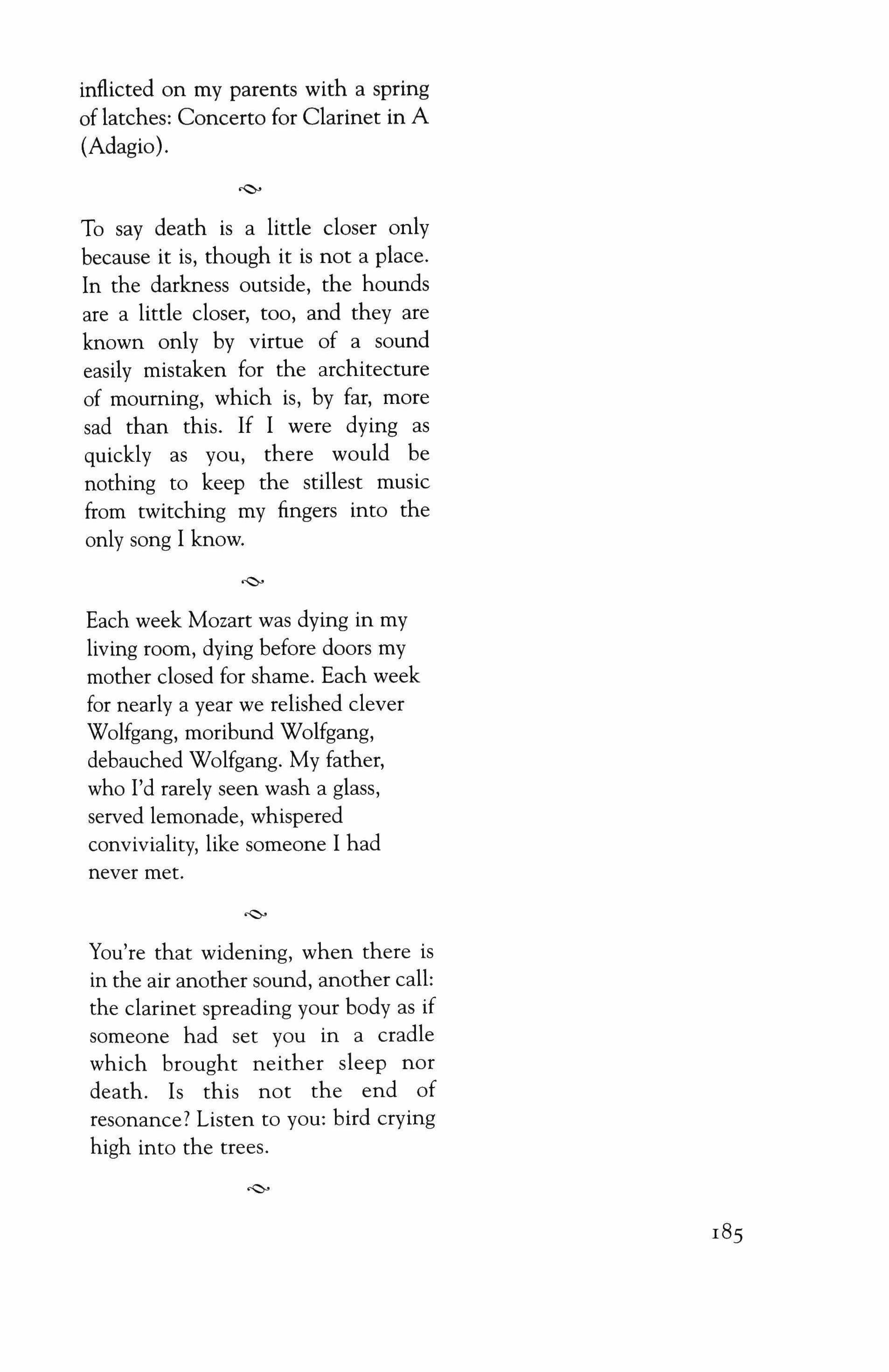
You're that widening, when there is in the air another sound, another call: the clarinet spreading your body as if someone had set you in a cradle which brought neither sleep nor death. Is this not the end of resonance? Listen to you: bird crying high into the trees.
Mr. Scheer worked other marvels, such transformations, designing machines to refine from merest vegetable matter the perfect reed. All too well I understood his fascination but not half so well as my mother understood Mozart. In as much as I played it, she loved it: loved wrong notes she never heard, loved cadenzas I'd never write, loved even the life I sealed in a box in the dark where that music was heard but only from afar and only in the absence of implication �
If it's all the same to Mozart, who never knew the value of a dollar, I won't close the window now however painful it is to feel in the tips, in the knuckles of my hand, notes racing to the same sad conclusion, which is where they begin and I end: in ViCiOUS contemplation, which is the true end of all music.
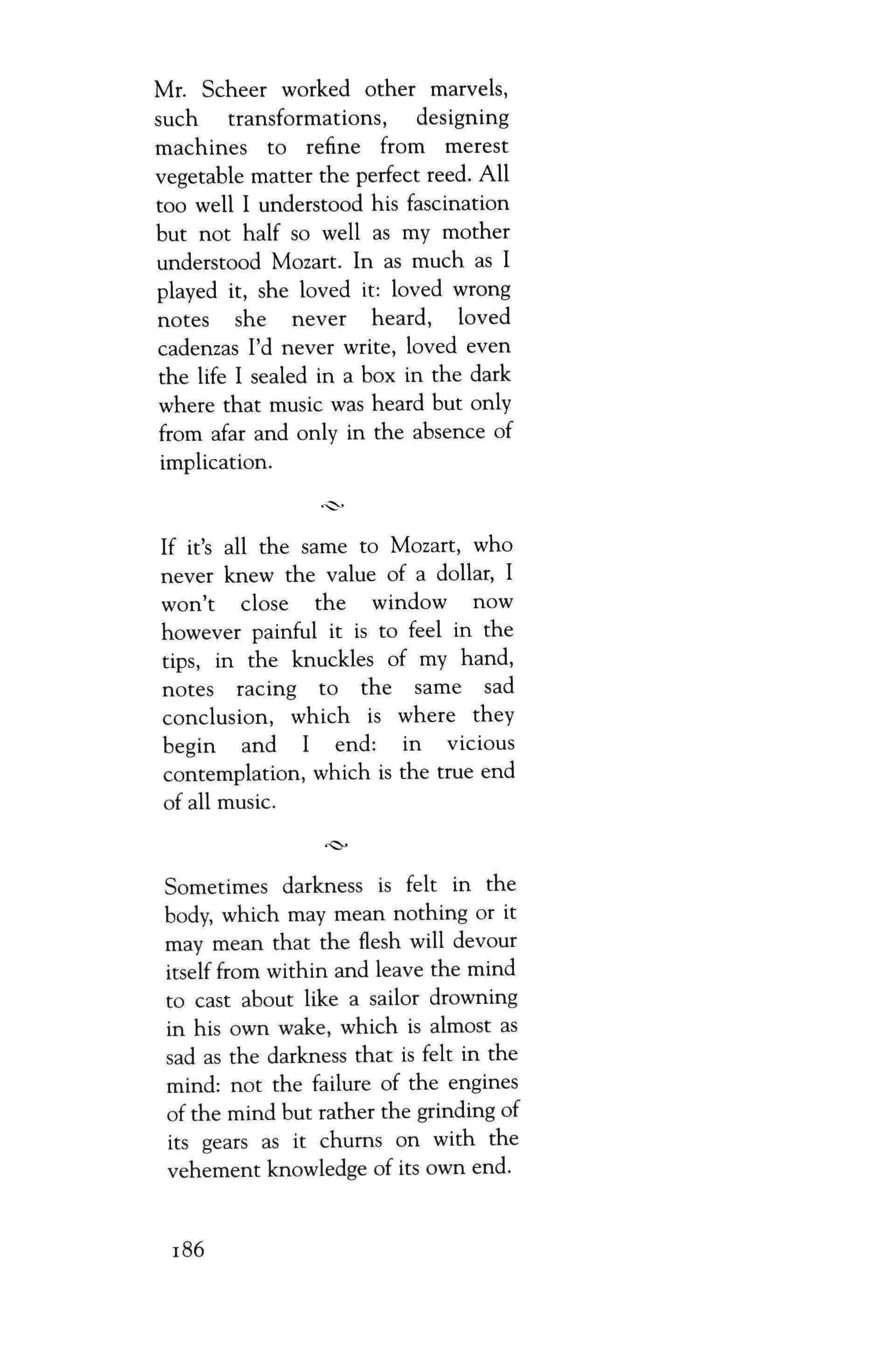
Sometimes darkness is felt in the body, which may mean nothing or it may mean that the flesh will devour itself from within and leave the mind to cast about like a sailor drowning in his own wake, which is almost as sad as the darkness that is felt in the mind: not the failure of the engines of the mind but rather the grinding of its gears as it chums on with the vehement knowledge of its own end.
186

What is it a gift sours into when it goes unused because it will not suffice: is such waste a sin and will it really cause harm? I knew the check my father struggled to write each week felt not like a sin but like a punishment he never intended, as if each week I knew with escalating clarity the failure of my body's own song, and my punishment was the way it would seem to be a kind of talent filling the room with mourning and not some other inevitability: the case clicking shut again and the latches squeezing down.
I am here now and you are not, nor will you be in what we find foreseeable. And it's true I can't actually feel when you take your hands from your lap and set them on the white bones of the beast before you with its black teeth and the steely lengths of tone from which I might, if I were clever, divine either mood or placement of hands or a sense of the breathless fury that drove you up the steps and before the strict engine of song you pedal toward me.
There is such disappointment in the air that at times I forget that the care of self is really the care of things, of all the things of this world: breaking the instrument into its constituents

and swabbing its humid innards with a purple cloth incapable of concealing the way the body spends itself, the way it heaves about to make song. The only song I knew I played in the shameless anticipation of transport. How beautiful of you to last and with such seeming little effort. Now I feel how those few simple notes came to be bound as they are, came to cling to a structure I cannot see from where I am, which is far relative to the dark heart in which I heard what was to involve me as thoroughly as it has. There is that still quality in the air: a man placing hands on cold keys because that is all there is before him. In the kitchen, his mother hums the notes she taught him. Now I hear them too. Now I am ready to begin.
188
Ron De Maris

The Severn
Where the river turns in shadow, widens
For the entering stream now grown thick
With floodtide's refuse, alders, oak, the fens
Flatten and dry out, a froth of pink-
Tipped grass holds a shallow beachhead then fades
To tumbled cliff face, boulders strewn
With lichen and then the heavy shades
Of maple, oak and birch. The land is thrown
By some giant hand everywhere toward water,
Whole fields of com tumble to the sea,
Sweet hay, cow flops, flies, the treasure
Of summer burials, the wind's persistent bees.
What good is memory if we cannot skirt
The truth a bit and make the river flow
Forever silvered in our minds? The hurt
Of honeysuckle is a letting go.
The Lawn Like a Forest Calling

Night closes and the man and woman sitting on the doorstep are caught at the moment when thoughts have vanished the way wine runs out the tall stem of a wineglass you thought would last forever. They see over the lawn, over the rose tipped blades of natal grass, something waiting at sunset. Trees are lush in the falling light. Hopper knew this couple well, children gone, parents dead, friends retired and spread by the wind. They, too, have stopped talking, words gone like the leaves tumbling yellow and red; such a bright departure! The grass is enfolding, at last, like hands comforting. They gaze across the lawn and the dark cave of the forest rises like a remembrance, like home.
Vincent, at Saint Paul's Sanitarium, Saint Remy de Provence
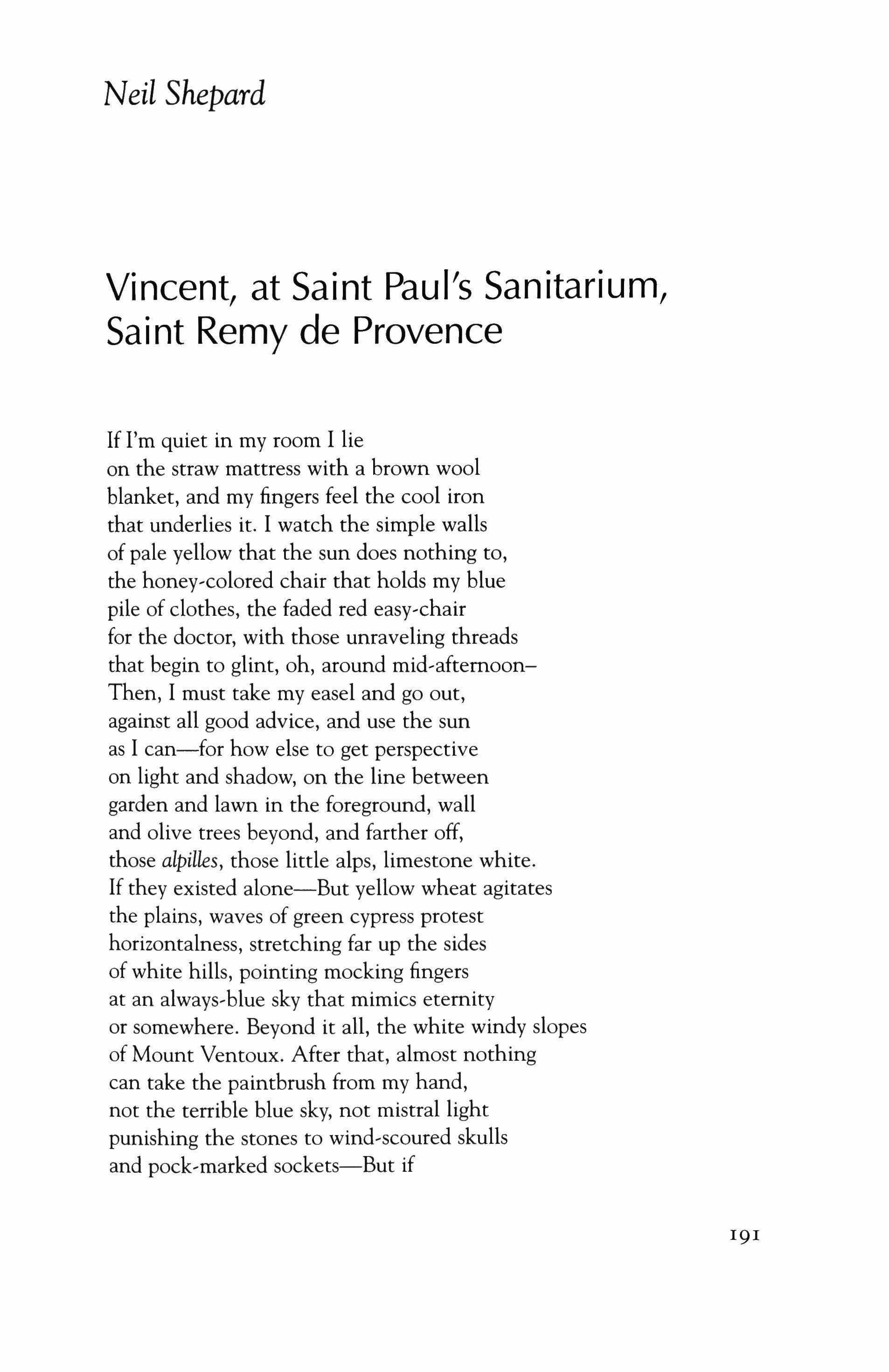
If I'm quiet in my room I lie on the straw mattress with a brown wool blanket, and my fingers feel the cool iron that underlies it. I watch the simple walls of pale yellow that the sun does nothing to, the honey-colored chair that holds my blue pile of clothes, the faded red easy'chair for the doctor, with those unraveling threads that begin to glint, oh, around mid,afternoonThen, I must take my easel and go out, against all good advice, and use the sun as I can-for how else to get perspective on light and shadow, on the line between garden and lawn in the foreground, wall and olive trees beyond, and farther off, those alpilles, those little alps, limestone white. If they existed alone-But yellow wheat agitates the plains, waves of green cypress protest horizontalness, stretching far up the sides of white hills, pointing mocking fingers at an always,blue sky that mimics eternity or somewhere. Beyond it all, the white windy slopes of Mount Ventoux. After that, almost nothing can take the paintbrush from my hand, not the terrible blue sky, not mistral light punishing the stones to wind-scoured skulls and pock,marked sockets-But if
Neil Shepard

it becomes impossible for me, I must go to that other room, across the hall from mine, where metal tubs the size of sarcophagi are fitted with dull wooden tops, fitted perfectly but for two holes-for my head and feeta sort of horizontal pillory-but not altogether unpleasant. For I am soothed by the warm bath waters, tucked in, bibbed, by this long wooden "smock," with my head on a platter at one end and my scaly toes waving vertically in the distance. Then-the unpleasant splash of ice'water on my brain-a shock to my mind so complete, it shakes the sun from my eyes, blackens the blue sky to a starless night, and completes me with a colorless towel thrown over my head until I stop shivering and am dry and without perspective.
Friedrich Holderlin
Translated by Maxine Chernoffand Paul Hoover

The Night Songs
Chiron
Where are you, thoughtful one, who now Must move beside me, where are you, light?
The heart is awake but angry; always now The astounding night confines me.
For I searched for herbs in the woods, And heard soft game on the hillside, And never once did your birds disappoint me, Never; for almost too quickly you'd come,
When foal or garden gave comfort, Advising, for the heart's sake; where are you, light?
The heart is awake once more, but, heartless, Night's power wins my affection.
Yes, it's really me. For me, earth picked the first Bouquet of crocus, thyme, and grain, and in The coolness of the stars I learned, but Only what can be named. Disenchanting,
Now mournful, the wild meadow, Zeus's helper, Half a god, sat directly down beside me.
But now I sit alone in silence, Hour after hour, and, since poison stands
193

Between us, my mind makes shapes From fresh earth and the clouds of love; And I strain to hear at a distance if A kindly savior is coming in my direction.
Often I hear the Thunderer's clattering wagon
At noon, when the famous man comes near, When his own house is cleansed to its Shaken foundations, and anguish becomes an echo.
Then I hear my savior in the night, I hear Him kill, this liberator, and down below As in visions filled with dense vegetation, I see the earth, a storm of fire;
But the days pass, lovely and awful, and When one looks closely, there's suffering, Since people are of two natures, And no one knows which is best.
But that's the gods' sting; otherwise, No one could love divine injustice. But God feels at home there and when He shows his face, the earth is changed.
Day! Day! Once more you can breathe, then drink, Willow of the stream, light of the eyes, And footsteps are sure and true As a king in spurs, and, caught
In your own orbit, planet of days, you appear, Peaceful cradle, earth, and you also, House of my inconstant fathers, who Traveled among clouds of forest creatures.
Now take a horse and armor and take A light spear, son. The prophecy Will not tear, and not in vain. Heracles' return awaits its fulfillment.
194
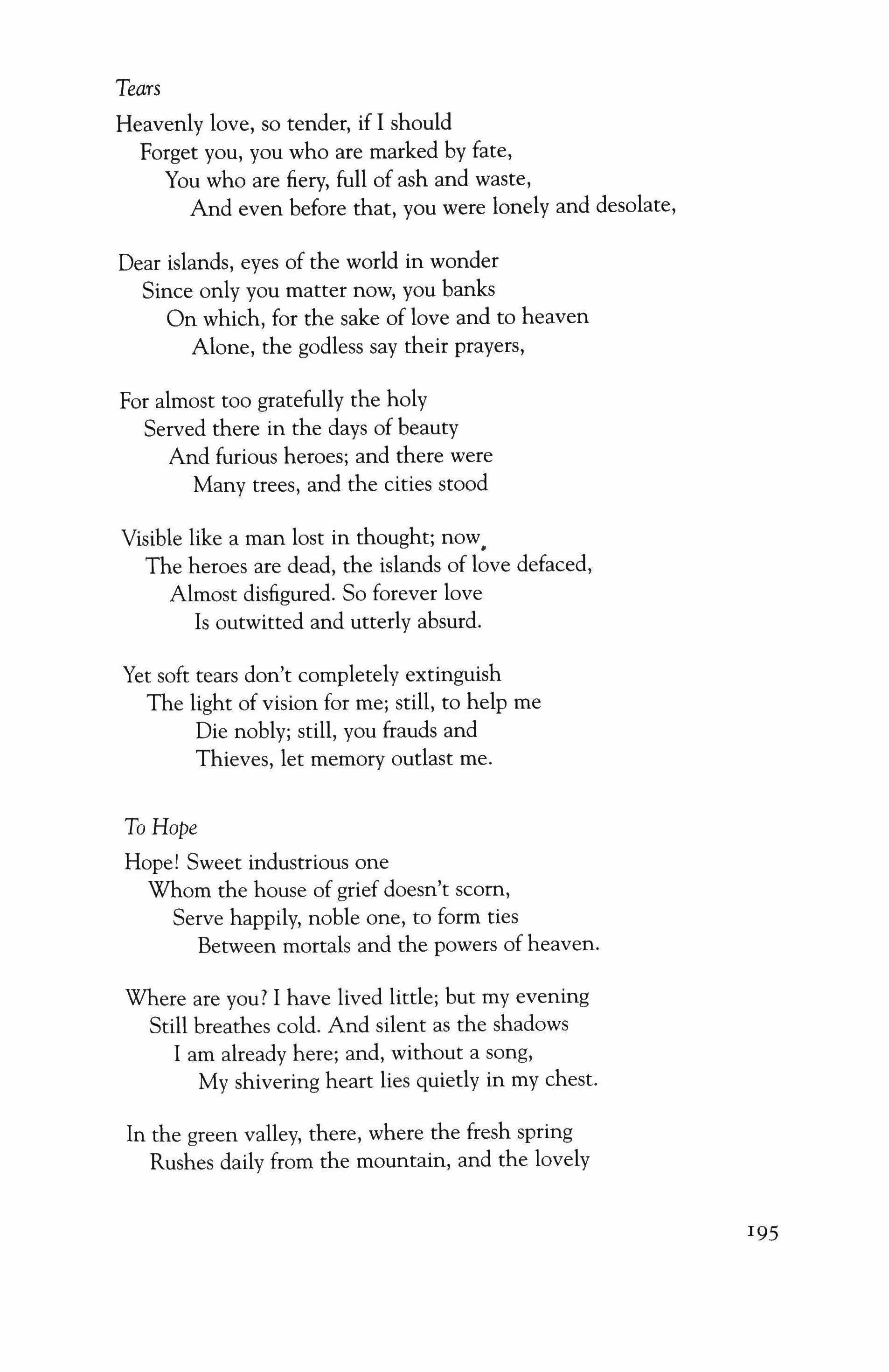
Tears
Heavenly love, so tender, if I should Forget you, you who are marked by fate, You who are fiery, full of ash and waste, And even before that, you were lonely and desolate,
Dear islands, eyes of the world in wonder Since only you matter now, you banks On which, for the sake of love and to heaven Alone, the godless say their prayers,
For almost too gratefully the holy Served there in the days of beauty And furious heroes; and there were Many trees, and the cities stood
Visible like a man lost in thought; now
The heroes are dead, the islands of love defaced, Almost disfigured. So forever love Is outwitted and utterly absurd.
Yet soft tears don't completely extinguish The light of vision for me; still, to help me Die nobly; still, you frauds and Thieves, let memory outlast me.
To Hope Hope! Sweet industrious one
Whom the house of grief doesn't scorn, Serve happily, noble one, to form ties Between mortals and the powers of heaven.
Where are you? I have lived little; but my evening Still breathes cold. And silent as the shadows I am already here; and, without a song, My shivering heart lies quietly in my chest.
In the green valley, there, where the fresh spring Rushes daily from the mountain, and the lovely
I95

Meadow saffron blooms for me on a fall day, There, in the quiet, I will search for you,
My dear, or when at midnight
The invisible lives of the forest stir And above me the ever-joyful flowers, The flowering stars, are shining,
Daughter of the upper air, you appear to me Out of your father's garden, and if you cannot Draw near as a spirit of the earth, Terrify my heart with a different face.
Vulcan
You come now, friendly spirit of fire, And veil the tender minds of women in clouds, In golden dreams, and keep safe The blossoming calm of the always good.
Let man be content with his thoughts, and his work, And his shining candles, and the future day. Let him be free of annoyances
And too many hateful worries,
When now the ever-raging Boreas, My old rival, strikes the land with frost Overnight, and late, past the hour of sleep, Mocking at men, sings his frightening war-song,
And tears down our city walls and the fences
We built with effort and the quiet grove, And even disturbs my soul in the middle Of its song, the old destroyer,
And restlessly he roars over the gentle stream
And throws down his black clouds, that, far and wide, Shred the valley to pieces, and, like falling leaves, Rocks fall from the fractured hills.
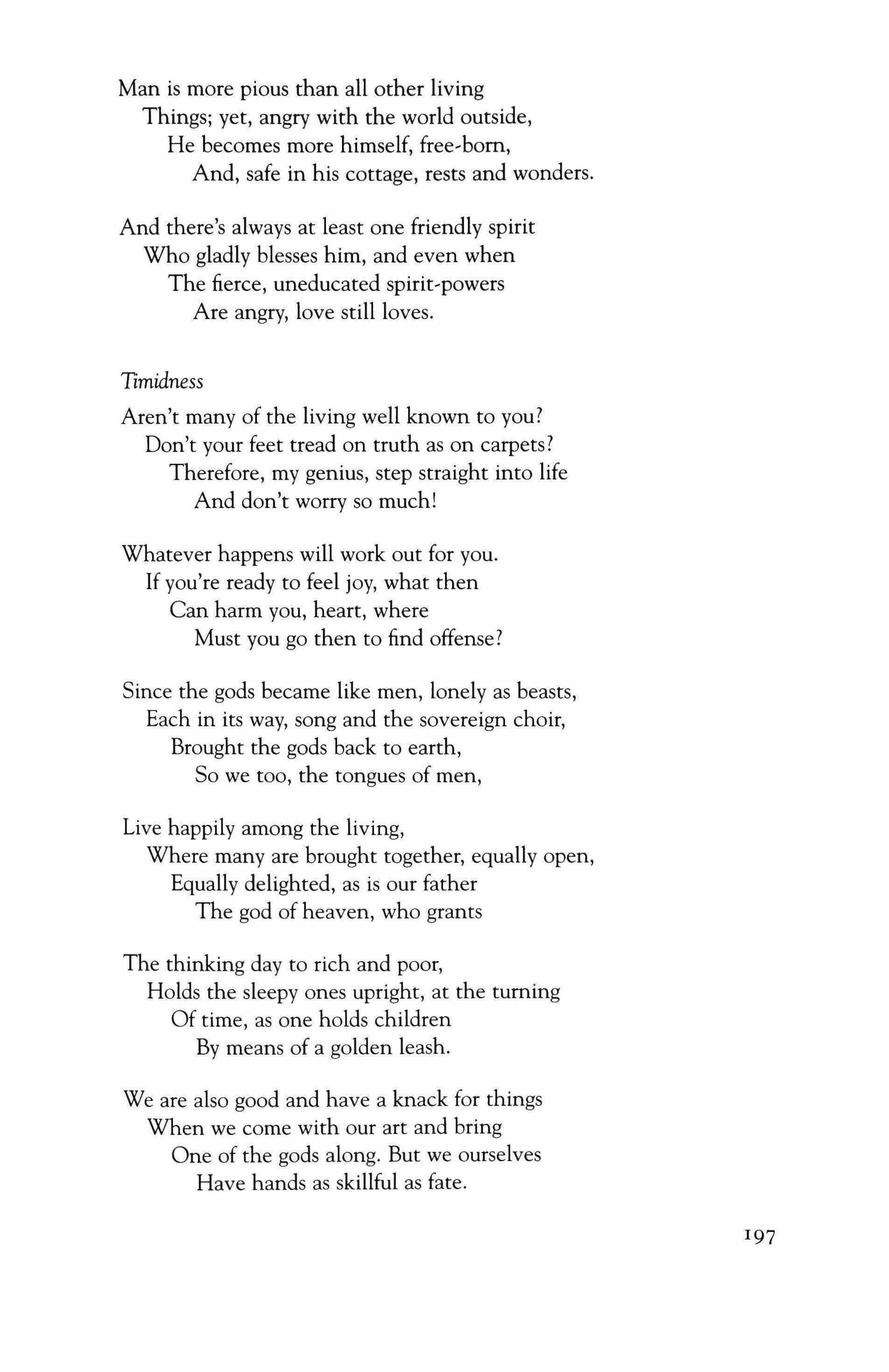
Man is more pious than all other living Things; yet, angry with the world outside, He becomes more himself, free-born, And, safe in his cottage, rests and wonders.
And there's always at least one friendly spirit Who gladly blesses him, and even when The fierce, uneducated spirit-powers Are angry, love still loves.
Timidness
Aren't many of the living well known to you? Don't your feet tread on truth as on carpets? Therefore, my genius, step straight into life And don't worry so much!
Whatever happens will work out for you. If you're ready to feel joy, what then Can harm you, heart, where Must you go then to find offense?
Since the gods became like men, lonely as beasts, Each in its way, song and the sovereign choir, Brought the gods back to earth, So we too, the tongues of men,
Live happily among the living, Where many are brought together, equally open, Equally delighted, as is our father The god of heaven, who grants
The thinking day to rich and poor, Holds the sleepy ones upright, at the turning Of time, as one holds children By means of a golden leash.
We are also good and have a knack for things When we come with our art and bring One of the gods along. But we ourselves Have hands as skillful as fate.
197

Ganymede
Why do you sleep so crookedly, ill-tempered, And freeze on the bare banks, patient as A goatherd? Why think of grace when Even the gods are thirsty at the table?
Don't you recognize your father's messengers, Where sharper winds cut through the ravine? Doesn't the invitation of a well-traveled man Strike home its ancient meaning?
Now it resounds in his breast, deeply welling up, As when he slept high upon the rock. In anger now, the one in chains Bathes himself, and now he hurries,
Clumsily; now he mocks his chains and Takes and breaks and throws them down, Drunk with anger, playing here and there, As the riverbanks observe him, and at this stranger's
Peculiar voice, the resting herds rise, The woods awaken, and deep in the land You can hear the river god's voice, and stirring At the earth's core the spirit shudders once more.
Spring comes. And everything, in its own way, Blossoms. But he is distant, no longer there. He's nothing now; because geniuses, All too good, chat away in heaven now.
HalfofLife
Weighted with yellow pears And full of wild roses, The land flows into the lake.
Drunk with kisses, Swans dip their heads Into calm and holy water.
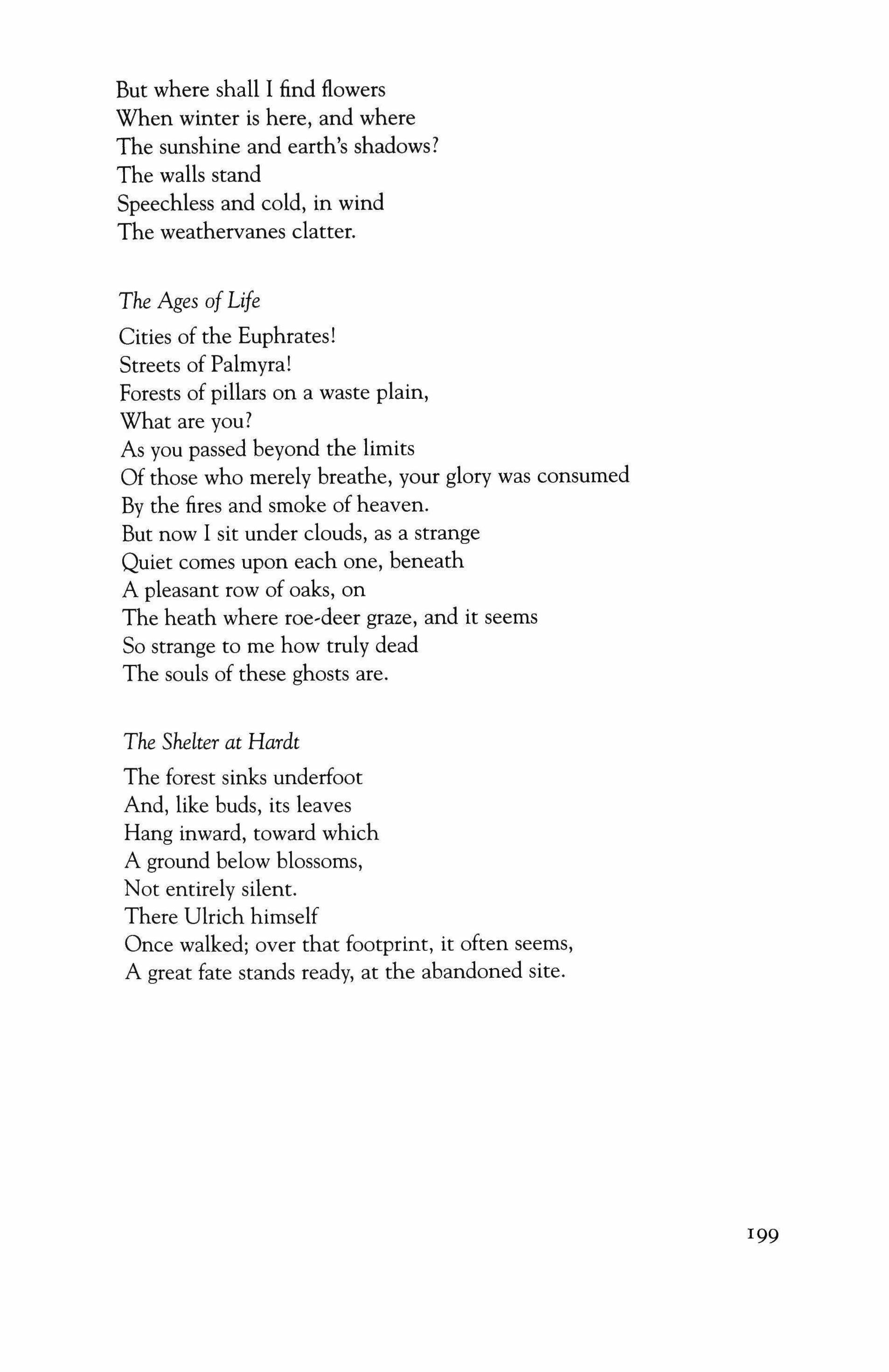
But where shall I find flowers
When winter is here, and where
The sunshine and earth's shadows?
The walls stand
Speechless and cold, in wind
The weathervanes clatter.
The Ages ofLife
Cities of the Euphrates!
Streets of Palmyra!
Forests of pillars on a waste plain, What are you?
As you passed beyond the limits
Of those who merely breathe, your glory was consumed
By the fires and smoke of heaven.
But now I sit under clouds, as a strange
Quiet comes upon each one, beneath
A pleasant row of oaks, on
The heath where roe-deer graze, and it seems
So strange to me how truly dead
The souls of these ghosts are.
The Shelter at Hardt
The forest sinks underfoot
And, like buds, its leaves Hang inward, toward which A ground below blossoms,
Not entirely silent.
There Ulrich himself
Once walked; over that footprint, it often seems, A great fate stands ready, at the abandoned site.
199
Robert Hahn

Motion, Energy, and Revelation:
Tintoretto's Last Suppers
1591: The Island of San Giorgio
San Giorgio Maggiore is the newest church in Venice. It has an isolate, magisterial setting and a matchless view, sweeping across the lagoon to the domes of San Marco, and one day it will be an elegant and inspiring landmark itself. Twenty years will need to pass, however, before Andrea Palladio's gleaming facade is attached, and so for the moment its front is a drab, functional wall ofbrown brick and stone, quite lacking in charm. But the interior decoration of the church is nearly complete, and it is extremely impressive, since the Benedictines, whose pockets were deep enough to build this magnificent church with its generous display of carved stone, and to hire Palladio as their architect, have commissioned work from the city's leading artists.
There is none more illustrious, at least among the living, than the man we see emerging from the portal this moming-Jacopo Robusti, detto Tintoretto----although he was not always so well known or well regarded. At the outset of his career he struggled ferociously, first to eke out a living and then to secure a reputation, becoming infamous in the process for hustling and sharp practices (he hawked canvasses on the Rialto and took commissions for the price of materials alone, to undercut the competition). He remained controversial and suspect even after becoming renowned and was kept at arm's length by the city's artistic power-elite (Titian, Sansovino, Aretino) and their patrician friends. 200
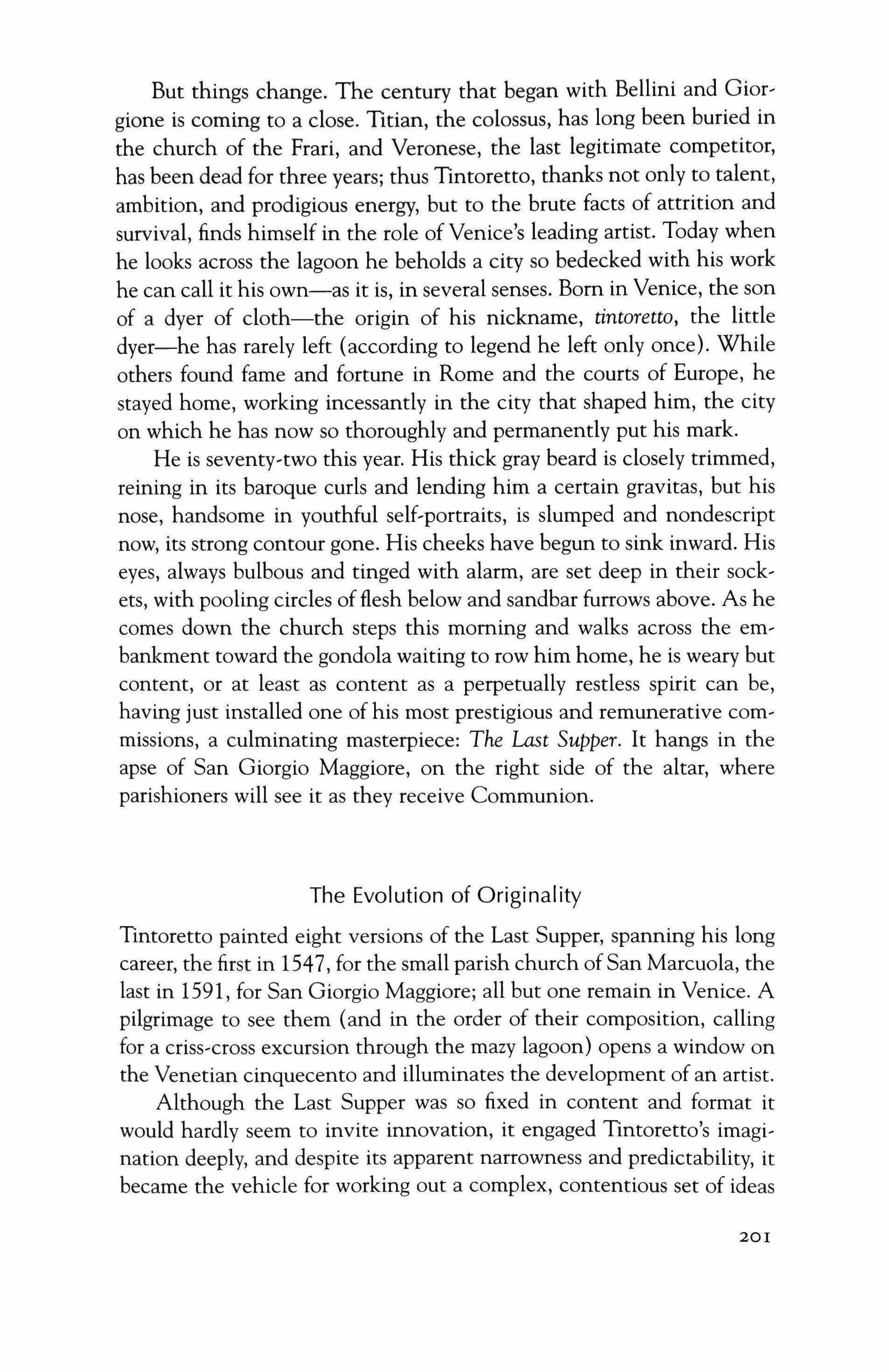
But things change. The century that began with Bellini and Giorgione is coming to a close. Titian, the colossus, has long been buried in the church of the Frari, and Veronese, the last legitimate competitor, has been dead for three years; thus Tintoretto, thanks not only to talent, ambition, and prodigious energy, but to the brute facts of attrition and survival, finds himself in the role of Venice's leading artist. Today when he looks across the lagoon he beholds a city so bedecked with his work he can call it his own-as it is, in several senses. Born in Venice, the son of a dyer of cloth-the origin of his nickname, tintoretto, the little dyer-he has rarely left (according to legend he left only once). While others found fame and fortune in Rome and the courts of Europe, he stayed home, working incessantly in the city that shaped him, the city on which he has now so thoroughly and permanently put his mark.
He is seventy-two this year. His thick gray beard is closely trimmed, reining in its baroque curls and lending him a certain gravitas, but his nose, handsome in youthful self-portraits, is slumped and nondescript now, its strong contour gone. His cheeks have begun to sink inward. His eyes, always bulbous and tinged with alarm, are set deep in their sockets, with pooling circles of flesh below and sandbar furrows above. As he comes down the church steps this morning and walks across the embankment toward the gondola waiting to row him home, he is weary but content, or at least as content as a perpetually restless spirit can be, having just installed one of his most prestigious and remunerative commissions, a culminating masterpiece: The Last Supper. It hangs in the apse of San Giorgio Maggiore, on the right side of the altar, where parishioners will see it as they receive Communion.
The Evolution of Originality
Tintoretto painted eight versions of the Last Supper, spanning his long career, the first in 1547, for the small parish church of San Marcuola, the last in 1591, for San Giorgio Maggiore; all but one remain in Venice. A pilgrimage to see them (and in the order of their composition, calling for a criss-cross excursion through the mazy lagoon) opens a window on the Venetian cinquecento and illuminates the development of an artist.
Although the Last Supper was so fixed in content and format it would hardly seem to invite innovation, it engaged Tintoretto's imagination deeply, and despite its apparent narrowness and predictability, it became the vehicle for working out a complex, contentious set of ideas
201
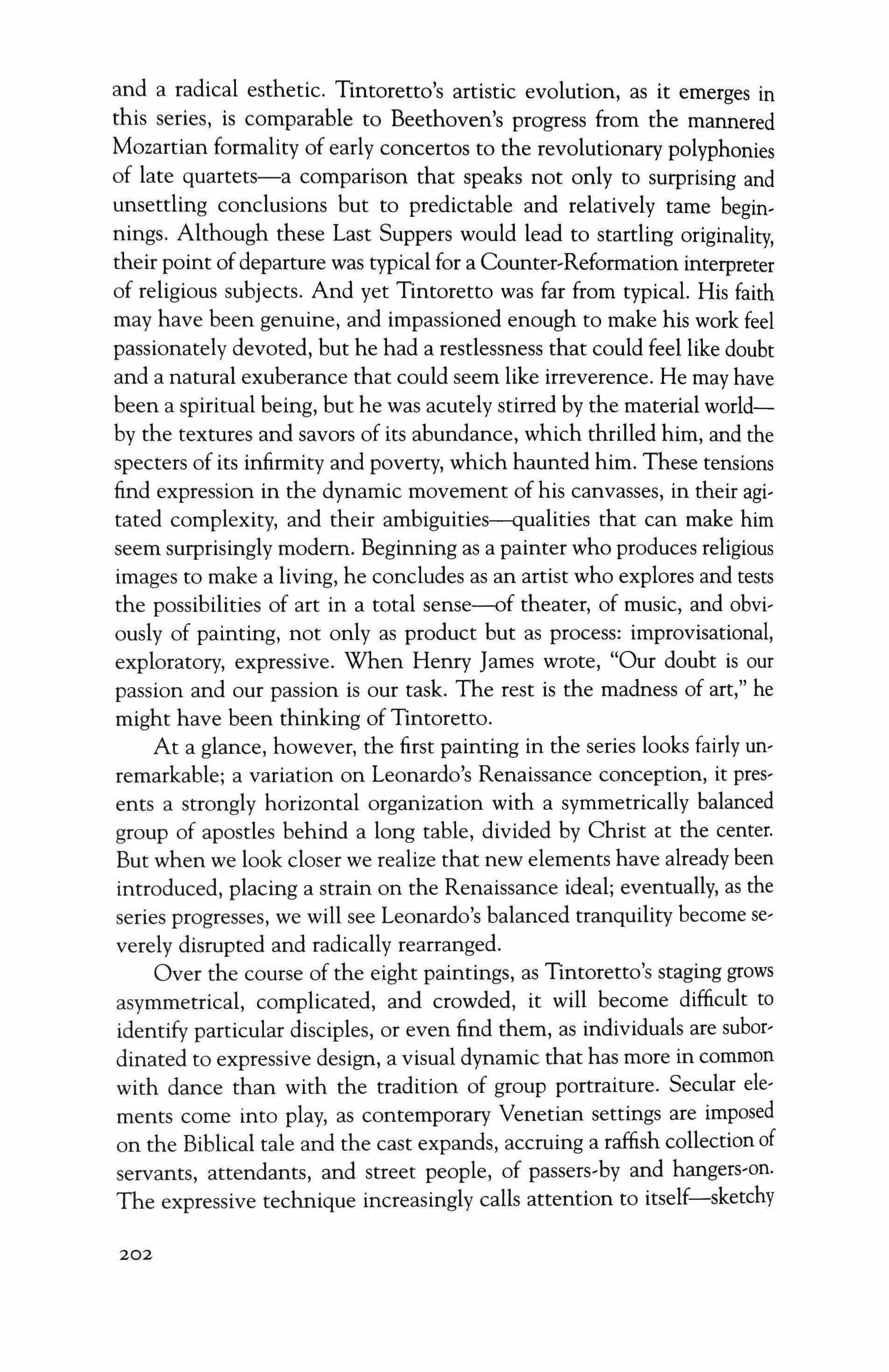
and a radical esthetic. Tintoretto's artistic evolution, as it emerges in this series, is comparable to Beethoven's progress from the mannered Mozartian formality of early concertos to the revolutionary polyphonies of late quartets-a comparison that speaks not only to surprising and unsettling conclusions but to predictable and relatively tame beginnings. Although these Last Suppers would lead to startling originality, their point ofdeparture was typical for a Counter-Reformation interpreter of religious subjects. And yet Tintoretto was far from typical. His faith may have been genuine, and impassioned enough to make his work feel passionately devoted, but he had a restlessness that could feel like doubt and a natural exuberance that could seem like irreverence. He may have been a spiritual being, but he was acutely stirred by the material worldby the textures and savors of its abundance, which thrilled him, and the specters of its infirmity and poverty, which haunted him. These tensions find expression in the dynamic movement of his canvasses, in their agitated complexity, and their ambiguities--qualities that can make him seem surprisingly modem. Beginning as a painter who produces religious images to make a living, he concludes as an artist who explores and tests the possibilities of art in a total sense-of theater, of music, and obviously of painting, not only as product but as process: improvisational, exploratory, expressive. When Henry James wrote, "Our doubt is our passion and our passion is our task. The rest is the madness of art," he might have been thinking of Tintoretto.
At a glance, however, the first painting in the series looks fairly unremarkable; a variation on Leonardo's Renaissance conception, it presents a strongly horizontal organization with a symmetrically balanced group of apostles behind a long table, divided by Christ at the center. But when we look closer we realize that new elements have already been introduced, placing a strain on the Renaissance ideal; eventually, as the series progresses, we will see Leonardo's balanced tranquility become severely disrupted and radically rearranged.
Over the course of the eight paintings, as Tintoretto's staging grows asymmetrical, complicated, and crowded, it will become difficult to identify particular disciples, or even find them, as individuals are subordinated to expressive design, a visual dynamic that has more in common with dance than with the tradition of group portraiture. Secular elements come into play, as contemporary Venetian settings are imposed on the Biblical tale and the cast expands, accruing a raffish collection of servants, attendants, and street people, of passers-by and hangers-on. The expressive technique increasingly calls attention to itself-sketchy
202

brushwork, heavy chiaroscuro, and virtuoso foreshortening (catching figures in strenuous, agitated action). Exuberant stagecraft abounds, as ramps, platforms, and stairways complicate and deepen the stage, as light pours in from mysterious sources, as dramatic shadows deepen. These strategies, all in all, create a world where inclusiveness mat' ters more than balance, and where energy is privileged over order. Where contradictions are entertained, where ambiguity and tension are the nature of things, where gritty realism and flamboyant artifice con' tend. Distinctions-between material and ethereal worlds, between spiritual longings and mortal hungers-become blurred, and boundaries tend to dissolve. Forces take on divergent forms. Spirit can appear in a diaphanous angel or the supernal glow of the Holy Ghost, and in the ruddy flesh of a serving woman, whose blouse slips from her shoulder, or the muscular legs of an attendant, whose exertions tum labor into ballet. The Last Supper is always a ritual, but in Tintoretto it becomes per' formance as well. As ritual it responds to spiritual hungers; as performance it meets our need for art-for its sensuous gratification, and for its evocation of an alternate world where anything is possible.
San Marcuola
We left Tintoretto on the island of San Giorgio, our eventual destination and now our point of departure. Since no gondola awaits us, we need to catch the 82 vaporetto, which will take us across the lagoon to San Marco and then up the Grand Canal, around the first of its serpentine swerves, and under the low stone arch of the Rialto bridge (although in Tintoretto's day it was wooden). Not far beyond the Fondaco dei Tedeschi-a bulky, nondescript building that in the cinquecento was resplendent, since Titian and Giorgione had painted frescoes on its adjoining outer walls-is the small church of San Marcuola.
Although neglected and little known, it sits on a piece of prime Grand Canal real estate, and in its day it hoped to display a handsome face to Venetian glitterati as they glided by-but centuries later the entrance is still a hodge-podge of rough stone and brick, pocked with cavities meant to anchor a facade the parishioners could never afford. Today the church is shut tight much of the time, no longer supports a congregation, and has only one lingering distinction: the Last Supper Tintoretto painted in 1547.
For the work of an artist who would fall in love with displacements
203

and diagonals, who would be a devotee of receding depth, the composition is uncharacteristically symmetrical and the scene is atypically set at the front edge of a shallow space. The banquet table rests on a platform, an architectural feature important to later Last Suppers but here seen only in the most incipient form-a single low step, supporting a floor of light and dark marble squares. A space on each wing is filled by a serving woman, each appearing in profile as she approaches the table, one holding out a goblet, the other a bowl of food. Their similarities of pose and position add to the overall stability and horizontality of a composition whose vertical dimension is so compressed (fourteen and a halffeet wide, the painting is only five feet high) that the top of the frame rests on the head of Jesus.
He sits at the center of the table. Turning slightly, wearing a stylized, beatific smile and gazing through half-lidded eyes, he has been described as a Byzantine Christ in a Renaissance setting, a characterization enhanced by the formalized filigree ofhis halo, shooting spikes ofgold light at the nearest apostles. But other parts of the scene have already broken with tradition. In Leonardo's Last Supper the disciples were all grouped behind the table but here they flow around the ends and around to the other side, where two are sitting with their backs to us. Traditionally the disciples were frozen in distinct, exemplary tableaux but here, although they are rendered realistically, their individual identities are subordinated to design, to an interwoven dance of forms in motion (save for two figures on either side of Christ, motionless, like vestiges of an older conception). Leonardo's disciples were not entirely static-they gestured, leaned, and clustered in groups-but each of his figures was so clearly etched as to look isolated and illustrative. In Tlntoretto what matters is not who the disciples are but how they act, how they move, in a flickering sway of half-obscured faces and averted gazes, an effect that will become a Tintoretto trademark, like the eye-catching antics of the disciple in the right foreground, sitting with his back to us: his pleated pink robe slips from his shoulder as he suddenly turns, in agitation, to look down the long table, caught in the act of pressing his palm to the table and starting to rise from his stool.
And we will meet other versions of the women on the wings, who introduce Tlntoretto's strategy of calling on marginal figures to elaborate major themes. The woman entering from the left, who has just stepped up onto the low platform, lifting the skirt of her silvery-green gown and flashing a handsome leg, is ostensibly a serving woman, and yet, withher blond hair braided and piled, and her discreet decolletage, she could be
204
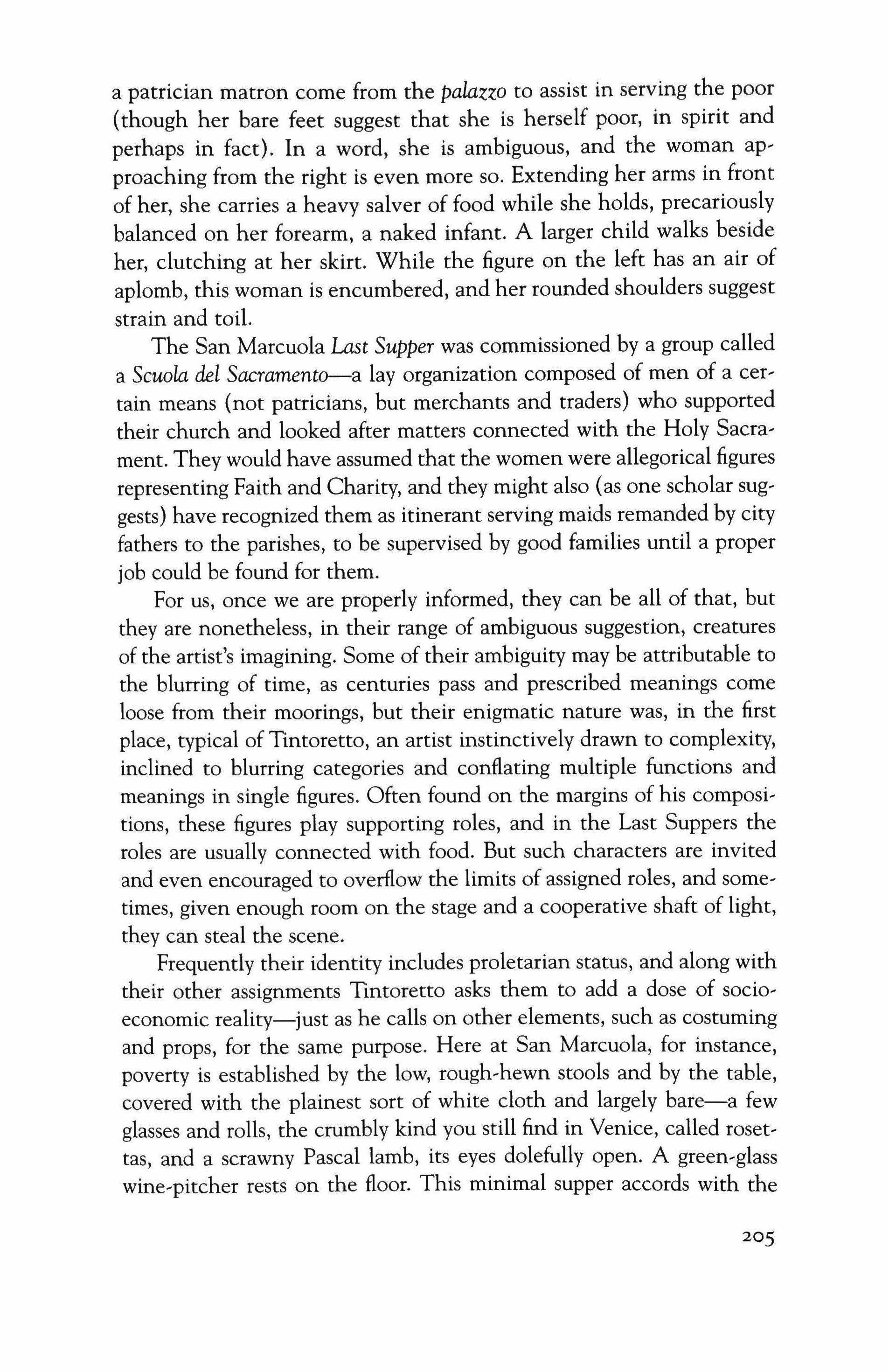
a patrician matron come from the palazzo to assist in serving the poor (though her bare feet suggest that she is herself poor, in spirit and perhaps in fact). In a word, she is ambiguous, and the woman approaching from the right is even more so. Extending her arms in front of her, she carries a heavy salver of food while she holds, precariously balanced on her forearm, a naked infant. A larger child walks beside her, clutching at her skirt. While the figure on the left has an air of aplomb, this woman is encumbered, and her rounded shoulders suggest strain and toil.
The San Marcuola Last Supper was commissioned by a group called a Scuola del Sacramento-a lay organization composed of men of a certain means (not patricians, but merchants and traders) who supported their church and looked after matters connected with the Holy Sacra, ment. They would have assumed that the women were allegorical figures representing Faith and Charity, and they might also (as one scholar suggests) have recognized them as itinerant serving maids remanded by city fathers to the parishes, to be supervised by good families until a proper job could be found for them.
For us, once we are properly informed, they can be all of that, but they are nonetheless, in their range of ambiguous suggestion, creatures of the artist's imagining. Some of their ambiguity may be attributable to the blurring of time, as centuries pass and prescribed meanings come loose from their moorings, but their enigmatic nature was, in the first place, typical of Tintoretto, an artist instinctively drawn to complexity, inclined to blurring categories and conflating multiple functions and meanings in single figures. Often found on the margins of his compositions, these figures play supporting roles, and in the Last Suppers the roles are usually connected with food. But such characters are invited and even encouraged to overflow the limits of assigned roles, and some, times, given enough room on the stage and a cooperative shaft of light, they can steal the scene.
Frequently their identity includes proletarian status, and along with their other assignments Tintoretto asks them to add a dose of socioeconomic reality-just as he calls on other elements, such as costuming and props, for the same purpose. Here at San Marcuola, for instance, poverty is established by the low, rough-hewn stools and by the table, covered with the plainest sort of white cloth and largely bare-a few glasses and rolls, the crumbly kind you still find in Venice, called rosettas, and a scrawny Pascal lamb, its eyes dolefully open. A green-glass wine-pitcher rests on the floor. This minimal supper accords with the
205
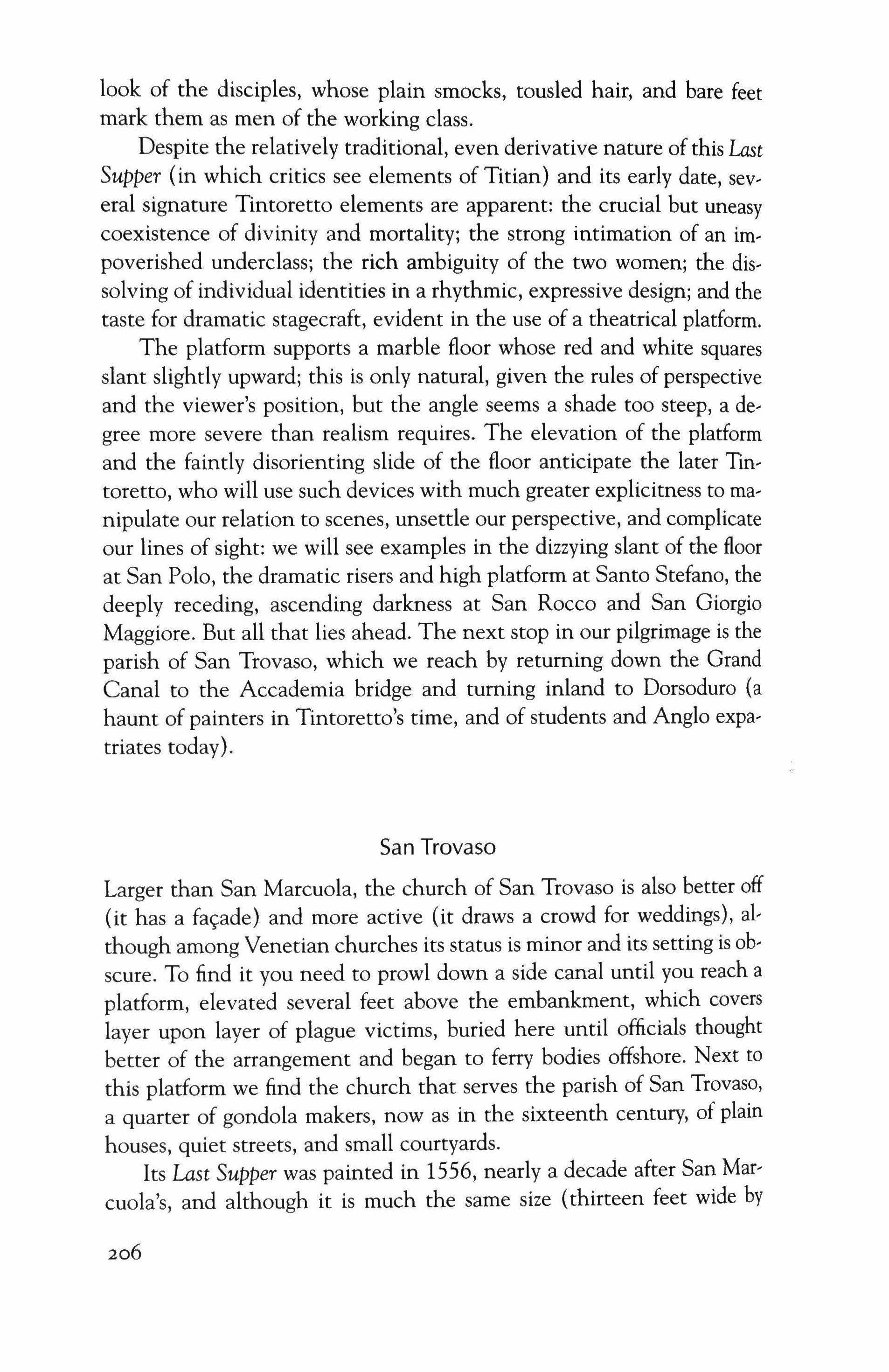
look of the disciples, whose plain smocks, tousled hair, and bare feet mark them as men of the working class.
Despite the relatively traditional, even derivative nature of this Last Supper (in which critics see elements of Titian) and its early date, several signature Tintoretto elements are apparent: the crucial but uneasy coexistence of divinity and mortality; the strong intimation of an impoverished underclass; the rich ambiguity of the two women; the dissolving of individual identities in a rhythmic, expressive design; and the taste for dramatic stagecraft, evident in the use of a theatrical platform.
The platform supports a marble floor whose red and white squares slant slightly upward; this is only natural, given the rules of perspective and the viewer's position, but the angle seems a shade too steep, a degree more severe than realism requires. The elevation of the platform and the faintly disorienting slide of the floor anticipate the later Tintoretto, who will use such devices with much greater explicitness to manipulate our relation to scenes, unsettle our perspective, and complicate our lines of sight: we will see examples in the dizzying slant of the floor at San Polo, the dramatic risers and high platform at Santo Stefano, the deeply receding, ascending darkness at San Rocco and San Giorgio Maggiore. But all that lies ahead. The next stop in our pilgrimage is the parish of San Trovaso, which we reach by returning down the Grand Canal to the Accademia bridge and turning inland to Dorsoduro (a haunt of painters in Tintoretto's time, and of students and Anglo expatriates today).
San Trovaso
Larger than San Marcuola, the church of San Trovaso is also better off (it has a facade) and more active (it draws a crowd for weddings), although among Venetian churches its status is minor and its setting is obscure. To find it you need to prowl down a side canal until you reach a platform, elevated several feet above the embankment, which covers layer upon layer of plague victims, buried here until officials thought better of the arrangement and began to ferry bodies offshore. Next to this platform we find the church that serves the parish of San Trovaso, a quarter of gondola makers, now as in the sixteenth century, of plain houses, quiet streets, and small courtyards.
Its Last Supper was painted in 1556, nearly a decade after San Marcuola's, and although it is much the same size (thirteen feet wide by
206
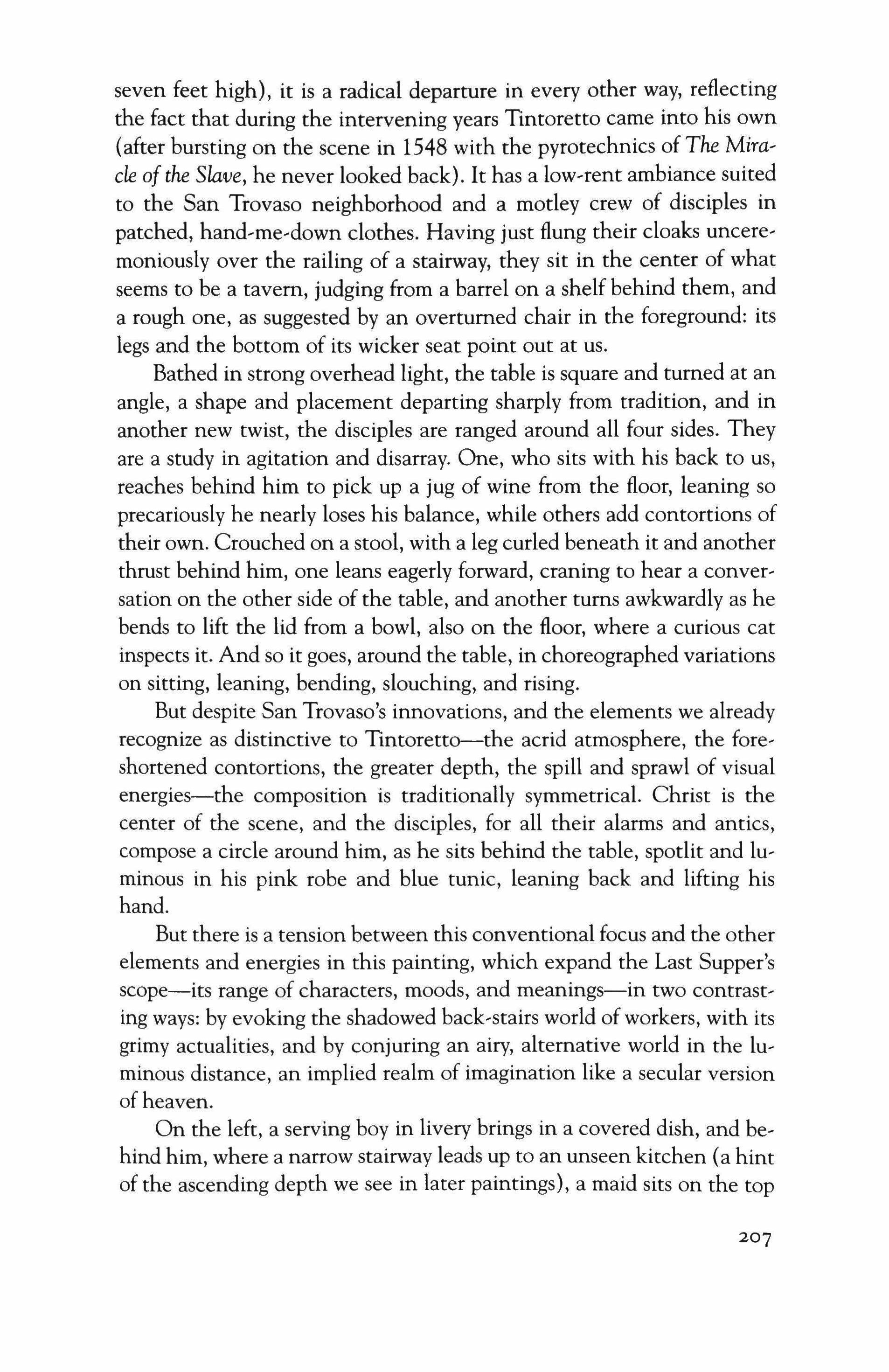
seven feet high), it is a radical departure in every other way, reflecting the fact that during the intervening years Tintoretto came into his own (after bursting on the scene in 1548 with the pyrotechnics of The Mira� ele of the Slave, he never looked back). It has a low-rent ambiance suited to the San Trovaso neighborhood and a motley crew of disciples in patched, hand-me-down clothes. Having just flung their cloaks unceremoniously over the railing of a stairway, they sit in the center of what seems to be a tavern, judging from a barrel on a shelf behind them, and a rough one, as suggested by an overturned chair in the foreground: its legs and the bottom of its wicker seat point out at us.
Bathed in strong overhead light, the table is square and turned at an angle, a shape and placement departing sharply from tradition, and in another new twist, the disciples are ranged around all four sides. They are a study in agitation and disarray. One, who sits with his back to us, reaches behind him to pick up a jug of wine from the floor, leaning so precariously he nearly loses his balance, while others add contortions of their own. Crouched on a stool, with a leg curled beneath it and another thrust behind him, one leans eagerly forward, craning to hear a conversation on the other side of the table, and another turns awkwardly as he bends to lift the lid from a bowl, also on the floor, where a curious cat inspects it. And so it goes, around the table, in choreographed variations on sitting, leaning, bending, slouching, and rising.
But despite San Trovaso's innovations, and the elements we already recognize as distinctive to Tintoretto-the acrid atmosphere, the foreshortened contortions, the greater depth, the spill and sprawl of visual energies-the composition is traditionally symmetrical. Christ is the center of the scene, and the disciples, for all their alarms and antics, compose a circle around him, as he sits behind the table, spotlit and luminous in his pink robe and blue tunic, leaning back and lifting his hand.
But there is a tension between this conventional focus and the other elements and energies in this painting, which expand the Last Supper's scope-its range of characters, moods, and meanings-in two contrasting ways: by evoking the shadowed back-stairs world ofworkers, with its grimy actualities, and by conjuring an airy, alternative world in the luminous distance, an implied realm of imagination like a secular version of heaven.
On the left, a serving boy in livery brings in a covered dish, and behind him, where a narrow stairway leads up to an unseen kitchen (a hint of the ascending depth we see in later paintings), a maid sits on the top
207
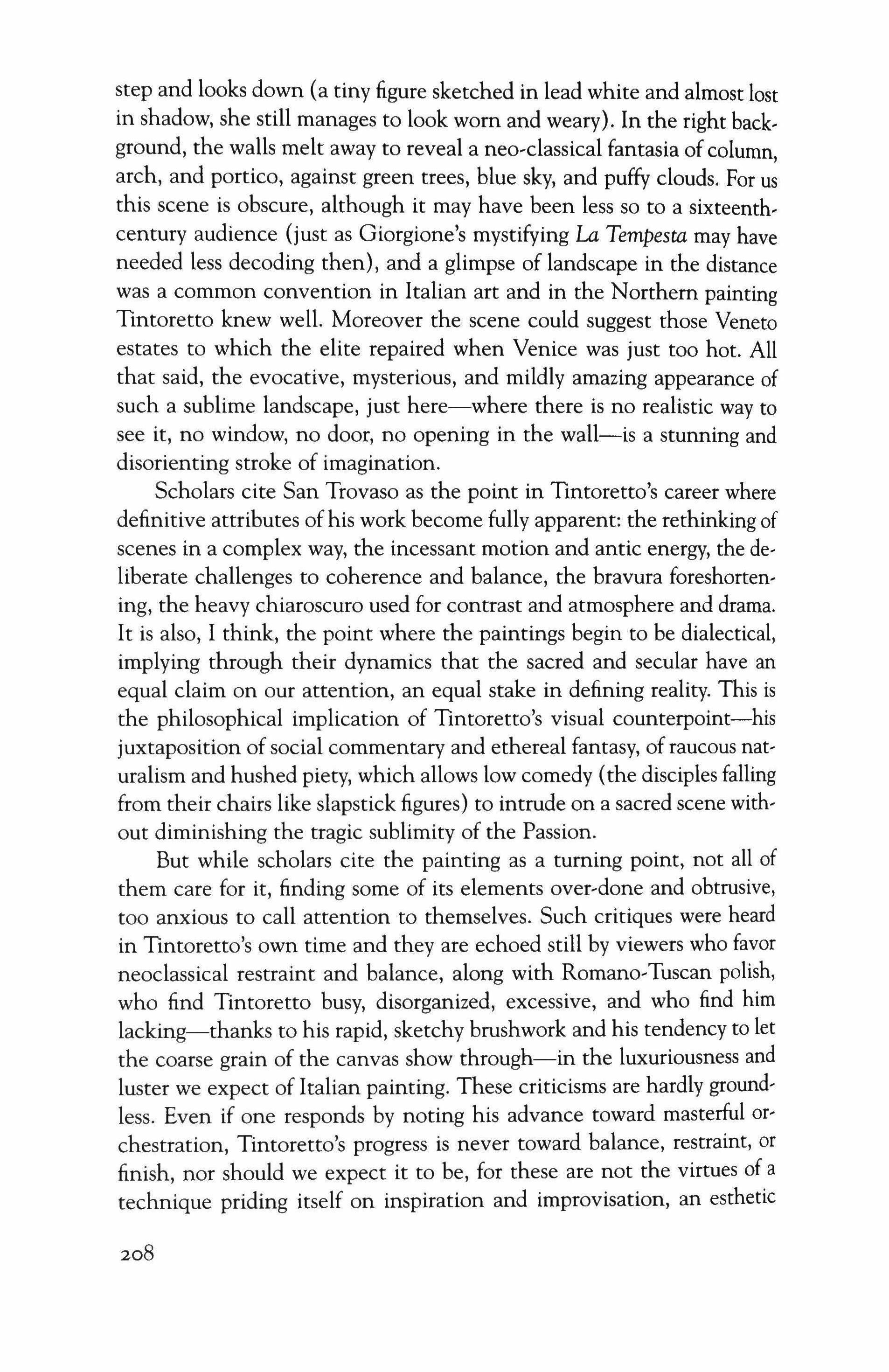
step and looks down (a tiny figure sketched in lead white and almost lost in shadow, she still manages to look worn and weary). In the right background, the walls melt away to reveal a neo-classical fantasia of column, arch, and portico, against green trees, blue sky, and puffy clouds. For us this scene is obscure, although it may have been less so to a sixteenthcentury audience (just as Giorgione's mystifying La Tempesta may have needed less decoding then), and a glimpse of landscape in the distance was a common convention in Italian art and in the Northern painting Tintoretto knew well. Moreover the scene could suggest those Veneto estates to which the elite repaired when Venice was just too hot. All that said, the evocative, mysterious, and mildly amazing appearance of such a sublime landscape, just here-where there is no realistic way to see it, no window, no door, no opening in the wall-is a stunning and disorienting stroke of imagination.
Scholars cite San Trovaso as the point in Tintoretto's career where definitive attributes ofhis work become fully apparent: the rethinking of scenes in a complex way, the incessant motion and antic energy, the deliberate challenges to coherence and balance, the bravura foreshortening, the heavy chiaroscuro used for contrast and atmosphere and drama. It is also, I think, the point where the paintings begin to be dialectical, implying through their dynamics that the sacred and secular have an equal claim on our attention, an equal stake in defining reality. This is the philosophical implication of Tintoretto's visual counterpoint-his juxtaposition of social commentary and ethereal fantasy, of raucous naturalism and hushed piety, which allows low comedy (the disciples falling from their chairs like slapstick figures) to intrude on a sacred scene without diminishing the tragic sublimity of the Passion.
But while scholars cite the painting as a turning point, not all of them care for it, finding some of its elements over-done and obtrusive, too anxious to call attention to themselves. Such critiques were heard in Tintoretto's own time and they are echoed still by viewers who favor neoclassical restraint and balance, along with Romano-Tuscan polish, who find Tintoretto busy, disorganized, excessive, and who find him lacking-thanks to his rapid, sketchy brushwork and his tendency to let the coarse grain of the canvas show through-in the luxuriousness and luster we expect of Italian painting. These criticisms are hardly groundless. Even if one responds by noting his advance toward masterful orchestration, Tintoretto's progress is never toward balance, restraint, or finish, nor should we expect it to be, for these are not the virtues of a technique priding itself on inspiration and improvisation, an esthetic
208
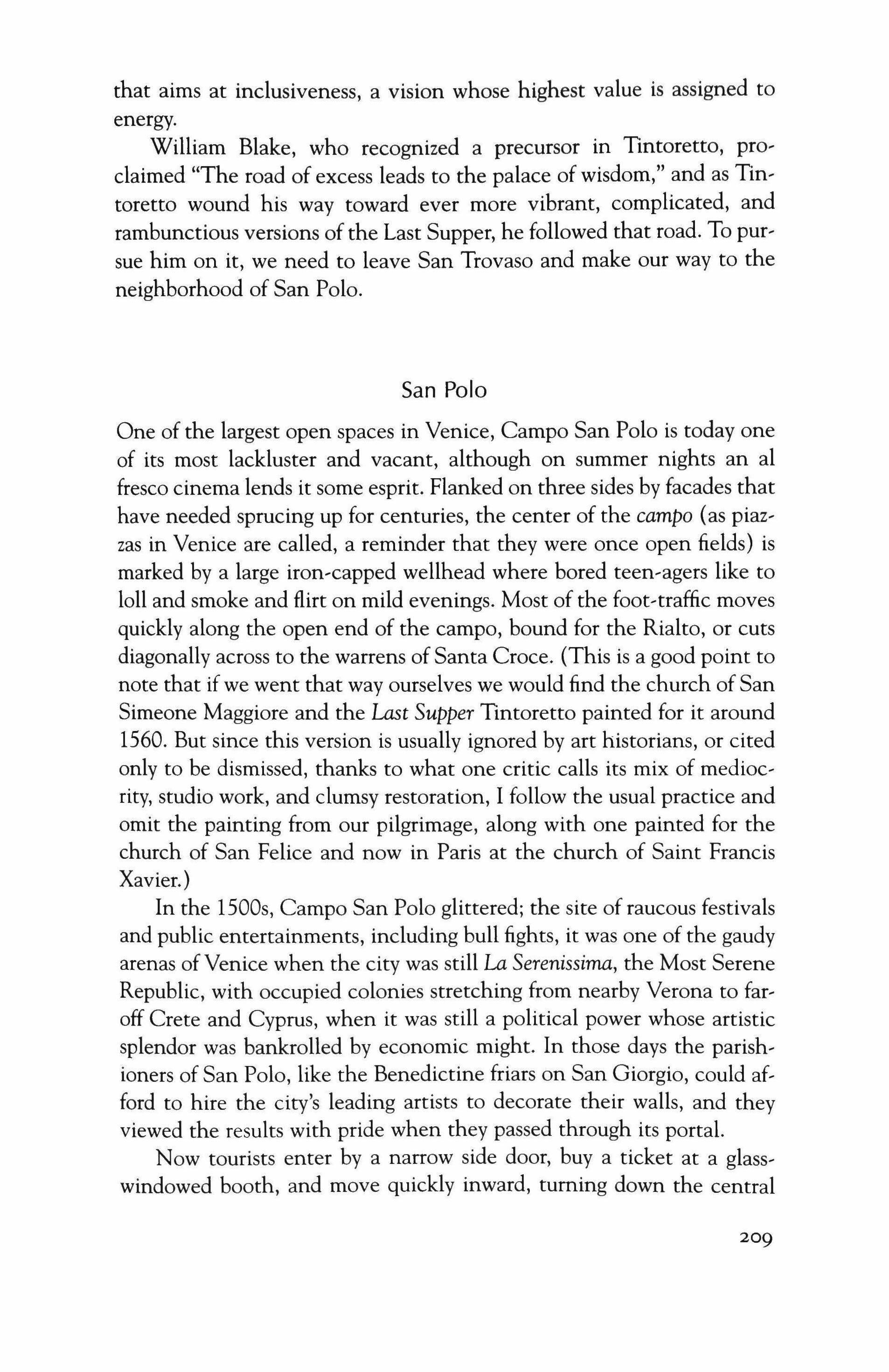
that aims at inclusiveness, a vision whose highest value is assigned to energy.
William Blake, who recognized a precursor in Tintoretto, proclaimed "The road of excess leads to the palace of wisdom," and as Tintoretto wound his way toward ever more vibrant, complicated, and rambunctious versions of the Last Supper, he followed that road. To pursue him on it, we need to leave San Trovaso and make our way to the neighborhood of San Polo.
San Polo
One of the largest open spaces in Venice, Campo San Polo is today one of its most lackluster and vacant, although on summer nights an al fresco cinema lends it some esprit. Flanked on three sides by facades that have needed sprucing up for centuries, the center of the campo (as piazzas in Venice are called, a reminder that they were once open fields) is marked by a large iron-capped wellhead where bored teen-agers like to loll and smoke and flirt on mild evenings. Most of the foot-traffic moves quickly along the open end of the campo, bound for the Rialto, or cuts diagonally across to the warrens of Santa Croce. (This is a good point to note that if we went that way ourselves we would find the church of San Simeone Maggiore and the Last Supper Tintoretto painted for it around 1560. But since this version is usually ignored by art historians, or cited only to be dismissed, thanks to what one critic calls its mix of mediocrity, studio work, and clumsy restoration, I follow the usual practice and omit the painting from our pilgrimage, along with one painted for the church of San Felice and now in Paris at the church of Saint Francis Xavier.)
In the 1500s, Campo San Polo glittered; the site of raucous festivals and public entertainments, including bull fights, it was one of the gaudy arenas ofVenice when the city was still La Serenissima, the Most Serene Republic, with occupied colonies stretching from nearby Verona to faroff Crete and Cyprus, when it was still a political power whose artistic splendor was bankrolled by economic might. In those days the parishioners of San Polo, like the Benedictine friars on San Giorgio, could afford to hire the city's leading artists to decorate their walls, and they viewed the results with pride when they passed through its portal.
Now tourists enter by a narrow side door, buy a ticket at a glasswindowed booth, and move quickly inward, turning down the central
209

aisle and casting about for what might be worthy of note-a sensible strategy that may lead them to Giandomenico Tiepolo's Stations of the Cross but cause them to miss the church's one undeniably major artwork. To see it, we need to make a sharp left past the ticket booth and go to the rear of the nave, where we find a heavy walnut structure fixed to the wall, and framed above it, a Last Supper that remains where Tintoretto installed it in 1568. Below the painting is a bench, more precisely a pew, called a Banco del Sacramento, reserved for members of the group, the Scuola del Sacramento, who commissioned the painting.
It is a dark comer today. But the time-lapse light is free and we can stand quite near the painting and, since the bottom edge is just above eye-level, we look directly up and into it. It was designed to be seen this way. The intimate scene is thrust upon us, an effect intensified by a sharply slanting floor of red and white marble squares, the device we saw prefigured at San Marcuola. But where in the earlier painting this slant was a mere implication, here it has become an aggressive fact, yawing at such an unstable angle it threatens to pitch into our laps.
As it slides downward the floor tilts sideways as well, pulling our gaze toward the lower right foreground and a man who lies there, with his back to us-a figure who emblematizes poverty, hunger, and infirmity, while providing a point of entry into the scene (and offering a clinic in foreshortening, as his head and shoulders project toward us while his torso and legs slant back and away.) The man is a link between the painting's world and our own. As he props himself up on an elbow, the lower part of his hip sinks below the frame, an effect that works in concert with the slanting floor to lower him toward us, forging a connection, forcing an identification. He leads our gaze up and into the scene, as he grabs for a crust of bread offered by a disciple, who is reaching down and back with a precarious twist on his stool (a variation on the figure we saw at San Trovaso). The disciple's arm draws our attention further upward, across his shoulders (brilliantly lit from directly overhead) and along his other arm, toward Jesus, who stands behind the table.
The table seems small and might be square-it is hard to say because the disciples are so densely crowded around it, and Christ leans so far over it, spreading his robed arms widely, that its shape is obscured. In any case, Leonardo's conception of the table-a long horizontal line with a symmetrical grouping of apostles behind-has been totally deconstructed, and supplanted by energy and action.
At the far right comer of the table, another disciple leans down to
210

offer a piece of fruit to a beggar boy crouched beneath him, in a variation on the themes of feeding and hunger, need and charity, while behind them the interior wall is whisked away to reveal an idealized landscape, like San Trovaso's but more elaborate and detailed, with a circular temple set in a mountainous landscape. This scene is closed off on the right margin by a donor, a tall shape counter-balanced on the opposite wing by a servant who stands with his back to us, caught in the act of turning toward a buffet table. Behind him a dim interior recedes, and steps lead to an unseen upper room.
Between the wings, in a cramped space made claustrophobic by horizontal cropping (the painting is seventeen and a half feet wide but only seven and a halffeet high, and again the top edge rests on Christ's halo), the central scene plays out. Behind the table Christ leans forward, bending at the waist and opening his arms to present the host; the nearest disciples lean to receive it, while the others are grouped so tightly they obscure each other (two huddled heads are barely seen beneath Christ's arm, a quarter-moon sliver of face is glimpsed behind a standing disciple, and so on). The transformation that began at San Marcuola is complete: identities are submerged and forms are merged in expressive design; figure and narrative are subordinated to motion and mood.
The elements of Tintoretto's method are symphonically integrated now, all obedient to direction, all contributing-even the controversial technique. His speed of execution may have been practical in origin (he needed to keep production high), but it became eloquent, and his concern with atmosphere, with dynamic interaction, with motion, is well served by a free, rapid technique, using lightly charged brushes, letting the thick weave of the canvas show through. It is a fit style for a painter who cared more about suggestion than representation.
His chiaroscuro suits a philosophy based on antithesis, a vision made manifest in sharp contrasts and shifting boundaries. Here at San Polo, the realm of imagination (airy temples and distant mountains hinting at an afterlife) and the world of toil and trouble (weary, overworked staff, weak and hungering beggars) are dialectically opposed, and they seek resolution at the heart of the scene, in the mystery, the miracle-the abstraction of eternal life embodied in a meal of concrete, elemental ingredients. But characteristically the resolution does not come to rest; the energy remains in motion, radiating upward to Christ's halo and sinking down to the floor, where the poor and infirm sprawl and where we find ourselves.
Tintoretto's dialectic leads him to re-imaginings of the Last Supper
211
ever more dynamic in their juxtaposition of competing claims to reality, more elaborate in their interplay of human and divine elements, more ambitiously intricate in their theater. His vision is most fully realized in the two final masterpieces, at the Scuola Grande di San Rocco and San Giorgio Maggiore; but before we come to them we need to mark a crucial step in the evolution of that vision, although the painting in question, in the church of Santo Stefano, is much less well known.
Leaving Campo San Polo we tum right, away from the Rialto and toward the church of the Frari-where Bellini's Madonna, which Henry James saw as made of molten gems, glows in a chapel, and Titian's Assumption, all sunrise orange and celestial blue, rises above the altar. There we tum toward the Grand Canal. A traghetto ferries us across, and on the other side, a long narrow lane opens into a wider, curving street that brings us, through the neighborhood where Veronese lived, to Campo Santo Stefano, the home today of inviting if pricey cafes. The church is at the top of the square.
 Santo Stefano
Santo Stefano
In the sacristy we find the Last Supper of 1576 (thirty years after San Marcuola), the only one ofthe series not in its original location. Painted for Santa Margherita and commissioned by its Scuola del Sacramento, it was probably installed above a banco, like the structure at San Polo; when Santa Margherita was decommissioned as a church (it is part of the University now), the painting was sent across the Canal. Its colors have faded (true of many Tintorettos but this is extreme) and it gets only a cursory glance from scholars, since analysis reveals that studio workers had a large role in its completion. But it deserves our attention because the design, emphatically by Tintoretto, adds a new dimension to his continuous reconceptualizing of the scene, setting the stage for his masterpiece at San Rocco.
The shadowy sacristy of Santo Stefano is visited only by the most dutiful of tourists, often Europeans diligently poring over their guidebooks, and it offers a tranquil haven for studying this Last Supper. Hung as usual just above our heads, it is in the center of a long wall which it easily dominates, since at seventeen and a halffeet wide and eleven and a half feet high, it is the largest canvas we have seen so far. Its most arresting feature is a massive platform on three stone risers that run parallel to the base of the frame, from right to left, until they tum a comer
212
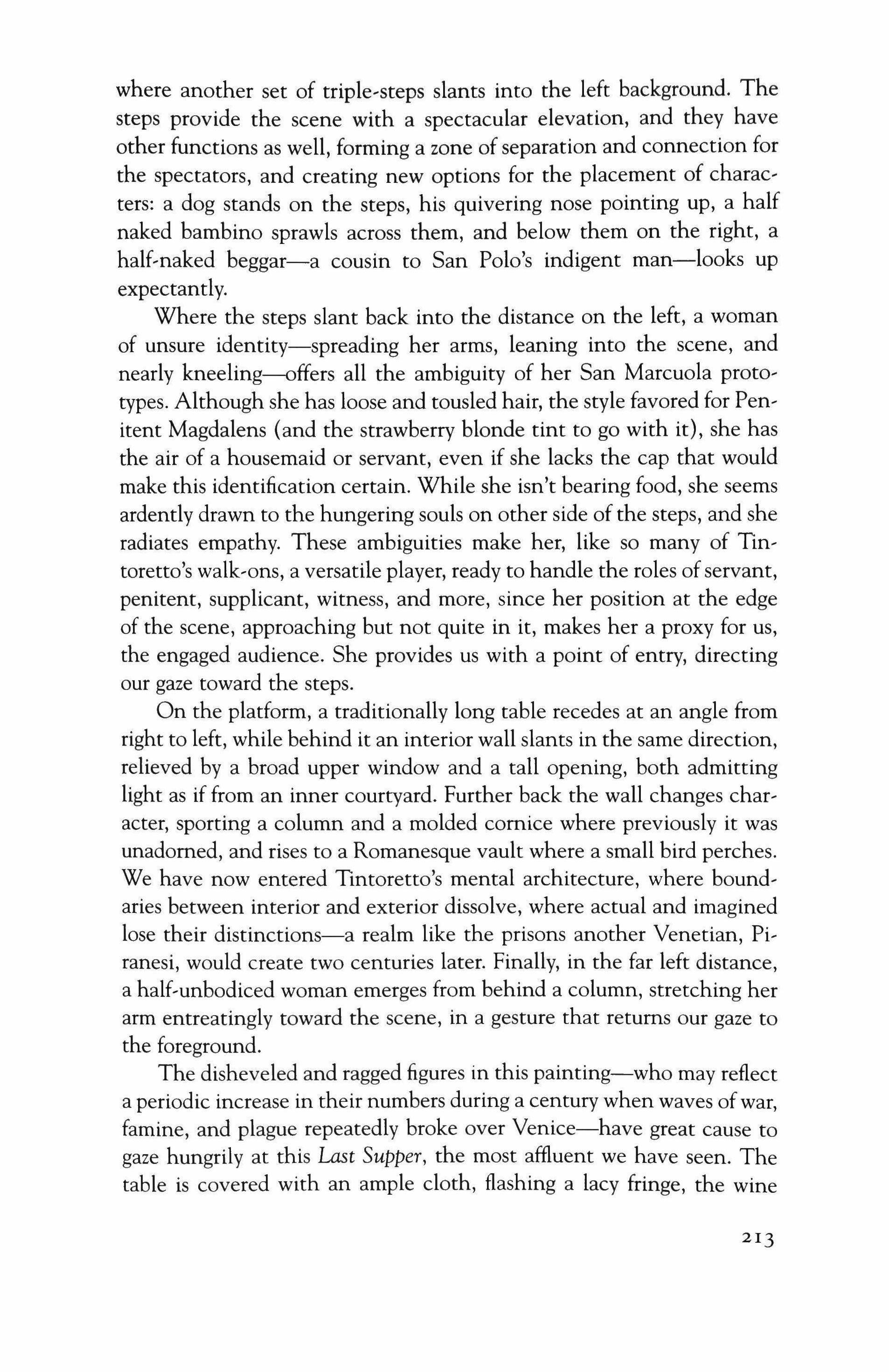
where another set of triple-steps slants into the left background. The steps provide the scene with a spectacular elevation, and they have other functions as well, forming a zone of separation and connection for the spectators, and creating new options for the placement of characters: a dog stands on the steps, his quivering nose pointing up, a half naked bambino sprawls across them, and below them on the right, a half-naked beggar-a cousin to San Polo's indigent man-looks up expectantly.
Where the steps slant back into the distance on the left, a woman of unsure identity-spreading her arms, leaning into the scene, and nearly kneeling-offers all the ambiguity of her San Marcuola prototypes. Although she has loose and tousled hair, the style favored for Penitent Magdalens (and the strawberry blonde tint to go with it), she has the air of a housemaid or servant, even if she lacks the cap that would make this identification certain. While she isn't bearing food, she seems ardently drawn to the hungering souls on other side of the steps, and she radiates empathy. These ambiguities make her, like so many of Tintoretto's walk-ons, a versatile player, ready to handle the roles of servant, penitent, supplicant, witness, and more, since her position at the edge of the scene, approaching but not quite in it, makes her a proxy for us, the engaged audience. She provides us with a point of entry, directing our gaze toward the steps.
On the platform, a traditionally long table recedes at an angle from right to left, while behind it an interior wall slants in the same direction, relieved by a broad upper window and a tall opening, both admitting light as if from an inner courtyard. Further back the wall changes character, sporting a column and a molded cornice where previously it was unadorned, and rises to a Romanesque vault where a small bird perches. We have now entered Tintoretto's mental architecture, where boundaries between interior and exterior dissolve, where actual and imagined lose their distinctions-a realm like the prisons another Venetian, Piranesi, would create two centuries later. Finally, in the far left distance, a half-unbodiced woman emerges from behind a column, stretching her arm entreatingly toward the scene, in a gesture that returns our gaze to the foreground.
The disheveled and ragged figures in this painting-who may reflect a periodic increase in their numbers during a century when waves of war, famine, and plague repeatedly broke over Venice-have great cause to gaze hungrily at this Last Supper, the most affluent we have seen. The table is covered with an ample cloth, flashing a lacy fringe, the wine
213

glasses are elegantly thin, the plates are pewter, and, in keeping, the disciples are dressed in robes that flow over their chairs and glitter with highlights. If the indigents are a reflection of their swelling numbers in the city, the opulence of the feast mirrors the complementary reality, that while people starved and died, literally on the steps of the palazzi, the party inside went on.
Tintoretto seats Christ in a new position at the table, the end nearest us, or one corner of that end, where he leans forward while a disciple-lowering his head and clutching a hand to his chest-leans toward him. This visual call-and-response sparks a fugue of flickering motions up and down the table, as one figure reaches for a flagon of wine on the floor, another leans back and cups his fingers together, and along the back, figures bend like wheat in the wind while others sway the other way. Tintoretto's kinetic energy and rhythmic orchestration are in full swmg.
Although these elements make Santo Stefano an important step in the development of Tintoretto's vision, we must admit that the painting lacks the intensity and compression of San Polo, or the ebullience and grit of San Trovaso. And while the radical use of the platform staging is a major innovation, there is little else here to prepare us for the drama, radiance, and mystery we find in the final two paintings.
The Scuola Grande di San Rocco
When we re-cross the Grand Canal and enter the sestiere of San Polo again, a wide street running behind the apse of the Frari brings us to the church of San Rocco, and across from it, the white facade of the Scuola Grande di San Rocco. Not to be confused with parish or guild scuole, Venice's scuole grandi, drawing their membership from affluent citizens below the level of the patrician class, were organizations whose missions had civic and pious aims, rather like a mix of Rotarians, Masons, and Knights of Columbus. When they wanted to decorate their interiors, scuole grandi called for bids or held competitions, as San Rocco did when it needed a ceiling painting of its patron saint-a commission that Tintoretto won through a bold {or devious} maneuver. Asked to submit a sketch, he installed the finished painting in the ceiling, and there it stayed. Other assignments followed, and eventually, through will, cunning, and influence, he obtained the exclusive right to provide the Scuola with all of its paintings.
2I4

On the second floor is a platform that served as the Scuola's altar, and hanging above it, to the left, is the Last Supper (1578,81). It is not easy to see. Because the space beside the platform is roped off, you need to lean forward, twisting your hips and craning your neck. And look up. The Last Suppers we have seen thus far were hung at a height typical for Venetian laterale {paintings for side walls or side chapels)-the bottom ofthe frames just above our heads, so we see them as ifwatching a movie from the front row-but here the paintings are hung much higher, in accord with the hall's grand proportions and lofty ceilings, and while a horizontal design is common to the paintings we have seen, here the for' mat shifts toward the vertical (this Last Supper is sixteen feet wide but seventeen and a half feet high).
Tintoretto responds with a design that sweeps upward and recedes into depth, employing a variation on the platform and steps introduced at Santo Stefano: the three risers have here become two, although these steps are steeper, more monumental, more elegant-long slabs ofdressed white marble whose finely mortared seams align with the red and white squares of the floor they support. At Santo Stefano the steps turned a comer but here they run along the bottom of the picture plane and van, ish at either side, in a line that reads as horizontal although the platform is set at an imperceptible angle, allowing the floor to slant as it recedes, in accord with Tintoretto's taste for diagonals.
Below the steps we find a strip of raw earth and two figures--on the left, a man wearing only a cloak draped loosely around his hips, half sit, ting and half lying, and on the right, a woman sitting with her back to the steps, her head inclined and turned toward the center. As if inspired by their Renaissance surroundings, the figures have classical overtones. Turning at the waist, revealing a well,articulated torso and presenting his profile, the man recalls a Roman river god, and the woman, as she leans forward, wrapping her arms around a lifted knee and clasping her hands, a Michelangelo sibyl.
The ubiquitous dog, meanwhile, plants his paws on the lower step, wags his tail in our faces, and looks up, directing our gaze to a long ban' quet table that slants back from right to left. It has been lowered to an almost Japanese height and draped with a handsome blue cloth, and most ofthe disciples are kneeling at it {though one crouches on an over, turned stool, a cousin to the rustic stools at San Marcuola and the tipped,over chair at San Trovaso). The slant of the table corresponds almost exactly to the angle we find at Santo Stefano, and at first glance it appears that Tintoretto has seated Christ in the same location, a corner
215

of the table's near end. A haloed figure, wearing a magenta robe rich in pleats and folds, kneels there (we see the exposed soles of his bare feet), his back to us, his arms spread. Two disciples lean toward him. Yet, perhaps surprisingly, this is not Christ, who is to be found-identified by an aureole-at a corner of the far end of the table, in the recedingdistance, the smallest and the most remote of the figures. Tintoretto has taken another step in his radical rethinking of this traditional scene, a step that characteristically engages the audience directly, intimately, and actively. The eye needs to work to find Jesus, traversing the full length ofthe long table, exploring the middle ground between the beggars in the foreground and the elevated scene behind. As we have come to expect, the disciples stream up and down both sides of the table, bending and leaning, joining and parting, in another variation on Tintoretto's sinuous music; but the variation here is particularly complex, because there is such a strange and difficult tension between the clusters of disciples attending to Christ at the far end of the table, and those leaning the other way. The lines of the perspective may lead us directly to Christ, but other lines of force (lines that bend and curve and tum back on themselves) carry Tintoretto's indirection and ambiguity to a new extreme.
This drama is staged in an interior as grandly imagined as Santo Stefano's, while more brilliant, detailed, and realistic, evoking a sixteenthcentury palazzo with considerable accuracy. Because the table is set well back in the scene, the floor of reddish-brown and ivory marble squares has a chance to display itself, and the wall on the right can reveal its lower register inlaid with darkly varnished panels and ornately painted frames. The upper section is made of roughly mortared, variegated brick, and above it, where the hall seems almost to vanish in smoke, high in the smudged gloom we can just make out a handsome, beamed ceiling.
The receding table points to a flight of stairs, leading to an upper level where a kitchen and pantry spread along a back wall, lined with shelves that hold rows of plates and platters. This background scene is rendered in small, light brushstrokes, since because of its location (deep in the interior and high up), it occupies but a small area of the picture plane, and yet, thanks to the skillful management of light, shade, and color, these few deft strokes create a distant clarity, like Greg Toland's deep-focus photography in Citizen Kane, which can make the foreground, middle distance, and far recesses of the Hearst castle visible all at once.
Illumined by an open fire and a mysterious interior light source, the kitchen is a bright, steamy hive of activity. A woman bends with the
216
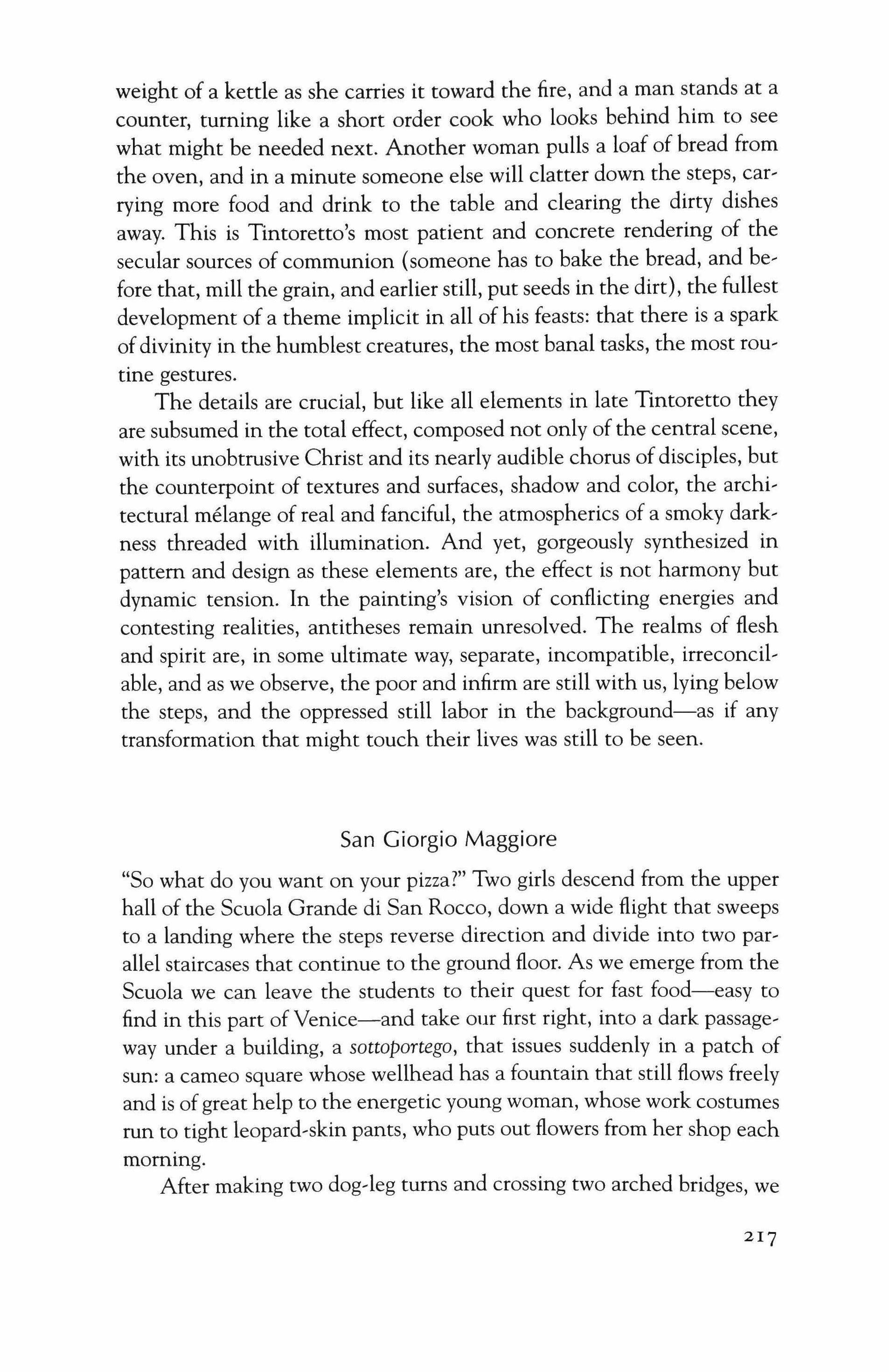
weight of a kettle as she carries it toward the fire, and a man stands at a counter, turning like a short order cook who looks behind him to see what might be needed next. Another woman pulls a loaf of bread from the oven, and in a minute someone else will clatter down the steps, carrying more food and drink to the table and clearing the dirty dishes away. This is Tintoretto's most patient and concrete rendering of the secular sources of communion (someone has to bake the bread, and before that, mill the grain, and earlier still, put seeds in the dirt), the fullest development of a theme implicit in all of his feasts: that there is a spark ofdivinity in the humblest creatures, the most banal tasks, the most routine gestures.
The details are crucial, but like all elements in late Tintoretto they are subsumed in the total effect, composed not only of the central scene, with its unobtrusive Christ and its nearly audible chorus ofdisciples, but the counterpoint of textures and surfaces, shadow and color, the architectural melange of real and fanciful, the atmospherics of a smoky darkness threaded with illumination. And yet, gorgeously synthesized in pattern and design as these elements are, the effect is not harmony but dynamic tension. In the painting's vision of conflicting energies and contesting realities, antitheses remain unresolved. The realms of flesh and spirit are, in some ultimate way, separate, incompatible, irreconcilable, and as we observe, the poor and infirm are still with us, lying below the steps, and the oppressed still labor in the background-as if any transformation that might touch their lives was still to be seen.
San Giorgio Maggiore
"So what do you want on your pizza?" Two girls descend from the upper hall of the Scuola Grande di San Rocco, down a wide flight that sweeps to a landing where the steps reverse direction and divide into two parallel staircases that continue to the ground floor. As we emerge from the Scuola we can leave the students to their quest for fast food-easy to find in this part of Venice-and take our first right, into a dark passageway under a building, a sottoportego, that issues suddenly in a patch of sun: a cameo square whose wellhead has a fountain that still flows freely and is of great help to the energetic young woman, whose work costumes run to tight leopard-skin pants, who puts out flowers from her shop each mornmg.
After making two dog-leg turns and crossing two arched bridges, we
217

pass a university lecture hall, once the church of Santa Margherita, and enter Campo Santa Margherita, a widening oblong where fishmongers set up stalls every morning as they have for centuries. Its far side is bounded by a street called Rio Terra, a name recalling that in Tintoretto's day it was a canal, which leads to the Ponte dei Pugni (Bridge of Fists), where gangs from rival neighborhoods staged murderous brawls every year, and to one of the finest bakeries in Venice (its olive bread is the best in town), still going strong despite a tumultuous history (during the bread riots of 1570, its baker was murdered by furious mob). From there we go out to the embankment of the Zattere, for a vaporetto across to the island of San Giorgio and its church, patiently awaiting us, serene in its self-importance, presenting its handsome face-Palladio's facade of white Istrian marble-to the wide lagoon.
In San Giorgio Maggiore we can slip around the altar-although it is awkward and requires maneuvering to evade the glare from the overhead window-and stand directly in front of the Last Supper. Parishioners taking communion see it from farther off, and at an angle, looking up and to the right as they stand at the rail, the position Tintoretto had in mind when he planned the composition. This explains the prominence of two large figures in the lower right foreground: a woman kneeling on the floor, reaching into a deep wicker hamper, and a man standing beside a buffet table.
In perceptual and thematic terms, their function is to mediate between us and Christ, although of course they do much more, since by now we recognize them as veteran performers in Tintoretto's repertory company, trained to take on multiple roles, ready to play them with gusto and aplomb. The woman wears an orange smock over full white skirts and a white blouse that slips from her shoulder as she reaches into the basket with one arm while, with the other, she holds out a stemmed dish full of what appear to be coated almonds. The man-in blue tights, a dark blue blouse trimmed in crimson, and a rust-colored apron knotted in back-is turning toward her, pivoting with balletic muscularity (he would be at home in a Mark Morris production), an action to be completed when he takes the dish from her and places it on the buffet, which is already burdened with peaches, apples, pears, and melons.
The spark of their pas de deux, their flare of divinity in mortal flesh, courses through the troupe. Behind the buffet, another serving man picks up a tray of fruit, and in the dim background more figures appear, one lugging a basket, another extending his arms in a gesture that points to the opposite side of the painting, where two women approach--one
218

in a housemaid's cap, which makes her easy to place, the other more ambiguous. That she carries a dish in her hands suggests she is part of the service team (and recalls the women on the wings ofSan Marcuola), but she has a suspiciously patrician air, and the gossamer veil falling from upswept hair and her Marion-blue gown make us wonder ifshe could be the Blessed Virgin in the guise of a volunteer. Yet the sensuous sway of her figure, as she grasps the pleats of her gown with one hand and balances the dish with the other, makes her a fetching creature of the flesh. She bridges the spiritual and sensual worlds, augments the cast of servers, and adds variations to the visual music: Her supple swivel repeats the twist of the serving man's hip, much as the diagonal formed by the servers reprises the shape of the disciples at the table, and the ruddy fruit on the sideboard mirrors Christ's fuchsia robe. Much as the cupped hands of Christ recur everywhere, in hands offering food and hands gesturing, and as the twisting posture of the server on the right echoes the ragged man in the lower left comer, leaning on a staff and eagerly looking into the scene, whose gaze directs us to the banquet table.
Tintoretto has restored one aspect of the Renaissance conception of the scene, a long table with most of the disciples arrayed behind it, but there all resemblance to tradition ends, since this table veers away at a sharp angle, striking deeply into the background, and it has been made unnaturally long. It is also uncommonly spare-the merest offunctional surfaces, minimally supported by a pair of thin legs at each end, barely covered by a strip ofcloth that exposes the knees of the disciples and the sandal-shod feet of Christ. The table's streamlining and sharp backward J slant allow a generous view of the inlaid marble floor. Elegant and sumptuous (a pattern of tan diamonds set in dark crimson squares, framed by bands of blue-gray, with brown accents), it slides up and away from the viewer, receding into a gloom where, although it is barely visible, we can make out an interior similar to San Rocco's: tall walls of darkly varnished wood, lined with shelves full of plates and platters, relieved by a row of ornamental columns, and, high overhead, a beamed ceiling.
Crowding beneath this ceiling, two squadrons of filmy angelslightly brushed in with the lead white Tintoretto uses for his most spectral figments-converge on Christ's sunburst halo. The angels are so airy they would be invisible were they not so brightly illumined by the painting's most stagy innovation, a large oil lamp, shaped like a shallow, fluted dish, let down from the ceiling on a metal rod. As flames billow from its sides and rays shoot out to merge with Christ's halo, you can almost hear the hissing of this outward and audible symbol of the Holy Ghost.
219
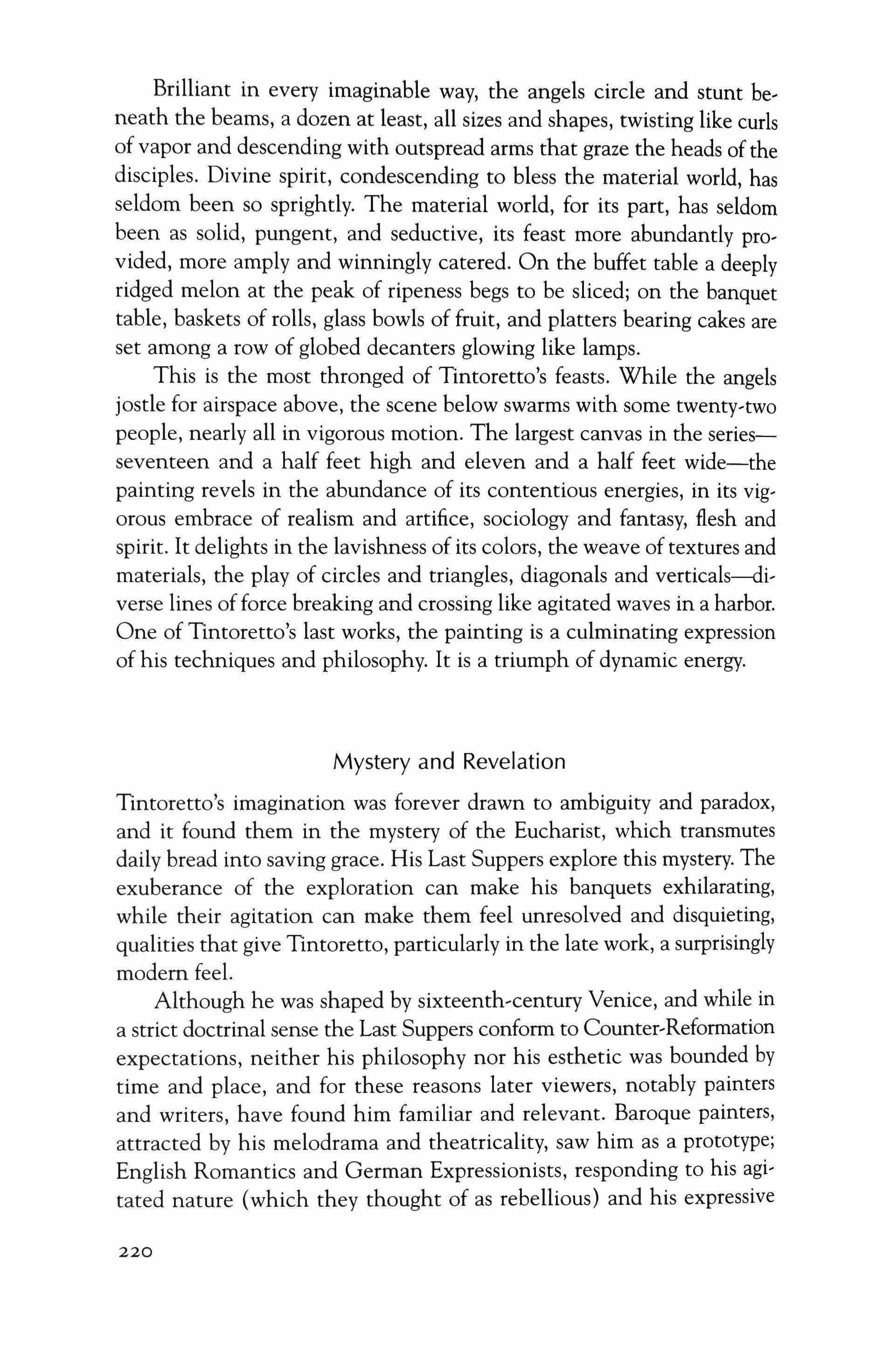
Brilliant in every imaginable way, the angels circle and stunt beneath the beams, a dozen at least, all sizes and shapes, twisting like curls of vapor and descending with outspread arms that graze the heads ofthe disciples. Divine spirit, condescending to bless the material world, has seldom been so sprightly. The material world, for its part, has seldom been as solid, pungent, and seductive, its feast more abundantly pro� vided, more amply and winningly catered. On the buffet table a deeply ridged melon at the peak of ripeness begs to be sliced; on the banquet table, baskets of rolls, glass bowls of fruit, and platters bearing cakes are set among a row of globed decanters glowing like lamps.
This is the most thronged of Tintoretto's feasts. While the angels jostle for airspace above, the scene below swarms with some twenty-two people, nearly all in vigorous motion. The largest canvas in the seriesseventeen and a half feet high and eleven and a half feet wide-the painting revels in the abundance of its contentious energies, in its vigorous embrace of realism and artifice, sociology and fantasy, flesh and spirit. It delights in the lavishness of its colors, the weave of textures and materials, the play of circles and triangles, diagonals and verticals=diverse lines offorce breaking and crossing like agitated waves in a harbor. One of Tintoretto's last works, the painting is a culminating expression of his techniques and philosophy. It is a triumph of dynamic energy.
Mystery and Revelation
Tintoretto's imagination was forever drawn to ambiguity and paradox, and it found them in the mystery of the Eucharist, which transmutes daily bread into saving grace. His Last Suppers explore this mystery. The exuberance of the exploration can make his banquets exhilarating, while their agitation can make them feel unresolved and disquieting, qualities that give Tintoretto, particularly in the late work, a surprisingly modem feel.
Although he was shaped by sixteenth-century Venice, and while in a strict doctrinal sense the Last Suppers conform to Counter-Reformation expectations, neither his philosophy nor his esthetic was bounded by time and place, and for these reasons later viewers, notably painters and writers, have found him familiar and relevant. Baroque painters, attracted by his melodrama and theatricality, saw him as a prototype; English Romantics and German Expressionists, responding to his agitated nature (which they thought of as rebellious) and his expressive
220

energy, regarded him as a kindred spirit. Twentieth-century thinkersnotably Sartre-would deem him a man of the proletariat and a protoexistentialist. Modernists could resonate to his mix of irony, anxiety, and doubt, and post-modernists relate to his foregrounding ofprocess, his kitchen-sink inclusiveness, and his love of pastiche. When a critic recalled the qualities that first drew him to the work of Robert Rauschenberg-"the high-energy irreverence, the juxtapositions of art and popular culture, the unresolved tensions between beauty and ugliness"-the attributes could, with some light editing, have been Tintoretto's.
Tintoretto was evidently a man of faith and he could hardly have made his living as an artist otherwise, but faith alone cannot account for the power of these paintings, with their vital ambiguity, their elaborated tensions and contradictions, their passionate inquiry. Because his philosophy submits dualities to such energetic exploration without resolving them or acknowledging their incompatibility, it can be considered a type of dynamism. The ceaseless motion and irrepressible energy of his paintings project a Heraclitian vision of reality-of reality as pulse and flow and change.
For Heraclitus there was an intelligible principle governing the interplay of forces, but for Tintoretto what mattered was not the principle but the dynamic interplay itself, and that interplay was the basis of his vision and his method. The final two masterpieces-with their prodigal and exuberant tensions, their contending and intertwining forces-illustrate Blake's thesis that "energy is eternal delight." While they acknowledge our need for revelation, and recognize it as a basic human hunger-a hunger for inspiration, for miracle, for transformationthese Last Suppers are less rituals than performances, and what they offer is less the assurance of revealed truth than the fluent satisfactions of music, of dance, of theater: the recombinant shapes and shifting contours of art. But if we accept the premise of Heraclitus, that "the moving world can only be known by what is in motion," we find revelation in Tintoretto's Last Suppers.
Acknowledgements
I want to thank Nicole Rafter for her usual superb editorial advice, Gregory Dowling and Rosella Mamoli Zorzi (both of the University of Venice) for guidance in the by-ways and history of Venice, and Andrea Molesini for generous Venetian hospitality. Further, I am particularly
221
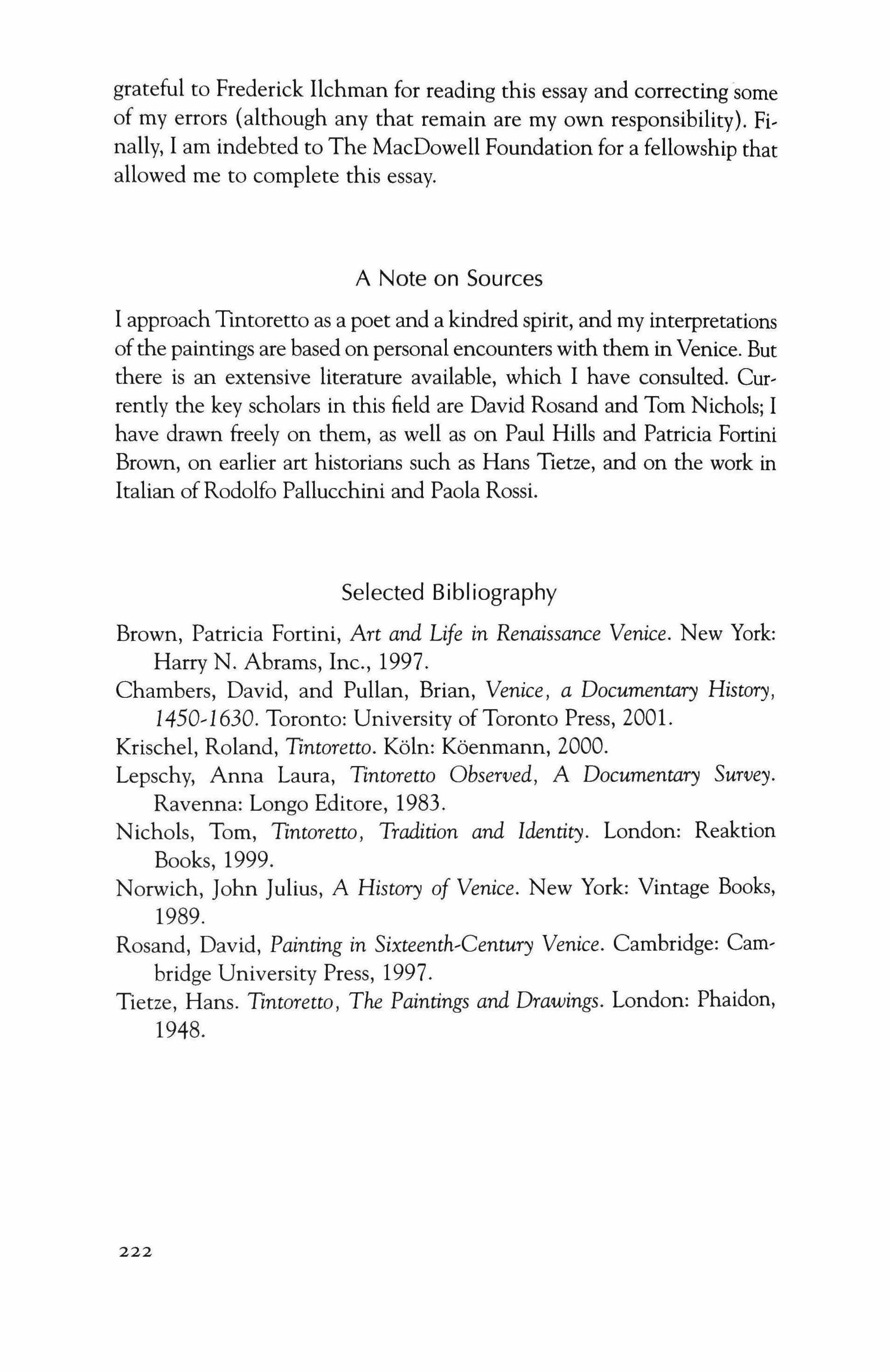
grateful to Frederick Ilchman for reading this essay and correcting some of my errors (although any that remain are my own responsibility). Finally, I am indebted to The MacDowell Foundation for a fellowship that allowed me to complete this essay.
A Note on Sources
I approach Tintoretto as a poet and a kindred spirit, and my interpretations ofthe paintings are based on personal encounters with them in Venice. But there is an extensive literature available, which I have consulted. Currently the key scholars in this field are David Rosand and Tom Nichols; I have drawn freely on them, as well as on Paul Hills and Patricia Fortini Brown, on earlier art historians such as Hans Tietze, and on the work in Italian of Rodolfo Pallucchini and Paola Rossi.
Selected Bibliography
Brown, Patricia Fortini, Art and Life in Renaissance Venice. New York: Harry N. Abrams, Inc., 1997.
Chambers, David, and Pullan, Brian, Venice, a Documentary History, 1450-1630. Toronto: University of Toronto Press, 2001. Krischel, Roland, Tintoretto. Koln: Koenmann, 2000.
Lepschy, Anna Laura, Tintoretto Observed, A Documentary Survey. Ravenna: Longo Editore, 1983. Nichols, Tom, Tintoretto, Tradition and Identity. London: Reaktion Books, 1999.
Norwich, John Julius, A History of Venice. New York: Vintage Books, 1989.
Rosand, David, Painting in Sixteenth-Century Venice. Cambridge: Cambridge University Press, 1997.
Tietze, Hans. Tintoretto, The Paintings and Drawings. London: Phaidon, 1948.
222

Hadara Bar-Nadav's work appears or is forthcoming in Beloit Poetry Journal, Gulf Coast, Chelsea, Indiana Review, the Journal, Shenandoah, Verse, and other journals. She teaches creative writing and literature at the University of Nebraska-Lincoln. Sande Boritz Berger is a former video producer and scriptwriter from NYC. Her fiction and poetry appear in Confrontation Literary Review and Proteus. Her essays have been published in Every Woman Has a Story (Warner Books) and Aunties-35 Women Celebrate Their Other Mother (Random House). She has recently completed her first novel, from which "A Split-Level Life" is excerpted. She is completing an MFA in writing and literature at Southampton College, and has taught writing at the Rusk Rehabilitation Center, NYU Medical. Marianne Boruch's five poetry collections include, most recently, Poems: New and Selected (Oberlin, 2004). She has two books of essays on poetry, In the Blue Pharmacy (Trinity UP, 2005) and Poetry's Old Air (Michigan, 1995). She teaches at Purdue University. Joseph Campana's poems have appeared in Poetry, Beloit Poetry Journal, New England Review, Conjunctions (online), GulfCoast, and Colorado Review and are forthcoming in Prairie Schooner and Michigan Quarterly Review. His first collection, The Book of Faces, is a poetic iconography of Audrey
Hepburn and is published by Graywolf Press (2005). He teaches Renaissance literature and creative writing at Kenyon College. Victoria Chang's book of poetry, Circle, won the Crab Orchard Open Competition (Southern Illinois University Press). She is editor of an anthology, Asian American Poetry: The Next Generation (University of Illinois Press). Her poems have been published in or are forthcoming in Best American Poetry 2005, the Nation, Poetry, the New Republic, Threepenny Review, Kenyon Review, and others. She resides in L.A. and is completing a Ph.D. in USC's literature and creative writing program. Maxine Chernoff is the author of six books of fiction and seven collections of poetry, most recently Among the Names (Apogee Press). She chairs the creative writing department at SFSU and edits New American Writing with Paul Hoover. Robert Cording's fifth book of poems, Common Life, will be published in April, 2007 (Cavan Kerry Press). New work is out or forthcoming in the Georgia Review, AGNI Review, Ploughshares, Image, and Southern Review. Jonathan David's articles and fiction have been published in seven national magazines. His short story, "The Pickle Jar," was nominated for a Maggie Award. His most recent story, "The 0 Really's," appeared in the June 2002 issue of Genre Magazine. He is the co-writer of the upcoming motion picture Women Are from Mars. Ron De Maris's poetry has appeared in the Nation, the New Republic, the Gettysburg Review and elsewhere. He lives in Miami, Florida. Jessica Fisher is co-editor, with Robert Hass, of The Addison Street Anthology (Heyday
CONTRIBUTORS
223
Books, 2004). Her translations of Czeslaw Milosz's poems appear in New and Collected Poems (Ecco, 2001) and in the New York Review of Books. She was finalist for the 2005 Yale Younger Poets Prize and has won two Eisner Awards from the University of California at Berkeley. Laurence Goldstein's fourth book of poems is A Room in California (Northwestern University Press/Triquarterlv Books, 2005), and his most recent edited volume is Writing Ann Arbor: A Literary Anthology (University of Michigan Press, 2005). He is Professor of English and Editor of Michigan Quarterly Review at the University of Michigan. Robert Hahn is a poet, essayist, and translator. His most recent books of poetry are All Clear (South Carolina, 1996) and No Messages (Notre Dame, 2001). His essays have appeared in Michigan Quarterly Review, the Kenyon Review, the Denver Quarterly, the Sewanee Review, the Antioch Review, Boston Review, Pamassus, and the Southern Review. His translations of Italian poetry may be found in Modem Poetry in Translation, Gradiva, the Literary Review, Poetry International, and International Poetry Review. His essay on Tintoretto is part of a book in progress entitled Looking at Tintoretto: Venetian Revelations. More information is available at www.roberthahn.net.Friedrich Holderlin, German lyric poet and author. Among his most famous works are novels Hyperion Oder Der Eremit In Griechenland, 0797-1799) and the tragedy Der Tad Des Empedokles, which was left unfinished. Some of his famous lyric poems are "Brod and Wein," "Der Achipelagus," "Heidelberg," "Der Rhein," and "Germanien."
Paul Hoover is the author of ten poetry collections, including Poems in Spanish (Omnidawn Press, 2005) and Winter (Mirror) (Flood Editions, 2002). Fables of Representation, his collection of literary essays, was published in the Poets on Poetry Series at the University of Michigan Press, 2004. He is editor of the anthology Postmodem American Poetry (W.W. Norton, 1994) and, with Maxine Chernoff, the literary magazine New American Writing. Richard Kenney teaches at the University of Washington in Seattle. His books are The Evolution of the Flightless Bird (Yale University Press, 1984)' Orrery (Atheneum, 1985), and The Invention of the Zero (Knopf, 1993). He lives with his family in Port Townsend, Washington. Brendan Mathews received his MFA from the University of Virginia, where he was a Henry Hoyns Fellow. His work has appeared in the Southern Review and is forthcoming in Glimmer Train Stories. Michael McFee published two books in 2006: Shinemaster, his seventh collection of poetry (Carnegie Mellon University Press) and The Napkin Manuscripts: Selected Essays and an Interview (University ofTennessee Press), his first book of prose. Other poems have appeared recently in Hudson Review, Threepenny Review, the Southern Review, Cincinnati Review, and Cornbread Nation: Best of the Southern Food Writing (University of North Carolina Press). He is a professor ofEnglish at UNC-Chapel Hill. Sandra McPherson's ninth and most recent collection is A Visit to Civilization (Wesleyan University Press, 2002). She teaches at the University of California at Davis. Molly McQuade's es-
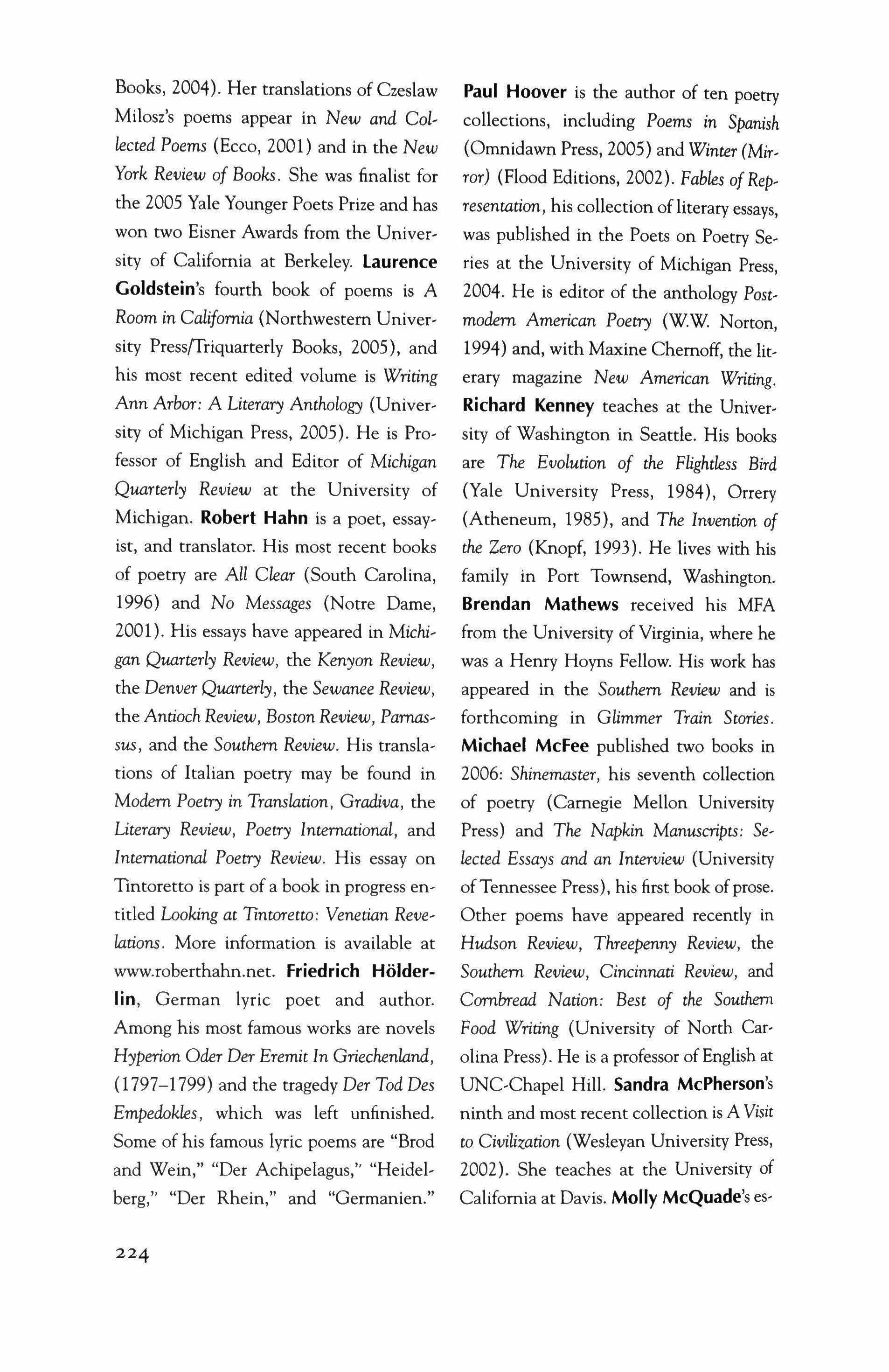
224
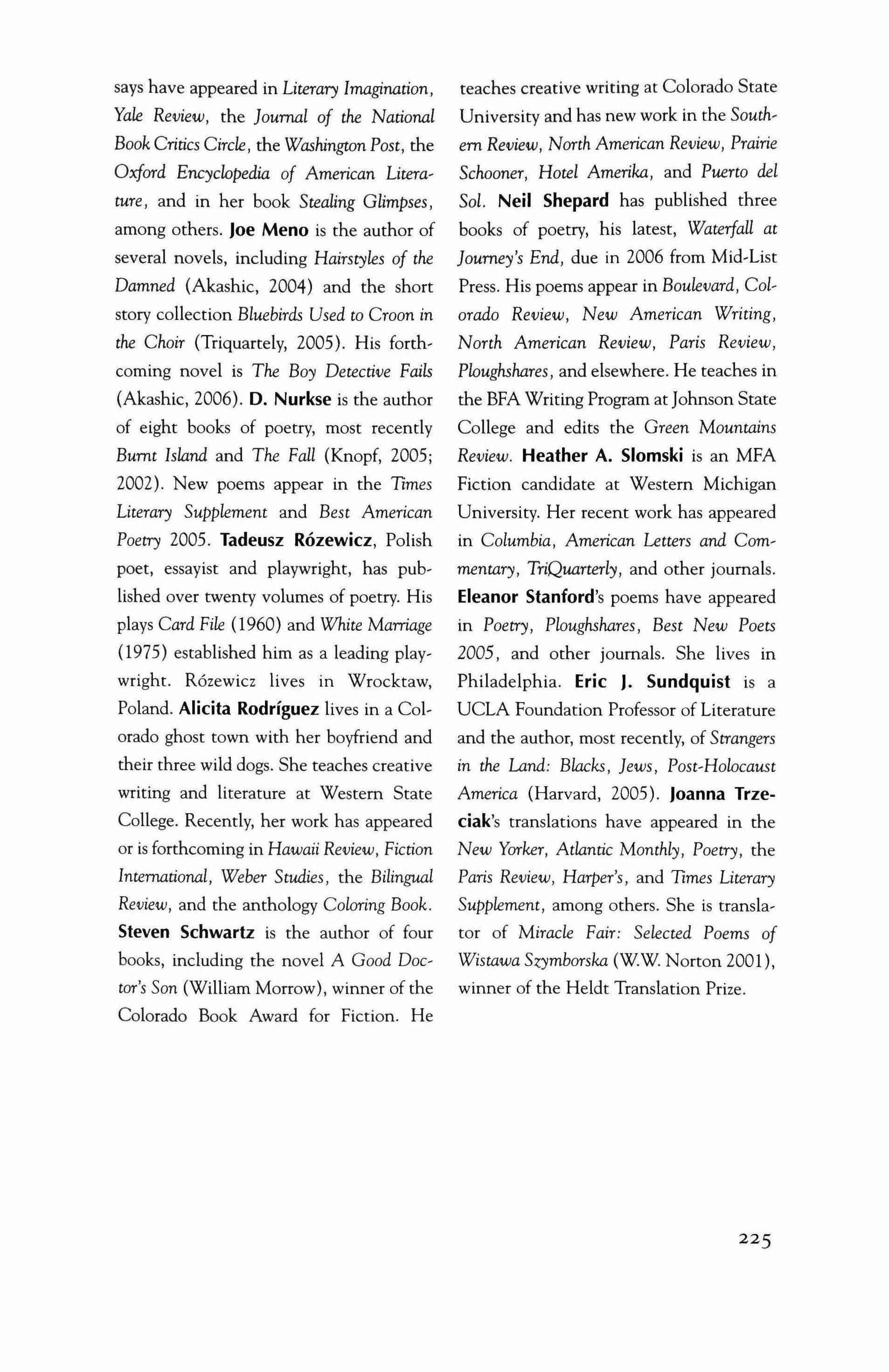
says have appeared in Literary Imagination, Yale Review, the JOUTTUlI of the National Book Critics Circle, the Washington Post, the Oxford Encyclopedia of American Literature, and in her book Stealing Glimpses, among others. Joe Meno is the author of several novels, including Hairstyles of the Damned (Akashic, 2004) and the short story collection Bluebirds Used to Croon in the Choir (Triquartely, 2005). His forthcoming novel is The Boy Detective Fails (Akashic, 2006). D. Nurkse is the author of eight books of poetry, most recently Burnt Island and The Fall (Knopf, 2005; 2002). New poems appear in the Times Literary Supplement and Best American Poetry 2005. Tadeusz R6zewicz, Polish poet, essayist and playwright, has published over twenty volumes of poetry. His plays Card File (1960) and White Marriage (1975) established him as a leading playwright. Rozewicz lives in Wrocktaw, Poland. Alicita Rodriguez lives in a Colorado ghost town with her boyfriend and their three wild dogs. She teaches creative writing and literature at Western State College. Recently, her work has appeared or is forthcoming in Hawaii Review, Fiction InteTTUltional, Weber Studies, the Bilingual Review, and the anthology Coloring Book. Steven Schwartz is the author of four books, including the novel A Good Doctor's Son (William Morrow), winner of the Colorado Book Award for Fiction. He
teaches creative writing at Colorado State University and has new work in the Southern Review, North American Review, Prairie Schooner, Hotel Amerika, and Puerto del Sol. Neil Shepard has published three books of poetry, his latest, Waterfall at Journey's End, due in 2006 from Mid-List Press. His poems appear in Boulevard, Colorado Review, New American Writing, North American Review, Paris Review, Ploughshares, and elsewhere. He teaches in the BFA Writing Program at Johnson State College and edits the Green Mountains Review. Heather A. Slomski is an MFA Fiction candidate at Western Michigan University. Her recent work has appeared in Columbia, American Letters and Commentary, TriQuarterly, and other journals. Eleanor Stanford's poems have appeared in Poetry, Ploughshares, Best New Poets 2005, and other journals. She lives in Philadelphia. Eric J. Sundquist is a UCLA Foundation Professor of Literature and the author, most recently, of Strangers in the Land: Blacks, Jews, Post-Holocaust America (Harvard, 2005). Joanna Trzeciak's translations have appeared in the New Yorker, Atlantic Monthly, Poetry, the Paris Review, Harper's, and Times Literary Supplement, among others. She is translator of Miracle Fair: Selected Poems of Wistawa Szymborska (W.W. Norton 2001), winner of the Heldt Translation Prize.
225
Subscriptions
Three issues per year. Individuals: one year $24; two years $44; life $600. Institutions: one year $36; two years $68. Overseas: $5 per year additional. Price of back issues varies. Sample copies $5. Address correspondence and subscriptions to TriQuarterly, Northwestern University, 629 Noyes St., Evanston, IL 60208-4210. Phone (847) 491-7614.
Submissions
The editors invite submissions of fiction, poetry and literary essays, which must be postmarked between October I and March 3 I; manuscripts postmarked between April I and September 30 will not be read. No manuscripts will be returned unless accompanied by a stamped, self-addressed envelope. All manuscripts accepted for publication become the properry of TriQuarterly, unless otherwise indicated.
Reprints
Reprints of issues I - I 7 of TriQuarterly are available in full format from Kraus Reprint Company, Route 100, Millwood, NY 10546, and all issues in microfilm from University Microfilms International, 300 North Zeeb Road, Ann Arbor, MI 48106.
Indexing
TriQuarterly is indexed in the Humanities Index (H. W. Wilson Co.), the American Humanities Index (Whitson Publishing Co.), Historical Abstracts, MLA, EBSCO Publishing (Peabody, MA) and Information Access Co. (Foster City, CAl.
Distributors
Our national distributors to retail trade are Ingram Periodicals (La Vergne, TN); B. DeBoer (Nutley, NJ); Ubiquity (Brooklyn, NY); Armadillo (Los Angeles, CAl.
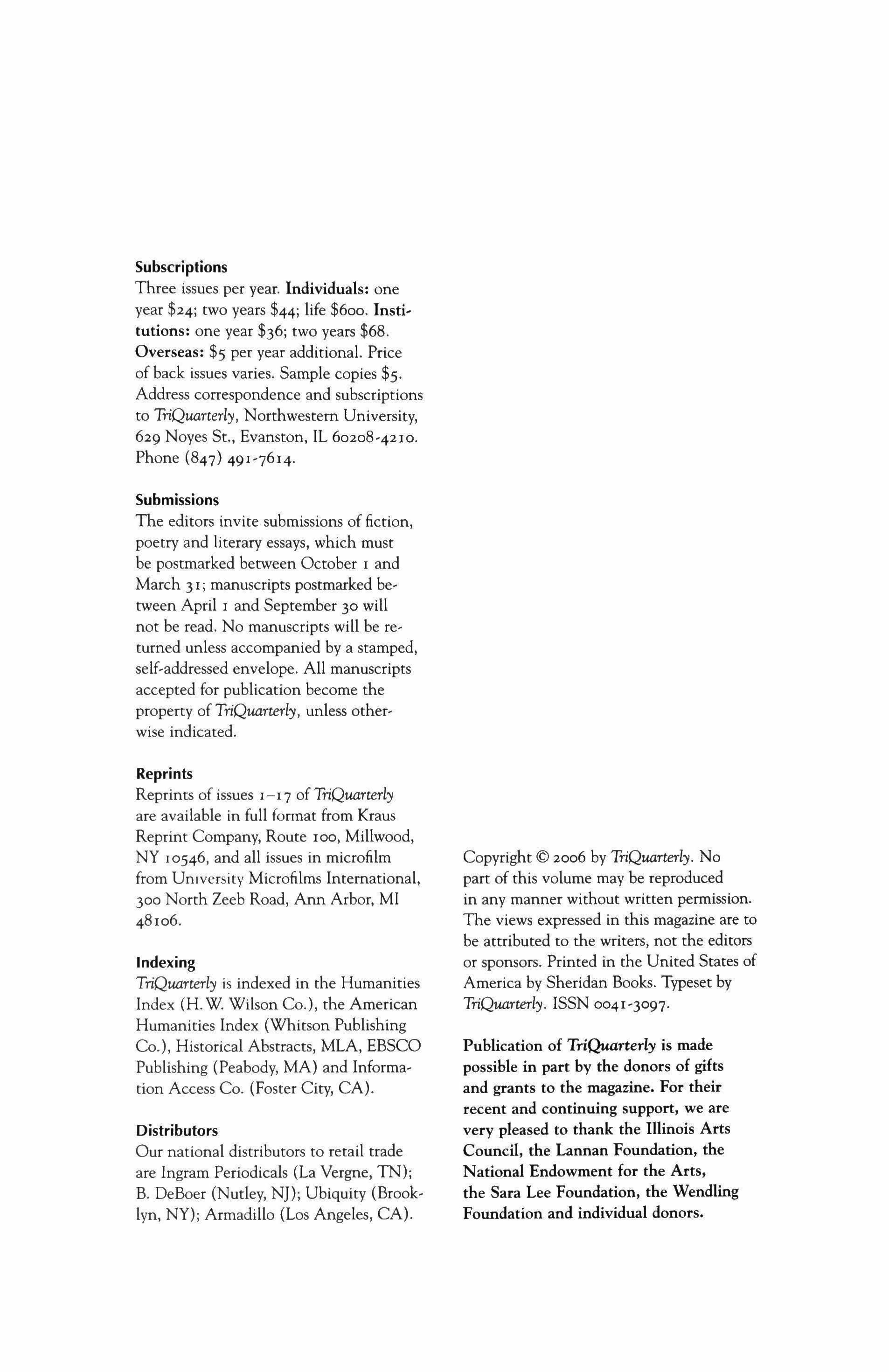
Copyright © 2006 by TriQuarterly. No part of this volume may be reproduced in any manner without written permission. The views expressed in this magazine are to be attributed to the writers, not the editors or sponsors. Printed in the United States of America by Sheridan Books. Typeset by TriQuarterly. ISSN 0041-3097.
Publication of TriQuarterly is made possible in part by the donors of gifts and grants to the magazine. For their recent and continuing support, we are very pleased to thank the Illinois Arts Council, the Lannan Foundation, the National Endowment for the Arts, the Sara Lee Foundation, the Wendling Foundation and individual donors.

Andrei
Mary
Tim
Sherman
Naomi
Bharati
Janet
Maxine
Wendell
Ch
Hilary
The International Journal of Writing & Art Consistency
Codrescu
H. Gass
William
Gordon
Seibles
Alexie
Shihab Nye
Mukherjee
Burroway
Kumin
Berry
i n ua Achebe
Masters Complexity It's amazing. Join our family of subscribers: $22 one year; $36 two years (4 per yr.) University House 5101 Rockhill Road University of Missouri-Kansas City Kansas City, MO 64110 (816) 235-1168 www.newletters.org
Past contributors
Steve Almond
Charles Baxter
Mary Clearman Blew
Stephen Dobyns
Denise Duhamel
Stephen Dunn
Terrance Hayes
Jane McCafferty
W.S. Merwin
Sharon Olds
Paul Perry
Sonia Sanchez
Vivian Shipley
Virgil Suarez
Melanie Rae Thon
Robert Vivian
Robert Wrigley
Dean Young
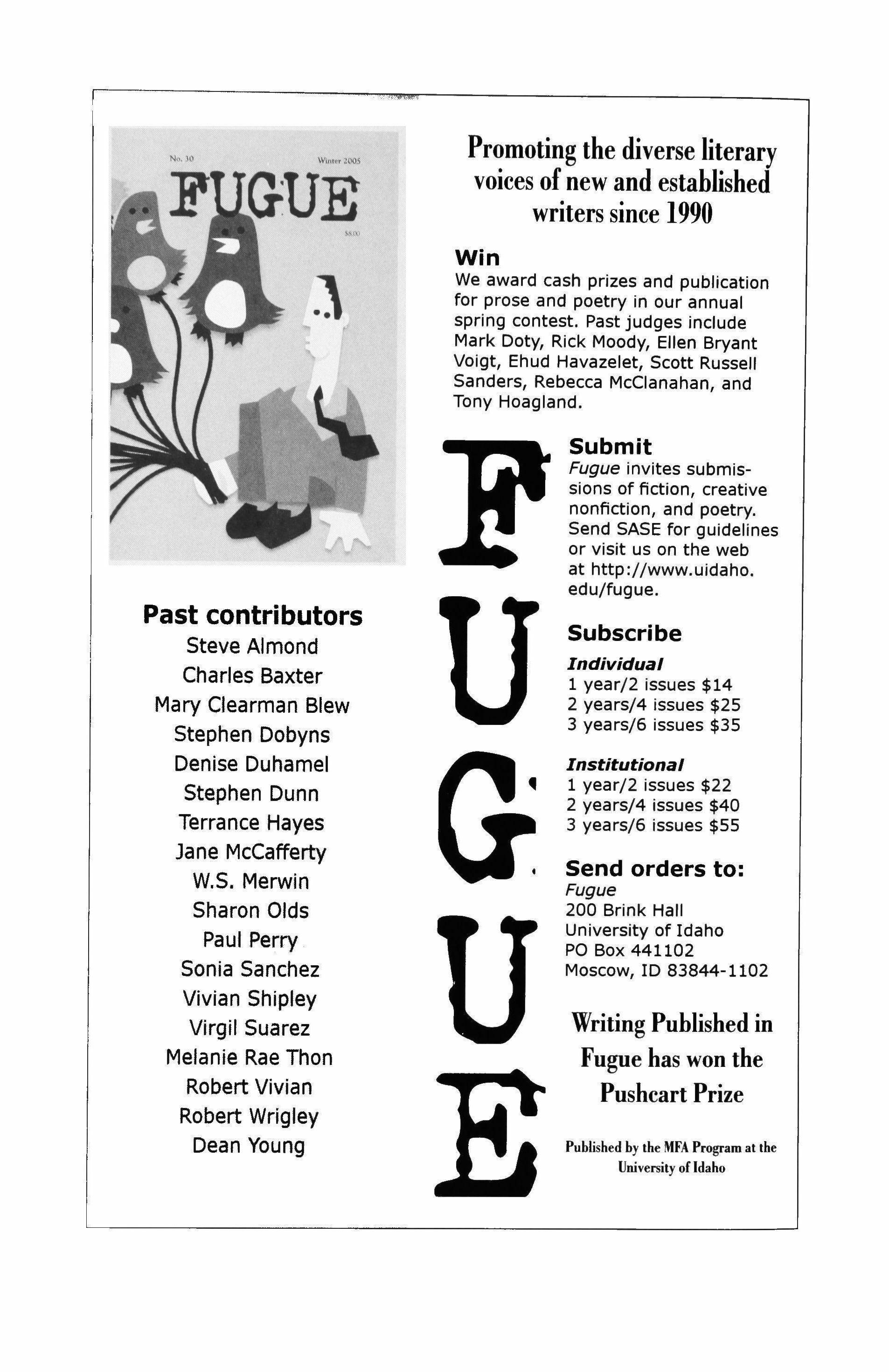
Promoting the diverse literary voices of new and established writers since 1990
Win
We award cash prizes and publication for prose and poetry in our annual spring contest. Past judges include Mark Doty, Rick Moody, Ellen Bryant Voigt, Ehud Havazelet, Scott Russell Sanders, Rebecca McClanahan, and Tony Hoagland.
Submit
Fugue invites submissions of fiction, creative nonfiction, and poetry. Send SASE for guidelines or visit us on the web at http://www.uidaho. edu/fugue.
Subscribe
Individual
1 year/2 issues $14
2 years/4 issues $25
3 years/6 issues $35
Institutional
1 year/2 issues $22
2 years/4 issues $40
3 years/6 issues $55
Send orders to: Fugue 200 Brink Hall University of Idaho PO Box 441102 Moscow, 10 83844-1102
Writing Published in Fugue has won the Pushcart Prize Published by the MFA Program at tbe University of Idaho

JWork from The Idaho Review has appeared in The Best American Short Stories; Prize Stories: The O. Henry Awards, The Pushcart Prize: Best of the Small Presses, and New Stories from. the South.
Mitch Wieland, Editor BOISE STATE UNIVERSITY 1910 UNIVERSITY DRIVE BOISE fD 83725
·,--------------------------------------------------------------------� •
If you've missed the Southwest Review in the past few years, you've also missed:
John Ashbery
Stanislaw Baranczak John Barth David
Bromwich Rosellen Brown Hortense Calisher Andrei
Codrescu Annie Dillard Millicent Dillon Tom Disch
Rita Dove Margaret Drabble Alice Fulton Angelica
Garnett William Gass Dana Gioia Albert Goldbarth
Debora Greger Eamon Grennan Allan Gurganus
Rachel Hadas Vicki Hearne Shelby Hearon Rolando
Hinojosa. Edward Hirsch Alice Hoffman. John Hollander. Michael Holroyd Garrett Kaoru Hongo Galway Kinnell
Mary Kinzie Georgina Kleege Ursula Le Guin
David Leavitt David Lehman Wendy Lesser William
Logan Alison Lurie J. D. McClatchy Alice Mattison
Arthur Miller Iris Murdoch Joyce Carol Oates Grace Paley Molly Peacock Robert Pinsky Reynolds Price
Adrienne Rich Mary [o Salter Jim Shepard Charles
Simic Lee Smith Elizabeth Spires Helen Vendler David Wagoner William Weaver· Edmund White Charles Wright Don't
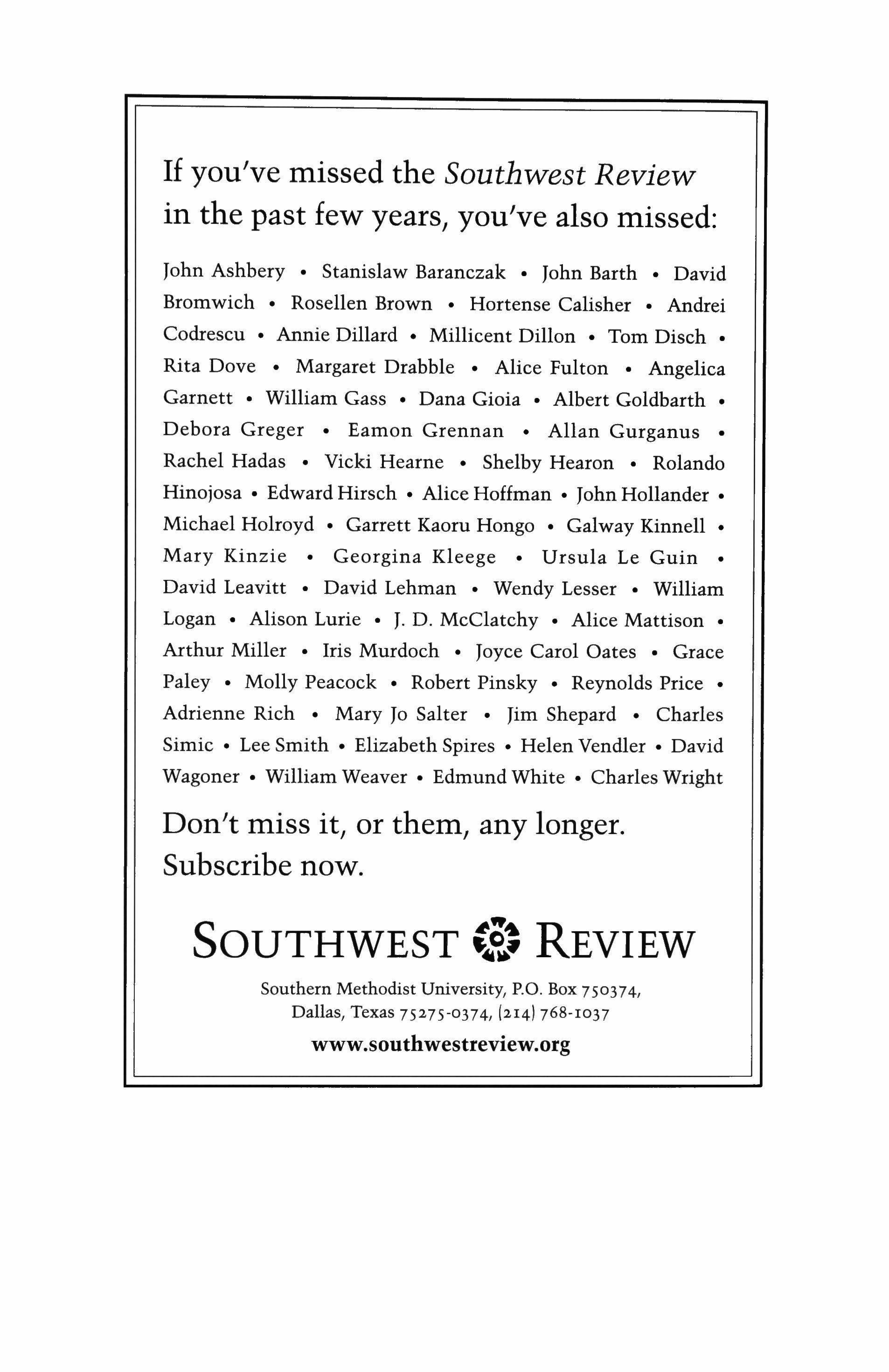
Southern Methodist University, P.O. Box 750374, Dallas, Texas 75275-0374, (2141768-1037 www.southwestreview.org
miss it,
them, any longer.
(.�l REVIEW
or
Subscribe now. SOUTHWEST
columbia.edu/cu/cup

The Velvet Lounge On Late Chicago Jazz
Gerald Majer
"The Velvet Lounge is a book like none other [a] remarkable odyssey through the world oflate Chicago jazz a haunted, vertiginous account of both the music and the lives it was made from. This is finally a book about soulno, about the soul - rapt by essence and experiment. Majer writes with an exhilarating passion and a rare elegance, and his book is sure to be a classic."
-J. D.
McClatchy, author of Hazmat: Poems
COL
B I A,
U M
Refer to us
"What a wealth of accomplishment! This book, this selection of poems and translations, is no less than essential."
-Hayden Carruth
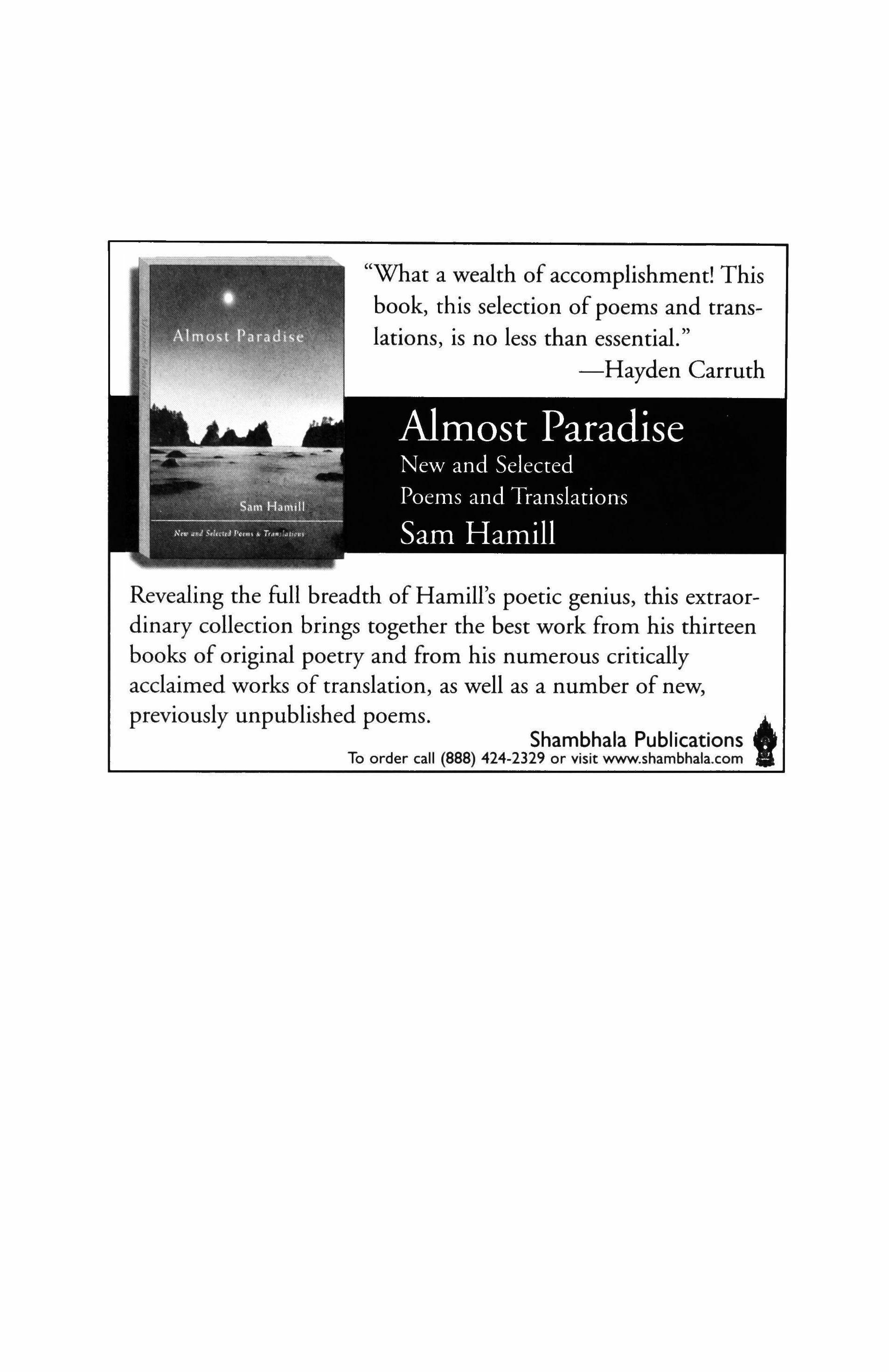
Revealing the full breadth of Hamill's poetic genius, this extraordinary collection brings together the best work from his thirteen books of original poetry and from his numerous critically acclaimed works of translation, as well as a number of new, previously unpublished poems.
* Shambhala Publications
To order call (888) 424-2329 or visit www.shambhala.com


Eric J. Sundquist
Tadeusz Rozewicz
Translated from the Polish by Joanna Trzeciak
laurence Goldstein
Victoria Chang
D. Nurkse
Sandra McPherson
Richard Kenney
Alicita Rodriguez
Steven Schwartz
Brendan Mathews
Joe Meno
Heather A. Slomski
Sande Boritz Berger
Jonathan David
Molly Mcquade
Jessica Fisher
Robert Cording
Hadara Bar-Nadav
Eleanor Stanford
Marianne Boruch
Michael McFee
Joseph Campana
Ron De Maris
Neil Shepard
Friedrich Holderlin
Translated trom the German by Maxine Chernoff and Paul Hoover
Robert Hahn
TRIQUARTERlV126 $11.95





















































 Friedrich Durrenmatt
Friedrich Durrenmatt
































































































































































 Santo Stefano
Santo Stefano




















